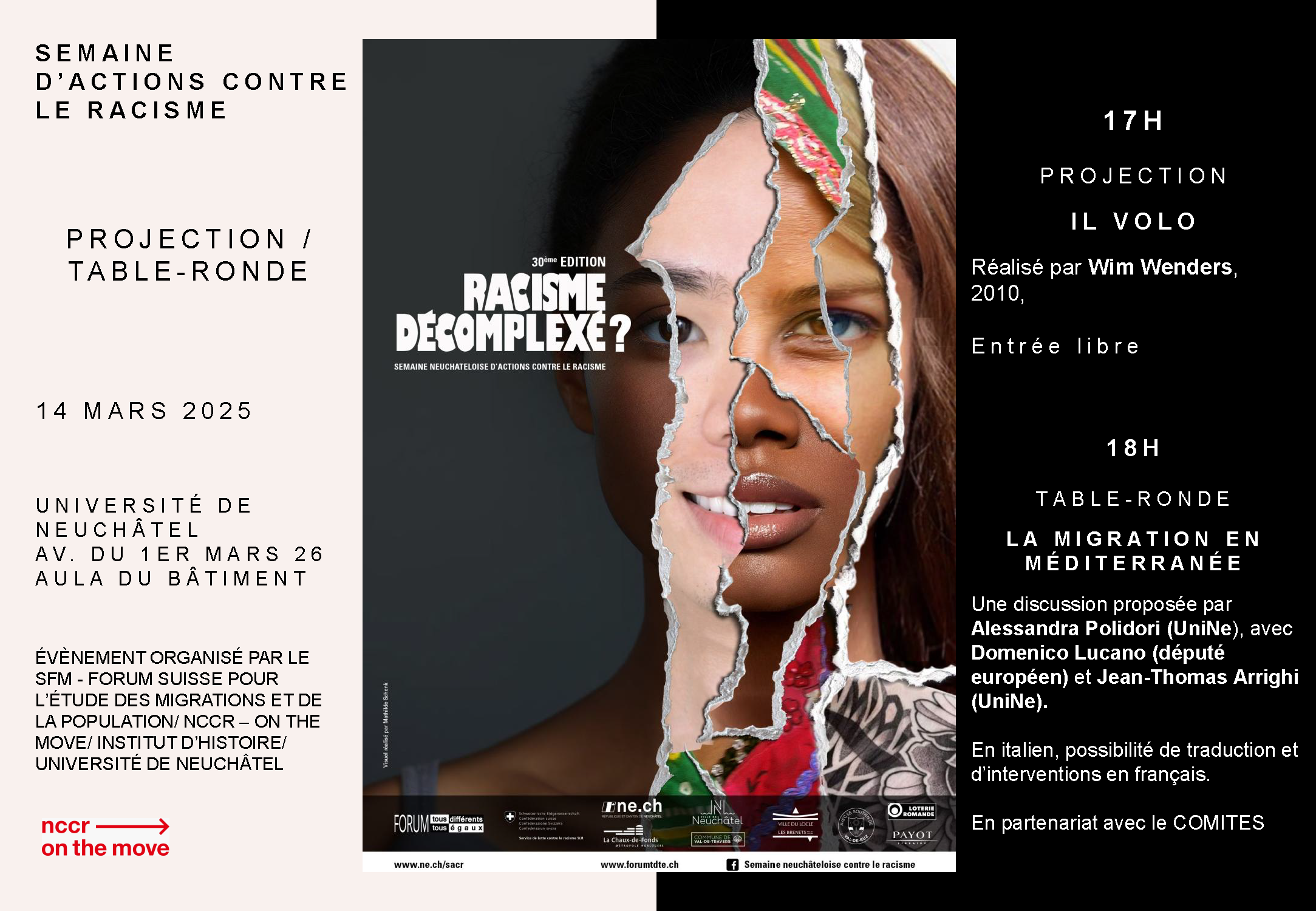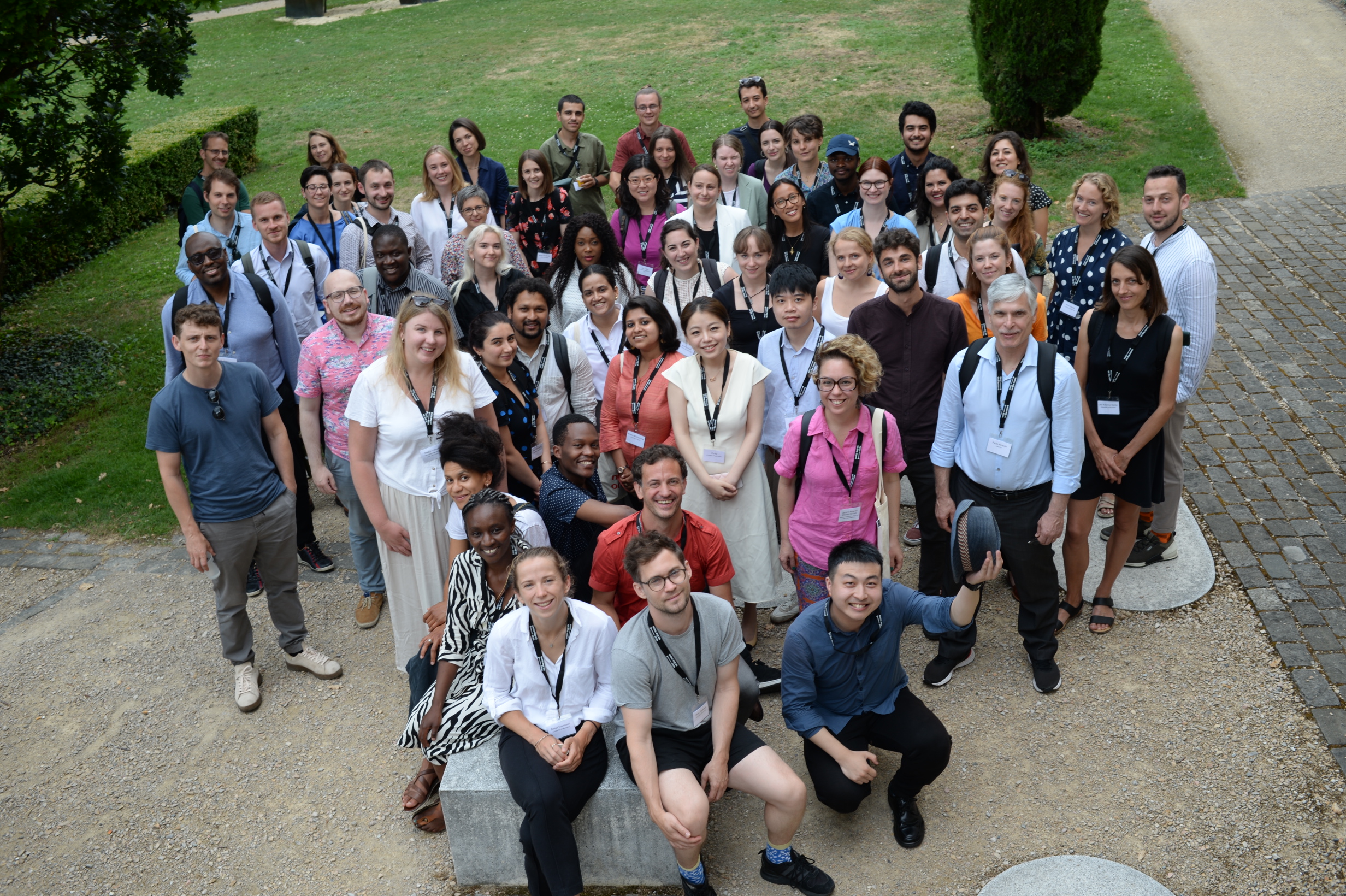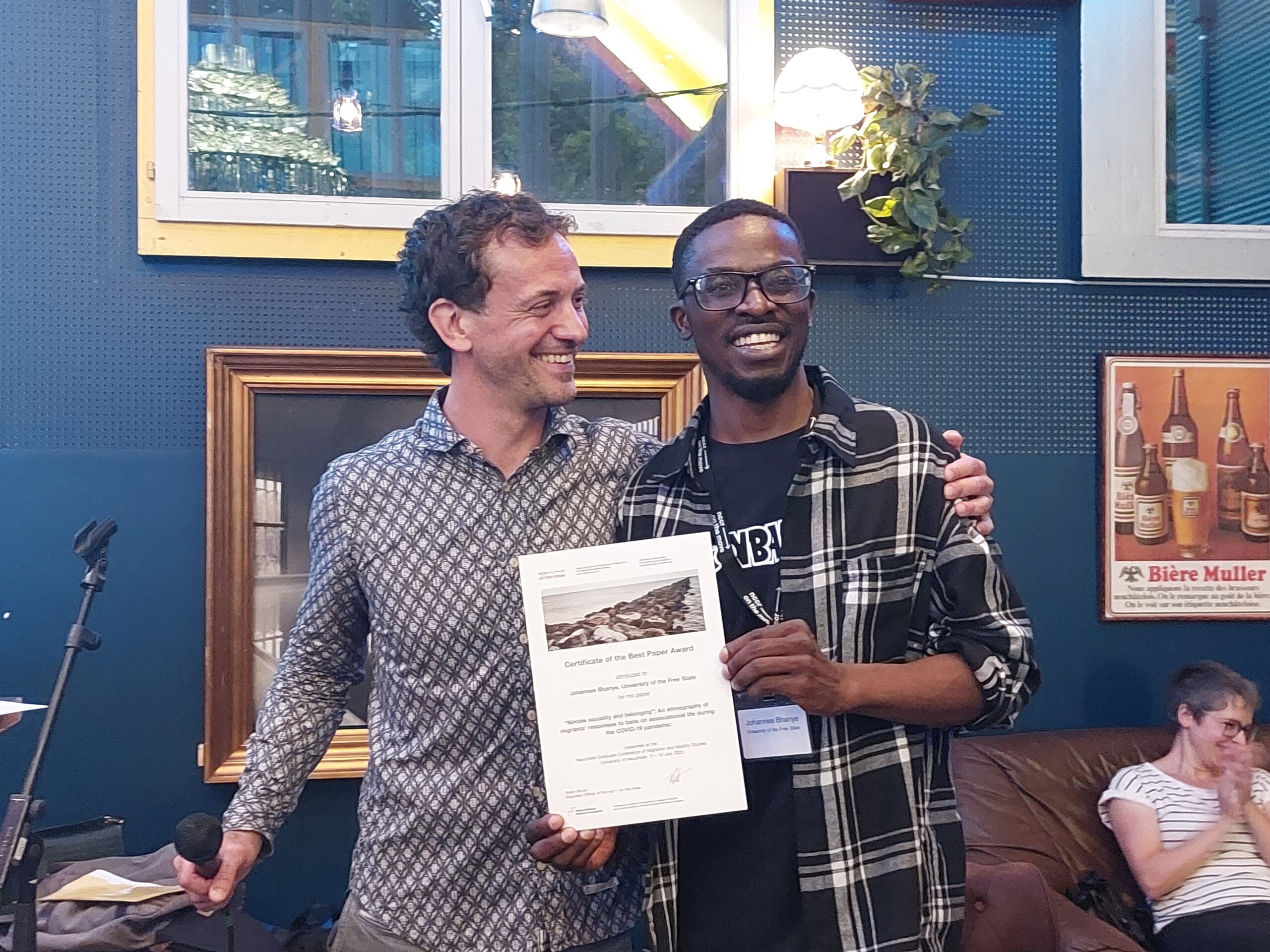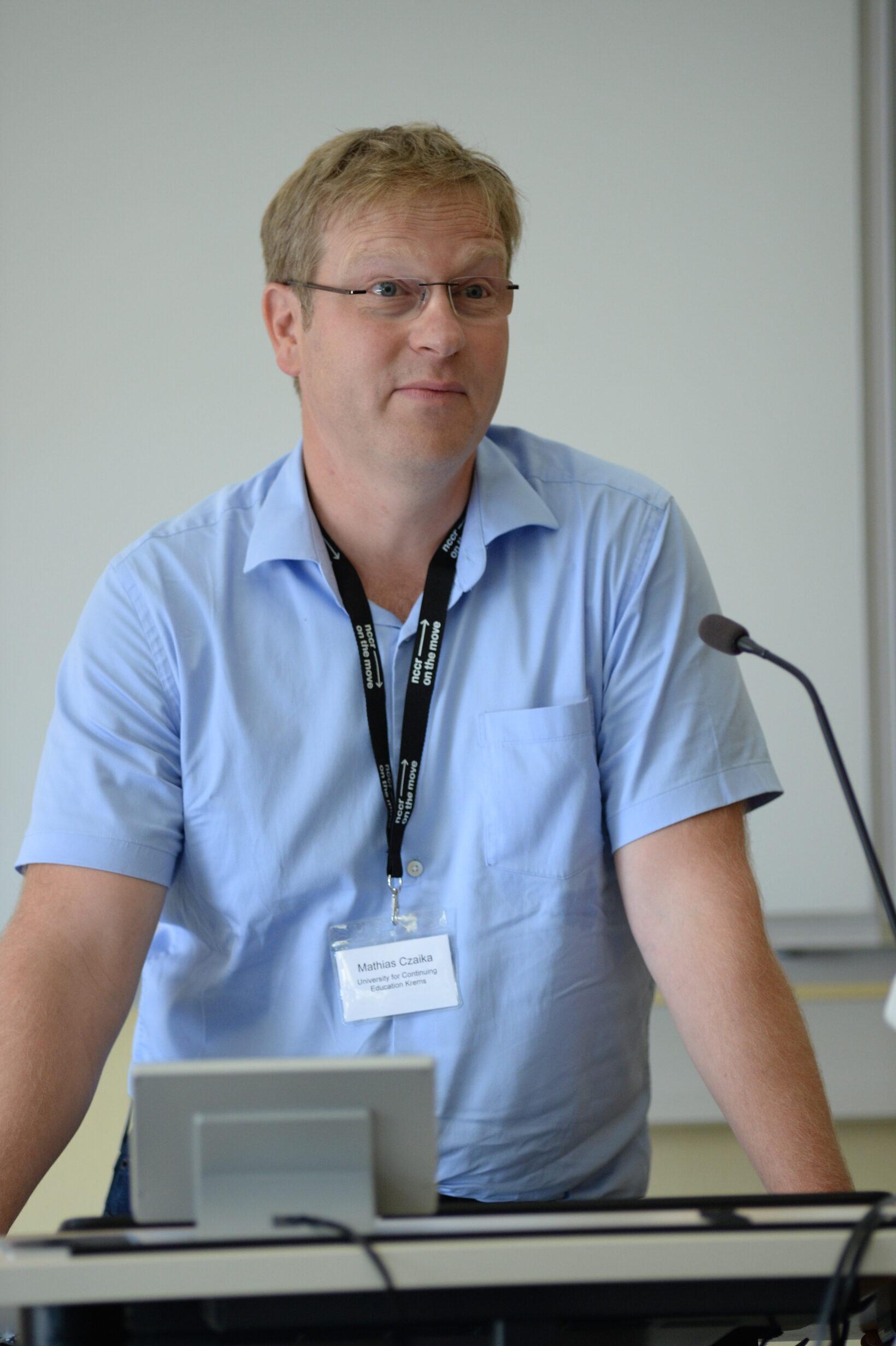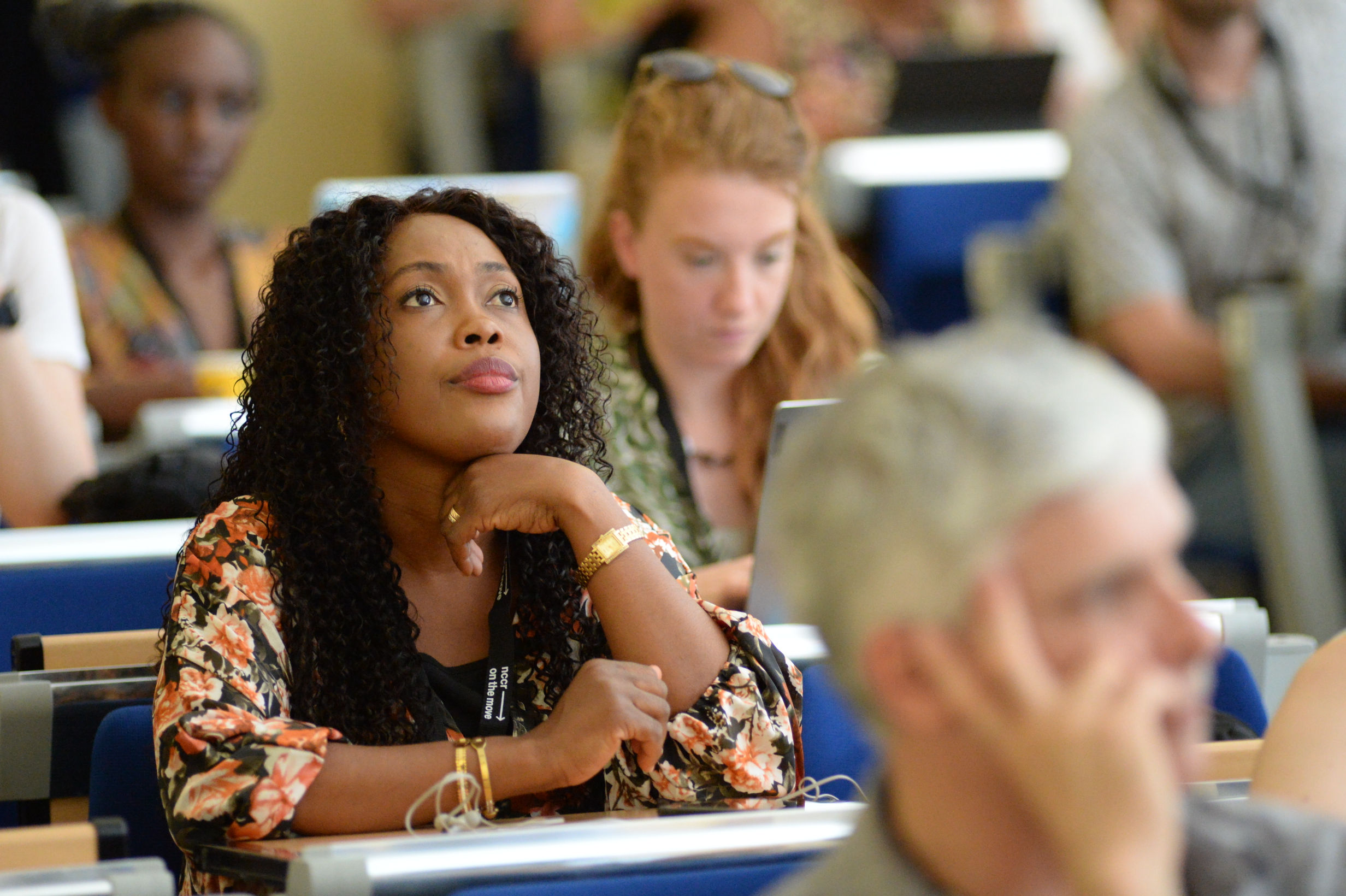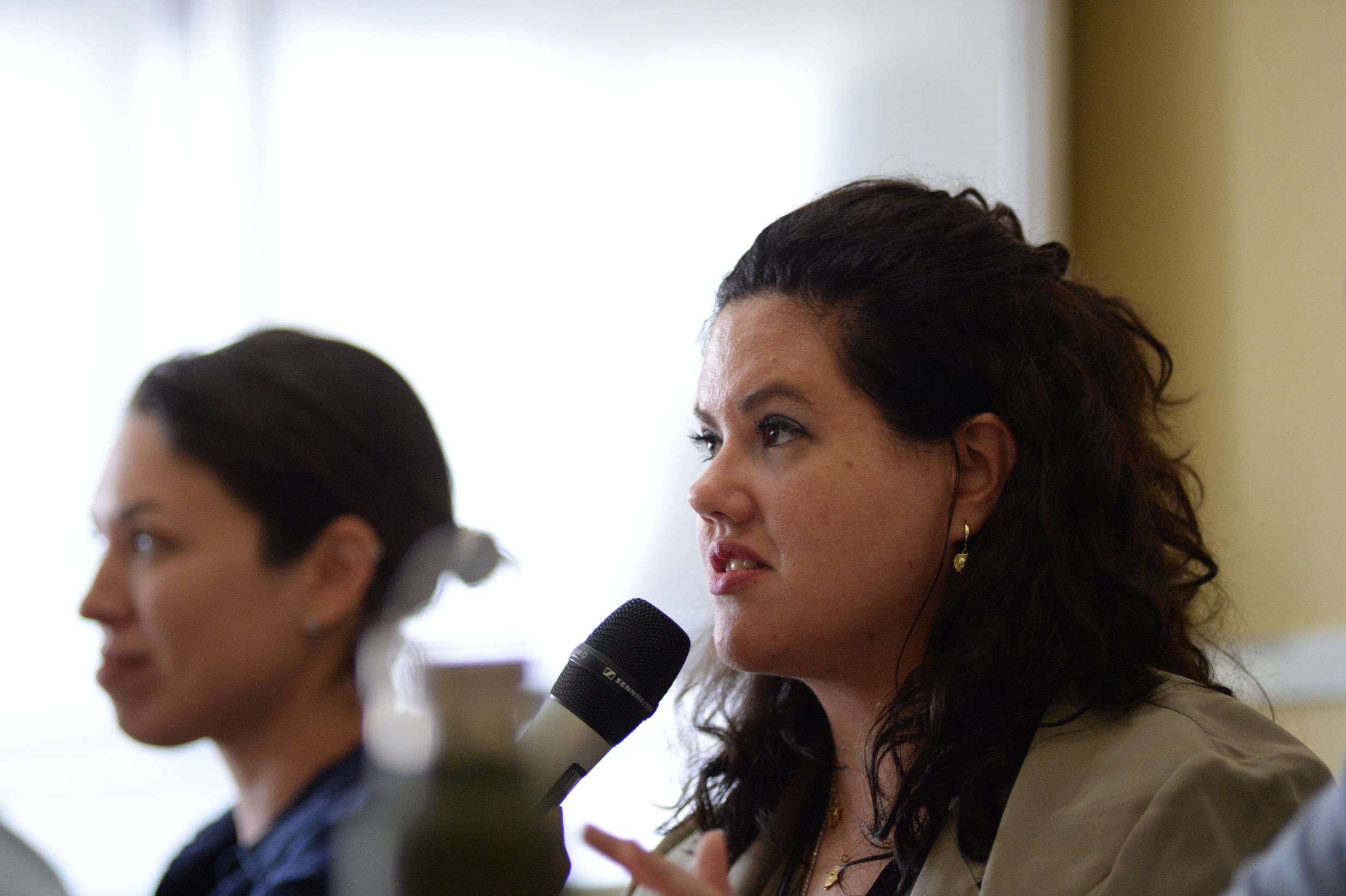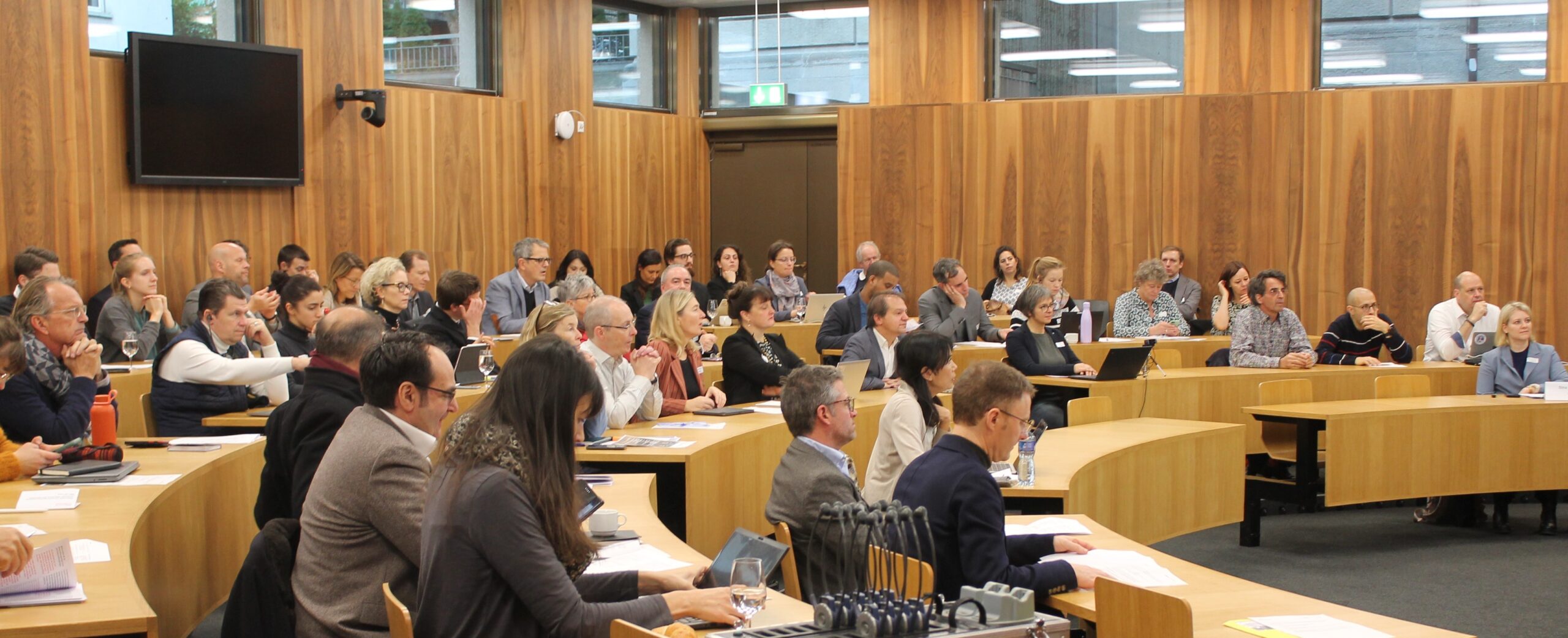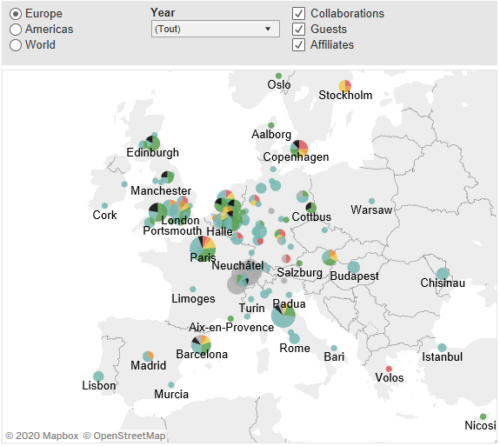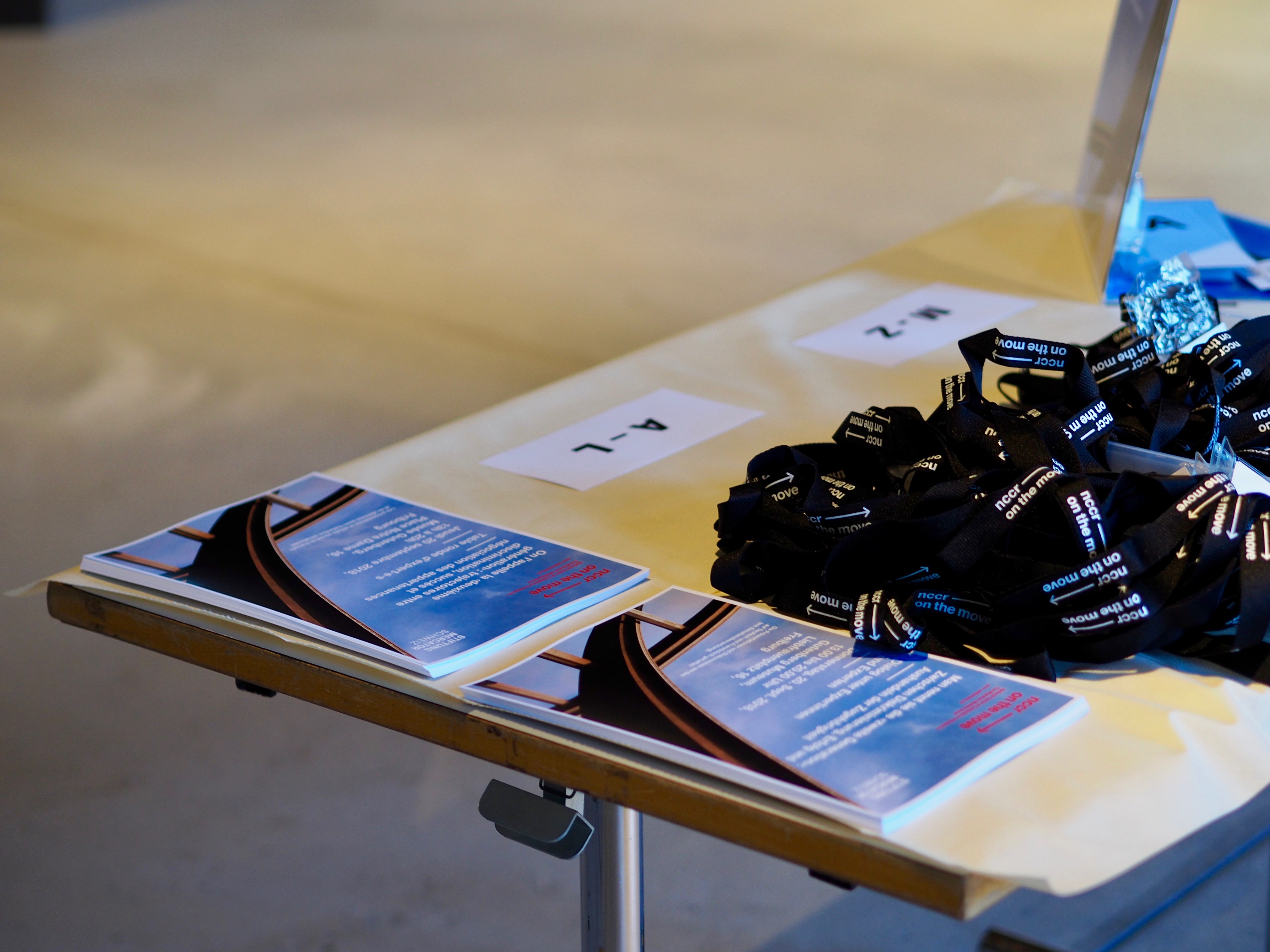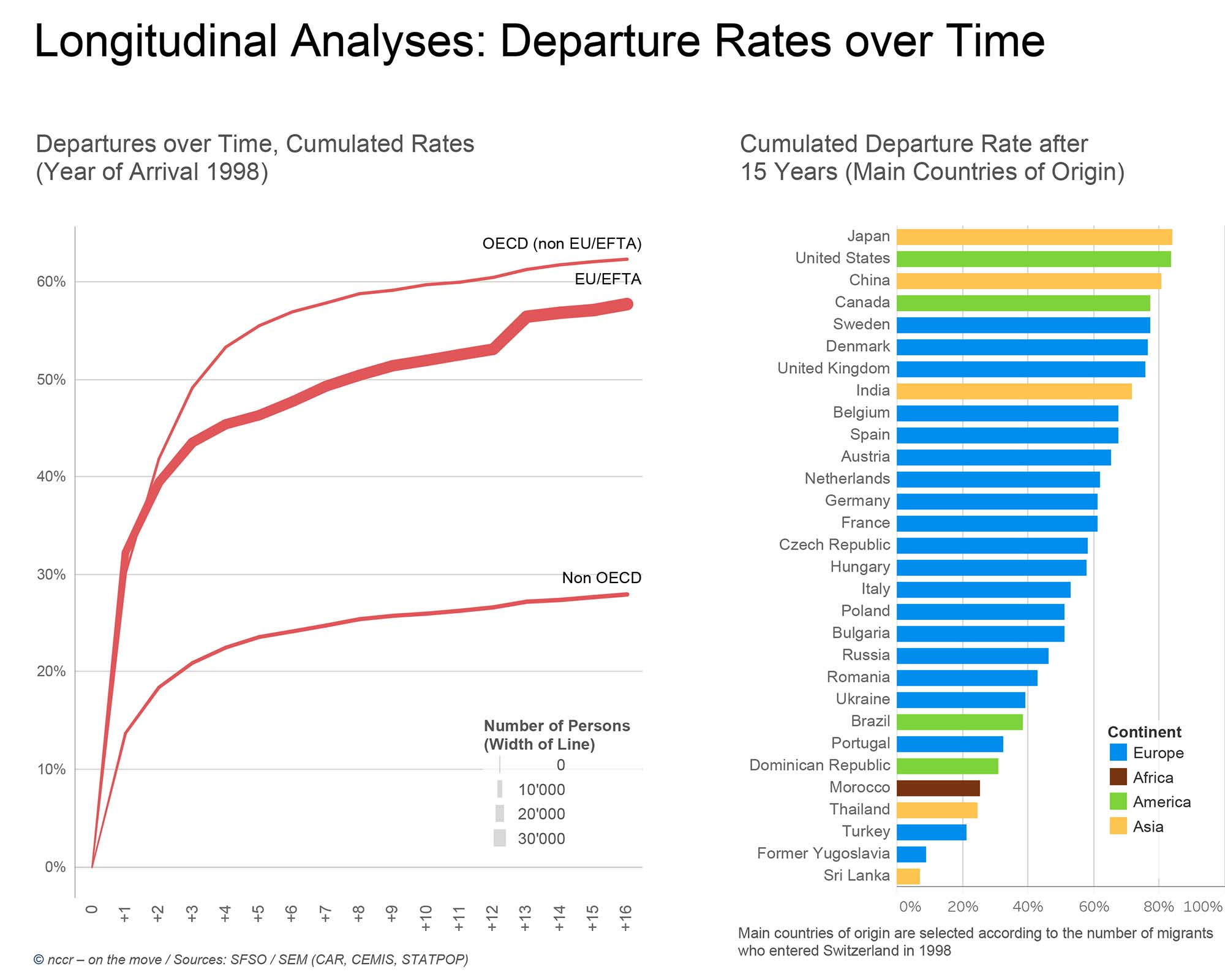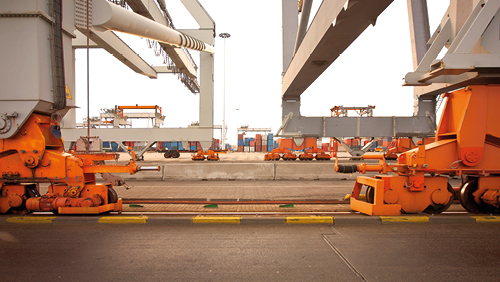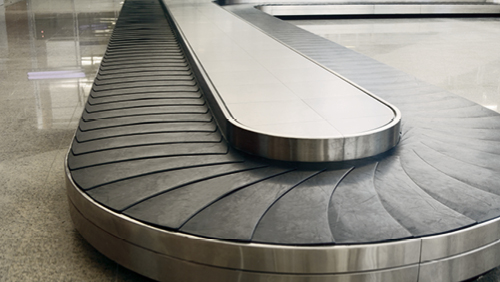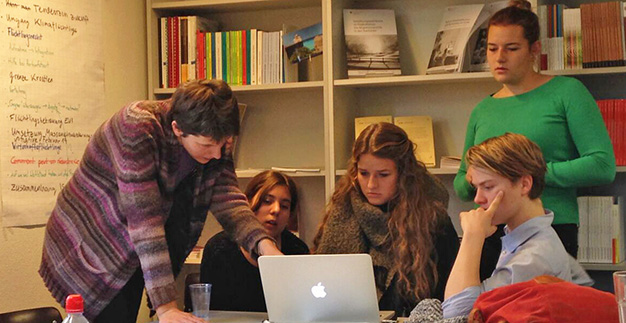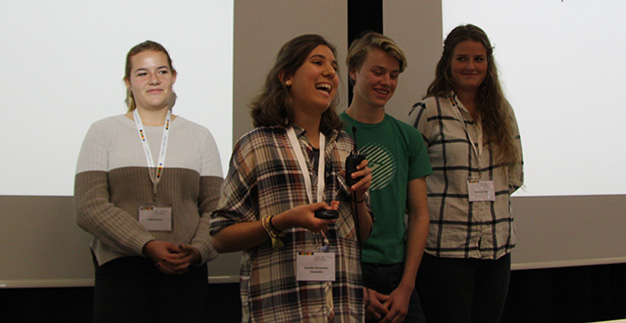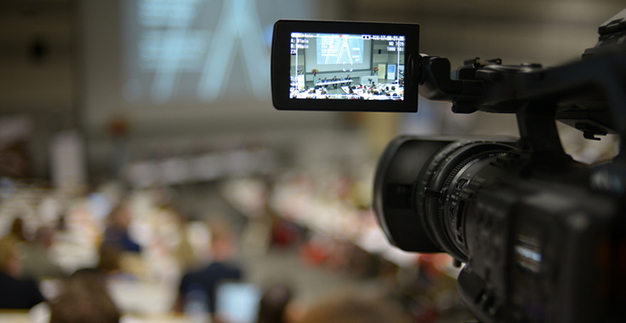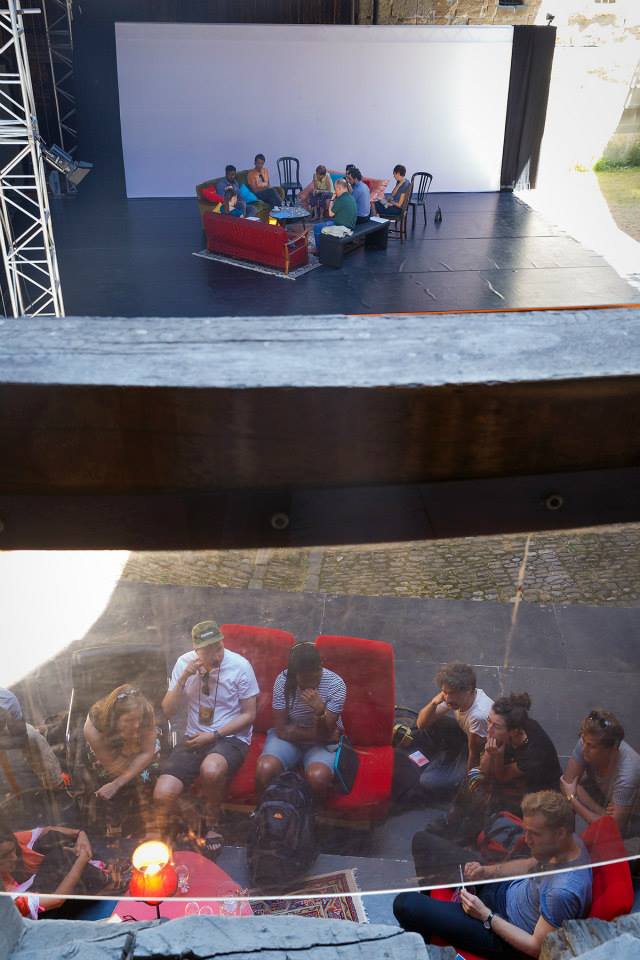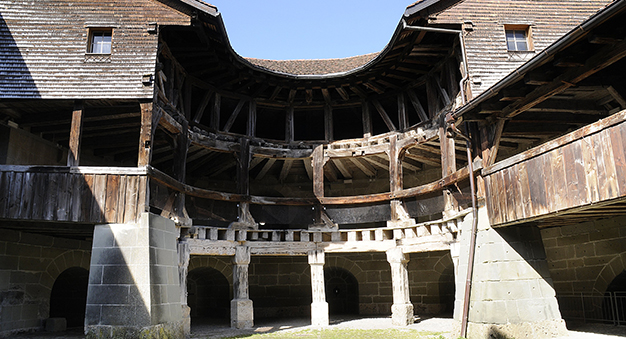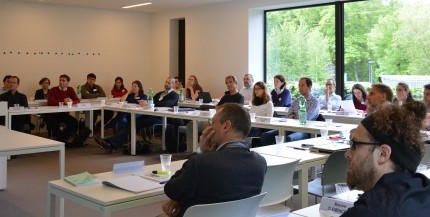Knowledge Production and the Use of Academic Research by Migration Policy Actors
Public Lecture
Leila Hadj Abdou

Thursday, 2 October 2025, 18:00 – 19:30 CET
This talk will be held at the University of Neuchâtel, Av. du 1er-Mars 26, Room B32 and on WEBEX (link).
Program PDF
Tie Borders, Temporalities and (Im)mobility in Understanding the Governance of Migrants’ Reception
Public Lecture
Stefano degli Uberti, National Research Council – Institute for
Research on Population and Social Policies (CNR-IRPPS)
Discussant: Anna Wyss, University of Bern

Thursday, 25 September 2025, 18:00 – 19:30 CET
This talk will be held at the University of Neuchâtel, Av. du 1er-Mars 26, Room C49 and on WEBEX (link), as well as live-streamed on the nccr – on the move YouTube channel (link).
Program PDF
Policy Dialogue: The Chances and Risks of Algorithmic Matchmaking in the Labor Market
Conference

Friday, 5 September 2025
12:30 – 15:15
KOF Swiss Economic Institute, Zurich
This event is co-organized with the nccr – on the move project Monitoring Ethnic and Immigrant Discrimination in Hiring Decisions in Times of Crisis.
Matching workers to jobs is one of the most essential forces enabling and fostering individual mobility across space and economic spheres. Matching algorithms play an increasingly important role in this process. On job and recruitment platforms, social networks, and online crowdsourcing platforms, these algorithms automatically suggest job openings to job seekers and job seekers to firms. What are the advantages and disadvantages of matching algorithms? Can automated matchmaking enhance the efficiency of the matching process and reduce unequal treatment of job seekers by providing more relevant job opportunities or reducing informational deficits of certain job seekers? Do they disadvantage certain job seekers by learning and encoding discriminatory recruiter preferences? We will explore these and related questions at a policy event co-organized by the KOF Swiss Economic Institute at ETH Zurich and the nccr – on the move. The event is aimed at academics and representatives of the federal government, cantons, municipalities, companies, and non-governmental organizations interested in the opportunities and risks of automated matching tools in the labor market.
The core of the program is keynote speeches by two internationally renowned experts on recommender systems: Peter Kuhn and Anikó Hannák.
More information and program (PDF)
The event will take place at the KOF building, Leonhardstrasse 21, Room LEE E 101, Zurich. The event is in English. Deadline for registrations now closed.
Image: © Adobe Stock/Vadym. Generated with the help of AI.
Neuchâtel Graduate Conference 2025
Exploring the Multi-Directionality of Migration and Mobility: Barriers and Opportunities

University of Neuchâtel 8-9 July 2025
The Neuchâtel Graduate Conference (NGC) is an international graduate conference organized by the nccr – on the move, Swiss National Center of Competence in Research (NCCR) for migration and mobility studies. It provides a stimulating environment in which PhD and Postdoctoral fellows from different universities and research institutions can exchange ideas, establish networks, and initiate collaborative research.
The 8th edition will take place from 8 to 9 July 2025 in Neuchâtel, providing opportunities to meet other researchers in formal and informal gatherings. The topic of this year’s Graduate Conference will be “Exploring the Multi-Directionality of Migration and Mobility: Barriers and Opportunities”.
Event Highlights:
Tuesday, 8 July 2025
11:45 – 13:30 Parallel Roundtables and Workshops: Migration Research, Digital Media, and Journalism: Rethinking Pathways of Collaboration in Times of (Mis)Representations and NGOs in the Migration Field: Research, Practice and Early-Career Opportunities
17:15 – 18:45 Keynote Lecture by James Hollifield: Has Trump Resolved the Liberal Paradox?
Wednesday, 9 July 2025
11:30 – 13:15 Roundtable and Workshop: How Can Demigranticization Apply to Integration Studies?
For more information, please first check our FAQ page, then contact Lucas Oesch, the Scientific Officer of the nccr – on the move lucas.oesch@unine.ch.
Full program. Registration is closed.
Has Trump Resolved the Liberal Paradox?
Keynote at the Neuchâtel Graduate Conference
Prof. James Hollifield, Southern Methodist University
Discussant: Sandra Lavenex, University of Geneva, nccr — on the move

Tuesday, 8 July 2025, 17:15 – 18:45
This keynote will take place in person at the University of Neuchâtel, Avenue du 1er-Mars 26, room C46, on WEBEX (link to follow) as well as live-streamed on the nccr – on the move YouTube channel (link to follow).
Program (PDF)
(Counter) Narratives on Migration in Times of Crisis
Interdisciplinary Workshop

Wednesday, 11 June 2025
08:45 – 17:45
University of Neuchâtel
This interdisciplinary workshop is organized by two nccr – on the move projects:
Narratives of Crisis and Their Influence in Shaping Discourses and Policies of Migration and Mobility and Evolving (Im)Mobility Regimes: Migrant Workers’ Entitlement and Precarization in Times of Crisis.
Migration and crises are framed differently by various actors. Media and politicians often label situations as crises, while migrants and researchers may not see them that way. Contrasting narratives on migration (especially in times of crisis) emerge in public discourse and in academia. The workshop aims to explore these varied views by encouraging interdisciplinary exchange. It focuses on how different types of crises – i.e. socio-political, economic, border and health crises – shape narratives on migration in times of crisis and how counternarratives emerge in response to dominant discourses. By examining the overlaps and differences between diverse scientific approaches, the workshop seeks to foster a deeper, more nuanced understanding of (counter)narratives on migration during crises.
More Information and Program (PDF)
The workshop will be held at the University of Neuchâtel, Rue Abram-Louis Breguet 2, Room 2.310. Please register by 1 June by way of this link.
From the Border Spectacle to the Pornography of Border Violence: The Visual Politics of a Contemporary State Ritual?
Public Lecture Series
Lorenzo Gabrielli, GRITIM-Universitat Pompeu Fabra
Discussant: Christin Achermann, University of Neuchâtel

Thursday 5 June 2025, 18:00 – 19:30 CET
The public lecture will take place at the University of Neuchâtel, Av. du Premier-Mars 26, Room B32 and on WEBEX.
Program PDF
Crisis-driven Digitalization and its Afterlives in Urban Governance
International Workshop

Extract of an artwork by Martine Edard
Wednesday, 28 May 2025
University of Neuchâtel
This event is organized by the team of the nccr – on the move research project “Data Politics and New Regimes of Mobility and Control During and After the COVID-19 Pandemic”.
Crises —whether economic collapses, pandemics, natural disasters, or political upheavals— have often been described as powerful catalysts for state interventions that might otherwise be considered politically unfeasible or socially unacceptable. COVID-19, 9/11, the ‘migration crisis’. These crises have motivated the roll-out of digital solutions, sometimes driven by public-private partnerships, a pattern that has recently been described as a ‘smartness mandate’ (Mitchell and Halpern 2023). But rather than following a standard pathway, crisis-driven digitalization is technologically, geographically, institutionally, and politically variegated. Therefore, this workshop has two aims. The first is to explore, beyond ‘shock doctrine’ (Klein 2007) narratives, the diversity of crisis-driven processes of digitalization at local governance level. The second is to interrogate the afterlives and varied impacts of crisis interventions.
More Information and Program (PDF)
The workshop will be held at the University of Neuchâtel, Espace Tilo-Frey, Room R.S.38.
Participation is free of charge but requires registering by e-mail until 19 May.
Des ondes aux luttes : le podcast comme levier d’émancipation face au racisme et aux dominations structurelles
Table Ronde
Rokhaya Diallo
Shyaka Kagame
Grace Ly
Kaziwa Raim Rotzetter
Modération: Doris Niragire Nirere, Sélim Clerc

Jeudi, 22 mai 2025, 18:00 – 20:00 CET
La table ronde aura lieu en français à l’Université de Neuchâtel, Avenue du Premier-Mars 26, Salle D67.
Programme PDF
The nccr – on the move Bag Photo Competition Winners
The 1st prize in our nccr – on the move bag photo competition, launched following the Neuchâtel Graduate Conference for Migration and Mobility Studies 2024, is awarded to Théo Lefort. His striking photo, captured during fieldwork at the Iran-Turkey border, portrays a moment of rest on a cold day amidst the rugged mountainous terrain. This photo captures the challenges and beauty of border landscapes, offering a glimpse into migration research.
The 2nd prize goes to Samuel Okunade, whose photo showcases the dynamic life of Ibadan, Nigeria. Through his lens, we see an urban environment that inspires stories of movement and connection. Lisa Senecal claims the 3rd prize with her delightful depiction of Lisbon’s electrico, the iconic tram that travels through the city’s steep streets. Assisted by her daughter, Lisa’s photo captures the charm of this symbol of mobility.
Finally, a special mention is given to Saeed Husain, whose photograph of the Deosai Plateau in Pakistan’s Gilgit-Baltistan region served as the inspiration for this competition. The photo, taken near Skardu, celebrates the grandeur and quietness of the landscape, reflecting the relationship between migration/mobility and the natural world.
Congratulations to all the winners! We would also like to thank everyone who participated. Stay tuned as we share more of these incredible photos in the lead-up to #neuchgradconf25.
Workshop on Successful Academic Career & Funding

24 & 25 April 2025
University of Neuchâtel, Abram-Louis Breguet 2, Room 2.310
Planning an academic career? This two-day workshop is designed for PostDocs and advanced PhD students, to provide key insights into securing research funding as well as building a strategic career path. Day 1 (in-person, Neuchâtel) covers SNSF & EU funding, with tips from successful applicants. Day 2 (online) focuses on career planning.
Please consult detailed requirements and registration information in the full program (PDF). Deadline for registration is 4 April 2025 by way of this link.
The Power of Podcasting: Turning Ideas into Engaging Stories

22 & 23 May 2025
University of Neuchâtel, Abram-Louis Breguet 2, Room 2.310
Podcasting has become a powerful tool for storytelling and knowledge sharing. This two-day workshop introduces audio storytelling, narrative techniques, and key production skills. Learn about podcast formats, recording, editing, interviewing, and ethics. Gain the skills and confidence to craft and share compelling academic content through podcasts.
More details in our program (PDF). Places are limited. Please register by 15 May 2025 by way of this link.
Au-delà du virtuel: Enjeux et défis des réseaux sociaux pour le racisme
Conférence – Table ronde

Jeudi 3 avril 2025, 18:00 – 19:30, Université de Neuchâtel – Bâtiment principal salle C45 (1er étage) Premier-Mars 26, Neuchâtel
Le Bureau égalité et diversité de l’Université de Neuchâtel et le nccr – on the move proposent une conférence suivie d’une table ronde sur les enjeux et défis posés par les réseaux sociaux en matière de racisme. A cette occasion, Matthieu Vétois, psychologue et docteur en psychologie sociale de l’Université de Genève, ouvrira la soirée avec une intervention portant sur les effets de normalisation du discours nativiste et xénophobe que peut avoir la couverture médiatique de l’immigration, en particulier sur les réseaux sociaux.
Cette présentation sera suivie d’une table ronde consacrée aux enjeux et défis de la lutte contre le racisme sur ces plateformes. Les invité·e·s lors de cette table ronde seront : Morgane Bonvallat, cheffe de projet au sein de Stop Hate Speech, Giulia Reimann, docteure en droit et responsable de la Plateforme de signalement des discours de haine racistes sur Internet, et Samson Yemane, vice-président de la Commission fédérale contre le racisme. Une verrée de clôture sera proposée à l’issue des discussions.
Lien programme (PDF)
Neuchâtel Graduate Conference 2025: Call for Contributions
University of Neuchâtel
8 – 9 July 2025
The Neuchâtel Graduate Conference is an international conference addressing early career researchers in the field of migration and mobility studies. It is organized by the nccr – on the move, the Swiss National Center of Competence in Research (NCCR) for migration and mobility studies. The conference aims to provide a stimulating environment where doctoral and postdoctoral researchers from different universities and research institutions can present original research, exchange ideas, establish networks, attend targeted training, and initiate collaborative research.

Call for Contributions: Exploring the Multi-Directionality of Migration and Mobility: Barriers and Opportunities
The global landscape of migration and mobility is increasingly complex and multi-directional, challenging traditional notions of unidirectional movement from origin to destination. This conference aims to explore the dynamics of contemporary migration and (im)mobility patterns, focusing on the diverse barriers and opportunities encountered by people on the move.
Against this background, scholars are encouraged to delve into the ways the multi-directionality of migration and mobility patterns is shaped nowadays, but also in comparison to the past. Presentations should examine how practices, policies and norms shape the multi-directionality of human movement. This exploration is intended to traverse diverse geographical and political contexts, and consider different scales of social organization. The conference welcomes interdisciplinary contributions from fields such as anthropology, demography, economics, geography, history, law, political science, psychology, sociology, and other relevant disciplines within migration and mobility studies.
The deadline for submission is 15 March 2025.
There is no participation fee. To encourage international participation, the nccr – on the move will provide funding opportunities that are specifically designed for international graduate students traveling from far or without mobility funding.
Please read the full call for contributions for more information (PDF) and register via this form.
On-line information session on how to write an abstract and expectations
Writing a good abstract and understanding the expectations from the selection committee is key! The criteria for evaluation of the abstracts are: A) Scientific relevance; B) Originality; C) Contribution to the theme of the conference; D) Clear formulation of the work‘s aim; E) Adequacy of methods. So make sure to address all these points when writing your abstract.
To learn more about how to write an abstract and the expectations from the selection committee, an information session during which interested applicants were also able to ask questions to the Scientific Officer was organized on 27 February 2025. If you missed the session, you can watch the recording here.
Call for Visiting Fellows – Fall 2025
Short-Term Incoming Fellowships

To enhance international exchange and cooperation, the nccr – on the move offers short-term incoming Visiting Fellowships. The Fellowship Scheme can be used to host senior (PostDoc) and junior (doctoral students and Master’s degree holders) researchers from abroad, who wish to collaborate with the nccr – on the move for a duration of two to three months.
Applications from researchers coming from or based in a low or middle-income country are particularly encouraged.
Further information on eligibility, the application and selection procedure can be found here.
The deadline for applications is 15 March 2025.
For any questions, please contact Lucas Oesch, Scientific Officer of the nccr – on the move at visiting@nccr-onthemove.ch.
La migration en Méditerranée
Projection – Table ronde
Vendredi 14 mars 2025, 17:00 – 19:30
Université de Neuchâtel – Av. du Premier-Mars 26, AULA
Domenico Lucano est un homme politique, député européen, surtout connu pour son rôle en tant que maire de Riace, un petit village situé dans le sud de l’Italie, en Calabre. Au fil des années, il a développé une politique d’accueil et d’intégration des migrants et réfugiés. Lucano a initié ce qui est désormais appelé le “modèle Riace”, un programme qui a transformé son village en un exemple mondial d’inclusion et de solidarité.
Le modèle Riace repose sur l’idée que les migrants peuvent être un moteur de revitalisation économique et sociale dans des zones rurales qui subissent une forte dépopulation. Lucano a invité des réfugiés et des demandeurs d’asile à s’installer à Riace, en leur offrant des logements vacants et en les impliquant dans des activités économiques locales, comme la restauration de maisons abandonnées et l’agriculture. Il a cherché à encourager une coexistence harmonieuse entre les habitants locaux et les migrants, tout en mettant l’accent sur les droits humains et l’égalité.
Ce modèle a attiré l’attention internationale et a été salué comme une approche innovante et humaine de la crise migratoire.
Le modèle Riace, aujourd’hui, incarne à la fois les défis et les espoirs liés à l’intégration des migrants dans des communautés européennes souvent fragiles, et continue de susciter des discussions sur la gestion des flux migratoires et l’avenir des petites communautés rurales.
Programme complet de la Semaine neuchâteloise d’actions contre le racisme (SACR)
La consubstantialité du capitalisme, du colonialisme et du racisme et la question migratoire
Public Lecture Series
Saïd Bouamama, IFAR Lille
Discutante: Jovita Dos Santos Pinto, Université de Lucerne

Jeudi, 6 mars 2025, 18:00 – 19:30 CET
La conférence aura lieu en français à l’Université de Neuchâtel, Espace Tilo-Frey 1, Salle R.E.48 et sur WEBEX. Les questions pourront être posées en anglais et en français.
Programme PDF
L’exil comme objet du droit au XVIIe siècle
Migration History Talk
Prof. Naïma Ghermani, Université Grenoble Alpes-LUHCIE- ICM
Discutant: Prof. Olivier Christin, Université de Neuchâtel

Mercredi, 18 décembre 2024, 17:30 – 19:00
Cette conférence publique se tiendra en présentiel à l’Université de Neuchâtel, Espace Tilo Frey 1, salle R.E.48, et WEBEX.
Programme (PDF)
The Cyprus-Lebanon Mobility Corridor – Crisis, Pushbacks, Colonial Legacies, and Militarized Humanitarianism
Public Lecture Series on Migration, Mobility and Crises
Leandros Fischer, Aalborg University
Discussant: Janine Dahinden, University of Neuchâtel

Thursday, 12 December 2024, 17:15 – 18:45 CET
This talk will be held in person at the University of Neuchâtel, Av. du Premier-Mars 26, Room D71, and on WEBEX (link) as well as live-streamed on the nccr – on the move YouTube channel.
Program (PDF)
Humanitarian Migrants’ Economic Settlement in Australia: The Role of English Language Proficiency
SFM Scientific Seminar
Santosh Jatrana, Deakin Universtiy

Tuesday, 3 December 2024, 12:15 – 13:30 CET
This talk will be held in person at the University of Neuchâtel, Rue Abram-Louis-Breguet 2, room 2.310.
Reframing Migration Narratives through Music: A Qualitative Approach
Public Lecture Series
Mary Boatemaa Setrana, University of Ghana

Thursday, 21 November 2024, 18:00 – 19:30 CET
This talk will be held in person at the University of Neuchâtel, Rue Abram-Louis Breguet 2, room 2.310, and on WEBEX (link).
Program (PDF)
Coercion and Displacement in the Refugee System
Public Lecture Series
David Scott FitzGerald, University of California San Diego
Discussant: Mihaela Nedelcu, University of Neuchâtel, nccr – on the move

Tuesday, 12 November 2024, 18:00 – 19:30 CET
This talk will be held in person at the University of Neuchâtel, Espace Tilo-Frey 1, room R.E.48, and on WEBEX (link).
Program (PDF)
Mobility in Life Course
International Conference
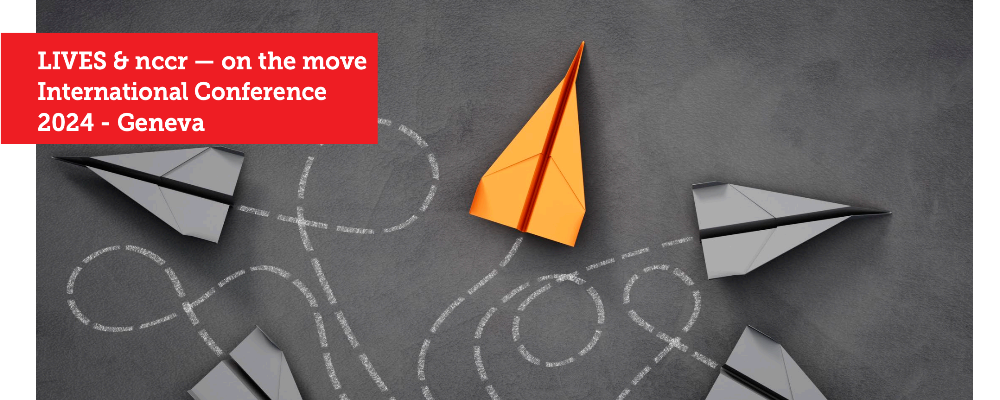
5–6 November 2024 – University of Geneva
The 21st century has introduced new forms of mobility, reshaping migration, family life, careers, and social progress. Yet, these pathways often meet significant resistance: international migration faces strict policies; new family dynamics sometimes clash with cultural norms; emerging career paths can be limited by relocation costs; and social mobility, especially across generations, remains constrained by systems like education. This conference will bring together leading researchers to explore these dynamics through two perspectives developed by the National Centers of Competence in Research (NCCR): the Life Course Perspective Centre LIVES, Lausanne and Geneva, and the migration-mobility nexus the nccr – on the move, Neuchâtel.
The full program is available here.
En quête de sens : la recherche comme levier favorable au changement
Table ronde
Anne Kristol, Caritas Suisse
Yvonne Riaño, Université de Neuchâtel
Ola Söderström, Université de Neuchâtel
Modération: Doris Niragire Nirere, Université de Neuchâtel et Maeva Perrin, Université de Genève

Jeudi 31 octobre 2024, 18:30 – 20:00
La table ronde a lieu en français au Salon du Bleu Café, Faubourg du Lac 27, 2000 Neuchâtel.
Programme (PDF)
Workshop Narratives of Crisis
The team of the project “Narratives of Crisis and Their Influence in Shaping Discourses and Policies of Migration and Mobility” of the nccr – on the move warmly invites proposals to participate in a 1-day workshop to be held online on Wednesday 16 October 2024.
This workshop will provide a small, supportive forum to receive feedback on new research being undertaken in line with the topic Narratives of Crisis: Connecting Local and Global Politics.

Submission is closed. Invited participants who submitted, will be asked to submit draft work by Monday 16 September 2024.
The call can be found here (PDF).
Email inquiries to Angela Smith angela.smith@westernsydney.edu.au or Carol Pierre carol.pierre@unine.ch.
Call for Visiting Fellows – Spring 2025
Short-Term Incoming Fellowships

To enhance international exchange and cooperation, the nccr – on the move offers short-term incoming Visiting Fellowships. The Fellowship Scheme can be used to host senior (PostDoc) and junior (doctoral students and Master’s degree holders) researchers from abroad, who wish to collaborate with the nccr – on the move for a duration of two to three months (shorter or longer stays are possible, if justified).
Applications from researchers coming from or based in a low or middle-income country are particularly encouraged.
Further information on the eligibility and the application and selection procedure can be found here.
Watch the recording of the Information Session which took place on 3 October 2024 here.
The deadline for applications is 15 October 2024.
For any questions, please contact Lucas Oesch, Scientific Officer of the nccr – on the move at visiting@nccr-onthemove.ch.
Reflecting on the Neuchâtel Graduate Conference for Migration and Mobility Studies 2024
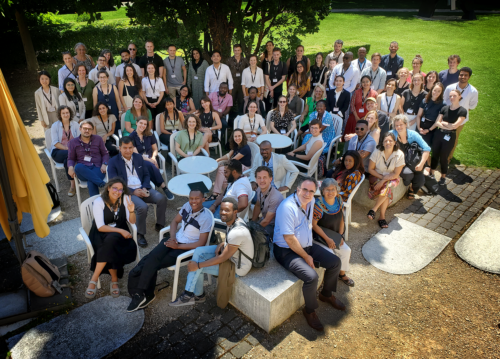
The seventh edition of the Neuchâtel Graduate Conference on the theme “Navigating Turbulences: Interdisciplinary Inquiries into the Transformations of Migration and Mobility in the 21st Century” took place on 11 and 12 July at the University of Neuchâtel and online. The conference provided a stimulating and informal context where researchers from various institutions and interdisciplinary backgrounds could present their ongoing research, get expert feedback, exchange ideas, establish networks, and initiate collaborative work.
The conference came to fruition by the successful endeavor of its organizing committee, composed of nccr – on the move members: Liliana Azevedo, Jennifer Barella, Lucas Oesch, Daniska Tampise Klebo, Maarja Vollmer and Robin Stünzi (chair). The committee, with the assistance of other members, developed the conference theme, reviewed applications, organized panels, planned side activities, chaired sessions, and selected candidates for the Best Paper Award.
The members of the committee received more than 150 applications from young researchers based in 42 countries, which made the task of selecting the successful proposals demanding and the selection process highly competitive. In the end, 64 proposals were accepted and grouped into 16 thematic panels, each addressing a different facet of the broader theme of migration and mobility transformations in the 21st century.
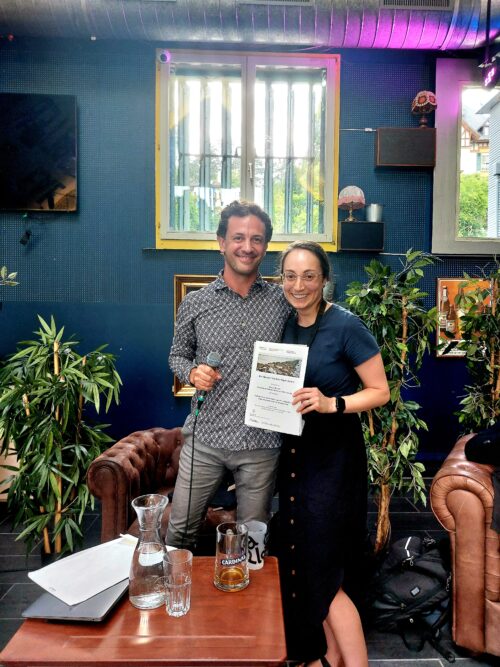
Stacey Haugen, from the University of Alberta and the University of Lethbridge, received the Best Paper Award for her article: “Living in the Uncomfortable: Exploring Extraction in Forced Migration Research Through Story”. The Jury aimed to reward a brilliant reflexive endeavor in the field of forced migration studies, revealing the ethical dilemmas researchers face regarding data collection’s extractive nature, the problematic assumption of researcher objectivity, and the failure to engage in genuine reciprocity.
In addition to the panels, the participants were able to choose between two parallel workshops, one on visual methods led by Amandine Desille (IGOT University of Lisbon) and Suzy Blondin (University of Neuchâtel), and another on categories in quantitative migration research, coordinated by Daniska Tampise Klebo (University of Neuchâtel).
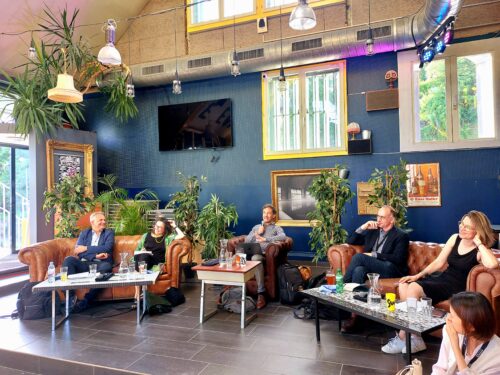 The event also featured an informal discussion on academic failures with panelists Matteo Gianni (University of Geneva), Eva Green (University of Lausanne), Loren Landau (University of Oxford and University of the Witwatersrand), and Tania Zittoun (University of Neuchâtel). Additionally, a round table was held on the nccr – on the move’s approach to migration, mobility, and crisis, featuring Vestin Hategekimana (University of Geneva), Anna Marino, Eloise Thompson, Janine Dahinden, Anita Manatschal, Didier Ruedin, and Lucas Oesch (all from the University of Neuchâtel).
The event also featured an informal discussion on academic failures with panelists Matteo Gianni (University of Geneva), Eva Green (University of Lausanne), Loren Landau (University of Oxford and University of the Witwatersrand), and Tania Zittoun (University of Neuchâtel). Additionally, a round table was held on the nccr – on the move’s approach to migration, mobility, and crisis, featuring Vestin Hategekimana (University of Geneva), Anna Marino, Eloise Thompson, Janine Dahinden, Anita Manatschal, Didier Ruedin, and Lucas Oesch (all from the University of Neuchâtel).
Feedback from participants was overwhelmingly positive. A satisfaction survey indicated high levels of appreciation for the event’s organization and its warm, supportive atmosphere. Participants particularly valued the diversity of attendees and topics, which expanded perspectives on migration research and provided meaningful opportunities for scholars from the Global South. The quality of presentations, discussions, and feedback from senior academics was also praised. However, some areas for improvement were noted, including the conference’s short duration, pre-conference communication issues (especially regarding funding and paper submissions), inconsistent mentor presence in parallel panels, and a lack of representation of non-white and early-career scholars in discussions about academic failures. The detailed results of the survey are available here.
The eighth edition of the conference will take place on 8 and 9 July 2025. For this edition, the organizing committee will address the areas for improvement while preserving its core strengths: the diversity of the abstracts selected, ample time allocated for the paper and expert feedback, the collaborative atmosphere, and constructive interdisciplinary exchanges between junior and senior researchers.
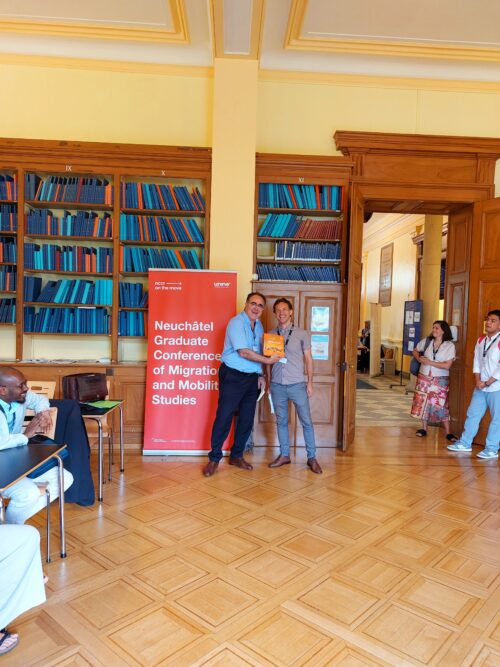
Lampedusa: Thinking Outside the Border
Booklet Launch and Documentary Screening

Thursday, 26 September 2024, 17:00-20:30
La Case à Chocs, Neuchâtel
“Lampedusa: Thinking Outside the Border” is a knowledge transfer event aiming to make academic research on migration and crises accessible and understandable to a broader audience. The event starts with the presentation of the homonymous illustrated booklet, followed by the screening of the docufilm A Nord di Lampedusa “North of Lampedusa”.
The language of the event will be English, with the possibility of asking questions in French and Italian. The organizers will offer translation in French and Italian when needed.
The event will take place at La Case à Chocs, cultural centre and concert venue in Neuchâtel, with the first part happening in the upstairs café-bar Interlope and the screening in their movie room Cinema Minimum.
The full program is available here.
Registrations are now closed.
Neuchâtel Graduate Conference 2024
Navigating Turbulences: Interdisciplinary Inquiries into the Transformations of Migration and Mobility in the 21st Century

University of Neuchâtel 11-12 July 2024
The Neuchâtel Graduate Conference (NGC) is an international graduate conference organized by the nccr – on the move, Swiss National Center of Competence in Research (NCCR) for migration and mobility studies. It provides a stimulating environment in which PhD and Postdoctoral fellows from different universities and research institutions can exchange ideas, establish networks, and initiate collaborative research.
The 7th edition will take place from 11 to 12 July 2024 in Neuchâtel, providing opportunities to meet other researchers in formal and informal gatherings. The topic of this year’s Graduate Conference will be “Navigating Turbulences: Interdisciplinary Inquiries into the Transformations of Migration and Mobility in the 21st Century”.
Main plenary events:
Thursday, 11 July 2024
11:30 – 13:30 Parallel Workshops: Visual Methods; Categories in Quantitative Research
18:00 – 19:30 Informal Discussion on Stories of Failures in Academia (PDF)
Friday, 12 July 2024
12:00 – 13:30 Round Table on NCCR’s Approach to Migration, Mobility and Crisis
Conference Program (PDF)
For more information, please first check out the FAQ, or contact Robin Stünzi, the Education Officer of the nccr – on the move robin.stunzi@nccr-onthemove.ch.
Looking back at the conference here.
The NCCR Approach to Migration, Mobility and Crisis
Round Table at the Neuchâtel Graduate Conference
Janine Dahinden, University of Neuchâtel, nccr – on the move
Anita Manatschal, University of Neuchâtel, nccr – on the move
Didier Ruedin, University of Neuchâtel, nccr – on the move
Lucas Oesch, University of Neuchâtel, nccr – on the move
Vestin Hategekimana, University of Geneva, nccr – on the move
Anna Marino, University of Neuchâtel, nccr – on the move
Eloise Thompson, University of Neuchâtel, nccr – on the move

Friday, 12 July 2023, 12:00 – 13:30
This roundtable will be held in person at the University of Neuchâtel, A.-L. Breguet 2, Room 110, and on WEBEX (link).
Program (PDF)
Reflecting on the Neuchâtel Graduate Conference for Migration and Mobility Studies 2023
The Neuchâtel Graduate Conference’s sixth edition focused on “Migration and Im/Mobility in Times of Entangled Crises: Concepts, Practices, and Challenges,” and took place at the University of Neuchâtel on July 11-12. This year’s conference provided an engaging and informal setting where researchers from diverse institutions and interdisciplinary backgrounds could share ideas, receive expert feedback, network, and initiate collaborative efforts.
Our conference owes its success to the work of its organizing committee, consisting of nccr – on the move members: Caroline Aka, Sara de Athouguia Filipe, Vestin Hategekimana, Doris Niragire Nirere, Oliver Pedersen, Eloise Thompson, and Robin Stünzi (chair). Through collaboration with other members, they conceptualized the conference theme, reviewed applications, selected participants for panels, organized side activities, chaired sessions, and selected candidates for the Best Paper Award.
Despite the challenge posed by the number of applications (over 160) from young researchers in 40 countries, the selection committee narrowed down the accepted proposals to 64, distributed across 16 thematic panels exploring various aspects of the link between crisis, migration, and (im)mobility.
Johannes Bhanye from the University of the Free State received the Best Paper Award for his article, “”Nimble sociality and belonging”: An ethnography of migrants’ responses to bans on associational life during the COVID-19 pandemic.” The jury acknowledged the paper’s well-structured approach, addressing a significant issue and drawing on rich ethnographic data to provide robust and compelling results.
The conference also featured a keynote lecture by Mathias Czaika from the University for Continuing Education Krems, titled “European Migration Governance in the Context of Uncertainty,” available on the nccr – on the move YouTube channel. Lorenzo Piccoli (EUI), our former Scientific Officer, presented insights from the data he had been collecting to establish a Global Directory of Migration Research. His thought-provoking talk and the exchange that followed with the participants are available here.
We also had the pleasure to host a round table on “Migration Governance in Times of Entangled Crises: Lessons from Brazil and South Africa,” including perspectives from Leiza Brumat (Eurac Research, Bolzano), Paulo Sérgio Almeida (UNHCR Brazil), Lily Sanya (IOM South Africa), and Nene Ernest Khalema (School of Built Environment and Development Studies, University of Kwazulu-Natal).
In addition to traditional lectures and panels, our committee organized social activities, such as a guided tour on the traces of slavery in Neuchâtel, a memorable “pub quiz,” and the screening of the movie “Hit the Road” by Panah Panahi.
Participant feedback has been overwhelmingly positive, praising the diversity of participants and topics, presentation quality, and the warm and supportive atmosphere facilitating valuable networking opportunities. Some participants noted room temperature discomfort and challenges in attending desired presentations due to parallel sessions. Constructive recommendations for future editions were noted, particularly concerning the clarity and timeliness of information sent to presenters, discussants, and chairs before the conference. A detailed survey report is available here.
The seventh edition is scheduled for July 11-12, 2024. While maintaining key features, the organizers plan to experiment with the event’s format to enhance further the collaborative and interdisciplinary exchange between junior and senior researchers. We already look forward to welcoming many of you there!
Methods Workshop in Quantitative Text Analysis

3 – 7 June 2024
University of Neuchâtel
This workshop is part of the fourth block Doctoral Program of the nccr – on the move (methods, contents, and skills within the own discipline). We welcome all members of the NCCR community and doctoral students enrolled in a CUSO program to join us.
Detailed program, requirements and practical information can be found here (PDF).
Doctoral students and interested NCCR Fellows are asked to register through this link no later than 31 May 2024.
Unveiling Immigrant Identities in the Digital Sphere
Public Lecture Series
Jisu Kim, Max Planck Institute for Demographic Research

Thursday, 6 June 2024, 15:30 – 17:00
This talk will be held in person at the University of Neuchâtel, Rue Abram-Louis-Breguet 2, room 2.310, and on WEBEX (link).
Program (PDF)
Rethinking Regimes of (Im)Mobility Through Its Past, Present and Future Legacies
International Workshop

Thursday and Friday, 30-31 May 2024
University of Neuchâtel
This event is organized by the team of the nccr – on the move research project “Towards a Novel Mobility Regime? The Legacies of the COVID-19 Pandemic Regarding the Governance of Human Movement”.
The two-day public workshop aims to tackle the critique raised on the ahistoricity of research and theories on mobilities and movements by delving into the question of legacies to make sense of historic and societal transformations in relation to mobilities and movements. To do so, it adopts a focus on the problematics of legacies; as a tool, object of study or basic posture through which to conceptualize and empirically study the complex temporal logics that are behind, inherent in and developing from differing regimes of (im)mobility. Invited scholars will present their contribution based on empirical and/or conceptual analysis to discuss around the question: what can we learn from studying mobilities and movements if we orient our analysis around the concept of legacies?
More Information and Program (PDF)
The workshop will be held at the University of Neuchâtel, Room RS38, Faculté des lettres et sciences humaines, Espace Tilo-Frey.
The event is open to the public to join the discussion, please register by Thursday 16th May at this link https://forms.gle/358AXrf67o3EsBfx6.
Refugee Shocks: What the Sudden Arrival of Many Refugees Does to Others
Workshop

This workshop will take place on Friday 31 May at the University of Neuchâtel, Av. du Premier Mars 26, Room D63.
Please register through this link no later than Monday 20 May 2024.
Program and detailed information can be found here (PDF)
(Re)searching for a Nexus: Contemporary Youth between Mobility and Migration
Workshop

23 – 24 May 2024
University of Neuchâtel
This workshop investigates the link between migration and mobility through the perspective of youth studies in order to reflect on the means and reasons why young people move around Europe. These means and reasons transform the biographical experience of a generation that is used to hearing about crises in relation to migration and opportunities in relation to mobility, but whose division cannot be so clear-cut as to ignore the grey spaces where these two areas meet, thus producing new social dynamics that it is important to account for.
Detailed program and description can be found here (PDF).
Please register through this link no later than 22 May 2024.
‘Like Swimming in a Swimming Pool’: The Temporal Complexity of Mobility in a Multilayered Approach
Public Lecture Series
Valentina Cuzzocrea, University of Cagliari

Friday, 24 May 2024, 17:00 – 19:00
This talk will be held in person at the University of Neuchâtel, Av. Du 1er Mars 26, room B41, and on WEBEX (link).
Program (PDF)
Moving from Youth Migration to Mobility: Spatial Distinction and the Evolution of the Mobilities/Transitions Nexus
Public Lecture Series
David Cairns, ISCTE-University Institute of Lisbon

Thursday, 23 May 2024, 17:30 – 19:00
This talk will be held in person at the University of Neuchâtel, Av. Du 1er Mars 26, room B41, and on
WEBEX (link).
Program (PDF)
Emotions in Fieldwork
Workshop

Friday, 17 May 2024, 09:15 – 16:30
University of Neuchâtel
This workshop is part of the Doctoral Program of the nccr – on the move, and all members of the NCCR community and doctoral students enrolled in a CUSO program are welcome to attend.
Program:
- 9.15 The Encounter of Sensitivities: Empathy at Work in Qualitative Research
Giulia Salzano, University of Perugia - 11:15 Self-Reflexivity in Social Research: Practical Tools for the Researcher and his/her Research
Alessandra Polidori, University of Neuchâtel - 14:00 What to Say, What Not to Say, in Our Encounters with Bereaved And/or Traumatized People?
Jean-Claude Métraux, psychiatrist and psychotherapist, Lausanne - 15:45 Conclusion
The Workshop will be held at the University of Neuchâtel, Av.du 1er mars 26, 2000 Neuchâtel, room D62.
Program and detailed information (PDF).
Please register here no later than 15 May.
Race and Racialization in Switzerland and Beyond
Research Day

Friday, 3 May 2024, 10:00 – 15:45
University of Neuchâtel
This Research Day is part of the Doctoral Program of the nccr – on the move.
Program:
- 10:00 Fellows Workshop
Shyaka Kagame, Documentary Filmmaker - 11:45 ‘My Home Is…’ – Belongingness(ES) in the Narratives of Descendants of Migrants in Switzerland From an Intersectional Approach. A Case Study
Valérie Baggi, University of Geneva
- 14:00: Labor Recruitment and Coloniality in the Agricultural Sector: On Plantation Archives, Underclassing, and Postcolonial Masculinities in Switzerland
Dina Bolokan, University of Basel - 15:00: Civil Society Actors Operating in the Field of Migration and Asylum in Izmir: A Network Approach
Cansu Akbaş Demirel, Visiting Fellow, GAR-Göç Araştırmaları Derneği
The Research Day will be held at the University of Neuchâtel, Av. du 1er-Mars 26, Room B41 and on Webex (link).
Program and detailed information (PDF).
Please register here.
(Re)penser les notions de race et racialisation: Dialogue croisé entre art et sciences sociales
Table ronde
Pamela Ohene-Nyako, doctorante, Université de Genève
Shyaka Kagame, réalisateur documentaire
Modération: Caroline Aka, doctorante, Université de Neuchâtel

Jeudi 2 mai 2024, 18:00 – 19:30
La table ronde a lieu en français dans les locaux de L’AMAR – Lieu Autogéré Multiculturel d’Accueil et de Rencontres, Rue de la Coquemène 1, Neuchâtel
Programme (PDF)
Building Empirical Evidence: Ethical and Inclusive Strategies for Data Collection
Core Course

Wednesday 17 April 2024
University of Neuchâtel
This course is part of Doctoral Program of the nccr – on the move. We welcome all members of the NCCR community and doctoral students enrolled in a CUSO program to join us.
This problem-based course is designed to equip participants with ethical and practical strategies for data collection in social sciences. The course is organized around critical discussions in groups, and the outcome of these discussions should allow participants to have ready-to-go checklists and written materials they can use for their research. The course is primarily designed for qualitative researchers, but many of the questions discussed are also of great importance for quantitative data collection.
The course will be held at the University of Neuchâtel, Av. Abram-Louis Breguet 2, Room 2.310.
Please register through this link no later than 12 April 2024.
Program and detailed information can be found here (PDF)
Call for Visiting Fellows – Fall 2024
Short-Term Incoming Fellowships

To enhance international exchange and cooperation, the nccr – on the move offers Visiting Fellowships for senior and junior researchers from abroad, who wish to collaborate with our network for a duration of two to three months.
Further information on the eligibility and the application and selection procedure can be found here.
The deadline for application is 31 March 2024.
For questions, please contact the Education, Careers and Equal Opportunities Officer of the nccr – on the move robin.stunzi@nccr-onthemove.ch
Enjeux croisés entre « race » et genre
Table ronde
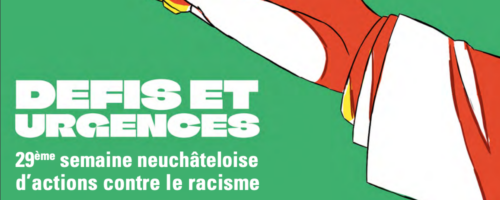
À l’occasion de la 29e édition de la semaine neuchâteloise d’actions contre le racisme (SACR) axée sur le thème « Droits humains, défis et urgences », le Bureau égalité et diversité de l’Université de Neuchâtel et le nccr – on the move proposent une table ronde sur le thème des enjeux croisés entre « race » et genre.
Dans le champ de la sociologie, la perspective intersectionnelle vise à saisir l’expérience des personnes subissant plusieurs formes de discrimination à la fois. La notion d’intersectionnalité commence à émerger dans les débats publics et politiques, la rendant incontournable lorsqu’on aborde des questions de discriminations. Cette table ronde propose un échange sur les enjeux croisés entre « race » et genre, notamment par le biais de travaux universitaires et d’expériences du terrain. Ces perspectives variées permettront de discuter l’importance de penser conjointement les rapports de genre et de « race », et les enjeux qu’ils posent pour la défense de la dignité et Droits Humains.
Intervenant-e-s :
- Saoussen Hammami, membre du collectif féministe des Foulard Violets ;
- Manuela Honegger Heller, membre du collectif neuchâtelois pour la grève féministe ;
- Grégory Jaquet, chef de Service de la cohésion multiculturelle (COSM) ;
- Anaïd Lindemann, Dre. en sciences sociales et post doctorante au SFM, spécialisée en sociologie des religions;
- Daniska Tampise Klebo, assistante doctorante au nccr – on the move.
Modérateur : Robin Stünzi, Responsable de l’éducation, des carrières et de l’égalité des chances au sein du nccr – on the move, spécialiste des questions de migration.
La table ronde aura lieu le 28 mars 2024 à 18h à l’Université de Neuchâtel, Salle C46 (1er étage), Avenue du 1er mars 26.
Le programme complet de la SACR peut être trouvé ici.
Personnes réfugiées d’Ukraine en Suisse: Quels défis et leçons après deux ans ?
Table ronde d’expert·e·s

Vendredi 15 mars 2024, 10:30 – 17:30, Allresto Kongresszentrum, Effingerstrasse 20, Berne
Plus de 100 participant·e·s issu·e·s de l’administration fédérale, de gouvernements cantonaux, d’oeuvres d’entraide et d’ONGs, de la communauté ukrainienne, d’associations patronales, d’organisations internationales, ainsi que des chercheur·euse·s et des personnes intéressées se sont réuni·e·s le 15 mars 2024 à Berne, à l’invitation du Pôle de recherche national « nccr – on the move » et du Bureau du HCR pour la Suisse et le Liechtenstein, l’Agence des Nations Unies pour les réfugiés, pour débattre du thème “Personnes réfugiées d’Ukraine en Suisse : Quels défis et leçons après deux ans ?”
Nous avons résumé les principales conclusions de la table ronde sous forme de trois questions-réponses pour chaque panel.
La modération de l’événement a été assurée par Inés Mateos.
Après une introduction de Gianni D’Amato (nccr – on the move) et Anja Klug (UNHCR) et avant le premier panel, Yelyzaveta Glynko et Peter Moozolevskyi (NCBI) ont pris la parole. Les deux réfugié·e·s ukrainien·ne·s ont partagé quelques réflexions quant au statut S et aux opportunités et défis de celui-ci. Au-delà des opportunités dont iels ont pu bénéficier grâce à leur statut, iels ont mentionné la nécessité de prolonger le statut S dans le temps, de simplifier la reconnaissance des diplômes, ainsi que d’améliorer la communication et les ponts envers la communauté ukrainienne.
Intégration dans le marché du travail
Panel avec:
- Isabelle Moret, Conseillère d’Etat et Cheffe du Département de l’économie, de l’innovation, de l’emploi et du patrimoine DEIEP, Canton de Vaud
- Philipp Berger, Responsable de la Division Admission marché de travail, Secrétariat d’État aux migrations SEM
- Daniella Lützelschwab, Responsable du secteur Marché de travail, Union Patronale Suisse
- Andrej Lushnycky, Consul, Consulat honoraire d’Ukraine en Suisse
Ce panel s’est penché sur les défis et les stratégies pour augmenter le taux d’emploi des réfugié·e·s ukrainien·ne·s en Suisse.
Le Conseil Fédéral a récemment fait part du souhait de relever le taux d’occupation des personnes réfugiées d’Ukraine de 20 à 40%. Quels sont les défis rencontrés dans l’intégration des réfugié·e·s ukrainien·ne·s sur le marché du travail suisse ?
Isabelle Moret a exprimé des doutes quant à l’objectif fixé par le Conseil Fédéral, tout en soulignant que 100% des réfugié·e·s ukrainien·ne·s devraient être actif·ve·s selon leur âge et situation personnelle (éducation, formation, se soigner, travail, garde d’enfants). Selon elle, pour atteindre ces objectifs il faut mettre en place un soutien approprié en termes d’apprentissage des langues, de soins, de formation, et de reconnaissance des diplômes. Philipp Berger a mentionné que le SEM travaille à l’élaboration de mesures visant à atteindre l’objectif de 40% d’emploi, et il est confiant que le développement de ces mesures pourra également bénéficier à d’autres groups de réfugié·e·s. La réalisation de cet objectif, a été considérée par Daniella Lützelschwab comme très ambitieuse, en particulier en raison des difficultés des entreprises à savoir où et comment recruter des réfugié·e·s ukrainien·ne·s. Andrej Lushnycky, de son côté, y voit un message symbolique du monde politique, montrant que l’on est prêt à soutenir les réfugié·e·s ukrainien·ne·s dans leur intégration. Mais il a ajouté que cet objectif ne concerne qu’une partie de ce groupe, les personnes âgées et les personnes en formation n’en font pas partie.
Comment surmonter les obstacles tels que la reconnaissance des diplômes, l’acquisition de compétences linguistiques et le ‘matching’ avec les emplois disponibles ?
Andrej Lushnycky a plaidé en faveur d’une approche plus flexible dans la reconnaissance des diplômes et la validation des compétences, soulignant les différences entre les systèmes éducatifs ukrainien et suisse – « en Suisse il faut un diplôme même pour faire du bénévolat », a-t-il souligné. Daniella Lützelschwab a proposé une collaboration étroite avec les branches professionnelles pour standardiser le processus de ‘matching’ et de reconnaissance des compétences. En continuité avec cela, Isabelle Moret a partagé l’exemple du projet entre le Canton de Vaud et GastroVaud, basé sur la création de formations courtes spécifiques à la branche en question pour répondre aux besoins immédiats de main-d’œuvre.
Quelles stratégies peuvent être mises en œuvre pour améliorer l’intégration et le taux d’emploi des réfugié·e·s ukrainien·ne·s, à la fois à court et à long terme ?
En réponse à cette question, Andrej Lushnycky a suggéré des programmes dits d’incubation pour encourager l’entrepreneuriat parmi les réfugié·e·s ukrainien·ne·s, et a souligné l’importance de réfléchir à des mesures qui puissent être utiles dans le court et moyen terme en Suisse, comme dans le long-terme en Ukraine, en cas de retour. Philipp Berger a confirmé l’intérêt de la Confédération pour mettre en place des programmes, par exemple de formation, qui puissent être utiles autant dans le pays d’arrivée que d’origine. Daniella Lützelschwab a souligné la nécessité d’avoir des informations supplémentaires pour soutenir l’embauche, notamment sur la durée de validité du statut S. Isabelle Moret a, de son côté, aussi mis en avant les défis liés à la garde d’enfants et à l’accès à l’éducation.
En conclusion, le panel a identifié plusieurs défis et solutions potentielles pour améliorer l’intégration des réfugié·e·s ukrainien·ne·s sur le marché du travail suisse, mettant en avant la nécessité d’une approche holistique et collaborative pour surmonter ces obstacles. La discussion a souligné l’importance de la flexibilité, de la formation adaptée et de la reconnaissance des compétences pour favoriser une intégration réussie.
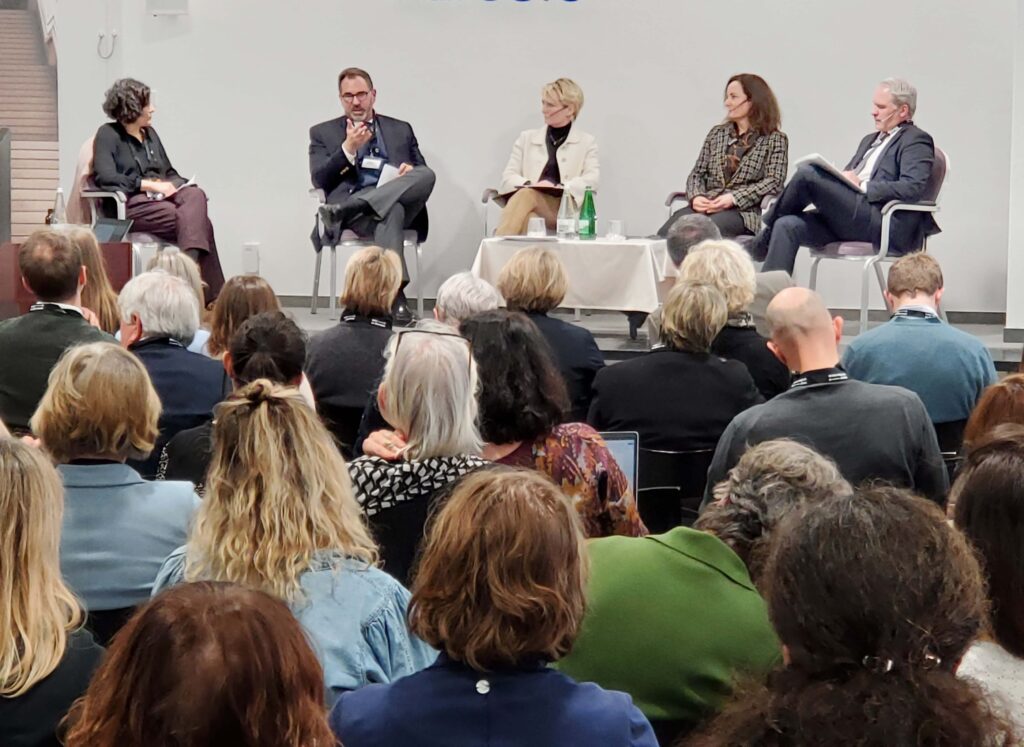
Hébergement privé
Panel avec:
- Oleksandra Tarkhanova, Chercheuse postdoctorale à l’Institut de sociologie, Université de Neuchâtel
- Bianca Schenk, Responsable du domaine de direction familles d’accueil, Organisation suisse d’aide aux réfugiés OSAR
- Dominik Hangartner, Co-directeur de l’Immigration Policy Lab, ETH Zürich
- Sophie Buchs, Directrice de Caritas Genève
L’hébergement privé des personnes réfugiées est un sujet complexe qui soulève des questions scientifiques, politiques et pratiques importantes. Ce panel a abordé ces questions sous différents angles, mettant en lumière les défis, les avantages et les implications de cette pratique.
Dans quelle mesure l’hébergement privé est-il intéressant d’un point de vue sociologique et politique ?
Oleksandra Tarkhanova a souligné l’importance cruciale des réseaux sociaux dans le processus d’intégration des personnes réfugiées. Pour ces individus, les quelques personnes qu’ils connaissent en Suisse deviennent des points d’ancrage essentiels, et ces connexions influencent leur vie quotidienne et l’adaptation à leur nouveau contexte. Dominik Hangartner a mis en évidence le rôle de l’hébergement privé dans le soulagement du système d’asile, ainsi que dans le renforcement de la solidarité civile envers les personnes réfugiées. Avec son équipe, il travaille sur un algorithme qui veut aider le ‘matching’ dans l’accueil privé, entre les hôtes et les personnes logées.
Quelles sont les expériences pratiques et les leçons apprises de l’hébergement privé des réfugié·e·s ?
Sophie Buchs a partagé les expériences de l’introduction de l’hébergement privé à Genève, programme lancé pour la première fois dans le contexte de l’arrivée des réfugié·e·s ukrainien·ne·s. Elle a souligné les avantages à long terme de l’hébergement privé, notamment en termes d’intégration sociale, linguistique et professionnelle. Sophie Buchs a aussi parlé de l’utilisation des algorithmes de ‘matching’ entre les réfugié·e·s et les familles d’accueil à Genève, en abordant les défis initiaux rencontrés dans ce processus, tels que des appariements moins réussis lorsque les critères de sélection étaient insuffisants. Bianca Schenk a complété en partageant les bénéfices observés de l’hébergement privé, notamment son rôle dans la création de liens sociaux et la sensibilisation de la population résidante aux besoins des réfugié·e·s. Oleksandra Tarkhanova a expliqué comment dans leur étude, ces dynamiques ont également été observées, et surtout comment l’accueil chez des privés équivaut à “avoir quelqu’un dans son coin” et promouvoir un sentiment de sécurité. Malgré ces aspects encourageants, il y a aussi des défis qui vont de pair avec l’hébergement privé. Notamment, les participant·e·s mettent en avant l’importance de trouver des bons ‘matching’, les différents états émotionnels, tant des accueilli·e·s que des accueillant·e·s, et le manque d’accompagnement des autorités dans ce sens, ainsi que la baisse du nombre de personnes disponibles à héberger des personnes réfugié·e·s une fois la période de ‘crise’ passée. “Le soutien des autorités à l’hébergement privé avec un cadre et un soutien professionnel, ainsi qu’une assurance qualité”, sont absolument nécessaire selon Bianca Schenk et les autres intervenant·e·s pour que ces pratiques soient durables et réussies.
Quel est l’impact (politique) de l’hébergement privé des réfugié·e·s et comment maintenir cet engagement ?
Bianca Schenk et Sophie Buchs ont souligné comment, en 2022, l’hébergement privé des personnes réfugiées d’Ukraine était surtout une question d’urgence de logement. Nous nous retrouvons maintenant dans une autre phase, où l’accent va être mis plus sur l’hébergement comme relation d’accueil et d’intégration, et il faut donc trouver des familles et des individus disponibles à s’investir dans cela. « Avoir un premier temps où l’on se dit je vais accueillir pour trois mois quelqu’un peut aider pour voir si ça marche pour nous ou pas », a partagé Sophie Buchs. Les intervenant·e·s ont également signalé comment cette expérience généralement positive de l’hébergement privé peut servir d’exemple pour élargir ces pratiques à d’autres populations réfugiées que celle d’Ukraine. Dominik Hangartner a aussi souligné comment l’hébergement privé encourage la solidarité et aide à soulager la structure ordinaire d’accueil. En somme, les intervenant·e·s ont souligné l’importance de soutenir l’engagement des familles/individus d’accueil, sans oublier le rôle positif que la diaspora ukrainienne peut jouer dans l’intégration des réfugié·e·s.
En conclusion, ce panel a mis en lumière l’importance de l’hébergement privé des réfugié·e·s tant d’un point de vue scientifique que politique. En explorant les expériences pratiques, les leçons apprises et les implications politiques de cette pratique, les expert·e·s ont offert un aperçu nuancé des défis et des opportunités associés à l’accueil des réfugié·e·s chez des personnes privées. Il est clair que l’hébergement privé peut jouer un rôle crucial dans l’intégration des réfugié·e·s, mais cela nécessite un soutien continu, une professionnalisation et une sensibilisation de la part des autorités et de la société dans son ensemble.

Activation du statut S: bilan et leçons
Panel avec:
- Cesla Amarelle, Professeure à la Faculté de droit, Université de Neuchâtel
- Anja Klug, Cheffe du Bureau du HCR pour la Suisse et le Liechtenstein
- Claudio Martelli, Directeur suppléant du Secrétariat d’État aux migrations SEM
Le panel sur l’activation du statut S a mis en lumière plusieurs points clés et a permis de tirer des leçons importantes de cette expérience.
Quels étaient les premières impressions et défis lors de l’activation du statut S ?
Les intervenant·e·s ont tout d’abord fait part de leurs réactions diverses à l’activation du statut S pour la première fois dans l’histoire de la Suisse. Cesla Amarelle a fait le parallèle avec des situations historiques similaires, notamment en référence aux événements de l’ex-Yougoslavie et la réponse de la Suisse à cette situation. Claudio Martelli a exprimé son incrédulité face aux images du 24 février 2022, soulignant que même si son administration avait envisagée divers scénarios, l’agression russe de l’Ukraine les avait pris par surprise. Il a souligné la nécessité d’une réaction rapide et l’importance du statut S dans la gestion de la crise, notamment en permettant de mobiliser rapidement les structures d’accueil établies pendant la pandémie de Covid-19. Anja Klug s’est rappelé de la création des directives de protection temporaire de l’UE qui, comme le statut S en Suisse, n’avaient jamais été activées auparavant. C’est uniquement au moment où ces outils ont été activés, que l’on a vu tout leur sens.
Quels sont les avantages et limites du statut S, et quelles leçons en tirer pour l’avenir ?
Les intervenant.e.s ont identifié plusieurs avantages et limites liés au statut S. D’une part, ils ont souligné son utilité immédiate pour soulager la pression sur le système d’asile suisse et pour offrir une protection temporaire aux personnes fuyant la guerre en Ukraine. Claudio Martelli a salué la capacité du système d’asile à continuer à fonctionner habituellement malgré l’activation du statut S, soulignant les efforts massifs des cantons, des communes et de la société civile. Pour ce qui concerne les limites du statut S, Cesla Amarelle a parlé d’un système très hybride à géométrie variable au niveau des droits, qui pose des questions de discrimination notamment avec les autres statuts. D’autres défis évoqués incluent notamment ceux liés à la durée de séjour limitée (ou non clairement définie) et à l’ambiguïté quant au message sur l’intégration des bénéficiaires. En effet, ce statut a été prévu pour une (très) courte durée, mais la situation actuelle remet en question cette temporalité ; il s’agit donc de comprendre comment concilier intégration des personnes réfugiées d’Ukraine et une perspective de potentiel retour. “L’inclusion des réfugié.e.s ukrainien.ne.s dans le système suisse n’est pas seulement importante pour leur vie en Suisse. Le maintien et la promotion de la capacité d’action (agency) sont également très importants pour un retour futur”, c’est ainsi qu’Anja Klug a résumé l’ambivalence du statut S à laquelle il faut faire face aujourd’hui.
Quelles sont les implications du statut S pour (l’avenir de) la politique d’asile suisse ?
Cesla Amarelle a mis en avant la nécessité d’une approche plus globale et à long terme de la politique d’asile suisse, pour développer une architecture de protection cohérente et ainsi éviter les erreurs passées liées à la lente intégration des réfugié·e·s avec statut F dans le marché du travail suisse. Anja Klug a aussi appelé à une harmonisation des différentes formes de protection des réfugié·e·s et à la création de passerelles entre les statuts. Elle a également plaidé en faveur de l’octroi du statut de réfugié aux personnes fuyant les zones de guerre. Cela est possible si l’on interprète la Convention de Genève relative au statut de réfugiés de manière moins restrictive et en fonction de l’intérêt de protection. Claudio Martelli a souligné comment la révision de la loi sur l’asile de 2019, ainsi que l’introduction de l’Agenda Intégration Suisse ont rendu le système d’asile suisse assez stable pour que des situations comme l’activation du statut S puissent être bien gérée.
En conclusion, le panel a souligné la nécessité de maintenir une approche flexible et cohérente pour faire face aux défis des personnes réfugiées, tout en apprenant des expériences passées et en adoptant une vision plus holistique pour l’avenir de la politique d’asile en Suisse.
Le copyright pour les photos est détenu par nccr – on the move 2024.
La version allemande de ce résumé de la table ronde est disponible ici.
Lien programme (pdf)
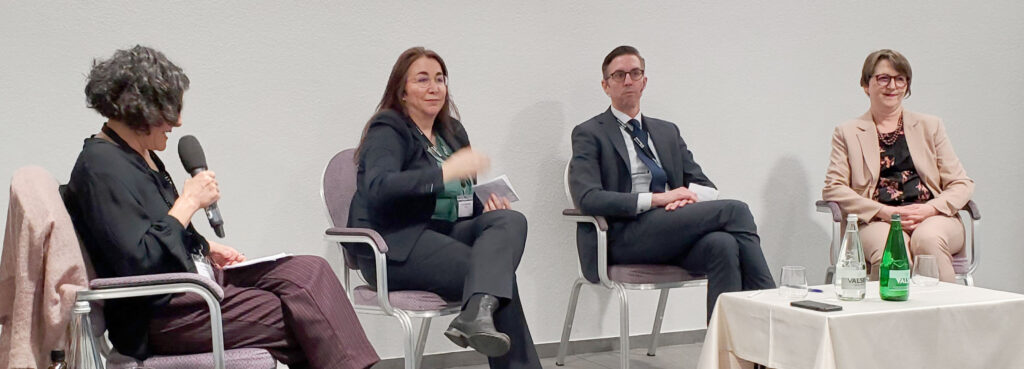
Flüchtlinge aus der Ukraine in der Schweiz: Was sind die Herausforderungen und Lehren nach zwei Jahren?
Dialog unter Expertinnen und
Experten

Freitag 15. März 2024, 10:30-17:30, Allresto Kongresszentrum, Effingerstrasse 20, Bern
Mehr als 100 Teilnehmende aus der Bundesverwaltung, kantonalen Regierungen, Hilfswerken und NGOs, der ukrainischen Gemeinschaft, Arbeitgeberverbänden, internationalen Organisationen sowie Forscher*innen und Interessierte trafen sich am 15. März 2024 auf Einladung des Nationalen Forschungsschwerpunkts nccr – on the move und des Büro für die Schweiz und Liechtenstein der UN-Flüchtlingsorganisation (UNHCR) in Bern, um das Thema “Flüchtlinge aus der Ukraine in der Schweiz: Was sind die Herausforderungen und Lehren nach zwei Jahren?” zu diskutieren.
Wir haben die wichtigsten Ergebnisse der Veranstaltung in Form von drei Fragen und Antworten für jedes Panel zusammengefasst.
Die Veranstaltung wurde von Inés Mateos moderiert.
Nach einer Einführung von Gianni D’Amato (nccr – on the move) und Anja Klug (UNHCR) und vor der ersten Podiumsdiskussion ergriffen Yelyzaveta Glynko und Peter Moozolevskyi (NCBI) das Wort. Die beiden ukrainischen Flüchtlinge teilten einige Überlegungen über den Status S und die damit verbundenen Chancen und Herausforderungen. Neben den Möglichkeiten, die sich ihnen durch ihren Status eröffnet haben, betonten sie die Notwendigkeit, den Status S zu verlängern, die Anerkennung von Bildungsabschlüssen zu vereinfachen sowie die Kommunikation und den Brückenschlag zur ukrainischen Gemeinschaft zu verbessern.
Integration in den Arbeitsmarkt
Panel mit:
- Isabelle Moret, Staatsrätin und Vorsteherin des Departements für Wirtschaft, Innovation, Beschäftigung und Kulturerbe DEIEP, Kanton Waadt
- Philipp Berger, Chef der Abteilung Zulassung Arbeitsmarkt, Staatssekretariat für Migration SEM
- Daniella Lützelschwab, Ressortleiterin Arbeitsmarkt, Schweizerischer Arbeitgeberverband
- Andrej Lushnycky, Honorarkonsul der Ukraine in der Schweiz und Vorsitzender des Ukrainischen Vereins der Schweiz
Dieses Panel befasste sich mit den Herausforderungen und Strategien zur Erhöhung der Beschäftigungsquote von ukrainischen Flüchtlingen in der Schweiz.
Der Bundesrat hat kürzlich den Wunsch geäussert, die Beschäftigungsquote für Flüchtlinge aus der Ukraine von 20 auf 40% zu erhöhen. Welche Herausforderungen gibt es bei der Integration von ukrainischen Flüchtlingen in den Schweizer Arbeitsmarkt?
Isabelle Moret äusserte Zweifel am Ziel des Bundesrates, betonte jedoch, dass 100% der ukrainischen Flüchtlinge ihrem Alter und ihrer persönlichen Situation entsprechend eingebunden sein sollten (Bildung, Ausbildung, Selbstfürsorge, Arbeit, Kinderbetreuung). Um diese Ziele zu erreichen, müsse eine angemessene Unterstützung in den Bereichen Spracherwerb, Pflege, Ausbildung und Anerkennung von Diplomen bereitgestellt werden. Philipp Berger erwähnte, dass das SEM an der Entwicklung von Massnahmen arbeite, um das Ziel einer 40-prozentigen Beschäftigung zu erreichen, und er zeigte sich zuversichtlich, dass die Entwicklung dieser Massnahmen auch anderen Flüchtlingsgruppen zugutekommen kann. Daniella Lützelschwab betrachtete die Erreichung dieses Ziels als sehr ehrgeizig, insbesondere aufgrund der Schwierigkeiten der Unternehmen, herauszufinden, wo und wie sie ukrainische Flüchtlinge einstellen könnten. Andrej Lushnycky hingegen sah darin eine symbolische Botschaft der Politik, die zeige, dass man bereit sei, ukrainische Flüchtlinge bei ihrer Integration zu unterstützen. Er fügte jedoch hinzu, dass dieses Ziel nur für einen Teil dieser Gruppe gelten könne, ältere Menschen und Personen in der Ausbildung seien nicht darunter.
Wie können Hindernisse wie die Anerkennung von Abschlüssen, der Erwerb von Sprachkenntnissen und das ‘Matching’ mit verfügbaren Arbeitsplätzen überwunden werden?
Andrej Lushnycky plädierte für einen flexibleren Ansatz bei der Anerkennung von Abschlüssen und der Validierung von Kompetenzen und wies auf die Unterschiede zwischen dem ukrainischen und dem schweizerischen Bildungssystem hin – “in der Schweiz braucht man sogar für Freiwilligenarbeit einen Abschluss”, betonte er. Daniella Lützelschwab schlug eine enge Zusammenarbeit mit den Branchenverbänden vor, um den Prozess des ‘Matching’ und der Anerkennung von Kompetenzen zu standardisieren. In diesem Zusammenhang erwähnte Isabelle Moret das Beispiel des Projekts zwischen dem Kanton Waadt und GastroVaud, das auf der Schaffung spezifischer, kurzer Schulungen für die betreffende Branche basiert, um den unmittelbaren Bedarf an Arbeitskräften zu decken.
Welche Strategien können angewendet werden, um die Integration und die Beschäftigungsquote von ukrainischen Flüchtlingen sowohl kurz- als auch langfristig zu verbessern?
Als Antwort auf diese Frage schlug Andrej Lushnycky sogenannte Inkubationsprogramme zur Förderung des Unternehmertums unter ukrainischen Flüchtlingen vor und betonte, wie wichtig es sei, über Massnahmen nachzudenken, die kurz- und mittelfristig in der Schweiz wie auch langfristig in der Ukraine im Falle einer Rückkehr von Nutzen sein könnten. Philipp Berger bestätigte das Interesse des Bundes an der Einführung von Programmen, z. B. Ausbildungsprogrammen, die sowohl im Ankunfts- als auch im Herkunftsland nützlich sein können. Daniella Lützelschwab betonte die Notwendigkeit zusätzlicher Informationen zur Unterstützung von Einstellungen, insbesondere über die Gültigkeitsdauer des Status S. Isabelle Moret hob ihrerseits die Herausforderungen im Zusammenhang mit der Kinderbetreuung und dem Zugang zu Bildung hervor.
Insgesamt identifizierte das Panel mehrere Herausforderungen und potenzielle Lösungen zur Verbesserung der Integration ukrainischer Flüchtlinge in den Schweizer Arbeitsmarkt und betonte die Notwendigkeit eines ganzheitlichen und kooperativen Ansatzes, um diese Hindernisse zu überwinden. Die Diskussion betonte die Notwendigkeit, flexibel zu bleiben, Aus- oder Weiterbildungen zu unterstützten sowie die Anerkennung von Kompetenzen zu fördern, um eine erfolgreiche Integration zu gewährleisten.

Private Unterbringung
Panel mit:
- Oleksandra Tarkhanova, Postdoktorandin am Institut für Soziologie, Universität Neuchâtel
- Bianca Schenk, Leiterin des Gastfamilienprojekts, Schweizerische Flüchtlingshilfe SFH
- Dominik Hangartner, Co-Direktor Immigration Policy Lab, ETH Zürich
- Sophie Buchs, Direktorin Caritas Genf
Die private Unterbringung von Flüchtlingen ist ein komplexes Thema, das wichtige wissenschaftliche, politische und praktische Fragen aufwirft. Das Panel beleuchtete diese Fragen aus verschiedenen Blickwinkeln und diskutierte die Herausforderungen, Vorteile und Auswirkungen dieser Praxis.
Inwiefern ist die private Unterbringung aus soziologischer und politischer Sicht interessant?
Oleksandra Tarkhanova betonte die wichtige Bedeutung sozialer Netzwerke für den Integrationsprozess von Flüchtlingen. Für sie werden die wenigen Personen, die sie in der Schweiz kennen, zu wichtigen Ankerpunkten, und diese Verbindungen beeinflussen ihr tägliches Leben und ihre Anpassung an ihre neue Umgebung. Dominik Hangartner hob die Rolle der privaten Unterbringung bei der Entlastung des Asylsystems sowie bei der Stärkung der gesellschaftlichen Solidarität mit geflüchteten Menschen hervor. Mit seinem Team arbeitet er an einem Algorithmus, der das ‘Matching’ bei einer privaten Unterbringung zwischen Gastgebenden und untergebrachten Personen unterstützen soll.
Was sind die praktischen Erfahrungen und die daraus gewonnenen Lehren bei der privaten Unterbringung von Flüchtlingen?
Sophie Buchs berichtete über die Erfahrungen der Einführung der privaten Unterbringung in Genf, ein Projekt, das erstmals im Zusammenhang mit der Ankunft ukrainischer Flüchtlinge eingeführt wurde. Sie betonte die langfristigen Vorteile der privaten Unterbringung, insbesondere im Hinblick auf die soziale, sprachliche und berufliche Integration. Sophie Buchs sprach ebenfalls über die Verwendung von ‘Matching’-Algorithmen zwischen Flüchtlingen und Gastfamilien in Genf und erläuterte dabei die anfänglichen Herausforderungen, die in diesem Prozess auftraten, wie etwa weniger erfolgreiche ‘Matchings’, wenn die Auswahlkriterien unzureichend waren. Bianca Schenk führte aus, dass sie dieselben Vorteile der privaten Unterbringung beobachtete, insbesondere deren Rolle bei der Schaffung sozialer Bindungen und der Sensibilisierung der Wohnbevölkerung für die Bedürfnisse von Flüchtlingen. Oleksandra Tarkhanova erklärte, wie diese Dynamiken auch in ihrer Studie beobachtet wurden, und vor allem, wie die Aufnahme bei Privatpersonen ein Gefühl der Sicherheit fördert. Trotz dieser ermutigenden Aspekte gebe es auch Herausforderungen, die mit der privaten Unterbringung einhergehen. Die Expert*innen betonten insbesondere die Wichtigkeit, ein gutes ‘Matching’ zu finden, die unterschiedlichen emotionalen Zustände sowohl der Gastgeber*innen als auch der untergebrachten Personen und die fehlende Unterstützung der Behörden in dieser Hinsicht sowie die sinkende Anzahl an Personen, die bereit sind, Flüchtlinge zu beherbergen, sobald eine akute ‘Krise’ vorüber ist. “Die Unterstützung der Behörden für die private Unterbringung mit einem professionellen Rahmen, sowie eine Qualitätssicherung” sind laut Bianca Schenk und den anderen Expert*innen absolut notwendig, damit dieses Unterbringungsmodell nachhaltig und erfolgreich sein kann.
Welche (politischen) Auswirkungen hat die private Unterbringung von Flüchtlingen und wie kann dieses Engagement aufrechterhalten werden?
Bianca Schenk und Sophie Buchs betonten, dass im Jahr 2022 die private Unterbringung von Flüchtlingen aus der Ukraine vor allem eine Frage der Dringlichkeit war. In der aktuellen Phase liegt der Schwerpunkt zunehmend auf der Unterbringung bei Gastfamilien als Mittel zur Integration, weshalb Familien und Einzelpersonen gefunden werden müssten, die bereit sind, sich entsprechend zu engagieren. “Eine erste Zeit, in der man sich sagt, ich nehme jemanden für drei Monate auf, kann hilfreich sein, um zu sehen, ob es funktioniert oder nicht”, sagte Sophie Buchs. Die Redner*innen wiesen auch darauf hin, dass diese generell positive Erfahrung mit der privaten Unterbringung als Vorbild für dessen Ausweitung auf weitere Flüchtlingsgruppen dienen könne. Dominik Hangartner betonte zudem, dass private Unterkünfte die Solidarität fördere und dazu beitrage, die regulären Aufnahmestrukturen zu entlasten. Alles in allem betonten die Redner*innen, wie wichtig es sei, das Engagement der Gastgebenden zu unterstützen, ohne dabei die positive Rolle zu vergessen, die die ukrainische Diaspora bei der Integration von Flüchtlingen spielen kann.
Zusammenfassend betonte dieses Panel die Bedeutung der privaten Unterbringung von Flüchtlingen sowohl aus wissenschaftlicher als auch aus politischer Perspektive. Durch die Diskussion der praktischen Erfahrungen, der gewonnenen Erkenntnissen und der politischen Implikationen dieser Art der Unterbringung boten die Expert*innen einen differenzierten Einblick in die Herausforderungen und Chancen, die mit der Aufnahme von Flüchtlingen bei Privatpersonen verbunden sind. Es ist klar, dass die private Unterbringung eine entscheidende Rolle bei der Integration von Flüchtlingen spielen kann. Dies erfordert jedoch eine kontinuierliche Unterstützung, Professionalisierung und Sensibilisierung seitens der Behörden und der Gesellschaft als Ganzes.

Aktivierung des Status S: Bilanz und Lehren
Panel mit:
- Cesla Amarelle, Professorin an der Rechtswissenschaftlichen Fakultät, Universität Neuchâtel
- Anja Klug, Leiterin des UNHCR-Büros für die Schweiz und Liechtenstein
- Claudio Martelli, Stellvertretender Direktor Staatssekretariat für Migration SEM
Die Podiumsdiskussion über die Aktivierung des Status S beleuchtete wichtige Aspekte und zog Lehren aus dieser erstmaligen Anwendung.
Was waren die ersten Eindrücke und Herausforderungen bei der Aktivierung des Status S?
Die Redneri*innen beschrieben zunächst ihre unterschiedlichen Reaktionen auf die erstmalige Aktivierung des Status S.. Cesla Amarelle zog Parallelen zu ähnlichen Situationen in der Vergangenheit, insbesondere die Ereignisse im ehemaligen Jugoslawien und die Reaktion der Schweiz darauf. Claudio Martelli sprach darüber, wie erstaunt er war als der die Bilder vom 24. Februar 2022 sah. Er betonte, dass die Bundesverwaltung zwar verschiedene Szenarien in Betracht gezogen habe, die russische Aggression in der Ukraine sie jedoch überrascht habe. Er betonte, wie wichtig eine schnellen Reaktion ist. Er wies auch auf die Bedeutung des Status S für das Krisenmanagement hin, welches insbesondere eine schnelle Mobilisierung der während der COVID-19-Pandemie eingerichteten Aufnahmeeinrichtungen ermöglichte. Anja Klug erinnerte sich an die Schaffung der EU-Richtlinie für den vorübergehenden Schutz, die, wie der Status S in der Schweiz, zuvor noch nie aktiviert worden waren. Erst mit deren Aktivierung sei deutlich geworden, wie nützlich dieses Instrument für solche Situationen ist.
Was sind die Vor- und Nachteile des Status S und welche Lehren können für die Zukunft gezogen werden?
Die Redner*innen identifizierten mehrere mit dem Status S verbundene Vor- und Nachteile. Einerseits betonten sie seinen unmittelbaren Nutzen zur Entlastung des Schweizer Asylsystems und der Gewährung des temporären Schutzes für Menschen, die vor dem Krieg in der Ukraine fliehen mussten. Claudio Martelli würdigte den Umstand, dass das Asylsystem, trotz der Aktivierung des Status S weiterhin funktionsfähig war, und anerkannte die Bemühungen der Kantone, Gemeinden und der Zivilgesellschaft. In Bezug auf die Grenzen des Status S sprach Cesla Amarelle von einem sehr ambivalenten juristischen Konstrukt, das Fragen der Diskriminierung aufwirft, insbesondere in Bezug auf andere Aufenthaltsstatus. Zu den weiteren angesprochenen Herausforderungen gehörten insbesondere die begrenzte (oder nicht klar definierte) Aufenthaltsdauer und die mehrdeutige Botschaft hinsichtlich der Integration der Personen mit Status S. Tatsächlich war dieser Status für eine (sehr) kurze Dauer vorgesehen, doch die aktuelle Situation stellt diese Befristung in Frage; es geht also darum, zu verstehen, wie die Integration von Flüchtlingen aus der Ukraine mit der Aussicht auf eine potenzielle Rückkehr in Einklang gebracht werden kann. “Die Inklusion von ukrainischen Flüchtlingen in das Schweizer System ist nicht nur für ihr Leben in der Schweiz wichtig. Die Erhaltung und Förderung der Handlungsfähigkeit (agency) ist auch für eine zukünftige Rückkehr sehr wichtig”, fasste Anja Klug die Ambivalenz des S-Status zusammen, mit der man sich heute auseinandersetzen muss.
Welche Auswirkungen hat der S-Status auf die (Zukunft der) Schweizer Asylpolitik?
Cesla Amarelle betonte die Notwendigkeit eines umfassenderen und langfristigen Ansatzes in der Schweizer Asylpolitik, um eine kohärente Schutzarchitektur zu entwickeln und so die Fehler der Vergangenheit zu vermeiden, wie etwa die langsame Integration von Flüchtlingen mit Status F in den Schweizer Arbeitsmarkt. Anja Klug forderte zudem eine Harmonisierung der verschiedenen Formen des Flüchtlingsschutzes und die Schaffung einer Durchlässigkeit zwischen den verschiedenen Status. Sie plädierte ebenso dafür, Menschen, die aus Kriegsgebieten fliehen, den Flüchtlingsstatus zu gewähren. Dies sei möglich, wenn man die Genfer Flüchtlingskonvention weniger restriktiv und nach dem Schutzinteresse auslege. Claudio Martelli betonte, dass die Revision des Asylgesetzes von 2019 sowie die Einführung der Schweizer Integrationsagenda das Schweizer Asylsystem stabil genug gemacht hätten, um Situationen wie die Aktivierung des Status S gut bewältigen zu können.
Insgesamt betonte das Panel die Notwendigkeit einer flexiblen und kohärenten Herangehensweise, um den Herausforderungen von Flüchtlingen zu begegnen. Es gilt, aus vergangenen Erfahrungen zu lernen und eine ganzheitlichere Perspektive für die Zukunft der Asylpolitik in der Schweiz anzunehmen.
Die französische Version dieser Zusammenfassung der Dialogveranstaltung finden Sie hier.
Link Programm: pdf

Neuchâtel Graduate Conference 2024: Call for Contributions
University of Neuchâtel
11 – 12 July 2024
The Neuchâtel Graduate Conference is an international conference addressing early career researchers in the field of migration and mobility studies. It is organized by the nccr – on the move, the Swiss National Center of Competence in Research (NCCR) for migration and mobility studies. The conference aims to provide a stimulating environment where doctoral and postdoctoral researchers from different universities and research institutions can present original research, exchange ideas, establish networks, attend targeted training, and initiate collaborative research.

Call for Contributions: Navigating Turbulences: Interdisciplinary Inquiries into the Transformations of Migration and Mobility in the 21st Century
Deeply embedded in the broader global context of economic, social, political, and technological changes, patterns of migration and mobility have undergone significant transformations in the early decades of the 21st century. Pivotal events such as the 2008 Financial Crisis, the 2015-2016 so-called refugee crisis, the COVID-19 pandemic, the full Russian invasion in Ukraine, or the escalating impacts of global warming have collectively posed challenges to established models and governance structures related to migration and im/mobility. Concurrently, the interdisciplinary fields of migration and mobility studies, while experiencing growth, have not gone unchallenged. Emerging generations of scholars are actively reimagining these fields by incorporating novel epistemologies, such as reflexive or post-colonial thought, or feminist and queer theory.
Against this background, scholars are encouraged to delve into the development of migration and mobility trends and studies arising from the crises of the 21st century. Presentations should examine how the construction and repercussions of past, current, or impending crises shape public perceptions, governance structures, and practices associated with migration and im/mobility. This exploration is intended to traverse diverse geographical and political contexts, and consider different scales of social organization. The conference welcomes interdisciplinary contributions from fields such as anthropology, demography, economics, geography, history, law, political science, psychology, sociology, and other relevant disciplines within migration and mobility studies.
The deadline for submission is 15 March 2024.
There is no participation fee. To encourage international participation, the nccr – on the move will provide funding opportunities that are specifically designed for international graduate students traveling from far or without mobility funding.
Please read the full call for papers for more information (PDF) and register via this form.
Tie Formation and Boundary-Drawing in Changing Environments: Network Perspectives in (approaches to) Migration Studies
Public Lecture Series
Marta Kindler, University of Warsaw
Discussant: Mihaela Nedelcu, University of Neuchâtel, nccr – on the move

Thursday, 14 March 2024, 18:00 – 19:30 CET
This talk will be held in person at the University of Neuchâtel, 1er mars 26, room B32, and on WEBEX.
Program (PDF)
Social Networks in Migration Studies
Research Days

Thursday, 14 March 2024, 10:15 – 17:30
University of Neuchâtel
This Research Day is part of the Doctoral Program of the nccr – on the move.
Program:
- 10.15 The Value of Qualitative Longitudinal Research to Identify Crisis over the Life Course
Maeva Perrin, University of Neuchâtel - 11:15 Cognitive Migration in Ghana: Exploring the Process and Characteristics of Cognitive Migrants
Adolf Bekoe, Methodist University Ghana
- 14:00: Housing Access Mechanisms in a Privileged Urban Context for the People Who Migrate
Beatrice Meloni, Politecnico di Milano and ETH Zürich - 15:00: Social Networks of Forced Migrants from Ukraine: The Role of Private Hosts
Oleksandra Tarkhanova, University of Neuchâtel and University of St.Gallen - 16:00: Academic Conversation Navigating Networks in Migration: Integration, Transnationalism, and Methodological Perspectives
Marta Kindler, University of Warsaw / Janine Dahinden, University of Neuchâtel
The Research Day will be held at the University of Neuchâtel, Av. Abram-Louis Breguet 2, Room 2.310 and on Webex (link).
Program and detailed information (PDF).
Please register here.
The Return of the Native: Navigating between Nostalgic Nativism and Hopeful Liberalism
Public Lecture Series
Jan Willem Duyvendak, University of Amsterdam
Discussant: Janine Dahinden, University of Neuchâtel, nccr – on the move

Thursday, 1 February 2024, 18:00 – 19:30 CET
This talk will be held in person at the University of Neuchâtel, A-L Breguet 2, room 2.310, and on WEBEX.
Program (PDF)
Who, What and How Much Does Temporary Protection Protect?
Workshop

The workshop provides the opportunity to explore temporary protection regimes in different national contexts set up for Ukrainians in various European countries and Syrians in Türkiye. By bringing together scholars, researchers and experts, the event will foster exchange and aims to deepen our understanding of the complexities of temporary protection on both national and international scales. In addition, it aims to offer perspectives for future of these regimes as well as for refugees.
- Welcome (09:45-10:00)
- Session I: Temporary protection experiences in different countries (10:00-12:00)
- Lunch (12:00-13:00)
- Session II: EU temporary protection scheme under scrutiny (13.00-15:00)
- Coffee break (15:00-15:20)
- Session III: Consequences of temporary protection regime in Türki̇ye (15:20-17:20)
Detailed program.
For registrations, please contact: ibrahim.soysuren@unine.ch
(Turkish-English Simultaneous translation is provided)
Evolving Regimes of (Im)Mobility in Times of Crisis
Research Days

8 December 2023, 10:30 – 16:45
University of Neuchâtel
This Research Day is part of the Doctoral Program of the nccr – on the move.
Pogram:
- 10:30: Architectural Legacies: Continuities of the Coupling of Care and Control in a Refugee Center’s History in Switzerland
Sélim Clerc, University of Neuchâtel - 13:30: Governing the Mobility of Key Workers: Practices of Categorisation and Boundary-Making Since the Outbreak of the COVID-19 Pandemic
Eloise Thompson, University of Neuchâtel - 14:15: The Age of Frontex? Banal Securitization and its Normalization in EUropean External Border Control
Eline Waerp, Malmö University and University of Neuchâtel - 15:15: Regional Responses to Emigration: Historical Comparative Analysis of Two Swiss Cantons (1975 – 2020)
Great Udochi, University of Neuchâtel - 16:00: Understanding the Legacy of the Covid-19 Pandemic on Mobility and Migration: An Afrocentric Perspective
Edwin Mutyenyoka, University of Osnabrück and University of Neuchâtel
The Research Day will be held at the University of Neuchâtel, Av. Abram-Louis Breguet 2, Room 2.310 and on Webex (a link will be sent after registration).
Program and detailed information (PDF).
Please register here.
Governing Through Mess: Data Borders, Control, Critique
Public Lecture Series
Claudia Aradau, King’s College London
Discussant: Ola Söderström, University of Neuchâtel, nccr – on the move

Thursday, 7 December 2023, 18:00 – 19:30 CET
This talk will be held in person at the University of Neuchâtel, A-L Breguet 2, room 2.310, and on WEBEX.
Program (PDF)
Lampedusa: Thinking Outside the Border
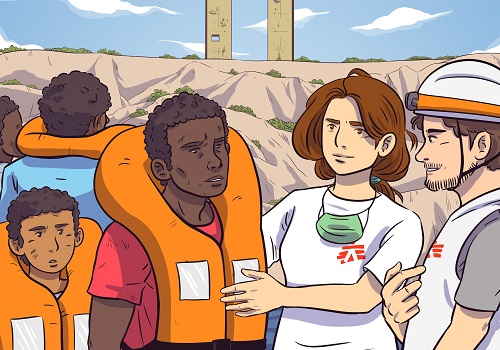
26 November 2023, 17:30
Isola, La Cantine Littéraire, 15 Rue Ternaux, Paris, France
The Mediterranean has increasingly been recognized as the European border par excellence, one of the most dangerous in the world. But what does it truly mean to be the EU border, and what are the exact implications? A debate about the significance of the Mediterranean Sea and Lampedusa as European borders with:
- Anna Marino, PhD candidate, nccr – on the move, University of Neuchâtel
- Simone Gavazzi, human rights activist and editor at Penshare
Their discussion will draw upon academic research and on-site experiences. By interacting in a public context, they will explore the nature of borders, how they are established and evolve, and what they signify for us and our societies.
There will be an innovative discussion format complemented by a visual representation of interactions: the audience will have the opportunity to see the reflections and ideas becoming images thanks to the live drawing experience provided by Arianna Sisani, Italian illustrator!
The event is organized by Guido Aloia (Isola) and Alessandra Polidori (SFM researcher), in collaboration with the nccr – on the move, the Swiss Forum for Migration and Population Studies (SFM) and the University of Neuchâtel.
The discussion will take place in French and Italian, but comments and questions in English are also welcome.
Find the poster here.
Pénurie de main d’oeuvre qualifiée et migration : quels défis et solutions ?
Table ronde d’expert·e·s
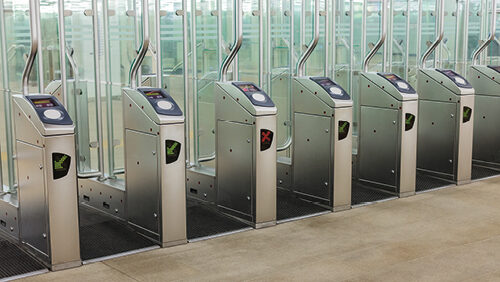
24 novembre 2023, 8:45 – 16:30 KOF ETH Zürich
Pénurie de main-d’œuvre qualifiée et migration : quels défis et solutions ?
La pénurie de main-d’œuvre qualifiée en Suisse et dans d’autres pays industrialisés s’aggrave. Lors d’une table ronde entre expert.e.s, des représentant.e.s de différentes composantes de la société ont discuté des solutions possibles et du rôle de la migration.
Plus de 80 expert.e.s issu.e.s des milieux de l’économie, de la science et de la politique se sont réuni.e.s, à l’invitation du Centre de recherches conjoncturelles (KOF) et du Pôle de recherche national nccr – on the move à l’EPF de Zurich, pour débattre du thème “Pénurie de main-d’œuvre qualifiée et migration : quels défis et solutions ?”. Nous avons résumé les principales conclusions de la table ronde sous forme de questions-réponses :
Quelle est la situation sur le marché du travail suisse ?
Avec un taux de chômage de 2%, le marché du travail en Suisse se porte très bien. “Nous avons atteint une situation de plein emploi”, a déclaré Boris Zürcher, chef de la Direction du travail au Secrétariat d’Etat à l’économie (SECO). Il s’attend à une légère augmentation du chômage de un à trois dixièmes de point de pourcentage dans un avenir proche, mais même avec un chômage de 2,2% ou 2,3%, il parlerait toujours de plein emploi.
Quelle est l’ampleur du problème de la pénurie de main-d’œuvre qualifiée ?
Du point de vue des travailleurs et travailleuses, le faible taux de chômage est une situation idéale, car il renforce leur pouvoir de négociation. Mais pour les entreprises, il est de plus en plus difficile de trouver du personnel qualifié. “La pénurie de main-d’œuvre qualifiée s’aggrave”, déclare Boris Zürcher. D’une part, cette pénurie serait due à la reprise conjoncturelle après la crise de Covid-19. D’autre part, elle serait due à des raisons structurelles. En effet, en raison de l’évolution démographique, la part des actifs dans la population totale diminue.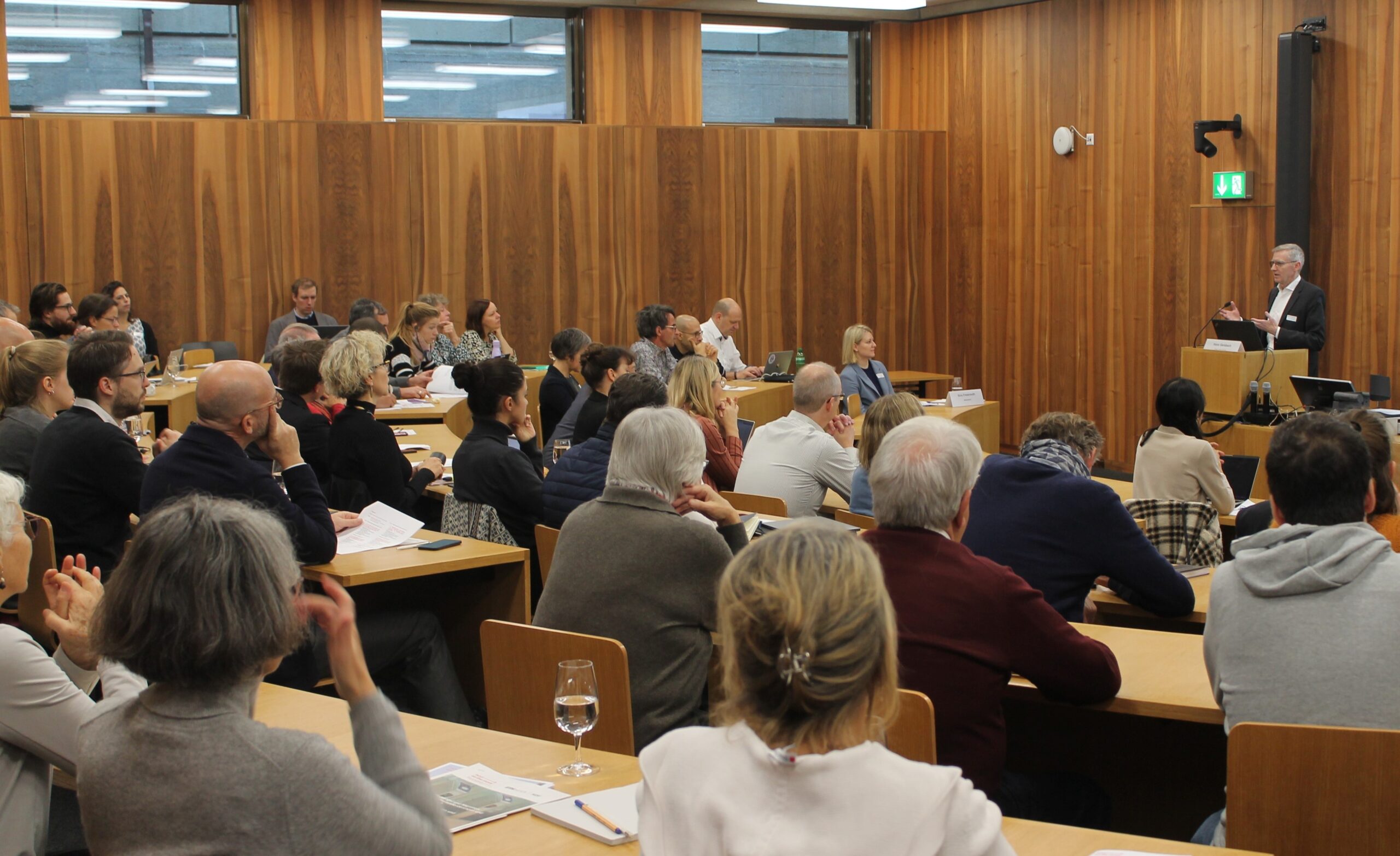
La pénurie de main-d’œuvre qualifiée est-elle un problème purement suisse ?
Non. “Toutes les économies développées sont confrontées à une pénurie de main-d’œuvre qualifiée”, a déclaré Michael Siegenthaler, responsable du domaine de recherche Marché du travail suisse au KOF et chef de projet au nccr – on the move. Même les pays où la conjoncture n’est pas favorable, comme l’Allemagne par exemple, sont confrontés à une pénurie de main-d’œuvre qualifiée. C’est pourquoi de nombreux pays essaient justement de supprimer les obstacles à la migration afin d’atténuer la pénurie de main-d’œuvre qualifiée en facilitant l’immigration, par exemple en concluant des accords bilatéraux sur la migration ou en facilitant l’accès à des permis de séjour permanents, par exemple pour les personnes qui terminent leurs études et qui sont déjà dans le pays.
Pourquoi les salaires n’ont-ils guère augmenté en Suisse malgré la pénurie de main-d’œuvre qualifiée ?
Il y a plusieurs raisons à cela. Du point de vue des syndicats, les négociations ne se sont pas bien déroulées dernièrement. “Nous ne sommes pas satisfaits des négociations salariales passées. Nous, les syndicats, devons être encore plus militants à l’avenir”, a déclaré Daniel Lampart, économiste en chef de l’Union syndicale suisse.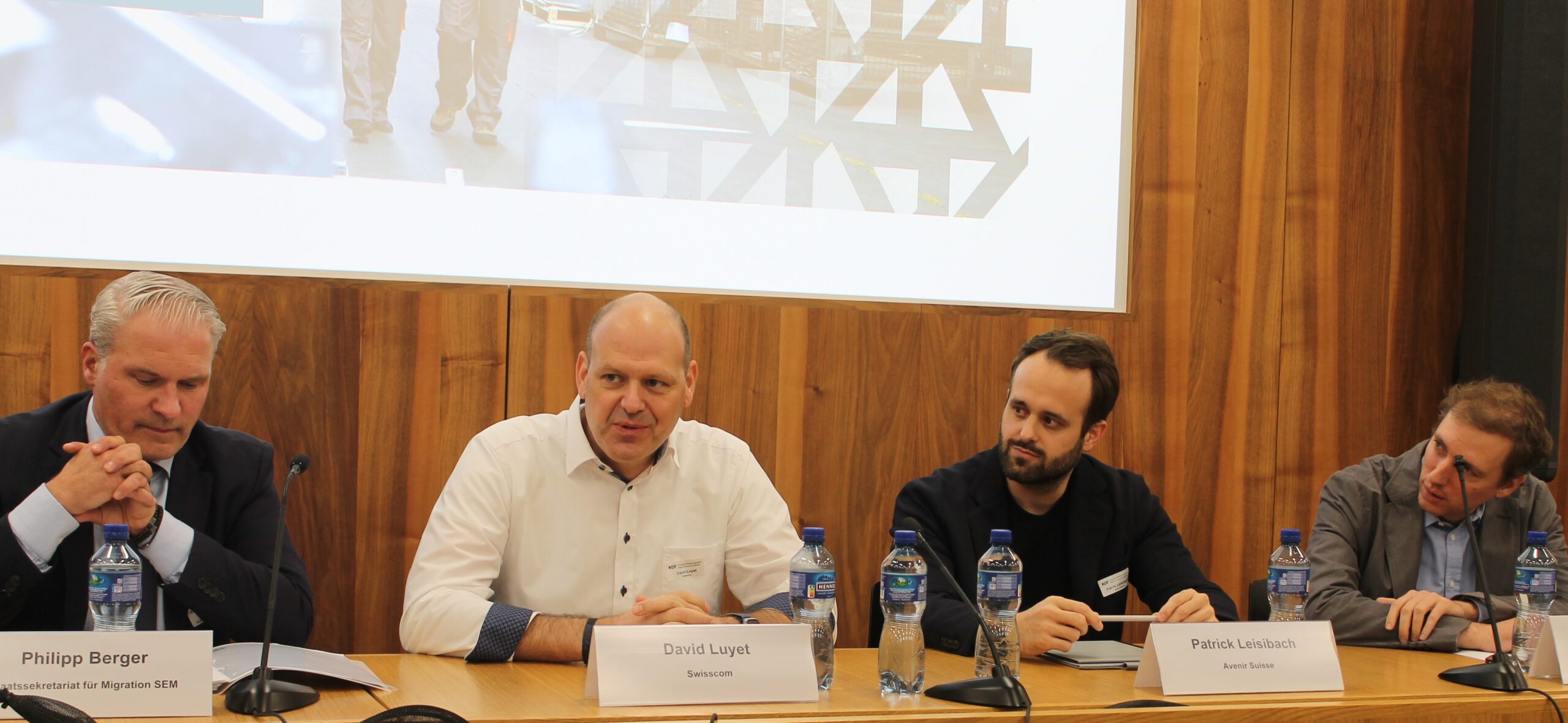
Outre les augmentations de salaire, que peuvent faire les entreprises pour trouver du personnel qualifié ?
Outre le salaire, les autres conditions de travail sont également importantes pour trouver de nouveaux collaborateurs et collaboratrices, mais aussi pour garder ceux et celles qui travaillent déjà. Sabine Auciello, hôtelière et directrice financière du groupe Krafft, a parlé des expériences faites dans sa propre entreprise. Une enquête menée auprès des collaborateurs a par exemple révélé que ces derniers souhaitaient avoir plus de blocs de temps libre, ce qui a conduit à l’introduction, à titre d’essai, d’une semaine de quatre jours sans modification du temps de travail. Les employeurs devraient en outre faire preuve de plus de flexibilité avec les personnes extérieure à la profession et à la branche, a demandé Eva Pauline Bossow, responsable des compétences de l’entreprise x28 AG, en citant comme exemple de bonne pratique le cas d’une prothésiste dentaire qui a repris un emploi dans l’industrie horlogère en raison de compétences similaires demandées dans les deux secteurs.
Quel est le potentiel de la ‘réserve silencieuse’ en Suisse ?
Selon les estimations de Boris Zürcher, il n’est pas aussi important que dans d’autres pays. Selon lui, le taux d’activité des femmes est déjà élevé et de nombreux travailleurs et travailleuses âgés qui partent à la retraite ne veulent pas non plus continuer à travailler, mais profiter de leur retraite. Il en va autrement dans d’autres pays, comme l’Autriche, où l’activité professionnelle des femmes est plus faible qu’en Suisse et où de nombreux travailleurs et travailleuses prennent une retraite anticipée. Les participants ont néanmoins identifié différents groupes de personnes qui pourraient être mieux mobilisés dans le marché du travail en Suisse. Selon Daniel Kopp, chercheur au KOF, il s’agit notamment des mères, des travailleurs et travailleuses âgés de plus de 60 ans et des migrant.e.s – des groupes qui sont souvent victimes de discrimination et de stéréotypes sur le marché du travail. Plusieurs expert.e.s en intégration ont en outre fait remarquer que parmi les migrant.e.s, les personnes arrivées en Suisse dans le cadre d’un regroupement familial n’étaient pas suffisamment prises en compte. Contrairement à d’autres groupes, ces personnes ne bénéficient souvent d’aucun soutien de l’Etat pour leur intégration sur le marché du travail.
Est-il possible d’augmenter le potentiel du marché du travail en améliorant l’éducation et la formation continue et en développant les services de garde d’enfants ?
En principe, oui. Toutefois, l’augmentation du nombre de crèches est coûteuse, selon Zürcher. Les participants à la table ronde n’étaient pas d’accord sur la question de savoir qui devrait supporter les coûts supplémentaires de la formation et de la garde des enfants, l’État ou les entreprises ? Alors que Boris Zürcher a mis l’économie privée devant ses responsabilités, Simon Wey, économiste en chef de l’Union patronale suisse, a souligné qu’il s’agissait là d’une tâche spécifiquement étatique. “La politique doit créer des conditions-cadres attrayantes”, a-t-il déclaré. Selon lui, les entreprises ne sont pas là pour s’occuper des enfants. La transmission de la culture générale et des connaissances linguistiques est également une tâche de l’État. Les entreprises ne sont responsables que de la formation spécifique, dite “training on the job”. Daniel Lampart a en revanche demandé aux entreprises d’investir davantage dans la formation initiale et continue de leurs collaborateurs et collaboratrices. Il a toutefois aussi souligné le problème dit des free riders qui contribue à la faible disposition des entreprises à former et à perfectionner les travailleurs et travailleuses. En effet, lorsque l’entreprise transmet des connaissances transférables à ses employé.e.s, telles que des compétences linguistiques, elle court le risque que les personnes formées se tournent ensuite vers une autre entreprise. Cette défaillance du marché pourrait être réduite par des règles de formation fixées par les conventions collectives de travail.
Quels sont les obstacles bureaucratiques qui freinent l’immigration de travail en Suisse ?
Alors que l’immigration de main-d’œuvre en provenance de l’Union européenne se déroule généralement bien et sans problème, les procédures d’autorisation pour les travailleurs et travailleuses de pays tiers sont souvent longues. “Bien que des améliorations aient été apportées ces dernières années, il faut toujours trop de temps pour obtenir l’autorisation. Les spécialistes ont alors souvent déjà accepté une offre d’une autre entreprise”, a déclaré l’expert en recrutement David Luyet, responsable du département “Talent Attraction” chez Swisscom. Patrick Leisibach, qui travaille chez Avenir Suisse en tant que Fellow dans le domaine de la “société d’opportunités”, a lui aussi rapporté que les start-ups de Berlin, par exemple, disposaient bien plus rapidement qu’en Suisse des papiers nécessaires à l’embauche de nouveaux collaborateurs et collaboratrices. C’est pourquoi de nombreuses start-ups suisses n’essaient même pas de recruter du personnel qualifié dans le cadre des contingents de l’État pour le recrutement de travailleurs et travailleuses originaires d’États tiers, car la procédure est trop bureaucratique pour elles.
L’intégration des réfugiés sur le marché du travail suisse fonctionne-t-elle bien ?
Selon Dominik Hangartner, professeur d’analyse politique à l’EPFZ, codirecteur de l’Immigration Policy Lab et chef de projet au nccr – on the move, il y a encore beaucoup de marge de progression dans ce domaine. “Le faible taux d’intégration professionnelle est, avec le manque de compétences linguistiques, le principal problème de l’intégration des réfugiés”, a-t-il déclaré. Selon lui, les employeurs doivent se défaire des stéréotypes souvent associés aux personnes ayant fui leur pays. Même les migrant.e.s de deuxième et troisième génération, souvent appelés “secondos” en Suisse, font parfois l’objet de réserves en raison de leurs noms de famille à consonance étrangère, a déclaré la sociologue Rosita Fibbi (Université de Neuchâtel). Même en l’absence de qualification formelle, une “formation sur le tas” est une bonne option pour intégrer les réfugiés dans le marché du travail, a souligné Hangartner. Philipp Berger, responsable de la division Admission au marché du travail du Secrétariat d’Etat aux migrations (SEM), a souligné qu’il y avait encore du retard à rattraper, surtout en ce qui concerne l’intégration des réfugié.e.s venu.e.s d’Ukraine, souvent bien qualifié.e.s, sur le marché du travail. En effet, en moyenne suisse, à peine 20% sont actifs. Michael Siegenthaler a également confirmé qu’il y avait une marge de progression. La preuve en est le fait que le taux d’emploi des réfugié.e.s ukrainien.ne.s varie, selon les cantons, entre 10% (canton de Genève) et presque 50% (canton d’Appenzell Rhodes-Intérieures), bien que l’employabilité des réfugié.e.s ne varie, en principe, pas beaucoup d’un canton à l’autre.
La société suisse doit-elle aussi changer de mentalité ?
Selon Hangartner, la Suisse est “un pays d’immigration sans se percevoir comme tel”. Créer une culture de bienvenue pour les migrant.e.s est un défi pour la société.
La pénurie de main-d’œuvre qualifiée peut-elle être résolue par la seule immigration ?
Non. “Nous devons d’abord faire nos devoirs à l’intérieur du pays”, a déclaré Simon Wey. Outre une meilleure mobilisation du potentiel de main-d’œuvre indigène, il place de grands espoirs dans le progrès technique. Plusieurs intervenants ont également souligné que la volonté de la population suisse d’accueillir la main-d’œuvre étrangère doit être prise en compte. “La migration doit être acceptée par la population”, a déclaré Patrick Leisibach.
Ce résumé de la table ronde se base sur un article de Thomas Domjahn publié le 28 novembre 2023 par le Centre de recherches conjoncturelles KOF (EPF Zurich). Le copyright pour les photos est détenu par : Thomas Domjahn 2023 (KOF EPFZ). La version allemande est disponible ici.
Pogramme (FR)
Fachkräftemangel und Migration: Was sind die Herausforderungen und Lösungsansätze?
Dialog unter Expertinnen und
Experten

24 November 2023 – KOF ETH Zürich
Fachkräftemangel und Migration: Herausforderungen und Lösungsansätze
Der Fachkräftemangel in der Schweiz und anderen Industrienationen spitzt sich zu. Bei einem Dialog unter Expertinnen und Experten haben Vertreter und Vertreterinnen aus verschiedenen gesellschaftlichen Bereichen über mögliche Lösungsansätze und die Rolle der Migration gesprochen.
Über 80 Experten und Expertinnen aus Wirtschaft, Wissenschaft und Politik haben auf Einladung der KOF und des Nationalen Forschungsschwerpunktes nccr – on the move an der ETH Zürich über das Thema «Fachkräftemangel und Migration: Was sind die Herausforderungen und Lösungsansätze?» diskutiert. Wir haben die wichtigsten Erkenntnisse der Tagung in Frage-Antwort-Form zusammengefasst:
Wie ist die Lage auf dem Schweizer Arbeitsmarkt?
Der Arbeitsmarkt in der Schweiz steht mit einer Arbeitslosenquote von 2% sehr gut da. «Wir haben eine Vollbeschäftigungssituation erreicht», sagte Boris Zürcher, Leiter der Direktion für Arbeit beim Staatssekretariat für Wirtschaft (SECO). Er erwarte einen leichten Anstieg der Arbeitslosigkeit um ein bis drei Zehntelprozentpunkte in naher Zukunft, aber selbst bei einer Arbeitslosigkeit von 2.2% oder 2.3% würde er immer noch von Vollbeschäftigung sprechen.
Wie gross ist das Problem des Fachkräftemangels?
Die niedrige Arbeitslosigkeit ist aus der Sicht von Arbeitnehmern und Arbeitnehmerinnen eine Idealsituation, weil sie ihre Verhandlungsmacht stärkt. Für Firmen wird es aber immer schwieriger, Fachkräfte zu finden. «Der Fachkräftemangel spitzt sich zu», sagt Boris Zürcher. Treiber sei zum einen die konjunkturelle Erholung seit der Corona-Krise. Zum anderen führten strukturelle Gründe zum Fachkräftemangel: Aufgrund des demografischen Wandels schrumpfe der Anteil der Erwerbstätigen an der Gesamtbevölkerung.
Ist der Fachkräftemangel ein rein schweizerisches Problem?
Nein. «Alle entwickelten Volkswirtschaften haben mit Fachkräftemangel zu kämpfen», sagte Michael Siegenthaler, Leiter des Forschungsbereichs Schweizer Arbeitsmarkt an der KOF und Projektleiter beim nccr – on the move. Selbst Länder, in denen es konjunkturell nicht rund laufe, wie zum Beispiel Deutschland, kämpfen mit einem Fachkräftemangel. Deshalb versuchen gerade viele Länder Migrationshürden abzubauen, um den Mangel an Fachkräften durch erleichterte Einwanderung abzumildern, etwa indem bilaterale Migrationsabkommen abgeschlossen werden oder der Zugang zu permanenten Aufenthaltsbewilligungen, etwa nach einem Studium, erleichtert wird.
Warum sind die Löhne trotz Fachkräftemangel in der Schweiz kaum gestiegen?
Dies hat verschiedene Gründe. Aus Sicht der Gewerkschaften seien die Verhandlungen zuletzt nicht gut gelaufen. «Wir sind unzufrieden mit den vergangenen Lohnrunden. Wir Gewerkschaften müssen in Zukunft noch militanter sein», sagte Daniel Lampart, Chefökonom des Schweizerischen Gewerkschaftsbundes.
Was können Firmen neben Lohnerhöhungen tun, um Fachkräfte zu finden?
Neben dem Lohn sind auch die weiteren Arbeitsbedingungen wichtig, um neue Mitarbeitende zu finden, aber auch die bestehenden zu halten. Sabine Auciello, Hotelière und CFO der Krafft Gruppe, erzählte aus den Erfahrungen in ihrem eigenen Unternehmen. So habe eine Umfrage unter den Mitarbeitenden beispielsweise ergeben, dass sich die Arbeitnehmenden mehr Freizeit am Stück wünschen, woraufhin testweise eine Viertagewoche bei gleichbleibender Arbeitszeit eingeführt wurde. Arbeitgeber und Arbeitgeberinnen müssten zudem mehr Flexibilität bei berufs- und branchenfremden Personen zeigen, forderte Eva Pauline Bossow, Head of Skills der x28 AG, und führte als Best-Practice-Beispiel einen Fall an, in dem eine Zahntechnikerin mit ähnlichen Fähigkeiten eine Rolle in der Uhrenindustrie übernahm.
Wie hoch ist das Potenzial der stillen Reserve in der Schweiz?
Nach Einschätzung von Boris Zürcher nicht so gross wie in anderen Ländern. Die Frauenerwerbstätigkeit sei bereits hoch und viele ältere Arbeitnehmer und Arbeitnehmerinnen, die in Rente gehen, wollen auch nicht mehr arbeiten, sondern ihren Ruhestand geniessen. Dies sei in anderen Ländern wie zum Beispiel Österreich, wo die Frauenerwerbstätigkeit niedriger als in der Schweiz sei und viele Arbeitnehmer und Arbeitnehmerinnen früh verrentet werden, anders. Trotzdem orteten die Teilnehmenden verschiedene Personengruppen, die im Inland besser ausgeschöpft werden könnten. Laut Daniel Kopp, Forscher an der KOF, zählen hierzu insbesondere Mütter, ältere Arbeitnehmende ab 60 Jahren, und Migranten und Migrantinnen – Gruppen, die im Arbeitsmarkt auch oft Diskriminierung und Stereotypisierung erfahren. Verschiedene Integrationsexperten merkten zudem an, dass unter den Migrantinnen und Migranten insbesondere auch Personen, die im Zuge eines Familiennachzugs in die Schweiz gelangen, zu wenig beachtet würden. Diese würden im Gegensatz zu anderen Gruppen oft keine staatliche Unterstützung bei der Arbeitsmarktintegration erhalten.
Lassen sich Potenziale auf dem Arbeitsmarkt durch eine bessere Aus- und Weiterbildung und eine Ausweitung der Kinderbetreuung heben?
Grundsätzlich ja. Allerdings sei ein Ausbau von Kindertagesstätten kostspielig, so Zürcher. Uneinigkeit herrschte auf dem Podium, wer die Zusatzkosten für Ausbildung und Kinderbetreuung tragen sollte, der Staat oder die Firmen? Während Boris Zürcher die Privatwirtschaft in die Pflicht nahm, betonte Simon Wey, Chefökonom des Schweizerischen Arbeitgeberverbands, dass dies eine genuine Aufgabe des Staates sei. «Die Politik muss attraktive Rahmenbedingungen schaffen», sagte er. Die Firmen seien nicht dazu da, Kinder zu betreuen. Auch die Vermittlung von Allgemeinbildung und Sprachkenntnissen sei Staatsaufgabe. Die Firmen seien nur für die spezifische Ausbildung, das sogenannte «training on the job», zuständig. Daniel Lampert forderte die Betriebe dagegen auf, mehr in die Aus- und Weiterbildung ihrer Mitarbeiter und Mitarbeiterinnen zu investieren. Er wies allerdings auch auf ein Free-Rider-Problem hin, das zu einer geringen Bereitschaft der Betriebe beiträgt, Arbeitnehmende aus- und weiterzubilden: So laufe der Betrieb, wenn er transferierbares Wissen wie Sprachkompetenzen vermittelt, Gefahr, dass die Ausgebildeten danach zu einem anderen Betrieb wechseln. Dieses Marktversagen könne man mit gesamtarbeitsvertraglichen Ausbildungsregelungen verringern.
Welche bürokratischen Hindernisse bremsen die Arbeitsmigration in die Schweiz?
Während die Einwanderung von Arbeitskräften aus der Europäischen Union in der Regel gut und reibungslos läuft, sind die Genehmigungsverfahren für Arbeitnehmer und Arbeitnehmerinnen aus Drittstaaten oft langwierig. «Obwohl es in den letzten Jahren Verbesserungen gab, dauert es immer noch zu lange, bis die Zusage vorliegt. Fachkräfte haben dann oft schon ein Angebot einer anderen Firma angenommen», sagte Rekrutierungsexperte David Luyet, Leiter der Abteilung «Talent Attraction» bei Swisscom. Auch Patrick Leisibach, bei Avenir Suisse als Fellow im Bereich «Chancengesellschaft» tätig, berichtete, dass Start-ups zum Beispiel in Berlin deutlich schneller die nötigen Papiere für die Einstellung neuer Mitarbeiter und Mitarbeiterinnen vorliegen hätten, als in der Schweiz. Viele Start-ups in der Schweiz versuchten deshalb erst gar nicht, im Rahmen der staatlichen Kontingente Fachkräfte anzuwerben, weil ihnen das Verfahren zu bürokratisch sei.
Wie gut klappt die Integration von Geflüchteten in den Schweizer Arbeitsmarkt?
Hier besteht laut Dominik Hangartner, Professor für Politikanalyse an der ETH, Co-Direktor des Immigration Policy Labs und Projektleiter beim nccr – on the move, noch viel Luft nach oben. «Die niedrige Erwerbsintegration ist neben der fehlenden Sprachkompetenz das Hauptproblem bei der Integration von Geflüchteten», sagte er. Arbeitgeber und Arbeitgeberinnen seien gefordert, Stereotype in Bezug auf geflüchtete Personen abzubauen. Selbst gegenüber Migrantinnen und Migranten der zweiten und dritten Generation, in der Schweiz oft «Secondos» genannt, gebe es bisweilen noch Vorbehalte aufgrund ihrer fremd klingenden Nachnamen, sagte die Soziologin Rosita Fibbi (Universität Neuchâtel). Auch wenn die formale Qualifikation nicht vorliege, sei ein «training on the job» eine gute Option zur Integration von Geflüchteten in den Arbeitsmarkt, betonte Hangartner. Philipp Berger, Leiter der Abteilung Zulassung Arbeitsmarkt im Direktionsbereich Zuwanderung und Integration des Staatssekretariats für Migration (SEM), betonte, dass vor allem bei der Arbeitsmarktintegration der oftmals gut qualifizierten Flüchtlinge aus der Ukraine noch Nachholbedarf bestehe. Im schweizweiten Durchschnitt liegt sie bei knapp 20%. Dass Luft nach oben besteht, bestätigte auch Michael Siegenthaler. Das erkenne man daran, dass die Erwerbstätigenquote der Ukraine-Geflüchteten, je nach Kanton, zwischen knapp 10% (Kanton Genf) und fast 50% (Kanton Appenzell-Innerhoden) schwanke, obwohl sich die Beschäftigungsfähigkeit der Geflüchteten zwischen den Kantonen nicht wesentlich unterscheiden dürfte.
Muss auch die Schweizer Gesellschaft umdenken?
Nach Ansicht von Hangartner ist die Schweiz «ein Immigrationsland, ohne sich als solches wahrzunehmen». Es sei eine gesellschaftliche Herausforderung, eine Willkommenskultur für Migranten und Migrantinnen zu schaffen.
Lässt sich der Fachkräftemangel durch Einwanderung allein lösen?
Nein. «Wir müssen zuerst unsere Hausaufgaben im Inland machen», sagte Simon Wey. Neben einer besseren Ausschöpfung des inländischen Arbeitskräftepotenzials setze er grosse Hoffnungen in den technischen Fortschritt. Mehrere Referenten wiesen auch darauf hin, dass die Bereitschaft der Schweizer Bevölkerung zur Aufnahme von ausländischen Arbeitskräften nicht überstrapaziert werden dürfe. «Die Migration muss von der Bevölkerung akzeptiert werden», sagte Patrick Leisibach.
Diese Tagungszusammenfassung basiert auf einem am 28. November 2023 von der KOF Konjunkturforschungsstelle (ETH Zürich) veröffentlichten Artikel von Thomas Domjahn. Das Copyright für die Fotos liegt bei: Thomas Domjahn 2023 (KOF ETHZ). Die französische Version ist hier verfügbar.
Programm (DE)
Procès de la Frontière

4 novembre 2023, 14:00-18:00
Palais de Rumine, Place de la Riponne 6, 1005 Lausanne
Organisé dans le cadre des Disputes de Rumines
La frontière est un puissant instrument de régulation des échanges. Chacun tente de l’utiliser à son avantage, en fonction de ses intérêts et de ses valeurs. Le désordre climatique sera à l’origine de migrations plus nombreuses et peut-être plus conflictuelles. De la gestion des frontières dépendront plus que jamais les équilibres politiques de demain. Peut-on, dès maintenant, mettre en oeuvre des modèles de migrations sûres et régulières ? Faut-il condamner les frontières pour permettre à chacun de se déplacer librement ? Faut-il au contraire les renforcer ? Voilà les questions auxquelles devra répondre le jury avant de les condamner ou de les acquitter.
LES ATELIERS: 14h-15h
- La libre circulation généralisée
L’atelier part d’une hypothèse simple et radicale : Et s’il n’y avait plus de frontières et que les êtres humains jouissaient d’une libre circulation généralisée ?
Avec : Johan Rochel et Mathias Lerch
- Contrôle des frontières selon une logique de marché
Il sera question d’approches basées sur le marché, selon lesquelles le nombre de permis d’établissement est fixé dans le cadre d’un processus politique, puis « vendus » aux personnes ou aux entreprises les plus offrants dans le pays de destination.
Avec : Marco Salvi
- Contrôle des frontières selon une logique humanitaire
L’atelier analysera les modèles d’ouverture sélective des frontières en fonction de critères humanitaires pour protéger efficacement les personnes victimes de persécution ou menacées dans leur intégrité physique.
Avec : Anja Klug et Chloé Ofodu
LE PROCÈS: 15h30-18h
Accusée : Charles Poncet
Présidente : Me Elisabeth Chappuis
Expert : Robin Stünzi
Accusateur : Me Raphaël Mahaim
Experte : Rosita Fibbi
Défenseur : Me Elie Elkaim
Expert : Yves Daccord
Témoins : Cesla Amarelle, Kevin Grangier, Chloé Ofodu et Etienne Piguet
Entrée libre, sans inscription, dans la limite des places disponibles !
Migration and Socio-Economic Inequality in Times of Crisis
Research Days

27 October 2023, 9:30 – 15:15
University of Neuchâtel
This Research Day is part of the Doctoral Program of the nccr – on the move.
Pogram:
- 09:30: Fellows Workshop
Dan-Olof Rooth, Stockholm University - 11:15: To what extent has the COVID-19 crisis produced an uneven pattern of residential mobility in Switzerland?
Vestin Hategekimana, University of Geneva - 13:30: Guest worker programs: Individual- and firm-level impact on wages and employment
Kristina Schüpbach, ETH Zurich - 14:30: Cantonal variations of integration policies and their effects on family migrants’ labour market integration
Mélinda Dinh, University of Geneva
The Research Day will be held at the University of Neuchâtel, Av. Abram-Louis Breguet 2, Room 3.416 and on Webex (a link will be sent after registration).
Program and detailed information (PDF).
Please register here.
Automatic Associations and Discrimination: A Reassessment
Public Lecture Series
Dan-Olof Rooth, Stockholm University
Discussant: Michael Siegenthaler, ETH Zurich, nccr – on the move

Thursday, 26 October 2023, 18:15 – 19:45 CET
This talk will be held in person at the University of Neuchâtel, 1er Mars 26, room C46, on WEBEX,
as well as live-streamed on the nccr – on the move YouTube channel.
Program (PDF)
Call for Visiting Fellows – Spring 2024
Short-Term Incoming Fellowships

To enhance international exchange and cooperation, the nccr – on the move offers Visiting Fellowships for senior and junior researchers from abroad, who wish to collaborate with our network for a duration of two to three months.
Further information on the eligibility and the application and selection procedure can be found here.
The deadline for application is 15 October 2023.
For questions, please contact the Education, Careers and Equal Opportunities Officer of the nccr – on the move robin.stunzi@nccr-onthemove.ch
Migration-Mobility Governance and Crisis: Narratives Across Time and Space
Research Days

29 September 2023, 9:30 – 15:45
University of Neuchâtel
This Research Day is part of the Doctoral Program of the nccr – on the move.
Pogram:
- 09:30: Fellows Workshop
James Dennison, University of East Anglia, EUI - 11:15: Narratives on Migration in Times of Crisis
Maarja Vollmer, University of Neuchâtel - 14:00: Creating Narrative through Oral History
Carol Pierre, University of Neuchâtel - 15:00 Challenging Societal Bordering to Transform Injustices Affecting Immigrants: A Contextualist Political Theory Analysis of the Case of Aboubakar Soumahoro and his Activism in Italian Society
Anna Marino, University of Neuchâtel
The Research Day will be held at the University of Neuchâtel, Av. Abram-Louis Breguet 2, Room 3.416 and on Webex (a link will be sent after registration).
Program and detailed information (PDF).
Please register here.
Recent Developments and Advances in Understanding Attitudes to Immigration
Public Lecture Series
James Dennison, University of East Anglia, EUI

Thursday, 28 September 2023, 18:00 – 19:30 CET
This talk will be held in person at the University of Neuchâtel, 1er Mars 26, room B32, on WEBEX,
as well as live-streamed on the nccr – on the move YouTube channel.
Program (PDF)
Public Speaking Workshop

19 September 2023, 10:00 – 16:00
University of Neuchâtel
Do you find speaking in front of an audience a terrifying prospect? Do you rise to the challenge but deliver through gritted teeth? Or do you enjoy every moment and shine like a Hollywood star? Then, this 5-hour workshop is for you!
The workshop is part of the third pillar of the Doctoral Program of the nccr – on the move. All members of the NCCR community and doctoral students enrolled in a CUSO program are welcome to attend.
This event will be held in person at the University of Neuchâtel, 1er Mars 26, room 2.310 (no online participation).
Detailed information (PDF)
Places are limited, so please register here by 15 September.
AI for Academic Enrichment: Exploring Ethical and Practical Dimensions

29 August 2023, 9:00 – 17:00
University of Neuchâtel
This course is part of the third pillar of the Doctoral Program of the nccr – on the move. All members of the NCCR community and doctoral students enrolled in a CUSO program are welcome to attend.
The session is divided in two parts:
- 09:00-12:30: Ethical Challenges of ChatGPT with Dr. Johan Rochel (EPFL and University of Fribourg)
- 13:30-17:00: Tips on how to use AI for Academic Purposes with Dr. Mushtaq Bilal (University of Southern Denmark)
This course will be held in person at the University of Neuchâtel, 1er Mars 26, room C49 (no online participation).
Program and detailed information (PDF)
Places are limited, so please register here by 20 August.
NCCR Longitudinal Datasets: Exploring Valuable Insights
Online Information Session

Thursday, 24 August 2023, 12:15 – 13:45 CET
Are you a researcher or a practitioner focusing on the mobility of migrants and their integration in Switzerland? Perhaps you are interested in understanding migration and mobility policy-making during the COVID-19 pandemic, or simply wish to explore how migration is discussed in public, policy and media spaces? If so, we invite you to join our engaging online information session where we will delve into our key longitudinal datasets!
- Migration-Mobility Survey (MMS) with Philippe Wanner, University of Geneva, nccr – on the move
- Citizenship, Migration and Mobility in a Pandemic (CMMP) with Lorenzo Piccoli, European University Institute, nccr – on the move
- Support and Opposition to Migration (SOM) with Didier Ruedin, University of Neuchâtel, nccr – on the move
This information session will be held on WEBEX.
More information (PDF)
Looking forward to the Neuchâtel Graduate Conference 2023

The Neuchâtel Graduate Conference has become an international event for doctoral students and junior researchers in the field of migration and mobility. Over four hundred researchers have attended our conferences since 2017.
As the sixth edition of our conference is scheduled to take place at the University of Neuchâtel from 11 to 12 July 2023, its planning is already underway. We would, therefore, like to share with you some of our preliminary ideas.
The five previous editions have built a good reputation thanks to their collaborative atmosphere, as well as the interdisciplinary and constructive discussions between junior and senior researchers. For this year’s edition, we will continue to experiment with the format of the event, while preserving its distinguishing features.
We will again invite senior scholars from our International Advisory Board. These experts are invited to provide constructive feedback and guide young researchers in the publishing process. We will also continue to collaborate with other institutions, like the Swiss Subsaharan Africa Migration Network, and invite external participants to facilitate a dialogue beyond academia. We will also make sure that the conference serves as a platform to promote young female academics in line with our values.
The topic of this year’s Graduate Conference will be “Migration and Im/Mobility in Times of Entangled Crises: Concepts, Practices and Challenges.” Through this theme, we wish to encourage researchers to explore the construction and the impact of past, current or future crises on the public perception and the governance or the practices of migration and im/mobility, at different scales and across different contexts. As always, we wish to facilitate interdisciplinary debate. For this reason, we will welcome submissions from a variety of disciplinary backgrounds, methodological and theoretical approaches.
In the meanwhile, you can stay up to date with information on the conference through the hashtag #neuchgradconf23 on Twitter.
Migration Governance in Times of Entangled Crises: Lessons from Brazil and South Africa
Round Table at the Neuchâtel Graduate Conference
Leiza Brumat (Eurac Research, Bolzano)
Paulo Sérgio Almeida (UNHCR Brazil)
Lily Sanya (IOM South Africa)
Nene Ernest Khalema (School of Built Environment and Development Studies, University of Kwazulu-Natal)
Moderation: Anouk Jasmine Albien, University of Lausanne

Wednesday, 12 July 2023, 11:30 – 13:00
This panel will be held in person at the University of Neuchâtel, Avenue du 1er-Mars 26, room C46, on WEBEX (link), as well as live-streamed on the nccr – on the move YouTube channel (link).
Program (PDF)
Neuchâtel Graduate Conference 2023
Migration and Im/Mobility in Times of Entangled Crises

University of Neuchâtel 11-12 July 2023
The Neuchâtel Graduate Conference (NGC) is an international graduate conference organized by the nccr – on the move, Swiss National Center of Competence in Research (NCCR) for migration and mobility studies. It provides a stimulating environment in which PhD and Postdoctoral fellows from different universities and research institutions can exchange ideas, establish networks, and initiate collaborative research.
The 6th edition takes place from 11 to 12 July 2023 in Neuchâtel, providing opportunities to meet other researchers in formal and informal gatherings. The topic is ‘Migration and Im/Mobility in Times of Entangled Crises.’
Main plenary events:
Tuesday, 11 July 2023
11:45 Talk on European Migration Governance in the Context of Uncertainty
17:00 Talk on A Global Network of Scholars? The Geographical Concentration of Institutes in Migration Studies and its Implications
18:15 Guided Tour on Traces of Slavery in Neuchâtel
Wednesday, 12 July 2022
11:30 Round Table on Migration Governance in South Africa and Brazil
16:30 Movie Screening: Hit the Road, by Panah Panahi
Conference Program
Download the program here (PDF)
Practical Information (PDF)
For more information, please first check out the FAQ, or contact Robin Stünzi, the Education Officer of the nccr – on the move robin.stunzi@nccr-onthemove.ch.
Looking back at the conference here.
European Migration Governance in the Context of Uncertainty
Public Lecture at the Neuchâtel Graduate Conference
Prof. Mathias Czaika, University for Continuing Education Krems

Tuesday, 11 July 2023, 11:45 – 13:15
This lecture will be held in person at the University of Neuchâtel, Avenue du 1er-Mars 26, room C46, on WEBEX (link) as well as live-streamed on the nccr – on the move YouTube channel (link).
Program (PDF)
A Global Network of Scholars? The Geographical Concentration of Institutes in Migration Studies and its Implications
Public Lecture at the Neuchâtel Graduate Conference
Dr. Lorenzo Piccoli, European University Institute

Tuesday, 11 July 2023, 17:00 – 17:45
This lecture will be held in person at the University of Neuchâtel, Avenue du 1er-Mars 26, room C46, on WEBEX (link) as well as live-streamed on the nccr – on the move YouTube channel (link).
Program (PDF)
Can Multiculturalism Contribute to De-polarizing the Current Political Polarization?
Public Lecture Series
Tariq Modood, University of Bristol
Discussant: Matteo Gianni, University of Geneva, nccr – on the move

Friday, 12 May 2023, 17:00 – 18:30 CET
This talk will be held in person at the University of Neuchâtel, 1er Mars 26, room C46, on WEBEX,
as well as live-streamed on the nccr – on the move YouTube channel.
Program (PDF)
The Three Moments of Citizenship: Reflections
Public Lecture Series
with Yasemin Nuhoglu Soysal, Berlin Social Science Center (WZB)
Discussant: Jean-Thomas Arrighi, University of Neuchâtel, nccr – on the move

Thursday, 11 May 2023, 18:00 – 19:30 CET
This talk will be held in person at the University of Neuchâtel, 1er Mars 26, room C46, on WEBEX.
Program (PDF)
PhD Research Design Course
Planning a Research Project and Formulating Clear Questions
Taught by Prof. Yvonne Riaño

25 April 2023, 9:15 – 17:00
University of Neuchâtel
This course is part of the third pillar of the Doctoral Program of the nccr – on the move. All members of the NCCR community and doctoral students enrolled in a CUSO program are welcome to attend.
Program and detailed information (PDF)
Places are limited, register here before 15 April!
Les révolutions de 1848: Neuchâtel, l’Europe, le monde
Cycle de conférences publiques
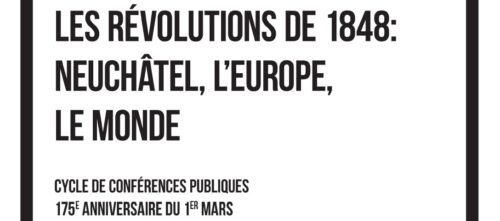
Un cycle de trois conférences intitulé « Les révolutions de 1848 : Neuchâtel, l’Europe et le monde », organisé par la Société d’histoire et d’archéologie du Canton de Neuchâtel (SHAN), fera dialoguer des spécialistes de 1848, tant suisses qu’internationaux, donnant ainsi une lecture plus large de l’histoire de la Révolution neuchâteloise.
Les trois conférences auront lieu le 24 mars, 31 mars et 28 avril. Le programme complet est disponible ici (PDF)
Data Management Training
Facilitated by Pablo Diaz and Andreas Perret

5 April 2023, 9:00 – 17:00
University of Neuchâtel
This course is part of the third pillar of the Doctoral Program of the nccr – on the move. All members of the NCCR community and doctoral students enrolled in a CUSO program are welcome to attend.
Program and detailed information (PDF)
Places are limited, register here before 31 March!
Call for Visiting Fellows – Fall 2023
Short-Term Incoming Fellowships

To enhance international exchange and cooperation, the nccr – on the move offers Visiting Fellowships for senior and junior researchers from abroad, who wish to collaborate with our network for a duration of two to three months.
Further information on the eligibility and the application and selection procedure can be found here.
The deadline for application is 31 March 2023.
For questions, please contact the Deputy Scientific Officer of the nccr – on the move lucas.oesch@nccr-onthemove.ch
Comment la politique sociale nationale façonne la «migration»? Aperçus des contextes nationaux en Suisse, en Allemagne et en Autriche
Wie formt die nationalstaatliche Sozialpolitik «Migration»? Einblicke aus den Länderkontexten Schweiz, Deutschland und Österreich
Forum Travail Social / Forum Soziale Arbeit
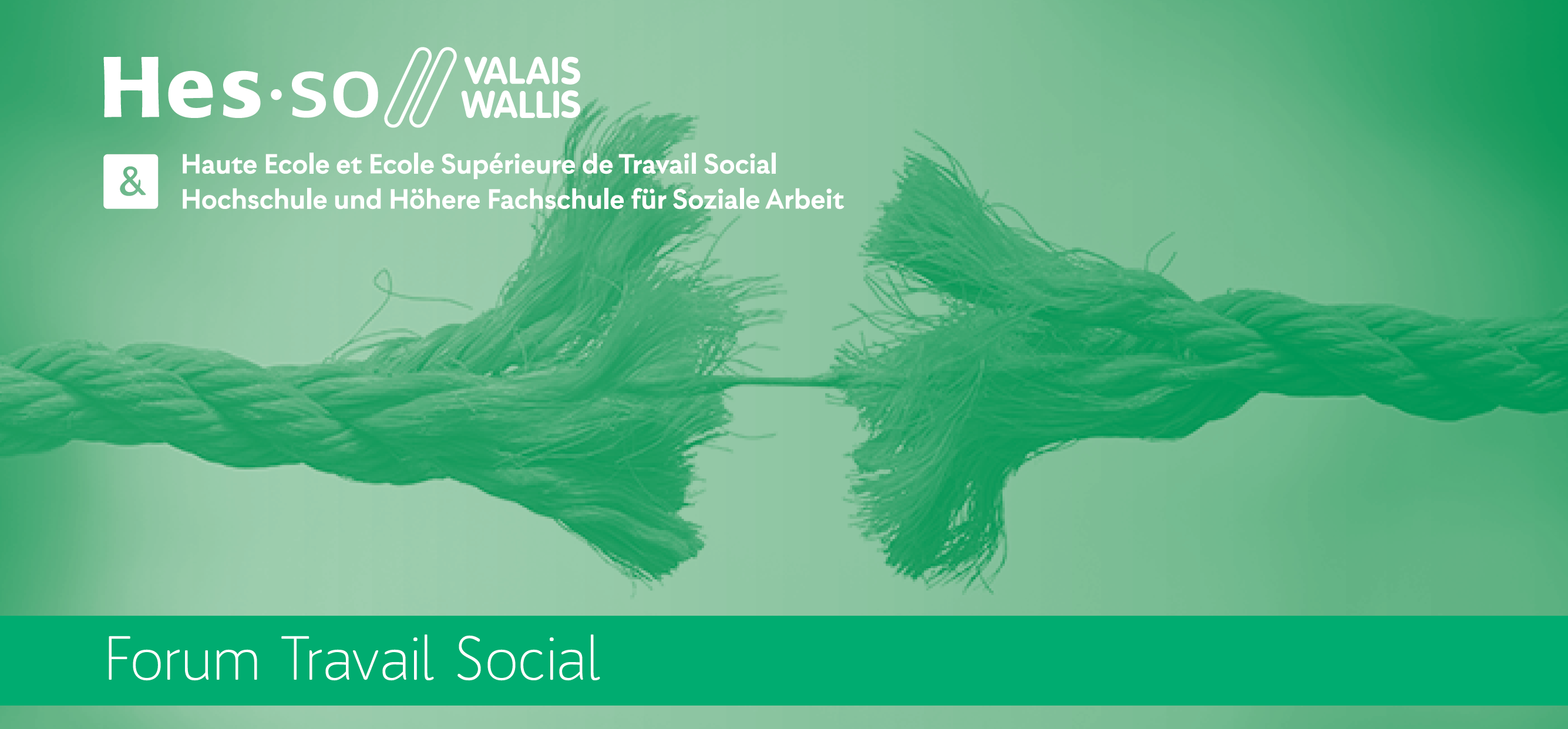
Jeudi 30 mars 2023, 17:15 – 18:30, suivi d’un apéro
HES-SO-Valais, Haute Ecole et Ecole Supérieure de Travail Social, Aula
Le Forum Travail Social a pour but de promouvoir les échanges entre chercheuses et chercheurs, professionnel·le·s et le grand public. Cette rencontre appréhende la question de comment la politique sociale nationale façonne la « migration », comment la politique migratoire influence certains domaines particuliers de la politique sociale, par exemple le logement, l’aide sociale ou la santé et crée ainsi des changements qui ont souvent des conséquences graves pour les personnes étrangères.
Lors de cette table ronde, des chercheuses et chercheurs de Suisse, d’Autriche et d’Allemagne discuteront avec des expert·e·s et des acteurs politiques de l’imbrication passée et actuelle de la politique sociale et du droit des migrations, et la manière dont ces deux domaines joueront un rôle plus important à l’avenir.
La table ronde aura lieu en français et en allemand.
Programme en français (PDF)
Programm auf Deutsch (PDF)
Emergency (Im)mobilities: (Im)mobile Lives in Crisis
Public Lecture Series on Migration, Mobility and Crises
with Peter Adey, Royal Holloway, University of London
Discussant: Francisco Klauser, University of Neuchâtel

Thursday, 23 March 2023, 18:00 – 19:30 CET
This talk will be held in person at the University of Neuchâtel, Espace Tilo Frey (FLSH), room R.S.38, on WEBEX, as well as live-streamed on the nccr – on the move YouTube channel.
Program and Abstract (PDF)
Wer geht, wer bleibt, was tun?
Themenabend kantonale Abwanderung

Montag, 20. März 2023
18:00, Kunsthaus Glarus
Obwohl Länder wie die Schweiz, Deutschland oder Frankreich seit Jahrzehnten eine Destination für internationale Einwanderung sind, sieht die Bevölkerungsentwicklung in ihren Regionen unterschiedlich aus. So ist die Anzahl Einwohnerinnen und Einwohner der Schweiz zwischen 1850 und 2021 von 2.4 auf 8.7 Millionen angestiegen – jene das Kantons Glarus in der gleichen Periode allerdings lediglich von 30’000 auf 40’000. Ein Phänomen, das sich hinter diesem vergleichsweise schwachen Bevölkerungswachstum versteckt, ist, dass Regionen wie der Kanton Glarus gleichzeitig eine beträchtliche Abwanderung erleben.
Diese Abwanderung auf regionaler Ebene ist allerdings noch wenig untersucht und deshalb Gegenstand eines Forschungsprojektes des nccr – on the move. Das NCCR-Projekt regionale Abwanderung interessiert sich insbesondere für das Ausmass, die Bedeutung und den politischen, wirtschaftlichen, sozialen und medialen Umgang mit dem Thema und wird dies unter anderem im Kanton Glarus erforschen.
Als Auftakt zu dieser Forschung organisiert das Projekt in Glarus einen Themenabend zur regionalen Abwanderung, an dem sich Wissenschaft und Praxis sowie die betroffene Bevölkerung austauschen können.
Aufseiten des Forschungsprojektes intervenieren Prof. Olivier Crevoisier, Wirtschaftssoziologe, und Great Udochi, Doktorand in territorialer Politik (beide Universität Neuenburg). Die Praxis wird vertreten durch Marianne Lienhard, Regierungsrätin Kanton Glarus (SVP), Eva-Maria Kreis, Gemeinderätin Glarus (Grüne), und Claudia Blumer, Journalistin 20 Minuten.
Moderation: Prof. Sean Müller, Politikwissenschafter Universität Lausanne und ebenfalls Mitglied des NFS-Projektes.
Eingeladen sind alle Einwohnerinnen und Einwohner des Kantons (Eintritt frei). Aus Kapazitätsgründen wird um eine Anmeldung bis spätestens 10. März 2023 gebeten an sean.muller@unil.ch.
Programm (PDF)
Neuchâtel Graduate Conference 2023: Call for Contributions
University of Neuchâtel
11 – 12 July 2023
The Neuchâtel Graduate Conference is an international graduate conference organized by the nccr – on the move. It provides a stimulating environment in which doctoral and postdoctoral researchers from different universities and research institutions can exchange ideas, establish networks, attend targeted training, and initiate collaborative research.

Call for Contributions: Migration and Im/Mobility in Times of Entangled Crises: Concepts, Practices and Governance
The topic of this year’s Graduate Conference will be ‘Migration and Im/Mobility in Times of Entangled Crises: Concepts, Practices and Governance’.
We encourage researchers to explore the construction and the impact of past, current or future crises on the public perception, governance, and practices of migration and im/mobility, across different geographical and political contexts, and on different scales of social organization. We also invite contributions that explore the differential experiences of crises and critically engage with the concept of crisis itself, addressing what constitutes a crisis and for whom. We welcome contributions on this overarching topic from all related disciplines in migration and mobility studies, such as demography, economics, geography, law, political science, sociology, psychology, anthropology, as well as other relevant fields.
The deadline for submission is 28 February 2023.
Contributions can take the form of papers or posters, and there is no participation fee. To encourage international participation, the nccr – on the move will provide funding opportunities that are specifically designed for international graduate students traveling from far or without mobility funding.
Please read the full call for papers for more information (PDF) and register via this form.
Entangled Crises and Their Impact on Migration and (Im)Mobility – What’s an Interdisciplinary Perspective?
Academic Conversation
with Prof. Helle Rydström and Prof. Mo Hamza, Lund University

Friday, 16 December 2022, 18:00 – 19:30
This conversation will be held in person at the University of Neuchâtel, Avenue du 1er-Mars 26, Room D71 and on WEBEX (at this link).
Program (PDF)
The Crimean War
Migration History Talk
The Crimean War Within the Context of the Eastern Question and Migrations from Russia to the Ottoman Empire in the 19th Century
Candan Badem, Visiting Fellow, Oxford Nizami Ganjavi Centre

Wednesday, 30 November 2022, 17:30 – 19:00
This talk will be held in person at the University of Neuchâtel, Espace Tilo Frey (FLSH), room R.N.04, on WEBEX as well as live-streamed on our YouTube channel.
Program (PDF)
Workshop on Creative Knowledge Transfer
Launch of Documentary “Weaving Threads Across Borders”

Friday, 25 November 2022, 10:00 – 19:30
University of Neuchâtel, Av. du Premier-Mars 26
This event is organized by the nccr – on the move, the Swiss National Center of Competence in Research (NCCR) for migration and mobility studies.
The workshop aims to present creative means that social scientists can use to transfer knowledge, particularly to non-academic audiences. Members of the NCCR as well as external speakers will share their experiences in using different tools to reach the wider public. There will be sessions on Theatre and Exhibitions, Documentaries and Movies, (Data) Visualizations, and Comic Books.
The day will end with the première of a nccr – on the move co-funded documentary, “Weaving Threads Across Borders”, about the stories of three Colombian women and the strategies they develop to weave social fabric and keep their business going between the two sides of the Colombia-Venezuela border.
Event Program
Download the program here (PDF)
Information on the documentary launch can also be found here (PDF)
Registration
Limited places, please register here before 18 November (priority will be given to NCCR members).
If you have any questions, please contact Nora Bardelli, Knowledge Transfer Officer at the nccr – on the move nora.bardelli@nccr-onthemove.ch
Launch of Documentary “Weaving Threads Across Borders”
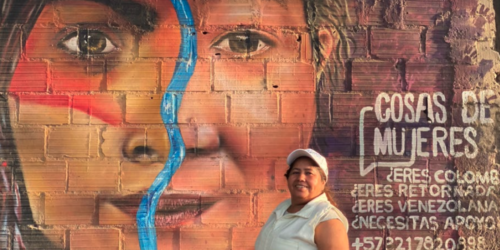
Friday, 25 November 2022, 17:15 – 18:30, followed by an apéro
University of Neuchâtel, Av. du Premier-Mars 26, Room C54
The documentary “Weaving Threads Across Borders” – “Tejiendo entre Fronteras” – shows the struggle of three Colombian women living on the Colombia-Venezuela border, a zone of geopolitical conflict where guerrillas, paramilitaries, and the Venezuelan army fight for control over the territory. These three stories are illustrative of the situation experienced by many internally displaced persons and forced migrants. Despite the pervasive violence, the immobility policies of the Venezuelan government, and the absence of the Colombian state, these women develop strategies to survive with their small businesses and to weave social fabric between the two sides of the border. The documentary, constructed in three chapters, focuses on these important dynamics.
The screening of the documentary will be introduced by Yvonne Riaño (documentary research and script), followed by an open discussion together with Germán Arango (documentary director and script), Ana Teresa Castillo (documentary field-support), and Carolin Schurr (discussant).
This documentary has been funded by the nccr – on the move and the University of Neuchâtel.
All the information on the documentary launch can be found here (PDF)
If you have any questions, please contact Nora Bardelli, Knowledge Transfer Officer at the nccr – on the move nora.bardelli@nccr-onthemove.ch
Corps et espaces en temps de crises Perspectives féministes
Conférence et table ronde
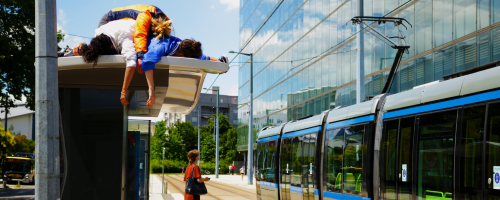
Mercredi 2 novembre 2022
14h15 – 16h Conférence publique
Université de Neuchâtel, Espace Tilo-Frey 1, salle R.N.02
18h – 19h30 Table ronde suivie d’un apéro
ESPACE Neuchâtel, Avenue de Clos-Brochet 10
Cet événement est organisé à l’occasion de la parution du numéro spécial de la revue Géo-Regards « Corps et espaces en temps de crises – Perspectives féministes » édité par Suzy Blondin (Université de Neuchâtel), Sunčana Laketa (Université de Neuchâtel), Christina Mittmasser (Université de Neuchâtel | nccr – on the move) et Laure Sandoz (Université de Neuchâtel | nccr – on the move). La publication est disponible ici.
Plus d’informations et programme (PDF)
Inscription jusqu’au 28 octobre 2022 sur cette page
Migration and Discrimination: A Normative Exploration
Workshop

Wednesday and Thursday, 28-29 September 2022
The Centre for the Experimental-Philosophical Study of Discrimination (CEPDISC), Aarhus University
This workshop addresses issues of migration and integration – both from the perspective of theories of discrimination and from the perspective of migration ethics.
Looking Back at the Neuchâtel Graduate Conference 2022

The fifth edition of the Neuchâtel Graduate Conference on the theme of “Tensions in Migration and Mobility” took place from 7 to 8 July at the University of Neuchâtel and online. The conference provided a stimulating and informal context where researchers from various institutions and interdisciplinary backgrounds could exchange ideas, get expert feedback, establish networks, and initiate collaborative work.
The conference came to fruition through the successful endeavor of its organizing committee, consisting of nccr – on the move members, Leslie Ader, Mia Gandenberger, Ihssane Otmani, Aurélie Pont, Livia Tomas and Robin Stünzi (chair). With the help of some other members, they designed the content of the working groups, selected the applications, identified the participants for the panels, organized side activities, chaired sessions, and selected candidates for the Best Paper Award.
The large number of applications, from over 90 young researchers based in 30 countries, made the task of selecting the successful proposals demanding. Nevertheless, the selection committee managed to narrow down the number to 48 accepted proposals, divided into 6 working groups falling under the same overarching theme of “Tensions in Migration and Mobility.”
These were: 1) Policy and Governance Tensions in the Fields of Migration and Mobility; 2) Understanding Citizenship under Tension; 3) Tensions Developed in a Transnational Social World 4) Between Access and Exclusion: Tensions in Attitudes and Preferences in the Attribution of Rights to Migrants 5) Tensions in Refugees’ and Migrants’ Integration 6) Current and Future Tensions in the Field of Migration and Mobility.
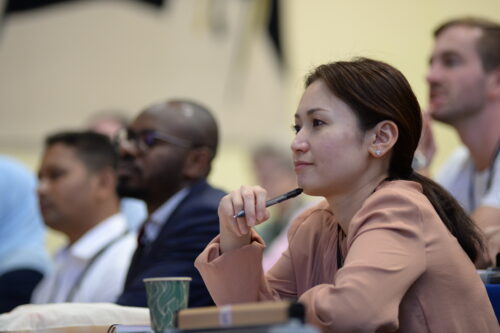
Klaudia Wegschaider, from the University of Oxford, received the Best Paper Award for her article: “The Effect of Simultaneous Popular Votes: The Case of Immigrant Enfranchisement.” The members of the Jury wanted to reward a well-structured paper, tackling an important issue and drawing on rich and diverse data to provide robust and compelling results.
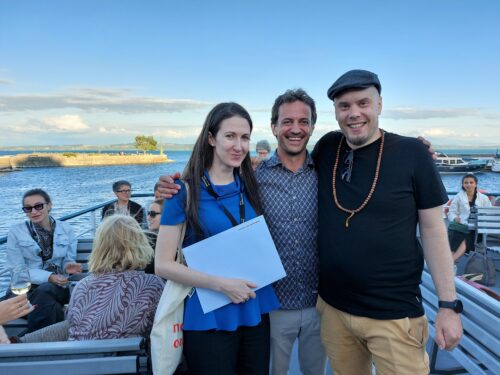 During the Conference, the participants had the opportunity to listen to one of the most prominent theorists in the field of migration studies, Adrian Favell, who delivered a keynote address entitled “The Integration Nation: Towards a New Critical Political Demography” based on his new book. The video of his keynote lecture can be viewed on our YouTube channel through this link.
During the Conference, the participants had the opportunity to listen to one of the most prominent theorists in the field of migration studies, Adrian Favell, who delivered a keynote address entitled “The Integration Nation: Towards a New Critical Political Demography” based on his new book. The video of his keynote lecture can be viewed on our YouTube channel through this link.
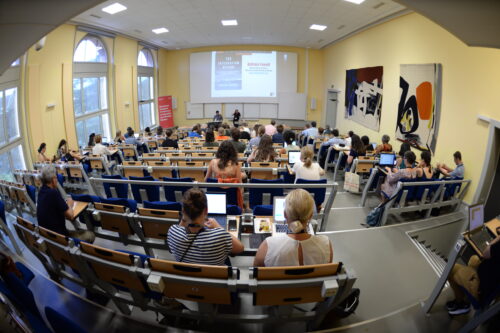
The 2022 Graduate Conference also included a panel on ethics in migration research, moderated by Matteo Gianni and featuring Libby Bishop, Tina Miller, Elodie Malbois and Didier Ruedin. The four scholars explored many pressing ethical issues in the field of migration and mobility studies, such as the treatment of participants, the use and sharing of qualitative and quantitative data, and the use of Big Data for research purposes.
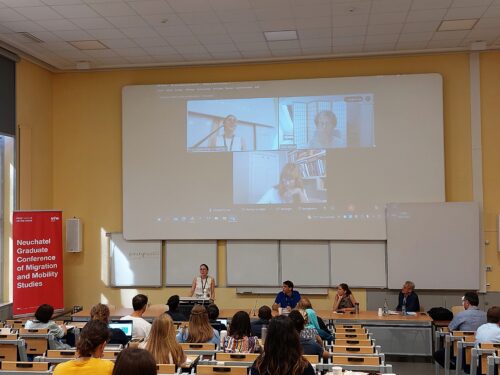
In addition to the traditional lectures and panels, we organized one speed-dating session on career opportunities. The participants had the opportunity to exchange with 11 professionals with different trajectories and positions in Swiss and international institutions to get an idea of what professional opportunities lie ahead in the field of migration, both in academia and outside of it.
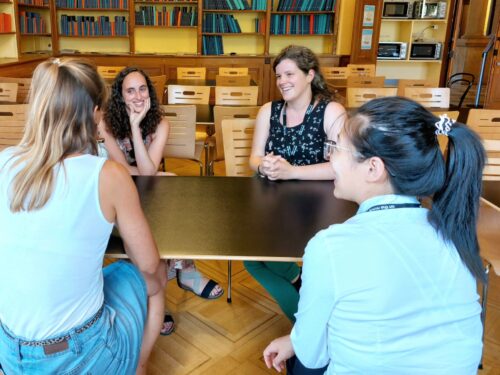
The feedback received from the participants was very positive. Participants greatly appreciated the working group format and the considerable amount of feedback they received from the mentors and assigned discussants. The relaxed collaborative atmosphere, the interactions and exchanges between junior and senior researchers, the interdisciplinarity, and the breadth of topics covered in the fields of migration and mobility studies were also noted.
On a more critical note, some of the participants regretted the technical issues with online presentations in the sessions and would have appreciated more opportunities to meet people from other working groups. Finally, we received useful recommendations for the organization of future editions, in particular as per the clarity and timeliness of the information to be sent to the presenters, mentors, discussants and chairs before the conference. A full report of the survey is available here.
The sixth edition of the conference will take place on 6 and 7 July 2023. For this edition, we will continue to experiment with the format of this event, while preserving its distinguishing features: the long time allocated for the papers, discussant and expert feedback, the collaborative atmosphere, as well as for the interdisciplinary and constructive exchange between junior and senior researchers.
Diversités et politiques publiques : enjeux scientifiques et pratiques
Colloque

Jeudi 1er septembre 2022, 10:00 – 17:30, suivi d’un apéro
Université de Neuchâtel, faculté des lettres et sciences humaines,
Espace Tilo-Frey 1, salle R.N.02
Evénement coorganisé par l’Université de Neuchâtel et le Département de l’emploi et de la cohésion sociale (DECS) du canton de Neuchâtel. Avec le soutien du centre de recherche nccr on – the move.
Cet événement s’inscrit dans une démarche plus large – les Assises de la cohésion sociale – initiée par le DECS.
Ce colloque est destiné aux personnes du monde académique, de la pratique (notamment administrations publiques) et du domaine associatif, ainsi qu’à toute personne intéressée.
Inscription jusqu’au 28 août 2022 en précisant le choix du workshop à l’adresse suivante : aylin.eriksen@unine.ch.
Plus d’informations et programme (PDF)
Public Lecture Series:
Spring 2022

Tuesday 10 May 2022
Academic Conversation:
Is Migration Really About Migration? The Weight of Race, Class and Gender in Migration Studies
Andreas Wimmer, Columbia University
Janine Dahinden, University of Neuchâtel
18:15 – 19:45 at Salon du Bleu Café, Faubourg du Lac 27, Neuchâtel
Abstract (PDF/Video)
Wednesday 18 May
Migration History Talk:
Culturalization of Migration: Exclusionary Politics of Precarity in an Entangled World
Shalini Randeria, Central European University
17:30 – 19:00 at the University of Neuchâtel, Avenue du 1er-Mars 26, Room B32
Abstract (PDF)
Tuesday 24 May 2022
Public Lecture:
Social Reproduction Gone Wrong? The Citizenship Revocation and Rehabilitation of Young European Women who Joined ISIS
Anna Korteweg, University of Toronto
18:45 – 20:15 at the University of Neuchâtel, Avenue du 1er-Mars 26, Room C49
Abstract (PDF)
Thursday 2 June 2022
Academic Conversation:
Is Mobility a Cause of or a Solution to Global Warming?
Vincent Kaufmann, EPFL
Etienne Piguet, University of Neuchâtel
18:15 – 19:45 at Salon du Bleu Café, Faubourg du Lac 27, Neuchâtel
Abstract (PDF)
Tuesday 7 June 2022
History Lecture:
Migration as a Tool for National Homogenization: Insights from Fascist Italy
Emmanuel Dalle Mulle, Universidad Complutense de Madrid
17:30 – 19:00 at the University of Neuchâtel, Louis Bréguet 2, Room 2.310
Abstract (PDF)
Thursday 7 July 2022
Public Lecture:
The Integration Nation: Towards a New Critical Political Demography
Adrian Favell, University of Leeds
11:30 – 13:00 at the University of Neuchâtel, Avenue du 1er-Mars 26, Room C46
Abstract (PDF)
Program Flyer of the Lecture Series Spring 2022 (PDF)
The videos of the past Public Lectures and Academic Conversations are available on our YouTube channel
Ethics in Migration Research
Panel at the Neuchâtel Graduate Conference
Libby Bishop, Leibniz Institute for the Social Sciences
Tina Miller, Oxford Brookes University
Elodie Malbois, University of Geneva
Didier Ruedin, University of Neuchâtel
Moderation: Matteo Gianni, University of Geneva

Friday, 8 July 2022, 09:00 – 10:30
This panel will be held in person at the University of Neuchâtel, Avenue du 1er-Mars 26, Room C46
and on WEBEX
Program (PDF)
Neuchâtel Graduate Conference 2022
Tensions in Migration and Mobility

University of Neuchâtel 7-8 July 2022
The Neuchâtel Graduate Conference (NGC) is an international graduate conference organized by the nccr – on the move, Swiss National Center of Competence in Research (NCCR) for migration and mobility studies. It provides a stimulating environment in which PhD and Postdoctoral fellows from different universities and research institutions can exchange ideas, establish networks, and initiate collaborative research.
The 5th edition took place from 7 to 8 July 2022 in Neuchâtel, provided opportunities to meet other researchers in formal and informal gatherings. The topic was ‘Tensions in Migration and Mobility.’
Main plenary events:
Thursday, 7 July 2022
11:30 Public Lecture: The Integration Nation: Towards a New Critical Political Demography
Adrian Favell, University of Leeds
16:30 Speed Dating on Career Opportunities
Friday, 8 July 2022
09:00 Panel on Ethics in Migration Research
Libby Bishop, Leibniz Institute for the Social Sciences
Tina Miller, Oxford Brookes University
Elodie Malbois, University of Geneva
Didier Ruedin, University of Neuchâtel
Matteo Gianni, University of Geneva
Conference Program
Download the program here (PDF)
Registrations
Registration is closed
Looking Back at the Conference here
For more information, please first check out the FAQ, or contact Robin Stünzi, the Education Officer of the nccr – on the move robin.stunzi@nccr-onthemove.ch.
The Integration Nation: Towards a New Critical Political Demography
Public Lecture at the Neuchâtel Graduate Conference
Prof. Adrian Favell, University of Leeds

Thursday, 7 July 2022, 11:30 – 13:00
This talk will be held in person at the University of Neuchâtel, Avenue du 1er-Mars 26, Room C46 and on WEBEX as well as live-streamed on YouTube.
Program (PDF)
Closing Event of Phase II
What is Migration Research for? A Conversation on the Policy-Science Nexus and Awarding of Doctoral Program Certificates

The event will mark the end of the second phase of the nccr – on the move and will serve as an occasion to reflect on the relationship between research and policy as well as to celebrate the awarding of Doctoral Program Certificates.
Wednesday, 6 July 2022 13:00 – 17:30
Venue: Hôtel Beaulac Neuchâtel
Program (PDF)
Registration is closed.
Migration as a Tool for National Homogenization: Insights from Fascist Italy
Migration History Talk
Prof. Emmanuel Dalle Mulle, Universidad Complutense de Madrid

Tuesday, 7 June 2022, 17:30 – 19:00
This talk will be held in person at the University of Neuchâtel, Louis Breguet 2, Room 2.310 and on WEBEX as well as live-streamed on YouTube.
Program (PDF)
Public Lecture Series Spring 2019
Enablers and Deterrents of Mobility

The Public Lectures take place on Thursdays from 18:15 to 19:45
University of Neuchâtel, Avenue du 1er-Mars 26, Room B32
Thursday 13 December 2018
Entanglements: Passports, Migrant Workers, and the Question of Gender
Prof. Nicole Constable, Department of Anthropology, University of Pittsburgh
Discussant: Prof. Janine Dahinden, Laboratory for the Study of Social Processes, University of Neuchâtel
Different Location: University of Neuchâtel, Rue Abram-Louis-Breguet 2, Room R.113
Abstract (PDF)
Thursday 31 January 2019
Mobilization and Representation of the “Hidden Children” of Immigrant Workers in Switzerland (1970s-1990s)
Prof. Kristina Schulz, Institute of History, University of Neuchâtel
Discussant: Prof. Gianni D’Amato, University of Neuchâtel
Abstract (PDF)
Jointly organized with the History Institute, University of Neuchâtel
Thursday 28 March 2019
Academic Mobility and Transnational Knowledge Brokerage Through a Lens of Intersecting Social Inequalities
Prof. Kyoko Shinozaki, Department of Sociology, University of Salzburg
Discussant: Philip Balsiger, University of Neuchâtel
Abstract (PDF)
Thursday 11 April 2019
Immigrant Naturalization in Denmark, the Netherlands and Sweden: Origin, Destination and Life Course in Longitudinal Perspective (1994-2016)
Prof. Pieter Bevelander, Department of Global Political Studies, Malmö University
Discussant: Philippe Wanner, University of Geneva
Abstract (PDF)
Thursday 6 June 2019
Education in the Cosmopolis: Cosmopolitanism, Globalization and Post-Critical Perspectives
Prof. Michalis Kontopodis, School of Education, University of Leeds
Discussant: Laure Kloetzer, University of Neuchâtel
Abstract (PDF)
Program Flyer Public Lecture Series Spring 2019
Cinéma Mobilité – 2022
Different Perspectives on Mobility and Migration in Swiss Movies
The University of Neuchâtel and the «nccr – on the move» are organizing a movie series as part of the Seminar “Les mobilités humaines dans le cinéma”.
The screening of each movie will be followed by an open discussion with the filmmaker and be moderated by Gianni D’Amato.
These are public events and free tickets can be reserved via an online form link on the movie flyers. The movies are screened at the Cinéma Minimum, Quai Philippe-Godet 20, 2000 Neuchâtel.
Thursday, 10 March 2022, 16:00 – 19:00
Babylon 2 | 1993 | Samir | Switzerland | Documentary | 90’ |
Swiss-German with subtitles in French
Trailer (online) | Flyer (PDF)
Thursday, 24 March 2022, 16:30 – 19:30
Mon père, la révolution et moi | 2013 | Ufuk Emiroglu | Switzerland | Documentary | 81’ | French/Turkish with subtitles in German & French
Trailer (online) | Flyer (PDF)
Thursday, 7 April 2022, 16:30 – 19:30
SHANA – The Wolfs Music | 2014 | Nino Jacusso | Switzerland / Canada | Fiction | 95’ | English with subtitles in German & French
Trailer (online) | Flyer (PDF)
Thursday, 19 May 2022, 16:30 – 19:30
Willkommen in der Schweiz | 2017 | Sabine Gisiger | Switzerland | Documentary | 83’ | Swiss-German with subtitles in German & French
Trailer (online) | Flyer (PDF)
Thursday, 2 June 2022, 16:30 – 19:30
Dynamic Wisdom | 2022 | Elise Shubs | Switzerland | Documentary / Experimental | 75’ | English with subtitles in French
Trailer (online) | Flyer (PDF)
Dynamic Wisdom
Cinéma Mobilité
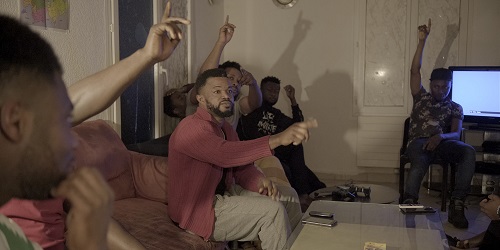
Thursday, 2 June 2022, 16:30 – 19:30
Cinéma Minimum, Quai Philippe-Godet 20, 2000 Neuchâtel
Dynamic Wisdom | 2022 | Elise Shubs | Switzerland | Documentary/Experimental | 75’ | English with subtitles in French
Dynamic Wisdom is a self-managed collective that breaks norms and creates its own laws. Twenty-five Nigerian migrants live together in Switzerland in a small abandoned house, sticking together so that they never have to sleep outside again. But until when? A story between hope and despair, of these suspended lives, waiting for another future.
The screening of the movie will be followed by an open discussion with Elise Shubs, the filmmaker, moderated by Gianni D’Amato.
This is a public event and free tickets can be reserved via this online form.
Trailer (online) | Flyer (PDF)
La Mobilité: Cause, Symptôme ou Solution au Changement Climatique?
Conversation Académique
Prof. Vincent Kaufmann, EPFL et
Prof. Etienne Piguet, Université de Neuchâtel

Jeudi – 2 juin 2022, 18:30 – 20:00
La conversation a lieu au Salon du Bleu Café, Faubourg du Lac 27, Neuchâtel, et en ligne sur WEBEX (https://unine.webex.com/meet/robin.stunzi)
Programme (PDF)
Social Reproduction Gone Wrong? The Citizenship Revocation and Rehabilitation of Young European Women Who Joined ISIS
Public Lecture
Prof. Anna Korteweg, University of Toronto

Tuesday, 24 May 2022, 18:45 – 19:45
This talk will be held in person at the University of Neuchâtel, Avenue du 1er-Mars 26, Room C49 and online on WEBEX as well as live-streamed on YouTube.
Program (PDF)
Willkommen in der Schweiz
Cinéma Mobilité
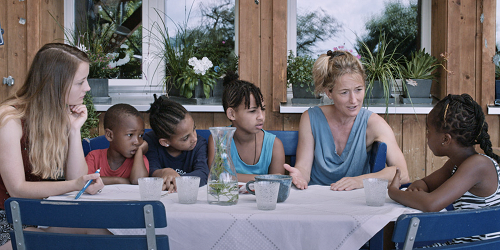
Thursday, 19 May 2022, 16:30 – 19:30
Cinéma Minimum, Quai Philippe-Godet 20, 2000 Neuchâtel
Willkommen in der Schweiz | 2017 | Sabine Gisiger | Switzerland | Documentary | 83’ | Swiss-German with subtitles in German & French
In the summer of 2015, about 1,000,000 people seek refuge in Europe, 40,000 make it to Switzerland, 10 are assigned to the wealthy municipality of Oberwil-Lieli. The mayor of the village Andreas Glarner wants to make an example and refuses to take in the refugees. In reaction, Johanna, a young student, organizes resistance and creates an association to show their solidarity. Meanwhile, Glarner becomes a member of the National Council and head of migration for the Swiss People’s Party. The Green Party member, Susanne Hochuli, who is responsible for housing the asylum seekers in Aarau, worries that fears and ideological debates are preventing us from finding clever solutions.
The screening of the movie will be followed by an open discussion with Sabine Gisiger, the filmmaker, moderated by Gianni D’Amato.
This is a public event and free tickets can be reserved via this online form.
Trailer (online) | Flyer (PDF)
Citizenship from Paper to Practice: Perspectives on the Implementation Gap
Workshop
Organized by the IMISCOE’s Standing Committee on Migration, Citizenship and Political Participation (MIGCITPOL) and the University of Neuchâtel, and the nccr – on the move

Thursday and Friday, 19 – 20 May 2022
Venue: Université de Neuchâtel, Room 2.310, Bréguet 2, 2000 Neuchâtel and online on WEBEX
Program (PDF)
Culturalization of Migration: Exclusionary Politics of Precarity in an Entangled World
Migration History Talk
Prof. Shalini Randeria, Central European University

Wednesday, 18 May 2022, 17:30 – 19:00
University of Neuchâtel, Avenue du 1er-Mars 26, Room B32
This talk will be held online on WEBEX and will be live-streamed on YouTube.
Program (PDF)
Welfare and Human Mobility in Europe: Past and Present Challenges
Conference
Organized by the Department of History, University of Basel, the University of Neuchâtel, and the nccr – on the move

Thursday and Friday, 12 – 13 May 2022
Venue: University of Basel and Mission 21, Missionsstrasse 21, Basel
On 12 May 2022 Keynote Lecture from 18:15 – 20:15 and followed by a dinner and on 13 May 2022 from 09:00 – 18:00
Abstract
This conference investigates the intersection between Welfare and human mobility in Europe since the mid-20th century. After World War II, migration, mobility and related policies acted both as a challenge and an engine for Welfare regimes in Europe, on a national and transnational level. The conference investigates three sites of the Welfare-mobility-nexus.
Section 1: European Integration
Since the Treaty of Rome (1958), European integration relied on open borders for migrants coming from within the Community, but also on coordinated and aligned levels of social security. Geographically, the conference focuses on Europe with its varied institutions and political experiences, but also its diverse forms of mobility, domestic and international. The mechanisms and dynamics of different policies and the invention of new Welfare institutions in response to problematic effects of mobility and migration, in particular increased social and legal inequality.
Section 2: Colonial Legacies
Welfare policies in Europe were not only challenged by intra-European mobility, but also by millions of people coming from (former) colonies as ex-subjects of the empire. The legacy of the colonial experience raises questions on its relation with Welfare regimes in Europe, and their capacity to (re-)compose European societies.
Section 3: International Organizations
Finally, the liberal international and institutional setting after the two world wars and the integration of Western Europe added even more complexity to the picture, recognizing human rights and mobility as fundamental freedoms. International organizations such as the UN, the ILO or the OECD played an increasing role in shaping Welfare and migration policies. The contributors to the conference will discuss how the national Welfare state learnt to cope with these challenges, and what the dynamics and outcomes were in different Welfare regimes in Europe.
The contributions to the conference use historical and comparative approaches, in order to analyze the mechanisms and dynamics of specific patterns of human mobility and related Welfare policies. They discuss the different aspects of societal, political and institutional transformations and their connection to mobility in Europe.
Flyer with detailed program (PDF) | Keynote (PDF)
Why neither ‘Replacement’ nor the Notion of ‘Superdiversity‘ Help Us to Understand the Consequences of Mass Immigration Into Cities
The Example of Amsterdam 1550-2022
Keynote Lecture
Leo Lucassen (International Institute of Social History IISH, Amsterdam | Leiden University)

Thursday 12 May 2022
Venue: Kollegienhaus, University of Basel, Petersplatz 1, Basel, Lecture Room 001
With an Introduction from Martin Lengwiler (University of Basel)
and Gianni D’Amato (nccr – on the move) on Welfare and Migration – Conceptual Challenges and Empirical Perspectives
The Keynote Lecture as part of the confrence on “Welfare and Human Mobility in Europe: Past and Present Challenges” is co-organized by the Department of History, University of Basel, the University of Neuchâtel, and the nccr – on the move.
Keynote Flyer (PDF) | Full Conference Programm (PDF)
Is Immigration Really About Immigration? A Conversation with Janine Dahinden and Andreas Wimmer
Academic Conversation
with Prof. Andreas Wimmer, Columbia University and
Prof. Janine Dahinden, University of Neuchâtel

Tuesday, 10 May 2022, 18:15 – 19:45
This conversation will be held in person at the Salon du Bleu Café, Faubourg du Lac 27, Neuchâtel, and online on WEBEX as well as live-streamed on our YouTube channel.
Collaborative Research and Writing
Interdisciplinary Workshop
Organizers: Lisa Marie Borrelli (HES-SO Valais | nccr – on the move), Jan Beek (Johannes Gutenberg University), Anna Wyss (University of Neuchâtel | nccr – on the move)

Thursday and Friday, 5 – 6 May 2022
University of Neuchâtel, Avenue du 1er-Mars 26, Room R.O.12
The workshop takes place in person in Neuchâtel and online participation is possible via Webex. A link will be sent after the receipt of the registration.
Those interested in the workshop can register until 3 May 2022. Please e-mail to Anna Wyss: anna.wyss@unine.ch.
More Information and Program (PDF)
The nccr – on the move Phase III Gets a Go-ahead!

We are delighted to announce that the Swiss National Science Foundation (SNSF) has approved the continuation of the nccr – on the move in Phase III (2022 to 2026).
Expanding the expertise we have developed on the interplay between the COVID-19 pandemic and mobility and migration in the previous phase, research in Phase III will focus on the topic of the impact of crises on migration and (im)mobility.
The projects in Phase III will share an understanding of crises as (a chain of) events with large-scale effects which are broadly perceived as fundamental challenges that require responses.
We will distinguish between four types of crises (public health, economic, political and environmental) and investigate their longitudinal impact on migration and (im)mobility on four geographical scales (inter- or supranational, national, regional and local) and the following three topical levels of analysis:
– Perceptions: the development and politicization of crisis narratives, and relatedly, of the perception of migration and (im)mobility by various stakeholders in the unfolding of a given crisis and its aftermath,
– Governance: the entailing transformations in migration and mobility governance, and
– Practices: the positionalities and actions of (im)mobile people in response to the governance of migration and (im)mobility during the crisis.
SHANA – The Wolfs Music
Ciné Mobilité

Thursday, 7 April 2022, 16:30 – 19:30
Cinéma Minimum, Quai Philippe-Godet 20, 2000 Neuchâtel
SHANA – The Wolfs Music | 2014 | Nino Jacusso | Switzerland / Canada | Fiction | 95’ | English with subtitles in German & French
Shana, a talented violinist, lives with her father in a First Nations village in Canada. Two years ago, her mother went into the forest and never returned. Shana writes her heart-rending notes and hangs them in a special ancestor tree. A white wolf seems to be magically drawn to her. Shana’s teacher has discovered her great talent and registers her at the music school in Vancouver. Before the entrance exam, Shana’s father sells her mother’s antique wolf’s head violin. In search of this important memento, she plunges deep into the forest, where she encounters the wolf and the spirits of her ancestors.
The screening of the movie as part of the Seminar “Les mobilités humaines dans le cinéma” will be followed by an open discussion with Nino Jacusso, the filmmaker, moderated by Gianni D’Amato.
This is a public event and free tickets can be reserved via this online form.
Trailer (online) | Flyer (PDF)
Neuchâtel Graduate Conference 2022: Call for Papers
University of Neuchâtel
7 – 8 July 2022
The Neuchâtel Graduate Conference is an international graduate conference organized by the nccr – on the move. It provides a stimulating environment in which doctoral and postdoctoral researchers from different universities and research institutions can exchange ideas, establish networks, attend targeted training, and initiate collaborative research.

Call for Papers: Tensions in Migration and Mobility
The topic of this year will be “Tensions in Migration and Mobility”. Deeply embedded in broader global economic, social, political and technological transformations, patterns of human movement are affected by tensions operating in a myriad of ways and at multiple scales. With this in mind, we wish to encourage junior researchers to explore past, contemporary or future tensions regarding the regulation and the experience of human movement.
We welcome papers addressing this overarching topic from all related disciplines in migration and mobility studies, such as demography, economics, geography, law, political science, sociology, and other relevant fields.
We especially welcome papers on the following topics:
- Policy and Governance Tensions in the Fields of Migration and Mobility
- Understanding Citizenship under Tension
- Tensions Developed in a Transnational Social World
- Between Access and Exclusion: Tensions in Attitudes and Preferences in the Attribution of Rights to Migrants
- Tensions in Refugees’ and Migrants’ Integration
- Rising Tensions in the Anthropocene: the Strained Relations between Mobility and Global Warming
The deadline for submission is 31 March 2022.
There is no participation fee. To encourage participation fro all universities, the nccr – on the move will provide funding opportunities up to CHF 400. Funding for the Neuchâtel Graduate Conference of Migration and Mobility Studies is specifically designed for international graduate students traveling from far or without mobility funding.
Please read the full call for papers for more information (PDF) and register via this form.
Mon père, la révolution et moi
Cinéma Mobilité

Thursday, 24 March 2022, 16:30 – 19:30
Cinéma Minimum, Quai Philippe-Godet 20, 2000 Neuchâtel
Mon père, la révolution et moi | 2013 | Ufuk Emiroglu | Switzerland | Documentary | 81’ | French/Turkish with subtitles in German & French
In 1980, the filmmaker’s birth is overshadowed by the revolution. “I was born in the middle of a dream.” But another refrain runs through the film: “What am I to do with this legacy?” This family drama is a quest of identity and politics that takes us from Turkey in the 1970s to Switzerland in the 21st century, dealing with exile, prison, false money, fallen heroes, hippies gone astray and a revolutionary disco along the way. A mosaic of a film, which moves freely between documentary, fiction and animation.
The screening of the movie as part of the Seminar “Les mobilités humaines dans le cinéma” will be followed by an open discussion with Ufuk Emiroglu, the Turkish-Swiss filmmaker, moderated by Gianni D’Amato.
This is a public event and free tickets can be reserved via this online form.
Trailer (online) | Flyer (PDF)
Babylon 2
Cinéma Mobilité

Thursday, 10 March 2022, 16:00 – 19:00
Cinéma Minimum, Quai Philippe-Godet 20, 2000 Neuchâtel
Babylon 2 | 1993 | Samir | Switzerland | Documentary | 90’
Swiss-German with subtitles in French
This is one of the first movies about secondos living in Zürich in the 90ties: A Turkish ice hockey player tells why he could only fall in love with an Italian woman in Switzerland. A young Italian woman explains why she prefers to rap in English. Carlos Leal, then a young hip-hop singer (Sens Unik) with Spanish roots demands his political rights and the director remembers how he was attacked as a Jew despite his Arab origin. A reflection on the emergence of a new urban culture in Switzerland by the second generation of immigrants.
The screening of the movie as part of the Seminar “Les mobilités humaines dans le cinéma” will be followed by an open discussion with Samir, the Iraqi-Swiss filmmaker, moderated by Gianni D’Amato.
This is a public event and free tickets can be reserved via this online form.
Trailer (online) | Flyer (PDF)
Call for Blog Contributions
Twenty Years of ‘Reflexive’ Migration Studies: Approaches, Application and New Challenges

A joint initiative of the IMISCOE Standing Committee Reflexivities in Migration Studies and the nccr – on the move
Blog Series Editors: Aldina Camenisch, Janine Dahinden, Robin Stünzi
About the Blog Series
Research about migration has historically been largely shaped – and is arguably still dominated – by a western-, state- and immigration-centered perspective. One of the early challenges of this perspective was Wimmer’s and Glick Schiller’s seminal article ‘Methodological Nationalism and Beyond: Nation-State Building, Migration and the Social Science’, published twenty years ago in 2002. Their plea to overcome “the assumption that the nation/state/society is the natural social and political form of the modern world” (2002: 302) stands for the advent of what is now generally framed as ‘critical’ or ‘reflexive’ Migration Studies.
The diverse debates in this field address not only methodological nationalism but also other problematic features (e.g. the ‘ethnic lens’) that frame mobile humans as problematic and migration as exceptional. A growing number of scholars furthermore criticize the geopolitics of knowledge production in Migration Studies, for example by examining the researchers’ positionalities or exposing the colorblindness or postcoloniality of migration research in Europe. In order not to reproduce essentialist views and hegemonic power relations, reflexive migration researchers have proposed participatory methods as well as called for a ‘mobility turn’ (Sheller and Urry) to approach mobility in more comprehensive ways, or for the “de-migranticization” of migration research (Dahinden) that scrutinizes the assumption of the a priori difference between migrants and non-migrants which often informs research in this field.
This blog series takes the twentieth anniversary of Glick Schiller’s and Wimmer’s article as an opportunity for a ‘tour d’horizon’ of the insights and impact of these varied, yet related challenges to traditional migration research, but also of the potential shortcomings or pitfalls of a ‘critical’ or ‘reflexive’ approach to migration and mobility. Contributions to this series may address the development of the field at large, zoom in on specific conceptual debates or methodological approaches, or reflect on individual experiences. Blog posts could also examine the impact of reflexive migration studies on certain disciplines or discuss the operationalization of the rather theoretical ‘reflexive’ considerations in qualitative or quantitative research. Equally welcome are contributions challenging certain assumptions widely shared in ‘critical’ / ‘reflexive’ approaches to migration and mobility, or that raise hitherto little considered issues. We are particularly interested in the submission of early-career (and minoritized) scholars.
Blog Propositions
If you are interested in contributing to this blog series, please send a proposal of max. 200 words to the editors: aldina.camenisch@unine.ch, janine.dahinden@unine.ch and robin.stunzi@unine.ch.
The deadline for submissions is 27 February 2022. The selection of accepted contributions will be completed by mid-March and the submission of contributions (expected length up to 6’000 characters incl. spaces) will be due from mid-April onwards.
Call for blog contribution (PDF)
Public Lecture Series:
Fall 2021
Academic Controversies in the Field of Migration and Mobility Studies
Thursday 28 October 2021
News Representations of Migration: Humanitarian Responsibility in ‘Crisis’?
Kerry Moore, Cardiff University
Abstract (PDF)
Thursday 18 November 2021
Migrants with Disabilities and Social Protection
Facundo Chávez Penillas, Office of the United Nations High Commissioner for Human Rights
Abstract (PDF)
Thursday 9 December 2021
Academic Conversation: Too Soft, or Too Tough? The Truth About Migration Policies in Europe
Hein de Haas, University of Amsterdam
Anita Manatschal, University of Neuchâtel
Abstract (PDF)
Thursday 27 January 2022
Migration Studies and Colonialism
Lucy Mayblin, University of Sheffield
Abstract (PDF)
These Public Lectures take place from 18:15 to 19:45 online on Webex and will be streamed online on the nccr – on the move YouTube channel
Program Flyer of the Lecture Series Fall 2021 (PDF)
The videos of the past Public Lectures from 2020/2021 are also available on YouTube
Migration Studies and Colonialism
Public Lecture
Lucy Mayblin, University of Sheffield
Discussant: Pap Ndiaye, Sciences Po Paris | Palais de la Porte Dorée

NEW DATE: Thursday, 27 January 2022, 18:00 – 19:30 h
This Public Lecture takes place on Webex (password: NCCR) and will be streamed online on YouTube
Program and Abstract (PDF)
Call for Papers for an IMISCOE Workshop
 Citizenship from Paper to Practice: Perspectives on the Implementation Gap
Citizenship from Paper to Practice: Perspectives on the Implementation Gap
Call issued by the IMISCOE’s Migration, Citizenship and Political Participation Standing Committee (MIGCITPOL)
Deadline for Submissions: 10 December 2021
Workshop: 19-20 May 2022
University of Neuchâtel
The gap between citizenship law and policy practice has long been identified: from outright dissonance between legal norms and arbitrary practices to “milder” forms of deviation, as in the spaces opened for interpretation and discretion of the street-level bureaucrats. Moreover, as the field has expanded geographically to non-democratic or less affluent states, there are reasons to believe that the challenges are bigger than we had thought. Yet, the conceptualization of the implementation gap and its many nuances along the continuum is still weak.
We invite original contributions that will advance our understanding of the so-called “implementation gap” from both theoretical and empirical perspectives. The paper proposals can be inspired by any of the following questions:
1. What is an implementation gap? What are the normative issues related to it (e.g., is it inherently bad for a polity?)
2. How do we theorize the line between discretion and arbitrariness, and does this theorization travel well across polities with different political structures?
3. What are the challenges to observing and comparing the implementation of citizenship policies across countries? What are the existing measures of implementation, what are their limitations, and how could they be improved?
4. Who implements citizenship policy? Are implementation agencies comparable across countries and levels of government, and how do they impact the width of the implementation gap?
5. What are the lessons from the work on street-level bureaucracies for the study of implementation gaps and which research methods can help us to scale up the observations and compare across countries?
Aims of the Workshop
With this workshop, MIGCITPOL aims to produce an original publication, either in the form of a Special Issue or edited volume. By sending an abstract the applicants commit to present original work at the Workshop and reserve it as unpublished work for the aimed publication. The Workshop will allow for intense discussions on all papers, therefore constituting an authors’ workshop.
Deadline for abstracts (300 words): 10 December 2021.
To be sent to jean-thomas.arrighi@unine.ch
Notification of acceptance: 21 December 2021.
Delivery of first draft: 2 May 2022.
Workshop: 19-20 May 2022, in person at the University of Neuchâtel, Nccr on the move (Switzerland) and online on WEBEX. Participants are highly encouraged to attend in person, though Covid-related restrictions, which are unequally distributed across countries, should not impede participation.
Funding: The organizers offer limited funding opportunities to cover the travel and accommodation expenses of selected applicants. Priority will be given to early-career researchers and applicants enrolled in universities in lower-income countries.
Full Call (PDF)
Too Soft, or Too Tough? The Truth About Migration Policies in Europe
Academic Conversation
Hein de Haas, University of Amsterdam
Anita Manatschal, University of Neuchâtel
Moderation: Jean-Thomas Arrighi, University of Neuchâtel

Thursday, 9 December 2021, 18:15 – 19:45
This Public Lecture takes place on Webex (password: NCCR) and on YouTube.
Program and Abstract (PDF)
Minority and Majority as Asymmetrical Concepts: The Perils of Democratic Equality and Fantasies of National Purity
Migration History Talk
Till van Rahden, Université de Montréal, Canada

Wednesday, 1 December 2021, 17:30 – 19:00
This seminar will be held in person at the University of Neuchâtel, Louis Bréguet 2, online on Webex and will be live-streamed on the nccr – on the move YouTube channel
The Migration History Series is co-organized by the History Department of the University of Neuchâtel and the nccr – on the move. For any further information regarding the series, please send an email to jean-thomas.arrighi@unine.ch
Abstract (PDF)
The Intersectionality of Queer Migration Studies
Workshop + Movie Session

Friday, 26 November 2021, 14:00 – 21:00
University of Neuchâtel, Espace Tilo-Frey 1, Room RS.38.
Workshop Program (PDF)
In this gathering five scholars will discuss some of their new migration research projects through the
prism of gender and sexuality – including the screening of the recent docu-film Caer on sex work and
migration in the presence of the director. In so doing they will stimulate discussions on how and what
this burgeoning academic scholarship contributes to intersectional approaches across social research.
Please register for this workshop via the following link
About the Movie
Caer (Caught) | 2021 | USA, United Kingdom | 61m | English, Spanish
In this innovative blend of documentary and fiction, Rosa and Paloma, two trans Latina sex workers in Queens, New York, fight transphobic violence, persecution from the police, and defend their cases of trafficking in an increasingly anti-migration political environment in the U.S. Written, produced, and edited in collaboration with the TRANSgrediendo Intercultural Collective (whose members also star), a grassroots non-profit organization defending the rights of transgender Latina migrant women.
Starring: Ashley Rendon, Manolo Rivera, J. Leigh Oshiro-Brantly, Rafael Samanez, Jennifer Orellana Delgado; Jennifer St. Cartier, Douglas DeFalco, Mayra Colon, Lorena Borjas, Linda Carolina Dominguez, Liaam Winslet, Jillian Modzeleski, Daniela Simba, Peyton Castillo, Nayra Lee Berrios, Divay Mendez Ramires, Jhon Sebastian, Amy Lobo, Laura Martinez, Victor Vasconcellos, Anthony Pereira.
Movie Session Flyer (PDF)
La citoyenneté multiculturelle 25 ans après
Colloque
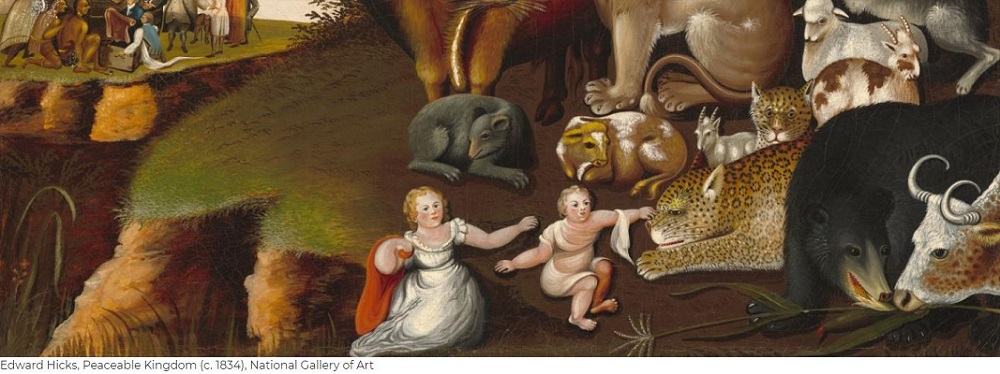
Du jeudi 18 au vendredi 19 novembre 2021, 09:00 – 18:30
Université Paris 1 Panthéon-Sorbonne, Centre Lourcine, bât. 1, 2e étage, salle 13
Migrants with Disabilities and Social Protection
Public Lecture
Facundo Chavez Penillas, United Nations High Commissioner for Human Rights

Thursday, 18 November 2021, 18:15 – 19:45
This Public Lecture takes place on Webex (password: NCCR) and will be streamed online on the nccr – on the move YouTube channel directly via this link
Program and Abstract (PDF)
Migration, mobilité et économie locale
Expériences et enjeux dans le Val-de-Travers

Samedi 30 octobre 2021, 18:00 – 19:30
Lieu: Pension Beauregard, Grand-Rue 10 – 2114 Fleurier
Pour plus d’information et pour vous inscrire (participation en présentiel) sur le site web du HETSL
Cet événement, organisé dans le cadre de la 5ème édition de NeuchàToi par l’Université de Neuchâtel en partenariat avec l’atelier Fil, questionne les expériences de mobilité et de migration dans le Val-de-Travers. Comment l développement socio-économique et le positionnement de la région au sein du canton de Neuchâtel et de la Suisse ont influencé les dynamiques locales ? Quels sont les enjeux de la migration et des mobilités frontalières, notamment pour l’économie de proximité ? Quelles sont les différentes perspectives pour le Val-de-Travers ?
Présentation
résultats d’une recherche menée à l’Université de Neuchâtel dans le cadre du nccr – on the move : Emmanuel Charmillot, doctorant
Table Ronde
avec la participation de Amanda Ioset, Marie-France Oberbeck, Valérie Pagnot Modération : Janine Dahinden, Professeure à l’Université de Neuchâtel et nccr – on the move
Entrée libre, selon les mesures sanitaires en vigueur (certificat COVID)
Program (PDF)
News Representations of Migration: Humanitarian Responsibility in ‘Crisis’?
Public Lecture
Kerry Moore, Cardiff University

Thursday, 28 October 2021, 18:15 – 19:45
This Public Lecture takes place on Webex (password: NCCR) and will be streamed online on the nccr – on the move YouTube channel
Program and Abstract (PDF)
Aux frontières de l’Etat social suisse : entre bien-être, mobilité et précarité
Table ronde d’expert·e·s du NCCR LIVES et du nccr – on the move

Mardi 26 octobre 2021
En ligne | Laténium, Neuchâtel
Organisée conjointement par les PRN « LIVES » et le « nccr – on the move », cette demi-journée d’échange met au débat public les résultats d’études récentes sur les conditions de vie de populations migrantes qui passent à la trappe du système suisse de protection sociale.
D’une part, un nombre croissant de personnes choisissent de vivre leur retraite entre deux pays afin de réconcilier vie familiale, sécurité financière, le bien-être et la santé personnelle. Le système suisse de protection sociale ne prévoit pourtant pas ce cas de figure : en choisissant le lieu de résidence à l’étranger, le droit à certaines prestations sociales est caduc.
D’autre part, un nombre croissant de personnes vit en Suisse sans faire recours à des prestations sociales, même lorsque le minimum vital n’est plus atteint : soit parce que leur droit de séjour n’est pas régularisé soit par crainte de mettre en péril ce droit acquis.
Deux panels de présentations donneront des éclaircissements sur ces thématiques, commentés à chaque fois par des expert·e·s. La table-ronde qui suivra permettra de cerner les points les plus contestés et d’envisager des options pour les politiques publiques futures. La demi-journée s’adresse à un public averti, membres de la société civile ou d’associations ou d’organes publics et privés.
L‘événement se déroulera dans un format hybride avec des panels sur place et un nombre limité de places dans le public.
Inscription
Nous vous prions de vous inscrire en indiquant si vous souhaitez bénéficier de la traduction simultanée (en Allemand / Français). Inscrivez-vous par ce lien.
Pour de plus amples informations, veuillez contacter l‘équipe organisatrice: pascal.maeder@hes-so.ch et annique.lombard@unine.ch
Le programme (PDF)

Grenzen des Sozialstaates, Grenzen der Wohlfahrt?
Dialog unter Expert*innen

Dienstag 26 Oktober 2021
Online | Laténium Neuenburg
Die Forschungsschwerpunkte (NCCR) „LIVES“ und „nccr – on the move“ organisieren gemeinsam eine Diskussionsrunde, in der Forschende ihre aktuellen Ergebnisse präsentieren, die dann diskutiert werden. Wir widmen uns dem Thema der prekären Lebensbedingungen von Migrant*innen, die Gefahr laufen, durch die Maschen des Sozialsystems zu fallen.
Einerseits entscheiden sich immer mehr Menschen dafür, ihren Ruhestand zwischen zwei Ländern zu verbringen, um Familienleben, finanzielle Sicherheit, Wohlbefinden und Gesundheit in Einklang zu bringen. Das Schweizer Sozialversicherungssystem sieht dies jedoch nicht vor: Durch die Entscheidung, im Ausland zu leben, erlischt der Anspruch auf bestimmte Sozialleistungen.
Andererseits lebt eine wachsende Zahl von Menschen in der Schweiz, die keine Sozialleistungen beanspruchen, obwohl sie das Existenzminimum zum Leben kaum erreichen: Dies entweder weil ihr Aufenthalts-recht nicht offiziell geregelt ist oder weil sie befürchten, dieses erworbene Recht zu gefährden.
In zwei Vortragspanel beleuchten wir diese beiden Themen aus verschiedenen Blickwinkeln. Die Vorträge der Forschenden werden von Expert*innen kommentiert und diskutiert. In der anschlissenden Podiumsdiskussion werden die umstrittensten Punkte wieder aufgenommen und mögliche Optionen für eine künftige öffentliche Politik erwogen. Die halbtägige Veranstaltung richtet sich an ein interessiertes Publikum, die Zivilgesellschaft und Mitglieder von öffentlichen oder privaten Organisationen.
Die Veranstaltung findet in hybrider Form statt mit Panels vor Ort und einer beschränkten Anzahl von Plätzen im Publikum.
Anmeldung
Wir bitten Sie, sich für den Anlass anzumelden und mitzuteilen, ob Sie eine Simultanübersetzung (in Deutsch / Französisch) benötigen. Anmeldung unter diesem Link.
Für weitere Informationen kontaktieren Sie das Organisationsteam: annique.lombard@unine.ch und pascal.maeder@hes-so.ch.
Program (PDF)

How Qualitative Network Analysis Can Offer New Opportunities in Transnational Migration Research?
Online Launch of Special Issue

Thursday, 7 October 2021, 18:00 CEST
Event to launch the publication of a special issue of Global Networks, co-hosted by University of Neuchâtel, LAPS, nccr – on the move, and the Global Diversities and Inequalities Research Centre
About this Event:
Janine Dahinden, University of Neuchâtel and Louise Ryan, London Metropolitan University are pleased to announce the launch of this special issue which they guest-edited.
In this webinar, they will present the manifold ways social network research has the potential to address how major pitfalls in migration studies are confronted.
Contributors will discuss how applying a qualitative approach to social networks can overcome metaphoric uses of ‘network’ as well as nation-state and ethnicity-centered epistemologies.
Guest Speakers:
– Başak Bilecen, University of Groningen, The Netherland
– Marta Kindler, University of Warsaw, Poland
– Miranda Jessica Lubbers, Autonomous University of Barcelona, Spain
– Martine Schaer, University of Neuchâtel, Switzerland
– Markus Gamper, University of Cologne, Germany
We are pleased that Jonathan Beaverstock, University of Bristol, co-editor of Global Networks, will also join the event and say a few words about the special issue.
The Global Diversities and Inequalities Research Centre is a home for interdisciplinary and multidisciplinary scholarship that explores migration, diasporas, nations, regions and localities through the lenses of diversity and inequality.
Registration:
You can register to this event via this website.
The event will be held online via BlackBoard Collaborate. You will receive joining information closer to the date. Please contact rpo@londonmet.ac.uk if you have any questions about this event.
Théâtre de la connaissance sur la gestion migratoire
Bienvenue à Heimatland !
Saurez-vous trouver votre place ?

Du 17 au 19 septembre 2021
Université de Neuchâtel
“Bienvenue à Heimatland!” s’inspire des recherches réalisées dans le cadre du nccr – on the move et de la MAPS à l’Université de Neuchâtel sur le thème de la gestion migratoire.
Un jeu de rôle théâtral participatif propose une expérience immersive durant laquelle les participant·e·s incarnent le rôle de migrant·e·s de différents statuts arrivant dans un pays inconnu. Il leur faudra comprendre et gérer ce que l’on attend d’elles·eux, formellement et implicitement, pour pouvoir espérer y rester. L’expérience invite les participant·e·s à vivre pour un temps une réalité différente de la leur et à s’interroger sur les réactions et émotions que cette réalité produit.
Dans un deuxième temps, un debriefing en petits groupes, suivi d’une discussion critique avec des chercheurs·euses spécialistes du thème, permettra aux participant·e·s de nourrir leur regard réflexif sur l’expérience. L’événement, dans son ensemble, propose une invitation à réfléchir ensemble sur un thème complexe au travers d’un format inédit.
Dates
- Vendredi 17 septembre de 19h à 21h30
- Samedi 18 septembre de 19h à 21h30
- Dimanche 19 septembre de 15h à 17h30
Chaque événement sera suivi d’un apéro offert et d’un moment d’échange convivial.
Lieu
Théâtre de la Connaissance, Université de Neuchâtel, Rue A.-L. Breguet 2, 2000 Neuchâtel
Inscription
L’entrée est gratuite et ouverte à tou.te.s dès 16 ans. Sur inscription uniquement. Le formulaire d’inscription est disponible ici.
Direction et conception
Laure Sandoz et Nicolas Yazgi
Inspiré librement d’une idée originale développée par ISA Berne.
Avec le soutien de
- nccr – on the move
- NeuchàToi
- Faculté des lettres et sciences humaines, Université de Neuchâtel
- Programme d’intégration cantonal (PIC), soutien de la Ville de Neuchâtel, de l’Etat de Neuchâtel et de la Confédération
- Société des Alumni, diplômés et amis de l’Université (SAN)
- Maison d’analyse des processus sociaux (MAPS), Université de Neuchâtel
- Institut d’ethnologie, Université de Neuchâtel
- Institut de géographie, Université de Neuchâtel
- Laboratoire d’études des processus sociaux (LAPS), Université de Neuchâtel
- Forum suisse pour l’étude des migrations et de la population (SFM), Université de Neuchâtel
- Service de communication, Université de Neuchâtel
Neuchâtel Graduate Conference 2021
The Future of Mobility and Immobility

Online Conference 1 – 2 July 2021
The Neuchâtel Graduate Conference (NGC) is an international graduate conference organized by the nccr – on the move, Swiss National Center of Competence in Research (NCCR) for migration and mobility studies. It provides a stimulating environment in which PhD and Postdoctoral fellows from different universities and research institutions can exchange ideas, establish networks, and initiate collaborative research.
The 4th edition will take place from 1 to 2 July 2021 as a series of online events providing opportunities to meet other researchers in formal and informal gatherings. The topic of this year is ‘The Future of Mobility and Immobility’.
These are the main plenary events:
Thursday, 1 July 2021
16:00 – 17:30 Conversation on the Future of Mobility and Immobility
Tim Cresswell, University of Edinburgh
Nikola Sander, Federal Institute for Population Research
Friday, 2 July 2021
15:30 – 17:00 Gender Gaps in Transnational Migration Studies: Recent Developments and Prospects
Asuncion Fresnoza-Flot, Université Libre de Bruxelles
Conference Program
Download the final program (PDF)
For more information, please first check out the FAQ or contact Robin Stünzi, the Scientific Officer of the nccr – on the move robin.stunzi@unine.ch.
Queer Asylum: International Perspectives Between Activism and Academia
Workshop

Wednesday, 23 June 2021, 10:00 – 16:00
This Workshop will be held on Webex
(Password: NCCR)
The workshop will be held on Webex. The event will be bilingual: the panelists will present in English from 10:00 – 12:30 and in French from 13:30 – 16:00.
Program (PDF)
In a Faraway Country – Emigration and New Mobility
Conference

Thursday and Friday, 17-18 June 2021
The conference will be held online. Full programme and registration: https://www.istitutosvizzero.it/fr/conferenza/in-a-faraway-country/
About the conference
People are on the move. Although society has been shaken by the atmosphere of uncertainty brought about by the current pandemic, globalization and digitalization still act, perhaps more effectively than ever, as key drivers in making people seek out new opportunities or avert disadvantage. The reasons for moving between states, regions, or from the countryside to urban environments are manifold, ranging from necessity to personal choice. They can involve the search for better economic conditions, advantageous career prospects, or the maintenance of family connections.
The two-day conference draws attention to this phenomenon and its implications for the individual and society. Multiple perspectives – covering both personal experience and scientific research – will shed light onto the topic, viewing the new emigration in the context of European mobility policies and the principle of free movement of people.
Migration Processes and Information and Communication Technologies in Turkey
Workshop

Thursday and Friday, 10 – 11 June 2021
Full programme (PDF) and registration (link)
About the workshop
Information and communication technologies (ICTs) have provoked major and rapid changes in almost all aspects of our lives over the past two decades. International migration is one area in which it has been possible to observe the multi-level and multi- faceted impact of ICTs.
Researchers have emphasized the importance of ICTs as resources for migrants during their journeys and in dealing with precarious conditions and challenging situations. More broadly, ICTs are also used by migrants, NGOs and governments to collect and disseminate information relating to different aspects of migration processes. In addition, several studies have shown that ICTs are effective instruments helping to sustain families, communities and diasporas across borders.
These recent but rapid developments in the study of the use of ICTs in migration processes are most often conducted in the context of destination countries, usually within the EU. Despite the fact they are playing a crucial role in migratory dynamics, transit countries have so far attracted little attention when it comes to the role of ICTs in migration processes.
Turkey is a striking example in this regard. The complex position of this country in relation to migratory movements is well established in migration studies. Turkey is simultaneously a country of immigration, emigration and transit. Moreover, following the outbreak of the Syrian civil war, it has become the host country of the largest refugee population in the world. Although Turkey has been the subject of substantial interest on the part of migration scholars, the role of ICTs in migration processes has not been analysed in detail in its context.
With this in mind, this workshop brings together scholars from different disciplines and NGO representatives to give fresh impetus to the study of ICTs’ impact in migration processes in the case of Turkey.
For more information: Ibrahim Soysüren, Senior Researcher, University of Neuchâtel (ibrahim.soysuren@unine.ch)
Public Lecture Series: Spring 2021
The Migration-Mobility Nexus

Thursday 4 March 2021
Onward Migration and Multi-Sited Transnationalism: What Are the Interconnections?
Jill Ahrens, University of Sussex
Abstract (PDF)
Thursday 25 March 2021
Return Migration Intentions and Self-Reported Life Satisfaction: What Do Immigrants Tell Us?
Angela Paparusso, Institute for Research on Population and Social Policies
Abstract (PDF)
Thursday 6 May 2021
Hierarchies Through Categories? The Role of Categories in Migration Policies and Lived Experiences
Saskia Bonjour, University of Amsterdam
Sarah Kunz, University of Bristol
Abstract (PDF)
Thursday 27 May 2021
Migration and the Antinomies of Mobility
Nicholas De Genova, University of Houston
Abstract (PDF)
These Public Lectures take place from 18:15 to 19:45 online on Webex and will be streamed online on the nccr – on the move YouTube channel
Program Flyer of the Public Lecture Series Spring 2021 (PDF)
You can register via this form and here you can find more information on the Public Lectures
The videos of the past Public Lecture Series Fall/Winter 2020 are also available on YouTube
L’asile en dialogue : perspectives scientifiques, expériences pratiques
Workshop

Jeudi et vendredi 3 et 4 juin 2021, 18:15 – 20:30
Lieu: HETSL, Chemin des Abeilles 14, 1010 Lausanne, Auditoire A 321-322, et en ligne sur Zoom et sur la chaîne YouTube du nccr – on the move.
Pour plus d’information et pour vous inscrire (participation en présentiel) sur le site web du HETSL
Le Livre « Asile et abus. Regards pluridisciplinaires sur un discours dominant » la question de l’asile polarise l’opinion publique en Suisse depuis quarante ans. Depuis son entrée en vigueur en 1981, la Loi sur l’asile a été révisée à de nombreuses reprises, notamment en vue de durcir l’accès la procédure d’asile ainsi que les conditions d’accueil. Parmi les discours légitimant cette inflation normative, celui de la « lutte contre les abus » bénéficie d’un large consensus dans l’espace public, au point qu’« asile » et « abus » semblent être devenus indissociables. Pourquoi ? L’ouvrage « Asile et abus. Regards pluridisciplinaires sur un discours dominant » propose une analyse approfondie de ce discours pour en saisir les contours, ressorts et conséquences au niveau sociétal, institutionnel et des pratiques des acteurs et actrices de l’asile.
A l’occasion de la sortie de l’ouvrage, l’équipe qui l’a dirigé a souhaité créer un espace de dialogue au sein duquel puissent se rencontrer contributeurs/contributrices, acteurs/actrices de terrain, et personnes relevant du domaine de l’asile. Les contributions scientifiques de cet ouvrage pourront ainsi être confrontées aux expériences personnelles et professionnelles de ceux qui « font » et « vivent » l’asile au quotidien. A travers quatre panels traitant de thématiques variées – cadrage socio-historique, procédure, exclusion et détention – il s’agira de proposer un éclairage pluriel sur les réalités de l’asile en Suisse.
Program (PDF)
Nationalism and Internationalism in Early ILO Norms on Migrant Social Insurance
Migration History Seminar
Madeleine Dungy, École Polytechnique Fédérale de Lausanne
Discussants: Yasmina Zian, Gianni D’Amato and Alexis Lubow, University of Neuchâtel

Wednesday, 2 June 2021, 17:30 – 19:00
This seminar will be held online on Webex and live-streamed on the nccr – on the move YouTube channel
Abstract (PDF)
Migration and the Antinomies of Mobility
Public Lecture
Nicholas De Genova, University of Houston
Discussant: Janine Dahinden, University of Neuchâtel

Thursday, 27 May 2021, 18:15 – 19:45
This Public Lecture will takes place on Webex (password: NCCR) add will be streamed online on the nccr – on the move YouTube channel
Program and Abstract (PDF)
Public Lectures Spring 2021 on the Migration-Mobility Nexus: Communication
The Public Lectures of the nccr – on the move aim at fostering an interdisciplinary debate and present original research on migration and mobility or related topics. Each lecture is delivered by an internationally renowned scholar who presents her/his most recent research, followed by a debate with the audience.
In Spring 2021, our Public Lectures Series will advance the discussion on the main conceptual tool developed within the nccr – on the move, the Migration-Mobility Nexus (MMN), exploring how and why migration and mobility are bound together. Our keynote speakers will address four interplays: enablement, continuity, hierarchy and opposition. In doing so, they will cover a range of different disciplines and epistemological assumptions.
On 4 March, Jill Ahrens, Research Associate at the University of Sussex, will explore some ways in which migration enables mobility, and the other way around. Her lecture will present results from one study on Nigerian onward migration trajectories in Europe, and another research on students at international branch campuses in Dubai. Her argument is that onward migration and migrant transnationalism are interconnected.
On 25 March, Angela Paparusso, Researcher at the Italian Institute for Research on Population and Social Policies, will address the continuum between migration and mobility. In her lecture, she will combine two research strands – return migration intentions and self-reported life satisfaction in the country of residence –shedding light on the drivers behind the variety of immigrants’ views and opinions about their migration experience.
On 6 May, Saskia Bonjour, Associate Professor at the University of Amsterdam, and Sarah Kunz, Leverhulme Early Career Fellow at the University of Bristol, will show how the hierarchical relation between migration and mobility comes into play. They will engage in a dialogue to explore how political categories are used to determine or legitimize hierarchies of movements, so that the construction of one category has implications on the other.
On 27 May, Nicholas de Genova, Professor at the University of Houston, will investigate instances in which migration and mobility are conceived as two mutually exclusive forms of movement. In his talk entitled “Migration and the Antinomies of Mobility”, he will consider migration as a key site for contemplating how the mobility of labor is subordinated through the production of spatialized and racialized difference that arises through the enforcement of state borders and immigration law.
The Public Lectures will take place in a hybrid format. Hosted by the University of Neuchâtel for the people who can physically attend, they will be livestreamed online on our YouTube channel. If sanitary and legal conditions do not enable to meet face-to-face, we are prepared to offer an entirely online event. You are all invited to register through this form. By registering, you will receive the hyperlink shortly before each Public Lecture, which will allow you to follow the event live and ask questions. Participation is free and open to participants from all over the world. The Public Lectures will be held in English.
The Public lectures of Spring 2021 are organized by Judit Kende, Eva Van Belle, Philpp Lutz, Katrin Sontag, Matthieu Vétois, Roxane Gerber, Mia Gandenberger, Aurélie Pont, Marco Bitschnau, Angie Gago, Paula Hoffmeyer, Christina Mittmasser, Flavia Cangia, Petra Sidler and Louis Vuilleumier.
Hierarchies Through Categories? The Role of Categories in Migration Policies and Lived Experiences
Public Lecture
Saskia Bonjour, University of Amsterdam
Sarah Kunz, University of Bristol
Moderation: Paula Hoffmeyer-Zlotnik, University of Geneva

Thursday, 6 May 2021, 13:00 – 14:30
This Public Lecture takes place on Webex (password: NCCR) and will be streamed online on the nccr – on the move YouTube channel
Program and Abstract (PDF)
Data Management for Qualitative Research
Tuesday 27 April 2021, 13:30 – 15:30 h
This training will be held online on Webex
Password: NCCR

Description
Researchers that are funded by the Swiss National Science Foundation are required to make their
data available when publishing research findings. What does this mean for researchers that work with
qualitative methods?
In this training, we will discuss the available options and good practices of data management for ethnographers, anthropologists and psychologists, among other qualitative disciplines. After a presentation of possible solutions, we will discuss how administrative requirements and qualitative research can find common ground. The discussion will be based on the data management plans that have been elaborated in the nccr – on the move within the three last years.
The workshop is open to all fellows of the nccr – on the move. We suggest that you have a look at the data management plan of your project online. The nccr – on the move is one of the first large-scale Swiss projects in social sciences that makes ist data available. We can set a milestone and show how future projects can directly tackle this question. Do not miss out on this opportunity to discuss your research methods during this training.
Flyer of the training (PDF)
Timetable
13:30 : Short Introduction and Round of Presentations
Robin Stünzi, University of Neuchâtel
13:45 : Presentation and Discussion: Possible Solutions and Good Practices in Data Management
Andreas Perret, Data Manager of the nccr – on the move
14:30 : Discussion
Publish as Early Career Researcher: Why, When, Where and How?
Wednesday 31 March 2021, 10:00 – 18:30 h
This training will be held online on Webex (conference link)
Password: NCCR
This training is part of the third pillar of the Doctoral Program of the nccr – on the move. All Doctoral Students enrolled in the Certificate in Migration and Mobility Studies are encouraged to attend. While the training is meant primarily for early career researchers, all members of the community are welcome to attend.

General Description
While publication is the key to a successful academic career, the skills required to get an article published in a peer reviewed journal are rarely taught. Now that the second generation of nccr – on the move projects is entering its output-oriented stage, we want to open the black box of the international publication landscape and discuss existing trade-offs and good. This publication training assembles journal editors from the interdisciplinary field of migration and mobility research, experts in writing and publishing, as well as junior and senior researchers from the NCCR. It is structured around three main goals:
– Learn about the cultural and institutional tacit agreements within academic publishing
– Discuss experiences and strategies with senior researchers of the nccr – on the move
– Learn about the publishing criteria, norms and procedures of top migration and mobility journals
Note that this training does not handle the process of writing – which is addressed in other workshops – but focuses on the skills that will help the participants designing their own publishing strategy.
Flyer of the training (PDF)
Timetable
10:00 – 10:15: Short Introduction and Round of Presentations
Robin Stünzi, University of Neuchâtel
10:15 – 11:45: Publishing as a Migration Scholar: Ethics and Practice
Jean-Michel Lafleur, University of Liège
14:15 – 15:45: Publication Experiences and Strategies: Group Discussions with Short Inputs by Researchers and Alumnae of the nccr – on the move
– Yvonne Riaño, University of Neuchâtel
– Flavia Cangia, University of Fribourg
– Lisa Marie Borrelli, University of Neuchâtel
– Eva Green, University of Lausanne
– Philipp Lutz, University of Geneva
– Carlo Knotz, University of Stavanger
17:00 – 18:30: Round Table on the Publication Landscape in Migration and Mobility Research
– Mimi Sheller, Drexel University, Co-Editor and Founder of the Journal Mobilities
– Saskia Bonjour, University of Amsterdam, Senior Editor of Migration Politics
– Paul Statham, University of Sussex, Editor-in-chief of the Journal of Ethnic and Migration Studies
– Peter Scholten, Erasmus University of Rotterdam, Editor-in-chief of the Journal Comparative Migration Studies
Moderation: Adrian Favell, University of Leeds
Return Migration Intentions and Self-Reported Life Satisfaction: What Do Immigrants Tell Us?
Public Lecture
Angela Paparusso, Institute for Research on Population and Social Policies
Discussant: Tobias Müller, University of Geneva

Thursday, 25 March 2021, 18:15 – 19:45
This Public Lecture will be streamed online on the nccr – on the move YouTube channel
Program and Abstract (PDF)
From Industrial to Digital Citizenship: Social Rights in Cyberspace
Migration History Seminar
Federico Tomasello, Foscari University of Venice
Discussants: Jean-Thomas Arrighi and Ola Söderstrom, University of Neuchâtel, and Ilia Antenucci, Western Sidney University

Wednesday, 24 March 2021, 17:30 – 19:00
This seminar will be held online on Webex and live-streamed on the nccr – on the move YouTube channel
Abstract (PDF)
Neuchâtel Graduate Conference of Migration and Mobility Studies: Call for Papers
University of Neuchâtel
1 – 2 July 2021
The Neuchâtel Graduate Conference is an international graduate conference organized by the nccr – on the move. It provides a stimulating environment in which doctoral and postdoctoral
researchers from different universities and research institutions can exchange ideas, establish networks, attend targeted training, and initiate collaborative research.

Call for Papers: The Future of Mobility and Immobility
The forms and intensity of migration and mobility have constantly changed over time. After a steady expansion of human flows between the 1990s and the early 2000s, public health measures to contain the outbreak of COVID-19 have put a sudden halt to the mobility of persons, goods and services. With this in mind, we wish to encourage junior researchers to explore alternative scenarios regarding the regulation and the experience of human movement in the years to come.
We are not asking researchers to predict the future. Instead, we are inviting them to provide scientifically grounded analysis on how political, economic, technological, and social change may shape mobility, reflecting on longer trends in the social sciences. Will there be continuity? Will there be fundamental changes? We encourage researchers to build upon their expertise on past and present forms of mobility to sketch possible scenarios and identify forward-looking avenues for research on this topic.
We welcome papers and panels addressing any topic in migration and mobility studies from all related disciplines. We especially welcome papers on the following topics:
- Borders – securitization
- (Non)essential mobilities and unequal migration governance
- Normative approaches to migration, mobility and citizenship
- Family spatial configurations in a new mobility framework
- Social protection for mobile populations
- The future of asylum
- Strategies of individuals (on the move) to cope with external shocks
Deadline for submission is 15 March 2021.
There is no participation fee. To encourage participation fro all universities, the nccr – on the move will provide funding opportunities up to CHF 400. Funding for the Neuchâtel Graduate Conference of Migration and Mobility Studies is specifically designed for international graduate students traveling from far or without mobility funding.
Please read the full call for papers for more information (PDF) and register via this form.
Onward Migration and Multi-Sited Transnationalism: What Are the Interconnections?
Public Lecture
Prof. Jill Ahrens, University of Sussex
Discussant: Laure Sandoz, University of Neuchâtel

Thursday, 4 March 2021, 18:15 – 19:45
University of Neuchâtel, Avenue du 1er-Mars 26, Room C46
The Public Lectures will be streamed online on the nccr – on the move YouTube channel
Program and Abstract (PDF)
Forced Migration and Modern Refugeedom in the Middle East
Migration History Seminar
Ramazan Hakkı Öztan, Bogaziçi University and
Viktorya Abrahamyan and Jordi Tejel, University of Neuchâtel

Wednesday, 24 February 2021, 12:30 – 14:00
This seminar will be held online on Webex
Abstract (PDF)
Public Lecture Series
Fall 2020
Human Movement and Inequalities

Watch the video on the Public Lecture Series Fall/Winter 2020
Thursday 24 September 2020
Hostile Environments: The History and Consequences of Deterrence as Migration Control
Prof. Michael Collyer, University of Sussex
Abstract (PDF)
Video (link)
Thursday 22 October 2020
Solidarity, Immigration and Social Class
Prof. Lea Ypi, London School of Economics and Political Science
Abstract (PDF)
Monday 26 October 2020
Does Immigration Increase Crime? Migration Policy and the Creation of the Criminal Immigrant
Prof. Francesco Fasani, Queen Mary University of London
Abstract (PDF)
Tuesday 17 November 2020
Do We Still Need to Talk About Online Methods Now that Everything Is Online?
Prof. Christine Hine, University of Surrey
Abstract (PDF)
Thursday 19 November 2020
Diversity Ideologies and Ethnic Inequalities: The Interplay of Diversity Policies, Norms and Attitudes
Prof. Karen Phalet, KU Leuven
Abstract (PDF)
Thursday 10 December 2020
Labor Market Integration of Refugees and Refugee Settlement
Prof. Anna Piil Damm, Aarhus University
Abstract (PDF)
Thursday 21 January 2021
Logistification from Below: Mobility, Trade and Power in Yiwu, China
Prof. Biao Xiang, Oxford University
Abstract (PDF)
Program Flyer of the Public Lecture Series Fall 2020 (PDF)
The Public Lectures will be streamed and can be viewed online on the nccr – on the move YouTube channel
More information on the Public Lecture Series and on how to register
Survey Experiments in Migration and Integration
Online Workshop

29 January, 2021
Online – University of Lausanne, IDHEAP
This is the third of a series of international workshops previously held at the Universities of Lausanne, and Berne that aim at gathering experts on the topic of experimental methodology and immigration and integration research, to present their work in progress and have in – depth discussions on relevant academic debates.
In this edition of the Survey Experiment in Migration and Integration Research, we will have a few different panels. Some will focus on the survey experiment methodology and others will focus on the immigration and integration research that is carried out by means of such experimental methods.
Organized by Prof. Flavia Fossati, University of Lausanne and Prof. Didier Ruedin, University of Neuchâtel
Preliminary program (PDF)
Voting Rights and Migration
Online Workshop

Wednesday, 27 January 2021, 15:00 – 18:30
Online meeting on Zoom
Program (PDF)
Participation in the workshop is free. Please register until 20 January with katrin.sontag@unibas.ch and we will send you the Zoom link before the workshop.
About the Online Workshop
Who should have the right to vote where? In the context of migration and mobility, rules of democratic participation are increasingly discussed, as in some places high percentages of residents, who do not hold the national citizenship, are not eligible to vote. The debates address the eligibility to vote for migrants, but also for those living abroad, as well as notions and processes of citizenship.
Several researchers within the nccr – on the move are working on this topic from different perspectives and disciplines, such as political science, economics and anthropology. They shed light on the issue of voting rights at different political levels, such as national, regional, or local levels. They also complement each other as some are showing the “bigger picture” of e.g. attitudes towards more or less inclusive political rights using quantitative data, while others focus on policy changes, or on the local level of activism. This workshop will bring together some of these perspectives.
Aim of the Online Workshop
The workshop will bring together current research on voting rights in the context of migration within and beyond the nccr – on the move. The aim is to present research and to discuss and exchange ideas with researchers, engaged citizens and interested participants.
Organizer
Katrin Sontag (University of Basel | nccr – on the move)
Bildquelle: Freiburger Wahlkreis 100%, Marc Doradzillo
Europe, Welfare and Mobility: From Closure to Openness and Back Again?
Keynote
Prof. Francesco Maiani, University of Lausanne
Discussant: Jean-Michel Lafleur, University of Liège

Monday, 25 January 2021, 16:30 – 18:00 CET
The Keynote will be streamed online on the nccr – on the move YouTube channel
Program and Abstract (PDF)
Logistification from Below: Mobility, Trade and Power in Yiwu, China
Public Lecture
Prof. Biao Xiang, Oxford University
Discussant: Ka-Kin Cheuk, Rice University

Thursday, 21 January 2021, 18:15 – 19:45
The Public Lectures will be streamed online on the nccr – on the move YouTube channel
Program and Abstract (PDF)
Labor Market Integration of Refugees and Refugee Settlement
Public Lecture
Prof. Anna Piil Damm, Aarhus University
Discussant: Didier Ruedin, University of Neuchâtel

Thursday, 10 December 2020, 12:15 – 13:45
The Public Lectures will be streamed online on the nccr – on the move YouTube channel
Program and Abstract (PDF)
Switzerland, Land of Asylum?
New Historiographical Perspectives
History Seminar
Marino Ferri, University of Lucerne and
Ramon Wiederkehr, University of Neuchâtel

Thursday, 10 December 2020, 12:30 – 14:00
The History Seminar will be held online on WEBEX
The Migration History Series is co-organized by the History Department of the University of Neuchâtel and the nccr – on the move. For any further information regarding the series, please send an email to jean-thomas.arrighi@unine.ch.
Abstract (PDF)
Diversity Ideologies and Ethnic Inequalities: The Interplay of Diversity Policies, Norms and Attitudes
Public Lecture
Prof. Karen Phalet, KU Leuven
Discussant: Eva Green, University of Lausanne

Thursday, 19 November 2020, 18:15 – 19:45
University of Neuchâtel, Avenue du 1er-Mars 26, Room C46
Program and Abstract (PDF)
The Public Lectures will be streamed online on the nccr – on the move YouTube channel
Do We Still Need to Talk About Online Methods Now that Everything is Online?
Public Lecture
Prof. Christine Hine, University of Surrey
Discussant: Laure Sandoz, University of Neuchâtel

Tuesday, 17 November 2020, 13:30 – 14:15 CET.
The Public Lecture will be held online. We ask you to register here no later than 15 November to receive the Webex link.
Program and Abstract (PDF)
Does Immigration Increase Crime? Migration Policy and the Creation of the Criminal Immigrant
Public Lecture
Prof. Francesco Fasani, Queen Mary University of London
Moderation: Michaela Slotwinski, University of Basel

Monday, 26 October 2020, 18:15 – 19:45
The Public Lecture will be held online
This public lecture will be held online. Please sign up until 17h00 CET Monday, 26 October by contacting stefanie.kurt@hevs.ch.
Program and Abstract (PDF)
The Relationship Between Welfare State, Immigrant Integration, and Crime
Stefanie Kurt, HES-SO Valais-Wallis
Flavia Fossati, University of Lausanne
Michaela Slotwinski, University of Basel
Daniel Auer, WZB Berlin Social Science Center

Tuesday, 27 October 2020
08:55 – 17:00
University of Lausanne, Building Amphimax, Room 414
Please note: the Public Lecture might be canceled or (partially) held online depending on the situation with COVID-19.
Program (PDF)
Public Lecture Series
Spring 2020
The Migration-Mobility Nexus From an Interdisciplinary Perspective

Wednesday 22 January 2020
Displacement and Exile: Narrative and Knowing
Prof. Omid Tofighian, University of Sidney
and Behrouz Boochani, human rights activist and writer
Abstract (PDF)
Thursday 20 February 2020
Mapping Contemporary Patterns of Mobility, Migration and Integration: What Survey Data Can We Use?
Prof. Laura Morales, Sciences Po Paris
Abstract (PDF)
Tuesday 21 April 2020 – POSTPONED
Borders, Boundaries and Bodies in the Production of Non-Belonging: Regulating the Return of European Women Who Joined the Islamic State
Prof. Anna Korteweg, University of Toronto
Thursday 7 May 2020 – POSTPONED
Hostile Environments: The History and Consequences of Deterrence as Migration Control
Prof. Michael Collyer, University of Sussex
These lectures take place from 18:15 to 19:45 at the University of Neuchâtel, Avenue du 1er-Mars 26, Room B32
Monday 26 October 2020 – POSTPONED
Does Immigration Increase Crime?
Prof. Francesco Fasani, Queen Mary University of London
This last lecture takes place from 18:15 to 19:45 at the University of Lausanne, IDHEAP, Quartier UNIL-Mouline, Aula
Program Flyer of the Public Lecture Series 2020 (pre-COVID-19 version PDF)
Solidarity, Immigration and Social Class
Public Lecture
Prof. Lea Ypi, London School of Economics and Political Science
Discussant: Jean-Thomas Arrighi, University of Neuchâtel

Thursday, 22 October 2020, 18:15 – 19:45
University of Neuchâtel, Avenue du 1er-Mars 26, Room C46
Program and Abstract (PDF)
The Public Lectures will be streamed online on the nccr – on the move YouTube channel
Borders, Boundaries and Bodies in the Production of Non-Belonging: Regulating the Return of European Women Who Joined the Islamic State
Public Lecture
Prof. Anna Korteweg, University of Toronto
CANCELED/POSTPONED
Discussant: Prof. Janine Dahinden, University of Neuchâtel

(Date not yet defined), 18:15 – 19:45
University of Neuchâtel, Avenue du 1er-Mars 26, Room B32
Program and Abstract (pre-corona PDF)
Leaving Tunisia in Search of Dignity
Guided Tour at Public Photo Exhibition
Photographs by Simon Mastrangelo
Discussant: Robin Stünzi, nccr – on the move
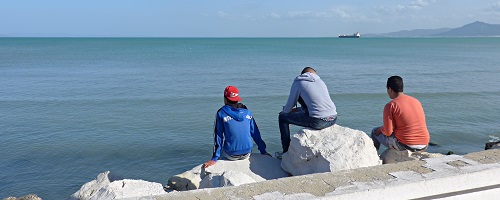
Friday, 25 September 2020, 17:30 – 18:30
Hôtel de Ville, Neuchâtel, Rue de l’Hôtel-de-Ville 2
Followed by a short discussion and an Apéro
Public photo exhibition from 11-25 September 2020:
Monday-Wednesday: 7h-17h
Thursday-Friday: 7h-18h30
Saturday-Sunday: 10h-18h30
No entrance fee
This photo exhibition is organized by the Canton of Neuchâtel and the Forum tous différents, tous égaux at the occasion of the “Action Week Against Racism 2020”, in partnership with the City of Neuchâtel.
Flyer (PDF)
Public Lectures Fall 2020
The Public Lectures of the nccr – on the move aim at fostering an interdisciplinary debate and present original research on migration and mobility or related topics. Each lecture is delivered by an internationally renowned scholar who presents his/her recent research on the topic, followed by a debate with the audience. The Public Lectures take place once every month and last for one hour and a half.
For Fall 2020, the topic of our Public Lectures is ‘human movement and inequalities’. We chose this topic because the COVID-19 pandemic is exposing the frailties and disparities of our societies, many of which become manifest through different possibilities to migrate and be mobile. The Public Lecture series will address this topic from various viewpoints. Our five speakers will take up the gauntlet of inequalities discussing the politics of deterrence, migration and justice, intergroup relations, the economic integration of refugees, and diverse patterns of mobility and immobility. In line with the core mission of the nccr – on the move, these sessions will cover a broad range of disciplines and invite young researchers to engage in the debate.
The Public Lectures will take place in a hybrid format. This will allow us to anticipate the unpredictability associated with mobility restrictions and public gatherings related to the COVID-19 pandemic, but also to open our work to researchers in other parts of Switzerland and abroad. While still hosted by the University of Neuchâtel for the people who can physically attend, the Public Lectures will also be live-streamed online on our YouTube channel.
You are all invited to register through this form. By registering, you will receive the hyperlink shortly before each Public Lecture, which will allow you to follow the event live and ask questions. Participation is free and open to participants from all over the world. The Public Lectures will be held in English.
Public Lecture Series flyer (PDF)
Cine Migration Series 2020

The «nccr – on the move» is sponsoring «On the Mov(i)e», a movie series about migration organized by the Swiss Network of young Migration Scholars (SNyMS).
Kino in der Reithalle, Bern
Thursday, 30 January 2020, 19:30
On the Mov(i)e: Encampment
The screening of the three short movies «Feeling of a Home», «Bunkers», and «Cast Away Souls» is followed by a discussion with Stanley Edward, the director of Cast Away Souls (via Skype) and Anne-Claire Adet, the director of Bunkers.
Flyer (PDF)
–
Thursday, 12 March 2020, 19:30
On the Mov(i)e: We Have to Talk about Racism!
The screening of the movie «Perro Bomba» from Juan Cáceres is followed by a discussion with the researcher Eva Van Belle about discrimination in the labor market and in presence of a representative of the film crew of „No Apologies“. The discussion is moderated by Christina Mittmasser and Lisa Marie Borrelli.
Flyer (PDF) and trailer (online)
–
POSTPONED
On the Mov(i)e: Stranger in Paradise
The screening of the movie «Stranger in Paradise» from the Dutch filmmaker Guido Hendrikx is followed by a discussion with a researcher from the nccr – on the move, moderated by Christina Mittmasser and Lisa Marie Borrelli.
Flyer (upcoming) and trailer (online)
Location: Kino in der Reithalle, Neubrückstrasse 8, Bern
Previous movie series:
Program Spring 2017 (PDF)
Program Fall 2017 ( Pre-COVID-19 PDF)
Migrationsland Schweiz
Forscherpanel und Abstimmungsdebatte zur Begrenzungsinitiative
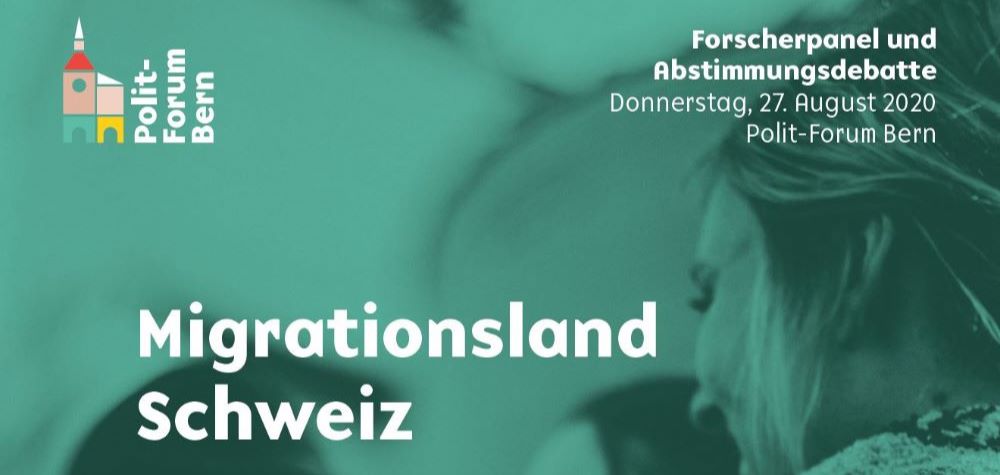
Donnerstag, 27. August 2020
In Kooperation mit dem Polit-Forum Bern
Am 27. September 2020 kommt die eidgenössischen Volksinitiative “Für eine massvolle Zuwanderung (Begrenzungsinitiative)” zur Abstimmung. Die Initiative verlangt eine eigenständige Regelung der Zuwanderung von Ausländer*innen in die Schweiz ohne Personenfreizügigkeit.
Das Polit-Forum Bern und der nccr – on the move, der Nationale Forschungsschwerpunkt zu Mobilität und Migration, organisieren im Vorfeld der aktuellen Abstimmung individuell einen inhaltlichen Beitrag zur Einschätzung der Migrationssituation in der Schweiz.
Im ersten Teil “Zahlen und Analysen” präsentieren Forscher*innen Zahlen und Fakten über die aktuellen Migrationsbewegungen in und aus der Schweiz und folgenden Forschungsfragen: Welche Folgen hat Migration für den Schweizer Arbeitsmarkt? Wie sind die Einstellungen der Schweizer*innen gegenüber Zugezogenen? Was denken die Bürger*innen über die Personenfreizügigkeit? Anschliessenden wird die Migrationssituation in der Schweiz eingeschätzt und mit den Forscher*innen diskutiert.
Im zweiten Teil “Abstimmungsdebatte” diskutieren Politiker*innen die Pro und Contra Argumente zu der Begrenzungsinitiative.
16:00 Zahlen und Analysen zum Migrationsland Schweiz (zur Aufzeichnung)
Begrüssung und Einführung, Polit-Forum Bern im Käfigturm und Gianni D’Amato, Direktor the nccr – on the move
16:10 Präsentationen von
– Jonathan Zufferey, Alumnus Universität Genf
– Sarah Progin-Theuerkauf, Universität Freiburg
– Ensar Can, Alumnus Universität Basel
– Philipp Lutz, Universität Genf
17:00 Diskussion moderiert von Simone Prodolliet, Geschäftsführerin, Eidgenössische Migrationskommission (EKM)
18:30 Abstimmungsdebatte zur Begrenzungsinitiative (zur Aufzeichnung)
Begrüssung und Einführung, Polit-Forum Bern im Käfigturm
18:40 Inputreferat von Gianni D’Amato, Direktor nccr – on the move
18:55 Es diskutieren
– Martina Bircher, Nationalrätin SVP
– Werner Gartenmann, Geschäftsführer AUNS
– Matthias Michel, Ständerat FDP
– Laura Zimmermann, Co-Präsidentin Operation Libero
19:15 Diskussion moderiert von Raphael von Matt, Inlandredaktor, Schweizer Radio und Fernsehen (SRF)
Programm in Deutsch (PDF)
Programme en Français (PDF)
La Suisse, pays de migration
Panel de chercheurs·euses et débat sur le vote de l’initiative de limitation
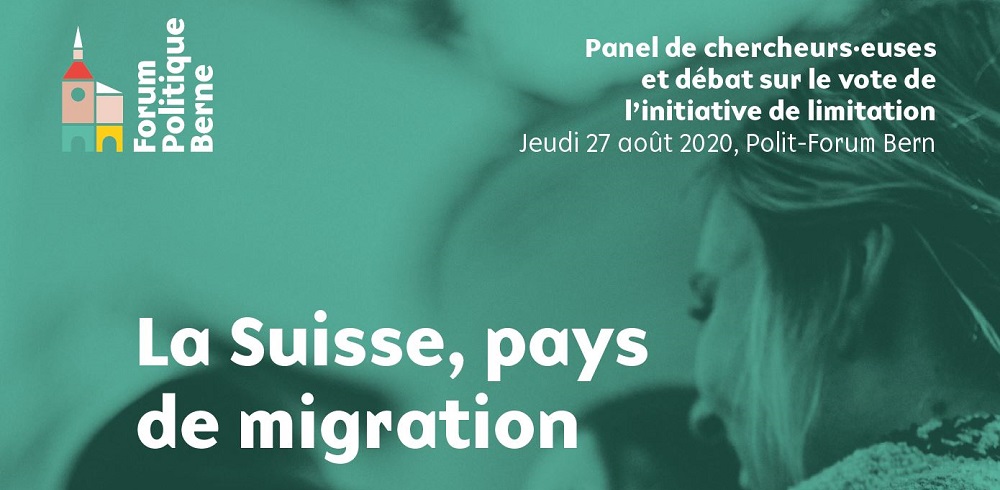
Jeudi 27 août 2020
En coopération avec le Polit-Forum Bern
Le 27 septembre 2020, l’initiative populaire fédérale « Pour une immigration modérée (initiative de limitation) » sera soumise au vote. L’initiative demande une réglementation indépendante de l’immigration des étranger·ère·s en Suisse sans libre circulation des personnes.
Le Polit-Forum Bern et nccr – on the move, le Pôle de recherche national sur la mobilité et les migrations, organisent avant la votation un événement avec des contributions scientifiques et une discussion politique sur l’évaluation de la situation migratoire en Suisse.
Dans la première partie, « Chiffres et analyses », les chercheurs·euses présentent des faits et des chiffres sur les mouvements migratoires actuels en Suisse et à partir de la Suisse, ainsi que les questions de recherche suivantes : Quelles sont les conséquences de la migration pour le marché du travail suisse ? Quelles sont les attitudes des Suisses·ses à l’égard des nouveaux et nouvelles arrivant·e·s ? Que pensent les citoyen·ne·s de la libre circulation des personnes ? La situation migratoire en Suisse est ensuite évaluée et discutée avec les chercheurs·ses.
Dans la deuxième partie, « Débat sur le vote », les politicien·ne·s discutent des avantages et des inconvénients de l’initiative de limitation.
16:00 Zahlen und Analysen zum Migrationsland Schweiz
Begrüssung und Einführung, Polit-Forum Bern im Käfigturm und Gianni D’Amato, Direktor the nccr – on the move
16:10 Présentations par
– Jonathan Zufferey, Alumnus Université de Genève
– Sarah Progin-Theuerkauf, Université de Fribourg
– Ensar Can, Alumnus Université de Bâle
– Philipp Lutz, Université de Genève
17:00 Discussion animée par Simone Prodolliet, Directrice générale, Commission fédérale des migrations (FCM)
18:30 Débat sur l’initiative de délimitation
Accueil et présentation du Polit-Forum Bern dans le Käfigturm
18:40 Introduction par Gianni D’Amato, directeur du nccr – on the move
18:55 Discussion
– Martina Bircher, Conseillère nationale UDC
– Werner Gartenmann, Directeur général de l’ASIN
– Matthias Michel, Conseiller aux Etats PLR
– Laura Zimmermann, Co-présidente de l’Opération Libero
19:15 Discussion animée par Raphael von Matt, rédacteur en chef national, Radio et télévision suisse (SRF)
L’événement peut être suivi dans son intégralité ou en choisissant une des parties du programme.
Les langues du podium sont l’allemand et le français avec traduction simultanée.
L’inscription est possible par un formulaire d’inscription auf www.polit-forum-bern.ch ou par téléphone 031 310 20 60.
Programme en Français (PDF)
Programm in Deutsch (PDF)
Call for Visiting Fellows Fall 2020
Short-Term Visiting Fellowships

The nccr – on the move wishes to encourage its network members to connect with research teams abroad. We are therefore setting up short-term visiting fellowships that are available to outgoing fellows.
Full call including eligibility and application procedure (PDF)
Deadline for application is 5 July 2020.
For questions, please contact the Deputy Scientific Officer of the nccr – on the move robin.stunzi@nccr-onthemove.ch.
Cine Migration: Stranger in Paradise

Thursday, 21 May 2020, 19:30
Kino in der Reithalle, Neubrückstr. 8, Bern
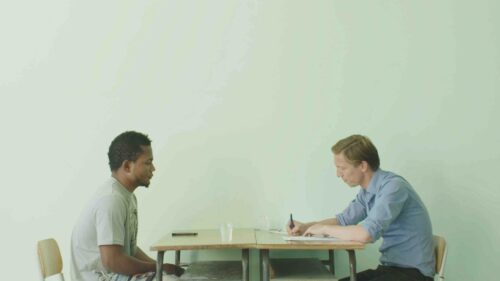
Director: Guido Hendrikx
Documentary, Netherlands, 2016, 72 min
O.v: English, Bambara and French, subtitles in English
In a classroom in Sicily, just inside the walls of Fortress Europe, recently arrived refugees receive lessons from a teacher who has some rather unbalanced traits. One moment he
mercilessly rejects the refugees – the next, mollifyingly, he embraces them. Operating at the intersection of documentary and fiction, Stranger in Paradise investigates the power relations
between Europe and refugees.
The screening of Stranger in Paradise is followed by a discussion with Lea Portmann and Mia Gandenberger and moderated by Christina Mittmasser and Lisa Marie Borrelli.
Entrance: pay what you want
Location: Kino in der Reitschule
Hostile Environments: The History and Consequences of Deterrence as Migration Control
Public Lecture
Prof. Michael Collyer, University of Sussex
Discussant: Lisa Marie Borrelli, University of Neuchâtel

Thursday, 24 September 2020, 18:15 – 19:45
University of Neuchâtel, Avenue du 1er-Mars 26, Room C46
Program and Abstract (PDF)
Please register by filling out the registration form
The Public Lecture will be streamed online and accessible on the nccr – on the move YouTube channel
Guest Lecture: Autoethnography as Method
by Prof. Shahram Khosravi, Professor of Social Anthropology, Stockholm University
CANCELED

Wednesday, 6 May 2020 – 12:15 – 13:45
University of Neuchâtel, Rue Abram-Louis-Breguet 1, Moyen Auditoire (3rd floor)
Looking Back at the Neuchâtel Graduate Conference 2019
Innovative Approaches Highlighted at the 2019 Graduate Conference
The third edition of the Neuchâtel Graduate Conference on the theme of Innovative Approaches to Migration and Mobility Studies took place from 12 to 13 September 2019 at the University of Neuchâtel. The conference, organized by the nccr – on the move in collaboration with the Swiss Subsaharan Africa Migration Network and the Swiss Forum for Migration and Population Studies, provided a stimulating and informal context where researchers from various institutions and interdisciplinary backgrounds could exchange ideas, establish networks, and initiate collaborative work.
The conference came to fruition by the successful, albeit time and energy-consuming endeavor of its organizing committee, consisting of nccr – on the move members, Katrin Sontag, Oliver Pedersen, Annique Lombard, Nenad Stojanovic, and Lorenzo Piccoli (chair). Other doctoral students and postdocs also took part in selecting the applications, identifying the participants in view of panels, organizing side-activities, chairing sessions, and selecting candidates in view of the Best Paper Award. The spirit of the conference was well captured by the numerous tweets published under the hashtag #neuchgradconf19, as well as the short clip prepared ahead of the event.
The extraordinarily large number of applications, namely 165 from over 50 countries, made the task of selecting the successful proposals very demanding. Nevertheless, the selection committee managed to narrow down the number to 80 accepted proposals, of which 40 received scholarships to attend.
The successful submissions were divided into nine panels (Attitudes Towards People on the Move; Emerging Patterns of Mobility; The Strategic Use/Misuse of Citizenship Status; Transnational Dynamics; Governing Migration through Paperwork; Queer and Gendered Perspectives on Mobility; Asylum Seekers: Human Solidarity and Institutional Restrictions; Representations of the “Refugee Crisis”; Pitfalls of Migration and Mobility Categories). Four roundtables were also organized (Public Policies and the Production of Uneven Mobility Rights; Discrimination and Obstacles to Work; Social Protection across Borders; Families and Children on the Move).
A few of the participants have also subsequently published their work in the nccr – on the move blog; “My Heart Is Still There”: Family Reunification of Refugees in Brazil (Patrícia Nabuco Martuscelli) and Family Affairs – An Intergenerational Dialogue on Diaspora (Silvia Wojczewski).
Sophie Andreetta, from the Max Plank Institute for Social Anthropology, received the Best Paper Award for her article: “Writing for different audiences: social workers, irregular migrants and fragmented statehood in Belgian welfare bureaucracies”. The event marked the first time the award was assigned to a qualitative paper in the field of anthropology. Previously, this award had only been given to two scholars in the field of quantitative political science: Samuel D. Schmid (European University Institute), 2017 and Lea Portmann (University of Lucerne), 2018.
In addition to the traditional panels and roundtables, three expert interviews, with introductory questions prepared by the doctoral students and postdocs, were organized. “We thought this was a good way of facilitating exchange between junior and senior researchers,” explains Lorenzo Piccoli, lead in the organization of the conference.
The topics of the expert interviews included “Enduring Inequalities in Academia” (chaired by Raquel Delgado with the participation of René de Groot, Jean-Michel Lafleur, Anita Manatschal, Chioma Joyce Onukogu); “Does It Still Make Sense to Use the Term Migrant in Today’s Society?” (chaired by Nenad Stojanovic with the participation of Virginie Guiraudon, James F. Hollifield, Irini Kadianaki, Marco Martiniello, Patrick Simon, and Ann Singleton); and “Producing and Communicating Migration and Mobility Data” (chaired by Lisa Marie Borrelli with the participation of Pau Baizan, Godfried Engbersen, Flavia Fossati, Dominik Hangartner, Thomas Huddleston, and Jean-Michel Lafleur). “This format worked really well and provided ample space for discussion,” Lorenzo Piccoli adds.
The 2019 Graduate Conference also included a series of side-events. “These activities were particularly important to us because we did not want this conference to be a formal event where people come exclusively to present their work. Instead, we wanted to facilitate interactions and promote interdisciplinary dialogues,” says Lorenzo Piccoli.
With this mind, the Graduate Conference hosted a walking tour of the old town of Neuchâtel with the organisation cooperaxion on the topic of “Obscure Businesses”, focusing on Neuchâtel and its role in the transatlantic slave trade of the 17th – 19th century. An exhibition, “Tanakra, the Mobility of People in Niger” was also organized on photos made by Francesco Bellina with the participation of Giacomo Zandonini. Finally, a PowerPoint karaoke was also set up to inspire the more creative sides of the participants, which gave rise to some interesting examples of out-of-the-box thinking.
To conclude, the feedback received from the participants has been very positive. The survey circulated after the event highlighted a few criticisms, namely the inadequate format of the roundtables for in-depth discussion and the slightly small rooms. However, several achievements such as the relaxed collaborative atmosphere, the interactions and exchanges between junior and senior researchers, the interdisciplinarity, the novelty of the topics and original approaches in the fields of migration and mobility studies were also noted. A full report of the survey is available through this link.
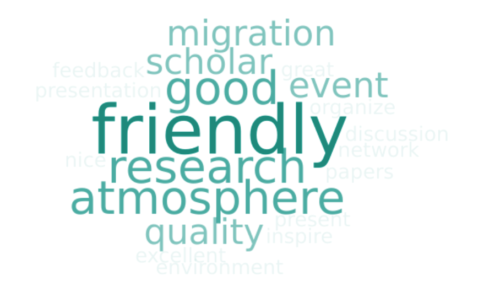
“For the fourth edition of the conference, we will continue to experiment with the format of this event, while preserving its distinguishing features: the collaborative atmosphere, the interdisciplinary and constructive exchange between junior and senior researchers,” concludes Lorenzo Piccoli.
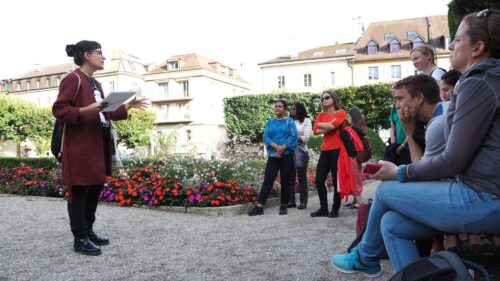
The pre-conference event, a walking city tour in Neuchâtel
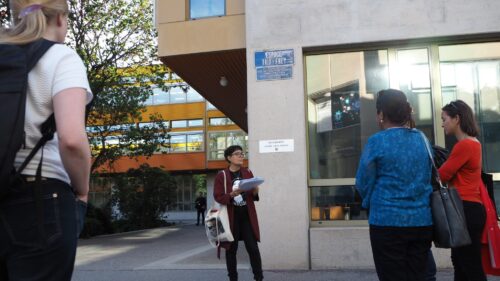
Honouring the first black Federal chancellor at the square Tilo Frey
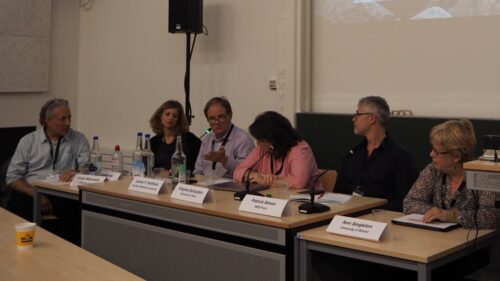
Expert interview “Does It Still Make Sense to Use the Term Migrant in Today’s Society?”
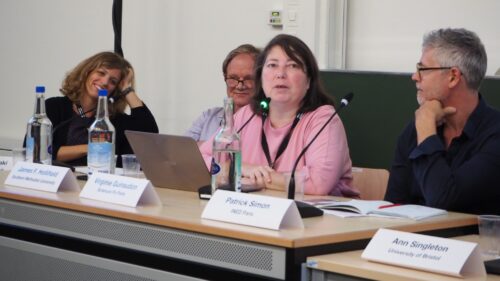
Expert interview
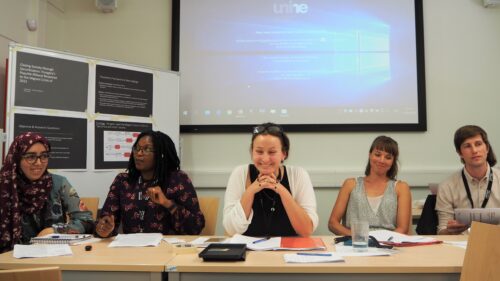
Roundtable presenters replying to questions of the other participants
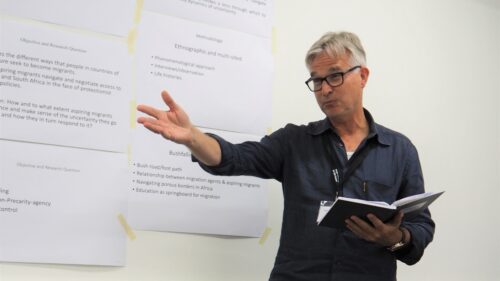
Roundtable feedback from Prof. Engbersen
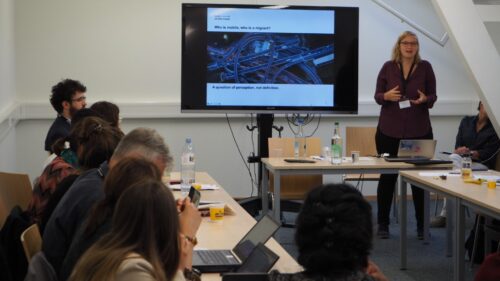
Panel presentation by Paula Hoffmeyer
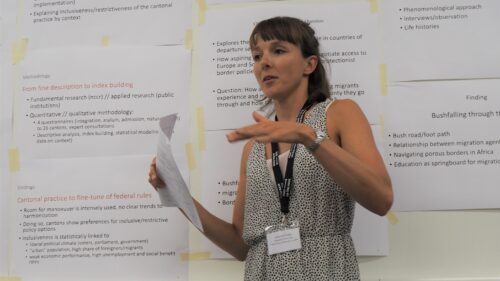
Johanna Probst presents study comparing the intergration policies of Swiss cantons
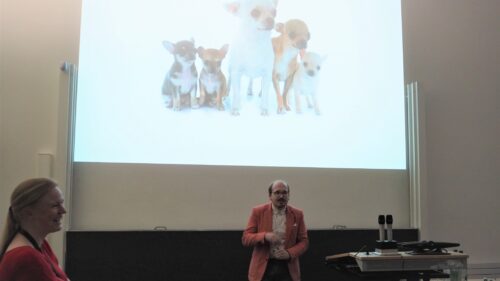
PPT karaoke competition talk from Marco Bitschnau about Chihuahuas
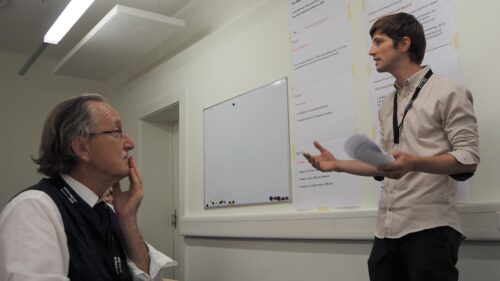
Roundtable with Frowin Rausis presenting and receiving feedback from Prof. de Groot
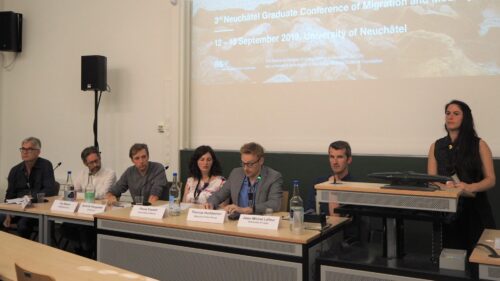
Expert interview “Producing and Communicating Migration and Mobility Data”

Best Paper Award winner Sophie Andreetta
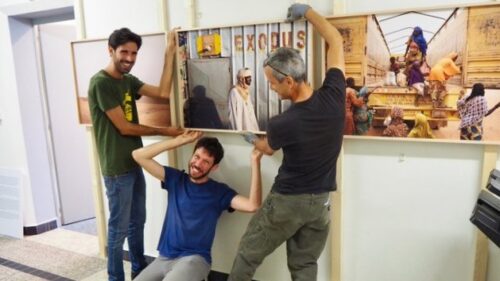
Setting up of the photo exhibition “Tanakra, the Mobility of People in Niger”
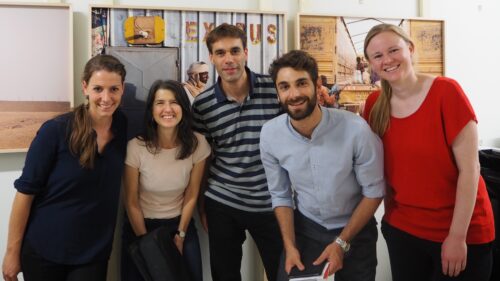
The organizing team (Oliver Pedersen should be on this photo too)
Call for New Projects
The nccr – on the move is seeking to recruit two research teams working on different ways of using the Migration-Mobility Nexus to make sense of contemporary Challenges

The nccr – on the move is recruiting two new research projects for research teams based at Swiss Universities or Swiss Universities of Applied Sciences. The project grants run for two years and will cover a funding envelope by the NCCR amounting to 200’000 Swiss Francs per project.
The project will run from 1 June 2020 to 31 May 2022 (end of Phase II of the nccr – on the move). The project funding can be used to cover the salaries of PostDocs, research associates, and research assistants, and to conduct empirical research in Switzerland and abroad (surveys or fieldwork).
Topics to be Addressed
Recent developments surrounding the worldwide spread of COVID-19 have made the NCCR members aware that they need to broaden the research agenda to reflect more systematically on how to incorporate the temporal dimension, in particular, the occurrence of critical events and mega trends, into the conceptualization of the Migration-Mobility Nexus.
While research has traditionally studied migration and mobility as separate subjects, the nccr – on the move postulates that we cannot fully understand one without considering the other. In the first two Phases I (2014-2018) and II (2018-2022), the researchers in the nccr – on the move have focused on empirically studying and finding a shared understanding of the so-called Migration-Mobility Nexus.
Full call including conditions and eligibility as well as application procedure (PDF)
Deadline for application is 30 April 2020.
Einwanderungsland Schweiz: Vielschichtig und dynamisch. Gesammelte Erkenntnisse aus einer Publikation zu Migration und Mobilität
Neuchâtel, 27. März 2019. Wie nehmen Menschen, die in den letzten zehn Jahren eingewandert sind, die Schweiz wahr? Eine Publikation des «nccr – on the move», dem Nationalen Forschungsschwerpunkt für Migration und Mobilität, liefert erstmals gesammelte Erkenntnisse aus einer eigenen Befragung, die Informationen zur Migrationsgeschichte, zur Familien- und Haushaltssituation, zur Bildungs- und Beschäftigungsgeschichte als auch zu Fragen der politischen Teilhabe in der Schweiz erhoben hat. Die Analysen beruhen auf repräsentativen Daten des Migration-Mobility Survey.
Cine Migration: Baghdad In My Shadow

Thursday, 26 March 2020, 20:30
Cinéma Bio, Faubourg du Lac 27, Neuchâtel
CANCELED

Director: Samir
Drama, Switzerland/Germany/United Kingdom/Iraq, 2019, 105 min
O.v: Arabic/English with subtitles in German and French
“Abu Nawas” is a trendy café and popular hangout for artists, communists and gay Iraqi exiles in London, it‘s close to the Salafist Mosque. When Nasseer – a religious fanatic youth and
nephew of poet Taufiq – attacks his uncle‘s friends, he sets into action a course of events that will turn everyone‘s life upside down.
The screening of Baghdad in My Shadow will be followed by an open discussion with Samir, the Iraqi-Swiss filmmaker, moderated by Gianni D‘Amato, director of the nccr – on the move.
This is a public event and the tickets can be booked via Cinepel.
Location: Cinéma Bio, Faubourg du Lac 27, Neuchâtel
Flyer (PDF) and trailer (online)
History Lecture Series 2019 | 2020
Mobility, Migration and Borders

The lecture series on Migration, Mobility and Borders furthers the collaboration between the History Department and the nccr – on the move of the University of Neuchâtel. It pursues the twofold aim of showing that Migration History is both central to our understanding of the present as well as a vibrant research field.
Wednesday 25 September 2019, 12:15 –14:00
Postcolonial Migration Meets European Integration: Britain in Comparative Perspective
Elizabeth Buettner, University of Amsterdam
Abstract (PDF)
Thursday 17 October 2019, 12:15 –14:00
Intellectual and Historical Backgrounds of the International Refugee Regime in the Interwar Period
Davide Rodogno, Graduate Institute Geneva
Abstract (PDF)
Wednesday 11 March 2020, 12:15 –14:00
Migrating Borders: Territorial Rescaling and Citizenship
Realignments in Europe
Jean-Thomas Arrighi, University of Neuchâtel
Abstract (PDF)
Wednesday 8 April 2020, 12:15 –14:00 – CANCELED
State Formation under International Supervision and the Construction of Hierarchies in National Membership: A Balkan Story
Maja Spanu, University of Cambridge
Abstract (PDF)
Organizers:
Kristina Schulz and Jordi Tejel (University of Neuchâtel, History Department) and Gianni D’Amato (University of Neuchâtel | nccr – on the move)
The lectures take place from 12:15 to 14:00
University of Neuchâtel, Rue Abram-Louis-Breguet 2, Room 2.310
Program Flyer History Lecture Series
(PDF pre-COVID-19 version)
Cine Migration: We Need to Talk about Racism

Thursday, 12 March 2020, 19:30
Kino in der Reithalle, Neubrückstr. 8, Bern

The screening of the movies „Perro Bomba“ is followed by a discussion with the researcher Eva Van Belle about discrimination in the labor market, in presence of a representative of the film crew of „No Apologies“ and moderated by Christina Mittmasser and Lisa Marie Borrelli.
Steevens is a young Haitian, leading a simple but stable life in Chile with a job, a house, and friends. With the arrival of his childhood friend Junios, Steeven’s life is turned upside down. After being racially discriminated, Steevens reacts by physically assaulting his employer. The news about the assault goes viral and causes Steevens to be shunned by his community and the state.
Flyer (PDF)
Migrating Borders: Territorial Rescaling and Citizenship Realignments in Europe
History Lecture
Dr. Jean-Thomas Arrighi, University of Neuchâtel

Wednesday, 11 March 2020, 12:15 – 14:00
University of Neuchâtel, Rue Abram-Louis Breguet 2, Room 2.310
Abstract (PDF)
Mapping Contemporary Patterns of Mobility, Migration and Integration: What Survey Data Can We Use?
Public Lecture
Prof. Laura Morales, Sciences Po Paris
Discussant: Philippe Wanner, University of Geneva

Thursday, 20 February 2020, 18:15 – 19:45
University of Neuchâtel, Avenue du 1er-Mars 26, Room B32
Abstract (PDF)
Looking forward to the Neuchâtel Graduate Conference 2020

The Neuchâtel Graduate Conference has become an international event for doctoral students and junior researchers in the field of migration and mobility. Over two hundred researchers have attended our conferences since 2017. Our keynote speakers who participated in the previous editions can be viewed through an interactive visualization that illustrates the scale of international connections of the nccr – on the move.
As the fourth edition of our conference is scheduled to take place at the University of Neuchâtel from 10 to 11 September 2020, its planning is already underway. We would, therefore, like to share with you some of our preliminary ideas.
The three previous editions of the Graduate Conference have built a good reputation thanks to their collaborative atmosphere, as well as the interdisciplinary and constructive discussions between junior and senior researchers. The idea is to further strengthen these features, while simultaneously facilitating the finalization of articles for publication in international journals and the creation of permanent standing groups. With this in mind, we are planning to reduce the number of participants and make room for longer, in-depth discussions. Participants will be invited to remain within the same working group for the two days of the conference to develop their articles together and work towards publication.
While this year’s edition of the conference will be smaller than last year’s, we will again invite senior scholars from our International Advisory Board. These experts are invited to provide constructive feedback and guide young researchers in the publishing process. We will also make sure that the conference serves as a platform to promote young female academics in line with our values.
We will also continue to collaborate with other institutions, like the Swiss Subsaharan Africa Migration Network, and invite external participants to facilitate a dialogue beyond the academia. Similarly to last year, we plan to invite journalists and practitioners, and organize one or two targeted roundtables including them.
The topic of the conference will be ‘New Forms of Mobility’. Through this theme, we would like to explore some of the fundamental transformations in the movement of people and goods. We would also like to discuss the role played by technological developments, new systems of information sharing, environmental concerns and changing rules regulating borders crossing. As always, we wish to facilitate interdisciplinary debate. For this reason, we will welcome submissions from a variety of disciplinary backgrounds, methodological and theoretical approaches.
We plan to publish the call for papers and panels around mid-March. In the meanwhile, you can stay up to date with information on the conference through the hashtag #neuchgradconf20.
Cine Migration: Encampment


Thursday, 30 January 2020, 19:30
Kino in der Reithalle, Neubrückstr. 8, Bern
The screening of the three short movies «Feeling of a Home», «Bunkers», and «Cast Away Souls» is followed by a discussion with Stanley Edward, the director of Cast Away Souls (via Skype) and Anne-Claire Adet, the director of Bunkers.
Flyer (PDF)
Displacement and Exile: Narrative and Knowing
Public Lecture
Prof. Omid Tofighian, University of Sidney and Behrouz Boochani, Iranian-Kurdish journalist, writer and human rights defender
Discussants: Dr. Annika Lindberg, University of Bern and
Dr. Lisa Marie Borrelli, HES-SO Valais-Wallis

Wednesday, 22 January 2020, 18:15 – 19:45
University of Neuchâtel, Avenue du 1er-Mars 26, Room B32
Program and Abstract (PDF)
Discriminations : une réalité quotidienne pour les personnes appartenant aux minorités « visibles ». Un épilogue.
À l’occasion de la cinquième table ronde d’expert·e·s, organisée par le « nccr – on the move » en partenariat avec la Fondation Mercator Suisse le 30 octobre, une soixantaine de représentant·e·s politiques, de l’administration publique, de la société civile et du monde académique ont répondu présent·e·s pour débattre des thématiques liées à la discrimination.
Présentant des études qui documentent les discriminations dans l’accès à l’emploi, au logement et, plus généralement dans l’espace public, la journée a permis de sensibiliser les participant·e·s à la discrimination et à la stigmatisation quotidienne que rencontrent encore trop souvent les citoyen·ne·s suisses appartenant aux « minorités visibles ».
L’événement, qui a eu lieu à la « Generationenhaus » à Berne, s’inscrit dans la volonté du « nccr – on the move » de faire connaître les résultats de recherche et de promouvoir un dialogue informé sur les thématiques liées à la migration et la mobilité. Les panels de discussions d’expert·e·s, modérés par Nina Fargahi, incluaient notamment la participation des politiciennes Natalie Imboden et Rosmarie Quadranti. L’événement s’est terminé par un hommage à la carrière de Rosita Fibbi, sociologue dans le domaine de la sociologie des migrations à l’Université de Neuchâtel.
Programme (français / allemand)
Emission « Diversité: La discrimination: un mythe ou une réalité méconnue? » du 1 décembre 2019.
Sélection de photos de l’événement :
Panel·d’expert·e·s
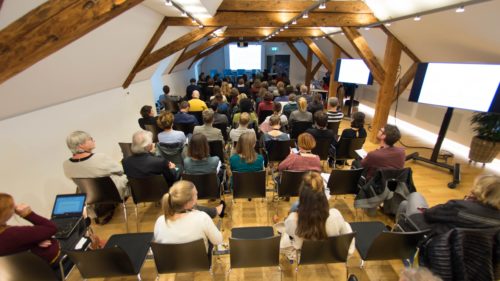
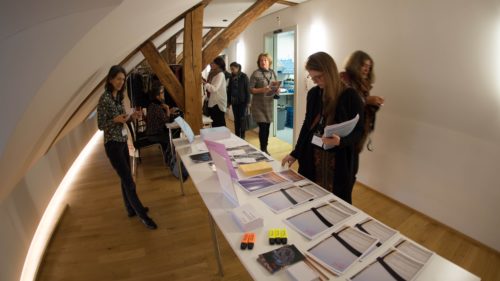
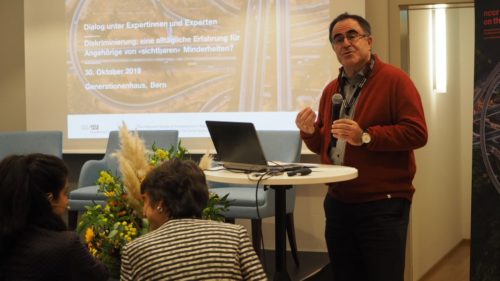
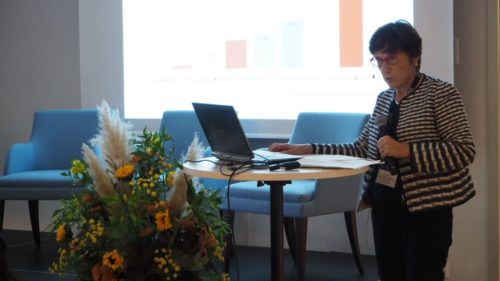
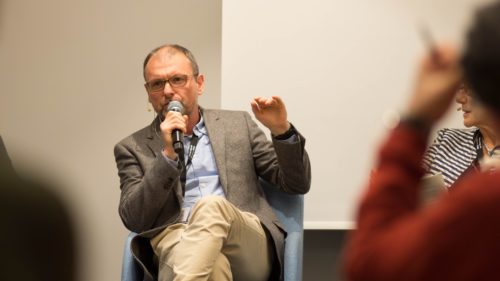
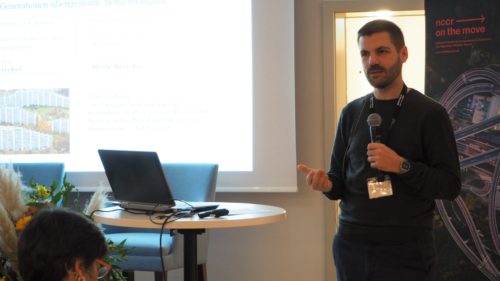
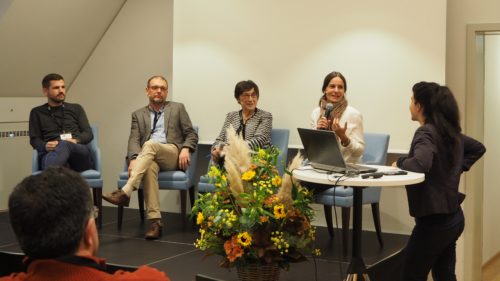
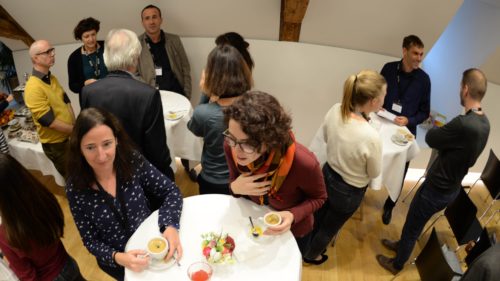
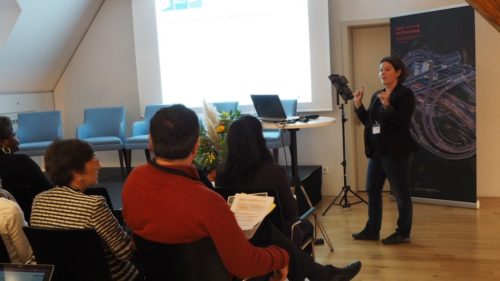
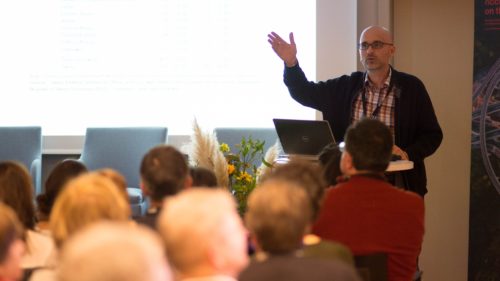
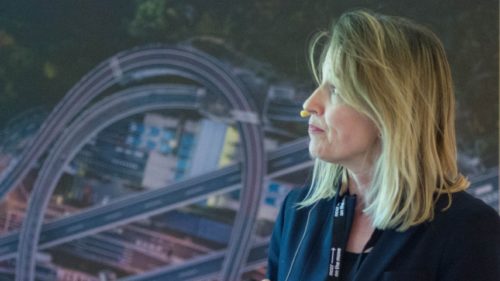
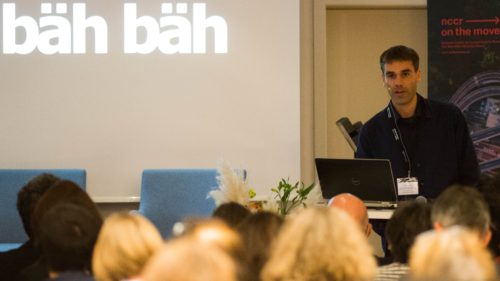
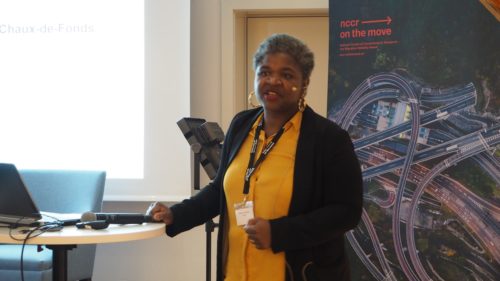
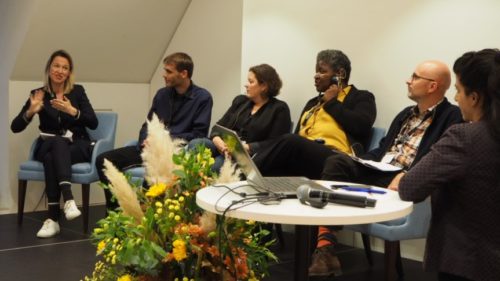
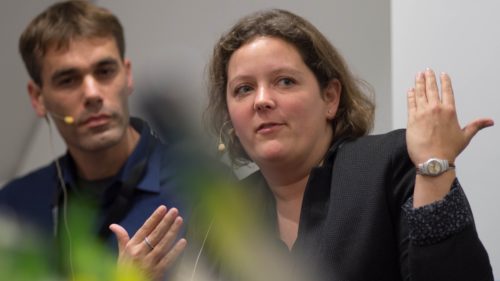
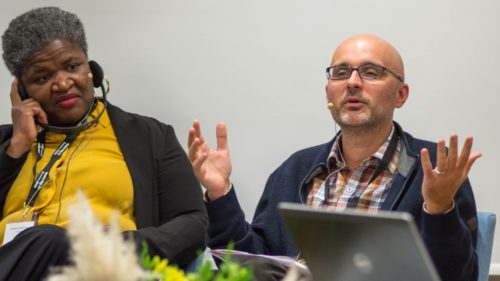
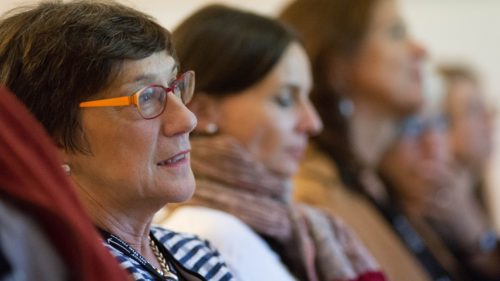
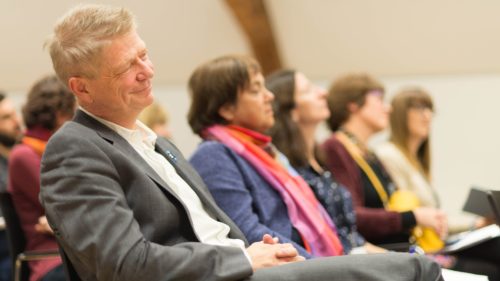
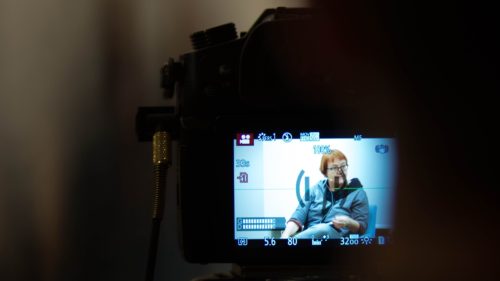
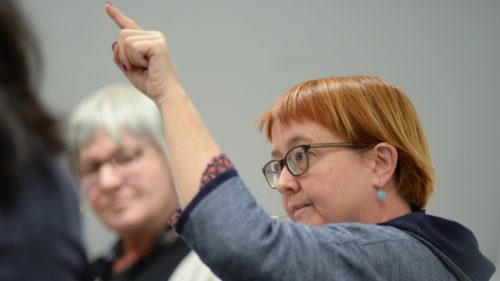
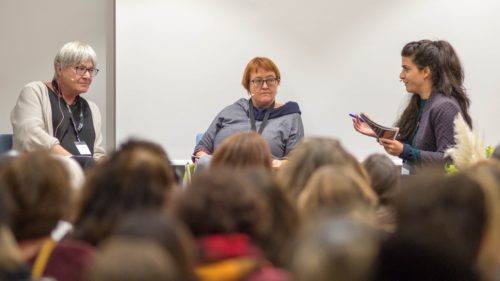
Cérémonie en l’honneur de Rosita Fibbi
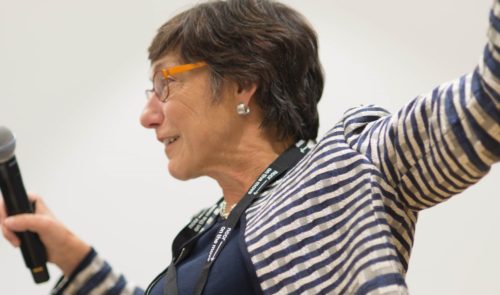
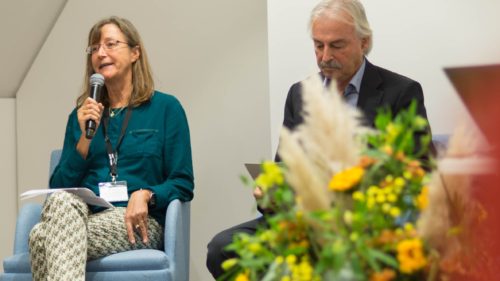
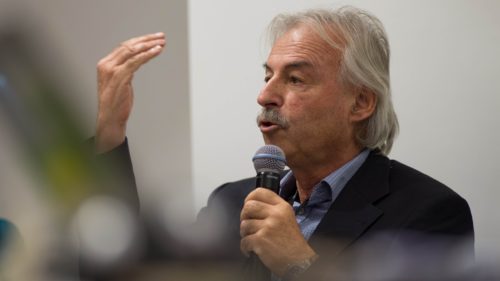
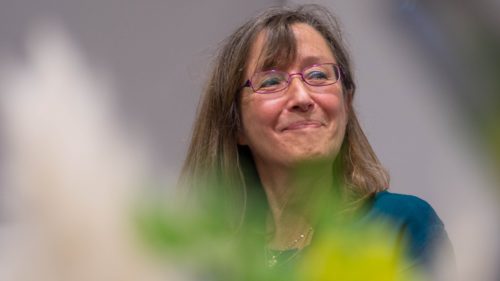

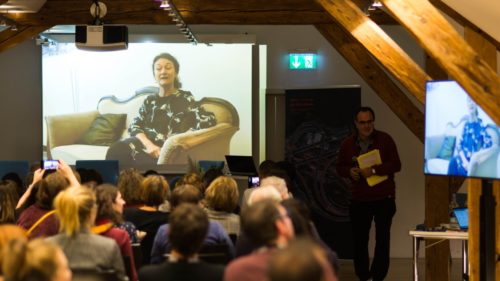
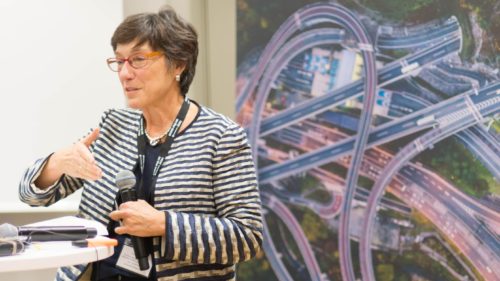
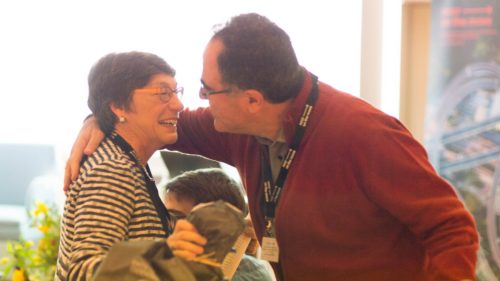
Photos de Andreas Perret (close-up et impressions), data manager et Annique Lombard (panel), interim communication officer,
« nccr – on the move »
Föderale Migrationspolitik im Wandel. Epilog.
Die föderalistisch organisierte Migrationspolitik in der Schweiz unterliegt einem ständigen Wandel. Mit der Studie «Kantonale Spielräume im Wandel. Migrationspolitik in der Schweiz» des Schweizerischen Forums für Migrations- und Bevölkerungsstudien (SFM) der Universität Neuchâtel wurde kürzlich eine aktualisierte Bilanz kantonaler Praxen in diesem Politikbereich publiziert. Der vierte «Dialog unter Expertinnen und Experten», organisiert vom «nccr – on the move», dem SFM und der Konferenz der Kantonsregierungen (KdK) am 15. Oktober 2019 im PROGR in Bern nahm dies zum Anlass für eine migrationspolitische Bilanzierung und einen Blick nach vorn.
Über 100 Personen nahmen an diesem Treffen teil und tauschten sich mit einer Vielzahl von Fachpersonen aus der Wissenschaft, der öffentlichen Verwaltung, mit der Umsetzung der Migrationspolitik und des Diskriminierungsschutzes betrauten Organisationen sowie der Zivilgesellschaft aus.
In verschiedenen Panels und Referaten wurde die sich ändernden Migrationspolitik in der Schweiz, die damit einhergehende Verschiebung kantonaler und kommunaler Gestaltungsspielräume und die Umsetzung der migrationspolitischen Richtlinien auf Kantons- und Gemeindeebene beleuchtet. Die Anwesenden diskutierten die Entwicklungen in den Bereichen des Diskriminierungsschutzes, des Asylwesens, der Zulassung, der Integrationsförderung sowie der Einbürgerung. In der abschliessenden Podiumsdiskussion wurde zudem die föderale Migrationspolitik der Schweiz auch international eingeordnet und erörtert, welche künftigen Herausforderungen und Chancen sich abzeichnen.
Programm (Deutsch/ Französisch)
Auswahl von Photographien vom Anlass:
Die Studie und deren Autor*innen
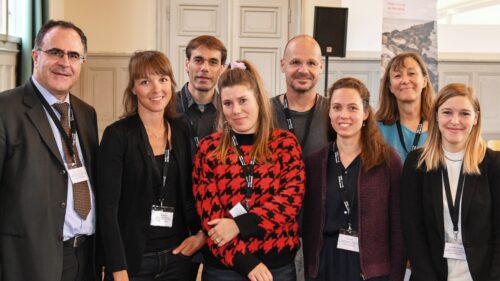
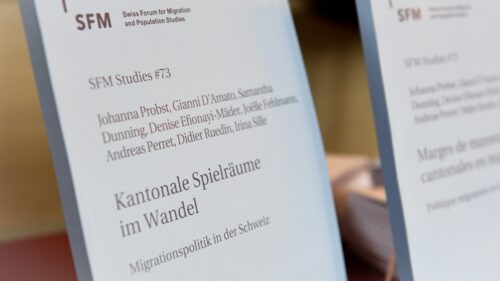
Begrüssung
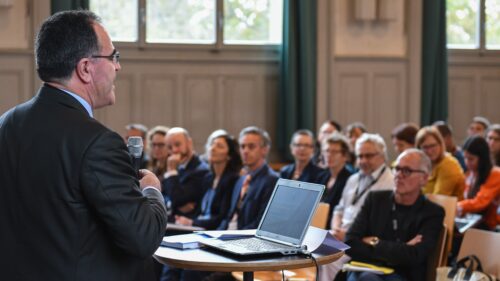
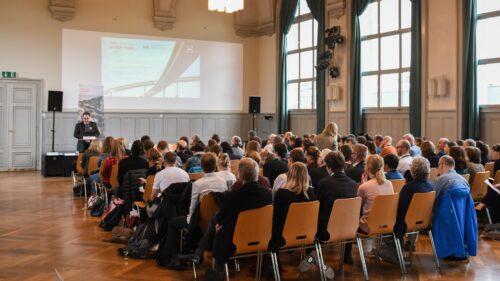
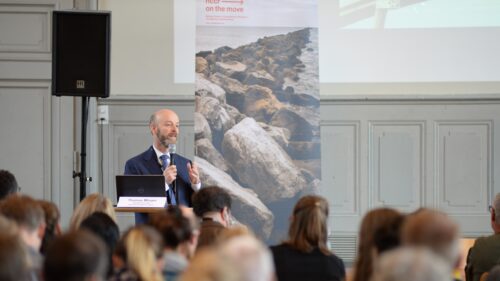
Präsentationen und Diskussionen
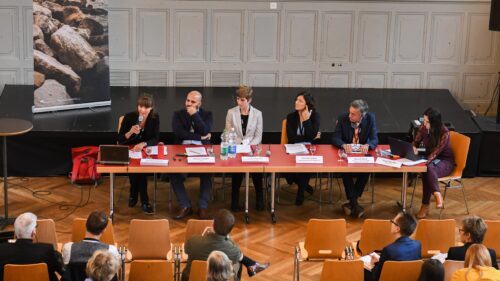
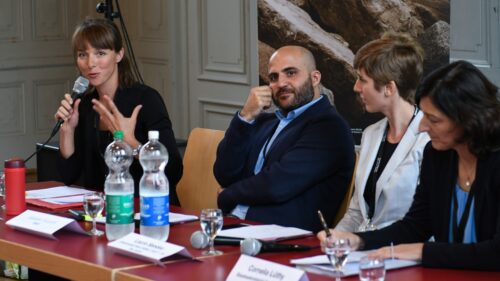
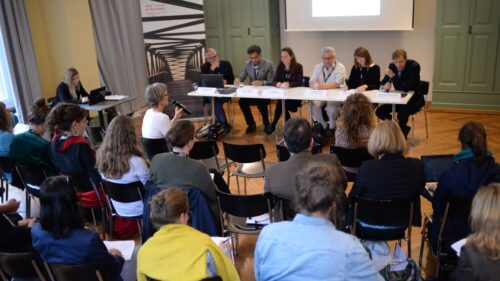
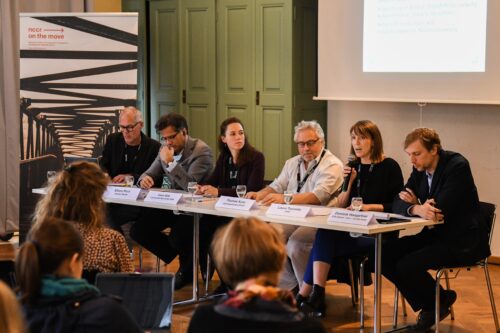
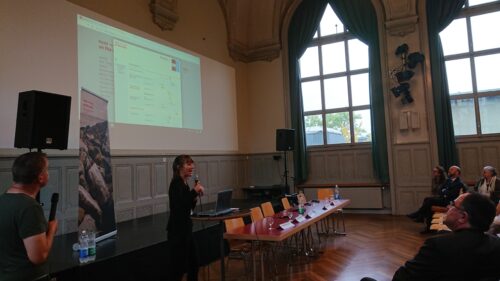
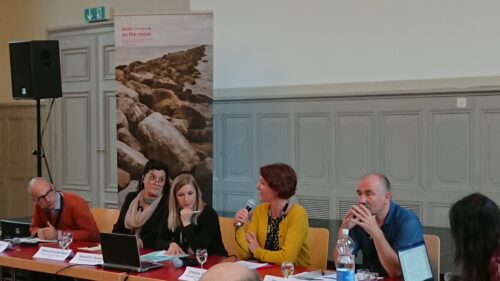
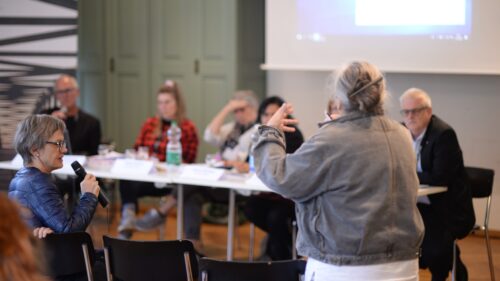
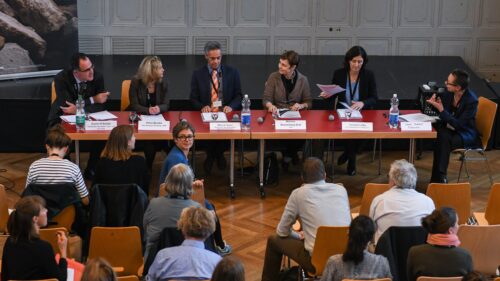
Eindrücke
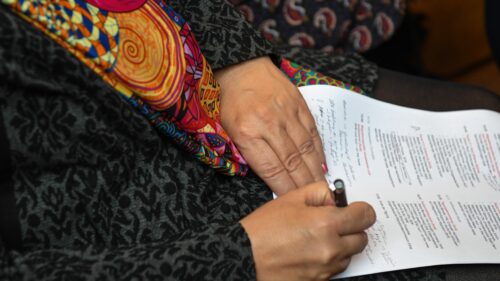
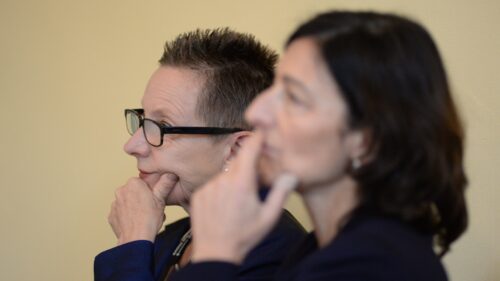
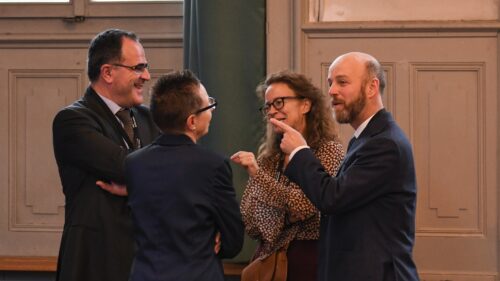
Organisationsteam
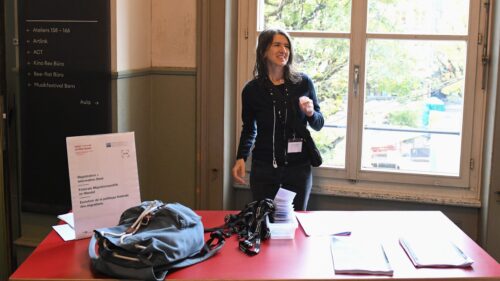
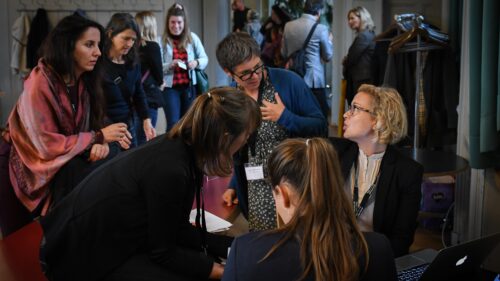
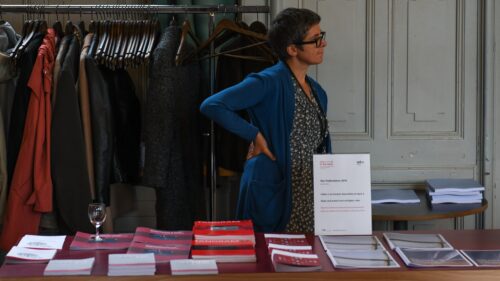
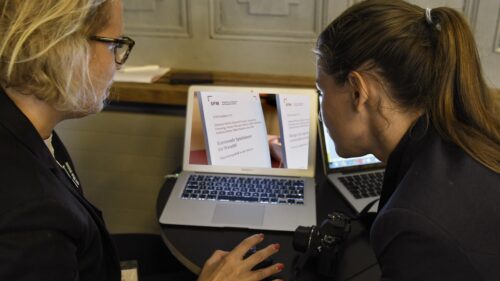
Photographien von Michael Eggen im Auftrag von « nccr – on the move », Andreas Perret, Data Manager und Inka Sayed, Communication Officer von « nccr – on the move ».
Evolution de la politique fédérale des migrations. Un épilogue.
La politique migratoire suisse est sujette à une constante évolution. Grâce à l’étude « Marges de maneouvre cantonales en mutation. Politique migratoire en Suisse » du Forum suisse pour l’étude des migrations et de la population (SFM) de l’Université de Neuchâtel, un bilan actualisé des pratiques cantonales dans ce domaine politique a été publiée récemment. La quatrième « Table ronde d’expert·e·s », organisé par le « nccr – on the move », le SFM et la Conférence des gouvernements cantonaux (CdC) le 15 octobre 2019 au PROGR à Berne, a été l’occasion de faire un bilan rétrospectif et prospectif de la politique migratoire.
Plus de 100 personnes ont participé à cette conférence et ont échangé leurs points de vue avec un grand nombre d’expert·e·s de la communauté scientifique, de l’administration publique, des organisations chargées de la mise en œuvre de la politique migratoire et de la protection contre la discrimination, ainsi que de la société civile.
Divers panels et présentations ont porté sur l’évolution de la politique migratoire en Suisse, la modification de la marge de manœuvre des cantons et des communes et la mise en œuvre concrète des directives fédérales au niveau cantonal et communal. Les participant-e-s ont discuté des développements dans les domaines de la protection contre la discrimination, de l’asile, de l’admission, de la promotion de l’intégration et de la naturalisation. Lors de la table ronde de finale, la politique migratoire fédérale de la Suisse a en outre été mis en perspective avec le niveau international, en pointant les défis et opportunités futurs.
Programme (français / allemand)
Sélection de photos de l’événement :





Präsentationen und Diskussionen















Photos de Michael Eggen pour le compte de « nccr – on the move », Andreas Perret, Data Manager et Inka Sayed, Communication Officer de « nccr – on the move ».
Nouveaux dissidents, nouveaux résistants, défendre les libertés publiques
Conférence
Trois Débats présentés par Sylvain Bourmeau, Directeur d’AOC Média
Démocratie, de la liturgie à la léthargie animé par Georg Diez, ancien journaliste au Spiegel, membre de Diem 25
Libertés publiques, des accommodements déraisonnables animé par Frédéric Worms, philosophe, École normale supérieure
Les libertés publiques face au golem numérique animé par Sylvain Bourmeau, AOC-Média
Lundi 20 janvier 2020, 18h00
CNAM – AMPHI PAINLEVÉ 292 Rue Saint-Martin, 75003 Paris, France
Programme et résumé (PDF)
Call for Visiting Fellows
Spring Term 2020
Short-Term Incoming and Outgoing Fellowships

The nccr – on the move wants to encourage the network members to link up with research teams abroad to enhance international exchange and cooperation. For this purpose it is setting up short-term visiting fellowships which can be used for both incoming and outgoing fellows.
Full call including eligibility and application procedure (PDF)
Deadline for application is 10 January 2020.
For questions, please contact the Deputy Scientific Officer of the nccr – on the move robin.stunzi@nccr-onthemove.ch.
Public Lecture Series
Fall 2019
Migration Governance and Individual Strategies to Move

Thursday 19 September 2019
Protection or Control? Migration Governance and the Repressive Approach of Sex Work in France
Calogero Giametta, LAMES Aix-Marseille University | Sciences Po Paris
Abstract (PDF)
Thursday 17 October 2019
Between Insecurity and Reflexivity: Migrant Agency in Times of Social Change
Anna Amelina, University of Cottbus
Abstract (PDF)
Wednesday 20 November 2019
Jews, Muslims and Religious Challenges to the European Institutions: The Headscarf and Ritual Male Circumcision Debates
Gökce Yurdakul, Humboldt University of Berlin
Abstract (PDF)
Thursday 12 December 2019
How Globalization Has Led to Immigration Restrictions but more Freedom to Emigrate
Margaret E. Peters, University of California Los Angeles
Abstract (PDF)
The Public Lectures take place from 18:15 to 19:45
University of Neuchâtel, Avenue du 1er-Mars 26, Room B32
Program Flyer Public Lecture Series Fall 2019 (PDF)
How Globalization Has Led to Immigration Restrictions but more Freedom to Emigrate
Public Lecture
Prof. Margaret E. Peters, University of California Los Angeles
Discussants: Dr. Philipp Lutz, University of Geneva

Thursday, 12 December 2019, 18:15 – 19:45
University of Neuchâtel, Avenue du 1er-Mars 26, Room B32
Program and Abstract (PDF)
Jews, Muslims and Religious Challenges to the European Institutions: The Headscarf and Ritual Male Circumcision Debates
Public Lecture
Prof. Gökce Yurdakul, Humboldt University of Berlin
Discussant: Dr. Esma Baycan, University of Geneva

Wednesday, 20 November 2019, 18:15 – 19:45
University of Neuchâtel, Avenue du 1er-Mars 26, Room B32
Program (PDF)
Dominik Hangartner wins the 2019 National Latsis Prize
We are proud to congratulate Prof. Dominik Hangartner, one of our Project Leaders, as the highly prestigious 2019 National Latsis Prize Laureate, awarded by the Swiss National Science Foundation.
Dominik Hangartner joined the nccr – on the move as a Project Leader in June 2016 for the research project on Asylum Policy and Refugee Integration in Norway, Sweden and Switzerland. Two highly ranked publications generated from this research, co-funded by the nccr – on the move, have resulted on the specific situation of asylum-seekers: “When lives are put on hold: Lengthy asylum processes decrease employment among refugees” (in Science Advances 2.8) and the “Long-term impact of employment bans on the economic integration of refugees” (in Science Advances 4.9).
A few months later, Dominik Hangartner, submitted a funding request to our NCCR, in cooperation with Alois Stutzer (University of Basel), to conduct a study on the effects of non-citizens’ voting rights on a range of economic, political, social, psychological, and health outcomes, based on register data and a survey conducted in Geneva. This initially small-scale project grew, as the research teams expanded the scope of their inquiry within the nccr – on the move to a full-fledged project on Non-Citizen Voting Rights, Naturalization and Integration.
Within this ongoing project, the team led by Dominik Hangartner at ETH Zurich is estimating the effectiveness of various nudges, such as the sending of an encouragement letter by the city authorities to naturalization eligible candidates, evaluating the increasing application rate to Swiss citizenship and its impact on economic success. The first results of this study will be released in the coming months.
“Dominik Hangartner is a driven researcher with a strong curiosity and scientific rigor. He has been one of the pioneers in moving Swiss migration research from single case studies to large-scale experiments allowing for generalizable and applicable findings,” says Gianni D’Amato, Director of the nccr – on the move. Dominik Hangartner has successfully highlighted the positive effects of citizenship acquisition on economic integration as well as the detrimental effects of long waiting periods on the integration of asylum seekers.
His scientific output has been incredibly prolific in the recent years, while at the same time he has been actively involved in NCCR events, teaching classes to the nccr – on the move doctoral students and presenting his key findings at various Expert Exchange Roundtables (EER #2 and EER#4). Through his close collaboration with “migration practitioners” at cantonal and federal levels, he has been able to access data previously not available. Moreover, the federal authorities are currently implementing one of his cutting-edge ideas, the allocation of asylum-seekers to cantons based on a data-driven algorithm.
One of the key conclusions the cantonal and federal policy-makers at the recent nccr – on the move Expert Roundtable in Bern reached was that migration policy-making in Switzerland has become increasingly evidence and fact-based. “Dominik Hangartner has greatly contributed to the adoption of this scientific approach to policy-making,” observes Gianni D’Amato.
Managing Migration: Canadian and American Dilemmas
Guest Lecture
Prof. Phil Martin, University of California, Davis

Friday, 8 November 2019, 12:00 – 13:30
University of Neuchâtel, Avenue du 1er Mars 26, Room B29
Abstract (PDF)
Geneva, a Sanctuary City?

Friday, 1 November 2019, 18:00 – 19:30, apéro from 19:30
University of Geneva, Boulevard du Pont-d’Arve 40, MR 070
This event is part of the series of events “Sanctuary Cities in Switzerland?”, which takes place in Zurich, Berne and Geneva. The speakers in these events outline the developments in urban migration policies in support of irregular migrants in American, European and Swiss cities. The aim is to discuss the formulation and the effects of Sanctuary Cities and related urban migration policies and compare them with practical examples from the cities of Zurich, Berne and Geneva.
The presentations are followed by an open discussion:
Policies and Evidence from Sanctuary Cities
Prof. Dr. Loren Collingwood, University of California, Riverside
Urban Policies in Support of Irregular Migrants in European Cities
Prof. Dr. David Kaufmann, ETH Zurich
Insights on the Situation and Policies in Swiss Cities
Marianne Halle, communications and public relations officer of the “Centre de Contact Suisse-Immigrés” that is involved in the project “Opération Papyrus” in Geneva
Moderation: Dr. Philipp Lutz, University of Geneva
Flyer (PDF)
Berne, a Sanctuary City?

Thursday, 31 October 2019, 18:00 – 19:30
University of Berne, UniS, Schanzeneckstrasse 1, Aula A003
This event is part of the series of events “Sanctuary Cities in Switzerland?”, which takes place in Zurich, Berne and Geneva. The speakers in these events outline the developments in urban migration policies in support of irregular migrants in American, European and Swiss cities. The aim is to discuss the formulation and the effects of Sanctuary Cities and related urban migration policies and compare them with practical examples from the cities of Zurich, Berne and Geneva.
The presentations are followed by an open discussion:
Policies and Evidence from Sanctuary Cities
Prof. Dr. Loren Collingwood, University of California, Riverside
Urban Policies in Support of Irregular Migrants in European Cities
Prof. Dr. David Kaufmann, ETH Zurich
Insights on the Situation and Policies in Swiss Cities
Dr. Payal Parekh, member of the civil society movement “Wir alle sind Bern”, which is a network that advocates for an “urban citizenship”
Moderation: Dr. Philipp Lutz, University of Geneva
Flyer (PDF)
Diskriminierung: eine alltägliche Erfahrung für Angehörige von «sichtbaren» Minderheiten?
5. Dialog unter Expertinnen und Experten des «nccr – on the move»
Mittwoch 30. Oktober 2019
Spittelsaal, Generationenhaus, Bahnhofplatz 2, Bern

Der fünfte Dialog unter Expertinnen und Experten des «nccr – on the move» befasst sich mit neuen Forschungsresultaten zur Ungleichbehandlung von Ausländer*innen und einem Teil Schweizer*innen mit Migrationshintergrund im Alltag in verschiedenen Lebensbereichen. Da bisher nur wenig gesicherte Erkenntnisse zum Vorkommen von Diskriminierung und Ungleichbehandlung in der Schweiz vorliegen, haben sich Forschende des «nccr – on the move» das Ziel gesetzt, diese Wissenslücke mit verschiedenen empirischen Studien zur Situation auf dem Arbeitsmarkt, dem Wohnungsmarkt und im öffentlichen Raum zu schliessen.
Im Anschluss an die Gesprächsrunden folgt die Verabschiedung und Würdigung von Rosita Fibbi und die Veranstaltung endet mit einer künstlerischen Performance von Mbene Mbunga Mwambene, der zwei Skizzen präsentiert: «I AM» und «The letter, Dear Mayo», gefolgt von einem Apéro riche.
Anmeldung
Da die Anzahl der Plätze begrenzt ist, melden Sie sich bitte bis zum 30. Septembre 2019 unter info@nccr-onthemove.ch an, und teilen uns mit, ob Sie Simultanübersetzung benötigen und zum Apéro bleiben.
Programm (PDF)
Discriminations : une réalité quotidienne pour les personnes appartenant aux minorités « visibles » ?
5ème table ronde d’expert·e·s du
« nccr – on the move »
Mercredi 30 octobre 2019
Spittelsaal, Generationenhaus, Bahnhofplatz 2, Berne

La cinquième table ronde d’expert·e·s du « nccr – on the move » soumet au débat public les résultats d’études récentes documentant des conditions de traitement inégal auxquelles des étranger·ère·s et une partie des citoyen·ne·s suisses descendants de migrant·e·s sont confrontés dans leur vie quotidienne. Conscient·e·s que ce domaine de recherche était jusque récemment peu développé en Suisse, les chercheur·euse·s du « nccr – on the move » se sont attelés à combler cette lacune par des études diversifiées portant sur le marché du travail, le marché du logement et la sphère publique.
Les tables rondes seront suivies de une cérémonie en l‘honneur de Rosita Fibbi une performance artistique par Mbene Mbunga Mwambene, qui présentera deux sketches : « I AM » et «The letter, Dear Mayo », suivie d’un apéritif dînatoire.
Inscription
Le nombre de places étant limité, nous vous prions de vous annoncer d’ici au 30 septembre 2019 par courriel à info@nccr-onthemove.ch en indiquant si vous souhaitez bénéficier de la traduction et si vous restez pour l‘apéritif dînatoire.
Programme (PDF)
Sanctuary Cities in Switzerland?
Three Cities, Three Local Speakers, One Question

The series “Sanctuary Cities in Switzerland?” takes place in three Swiss cities. The speakers in these events outline the developments in urban migration policies in support of irregular migrants in American, European and Swiss cities. The aim is to discuss the formulation and the effects of Sanctuary Cities and related urban migration policies and compare them with practical examples from the cities of Zurich, Berne and Geneva.
Zurich, a Sanctuary City?
Monday, 28 October 2019
18:00 – 19:30
ETH Zurich
Flyer (PDF)
Berne, a Sanctuary City?
Thursday, 31 October 2019
18:00 – 19:30
University of Berne
Flyer (PDF)
Geneva, a Sanctuary City?
Friday, 1 November 2019
18:00 – 19:30 followed by an apéro
University of Geneva
Flyer (PDF)
Organizers:
Prof. Loren Collingwood, University of California, Riverside
Prof. David Kaufmann, ETH Zurich
Dr. Philipp Lutz, University of Geneva
Flyer of the event series (PDF)
Zurich, a Sanctuary City?

Monday, 28 October 2019, 18:00 – 19:30
ETH Zurich, Leonhardstrasse 21, LEE E 101
This event is part of the series of events “Sanctuary Cities in Switzerland?”, which takes place in Zurich, Berne and Geneva. The speakers in these events outline the developments in urban migration policies in support of irregular migrants in American, European and Swiss cities. The aim is to discuss the formulation and the effects of Sanctuary Cities and related urban migration policies and compare them with practical examples from the cities of Zurich, Berne and Geneva.
The presentations are followed by an open discussion:
Policies and Evidence from Sanctuary Cities
Prof. Dr. Loren Collingwood, University of California, Riverside
Urban Policies in Support of Irregular Migrants in European Cities
Prof. Dr. David Kaufmann, ETH Zurich
Insights on the Situation and Policies in Swiss Cities
Bea Schwager, head of the Sans-Papiers counselling center SPAZ in Zurich and board member of the “Züri City Card” Association
Moderation: Dr. Philipp Lutz, University of Geneva
Flyer (PDF)
Moving Through Affective Circuits: African Mobility, Social Connections and Control in Europe
Guest Lecture
Dr. Joris Schapendonk, Assistant Professor in Geography, Planning and Environment, Radboud University

Friday, 25 October 2019, 12:15 – 14:15
University of Neuchâtel, Tilo Frey 1, Room R.O.14
Program (PDF)
The Global Market for Investor Citizenship
Book Presentation
Dr. Jelena Dzankic, GLOBALCIT, European University Institute

Wednesday, 23 October 2019, 18:15 – 19:45
University of Neuchâtel, Avenue du 1er-Mars 26, Room B32
Program (PDF)
Intellectual and Historical Backgrounds of the International Refugee Regime in the Interwar Period
History Lecture
Prof. Davide Rodogno, Graduate Institute Geneva
Discussant: Prof. Jordi Tejel, University of Neuchâtel

Thursday, 17 October 2019, 12:15 – 14:00
University of Neuchâtel, Rue Abram-Louis Breguet 2, Room 2.310
Program (PDF)
Between Insecurity and Reflexivity: Migrant Agency in Times of Social Change
Public Lecture
Prof. Anna Amelina, University of Cottbus
Discussants: Prof. Mihaela Nedelcu and Yvonne Riaño, University of Neuchâtel

Thursday, 17 October 2019, 18:15 – 19:45
University of Neuchâtel, Avenue du 1er-Mars 26, Room B32
Between Insecurity and Reflexivity: Migrant Agency in Times of Social Change
Program and Abstract (PDF)
Föderale Migrationspolitik im Wandel
4. Dialog unter Expertinnen und Experten
Dienstag, 15. Oktober 2019
PROGR, Zentrum für Kulturproduktion
Waisenhausplatz 30, 3011 Bern

Der vierte Dialog unter Expertinnen und Experten des «nccr – on the move» befasst sich mit der föderalen Migrationspolitik in der Schweiz. Die aktuelle Studie «Kantonale Spielräume im Wandel. Migrationspolitik in der Schweiz» zieht Bilanz kantonaler Praxen in diesem Politikbereich. Sie ist die Nachfolgestudie der 2011 von der Eidgenössischen Migrationskommission veröffentlichten Untersuchung «Gestaltungsspielräume im Föderalismus».
Der «nccr – on the move», das SFM und die Konferenz der Kantonsregierungen (KdK) nehmen die Publikation der neuen Studie als Anlass für eine Diskussion der sich ändernden Migrationspolitik in der Schweiz und der damit einhergehenden Verschiebung kantonaler und kommunaler Gestaltungsspielräume in den vier Politikbereichen Zulassung, Integration, Einbürgerung und Asyl.
Die Veranstaltung bietet eine Plattform für den Dialog zwischen Wissenschaft, Fachpersonen aus der öffentlichen Verwaltung, mit der Umsetzung der Migrationspolitik und des Diskriminierungsschutzes betrauten Organisationen sowie der Zivilgesellschaft.
Programm (PDF)
Evolution de la politique fédérale des migrations
4ème table ronde d’expert·e·s du
« nccr – on the move »
Mardi 15 octobre 2019
PROGR – Zentrum für Kulturproduktion Berne
Waisenhausplatz 30, 3011 Berne

La quatrième table ronde d’expert·e·s du « nccr – on the move » soumet au débat la politique migratoire fédérale en Suisse. L’étude publiée « Marges de manœuvre cantonales en mutation. Politique migratoire en Suisse » fait un bilan des pratiques cantonales dans ce domaine politique. Cette étude se situe dans la lignée de celle intitulée « Les marges de manœuvre au sein du fédéralisme », publiée en 2011 par la Commission fédérale des migrations.
Le « nccr – on the move », le SFM et la Conférence des gouvernements cantonaux (CdC) saisissent cette occasion pour proposer une discussion sur les évolutions en matière de la politique migratoire en Suisse dans les quatre domaines politiques admission, intégration, naturalisation et asile.
L’événement offre une plateforme de dialogue entre scientifiques, spécialistes de l’administration publique, organisations chargées de mettre en œuvre la politique de migration et de protection contre la discrimination ainsi que la société civile.
Programme (PDF)
Postcolonial Migration Meets European Integration: Britain in Comparative Perspective
History Lecture
Prof. Elizabeth Buettner, University of Amsterdam
Discussant: Prof. Kristina Schulz, University of Neuchâtel

Wednesday, 25 September 2019, 12:15 – 14:00
University of Neuchâtel, Rue Abram-Louis Breguet 2, Room 2.310
Program (PDF)
Protection or Control? Migration Governance and the Repressive Approach of Sex Work in France
Public Lecture
Prof. Calogero Giametta, LAMES Aix-Marseille University | Sciences Po Paris
Discussant: Prof. Janine Dahinden, University of Neuchâtel

Thursday, 19 September 2019, 18:15 – 19:45
University of Neuchâtel, Avenue du 1er-Mars 26, Room B32
Program (PDF)
Neuchâtel Graduate Conference 2019
The Migration and Mobility Studies Conference

University of Neuchâtel 12 – 13 September 2019
The third edition of the Neuchâtel Graduate Conference will take place on 12 – 13 September at the University of Neuchâtel. This year’s topic is Innovative Approaches to Migration and Mobility Studies. The conference provides a stimulating environment in which PhD and PostDoctoral fellows from different universities and research institutions can exchange ideas, establish networks, and initiate collaborative research. We welcome paper and panel submissions from a variety of different disciplinary perspectives, including anthropology, demography, economics, geography, law, political science, psychology, and sociology.
Participants of the Panel Sessions and Roundtables
Pau Baizan (ICREA Barcelona)
Godfried Engbersen (Erasmus University Rotterdam)
Flavia Fossati (University of Vienna)
René de Groot (University of Maastricht)
Virginie Guiraudon (Sciences Po)
James F. Hollifield (Southern Methodist University)
Thomas Huddleston (Migration Policy Group)
Irini Kadianaki (University of Cyprus)
Anita Manatschal (University of Neuchâtel)
Jean Michel Lafleur (University of Liege)
Marco Martiniello (University of Liege)
Chioma Joyce Onukogu (University of the Witwatersrand)
Patrick Simon (INED Paris)
Ann Singleton (University of Bristol)
Conference Program
Download the final program here (PDF)
Side-Event: “Tanakra, the Mobility of People in Niger”
Public Photo Exhibition
Photos by Francesco Bellina, supported by Giacomo Zandonini
12 – 13 September 2019, 09:00 – 17:00
University of Neuchâtel, Rue A.-L.-Breguet 2, 2nd Floor, East Hallway
The exhibition is open to the public. No entrance fee.
Flyer (PDF)
For more information, please first check out the FAQ, the practical information (PDF) or contact Lorenzo Piccoli the Scientific Officer of the nccr – on the move lorenzo.piccoli@nccr-onthemove.ch.
Neuchâtel Graduate Conference 2019
Frequently Asked Questions (FAQ)

Who is in the organising committee of the conference?
The members of the organising committee are Lorenzo Piccoli (Scientific Officer of the nccr – on the move), Annique Lombard (Communication Officer of the nccr – on the move), Katrin Sontag (University of Basel), Nenad Stojanovic (University of Geneva), and Oliver Pedersen (University of Neuchâtel).
Where and when does the conference take place?
In Rue Abram-Louis Breguet 2, University of Neuchâtel, on 12 and 13 September 2019.
What are the criteria for the selection of the contributions?
We used six criteria for the selection, namely: (1) relevance to the research on migration and mobility; (2) clarity of exposition; (3) soundness of the research design; (4) fit with the overall topic of the conference; (5) thematic fit with other paper proposals; (6) variety of the disciplines and the methods represented at the conference.
I did not see the call for applications on time and I did not send a submission: can I still participate in the conference?
Since we received an extraordinarily large number of applications, we can only accept external participants if they explain clearly the reasons why they are interested in attending our conference. If you have a special motivation to attend, please write to lorenzo.piccoli@nccr-onthemove.ch, who will discuss your request with the other members of the organising committee.
I need some additional document (e.g. a formal invitation letter) to apply for my visa.
Please contact our administrative officer Gina Fiore at gina.fiore@nccr-onthemove.ch.
How many contributions did you accept?
We accepted 80 proposals, 40 of which with scholarships and 40 without. External funding is provided by sending universities and by partner institutions (e.g. S-SAM Network; G3S Doctoral Programme of the University of Basel).
How many sessions are there be at the conference?
The conference includes nine panels, four roundtables, three expert interviews.
How are the panels structured?
In the panels, each participant has ten minutes to present her/his work. At the end of the five presentations, a discussant provides general comments within a timeframe of ten minutes. This should leave about half an hour for a more general discussion with the audience.
How are the roundtables structured?
The roundtables are similar to panels, with the difference that most of the time goes into the discussion rather than in the presentation. The presenters are asked to share a short introduction of three minutes each. This is followed by a set of questions from the moderator for all presenters and by a broader discussion with the audience.
How are the expert interviews structured?
The expert interviews are dedicated to discussing the work and philosophy of senior scholars. They are moderated by a journalist, who asks a series of questions to the participants. Answers should not exceed three minutes. In the second half of the sessions, the journalist collects questions from the audience.
How does the reimbursement procedure work?
Normally we ask participants to make their own travel/accommodation arrangements. We then proceed with the reimbursement right after the conference upon presentation of the original receipts (for covenience, it is possible to leave these at the registration desk). Please read the reimbursement instructions and use the reimbursement form (needed for your personal and bank details). For those who have qualified for funding (400 CHF), please note that you will receive an amount equal to your actual expenses based on receipts and up to 400 CHF. If your expenses are lower than 400 CHF, you will receive the lower amount. Contact persons for reimbursements: gina.fiore@nccr-onthemove.ch or roberta.ventura@nccr-onthemove.ch
When you organise your travel, keep in mind these guidelines:
– Air travel: try to find the best ratio price/performance, Economy Class
– Public transportation: priority is given to this form of transportation, 2nd Class
– Private vehicle: must be motivated (substantially timesaving, bad connections with public transportation etc.). This is reimbursed at CHF 0.50/km
– Accommodation: 3-star hotels or less, AirBnB, or B&B.
Can I get an attendance certificate?
Yes, please e-mail your request to gina.fiore@nccr-onthemove.ch.
What is the Best Paper Award?
This is a 500 CHF prize for the best paper awarded by a committee of experts composed of the Scientific Officer of the nccr – on the move, the Director of the nccr – on the move, and two professors of the network. Only non-NCCR members are eligible for the prize. Papers have to be uploaded online by September 5 at midnight, central European time.
The criteria for the decision are the following:
(1) does the paper engage with an original research question? (2) does the paper convincingly show the relevance of the research question? (3) does the paper clearly outline the key results of the research? (4) does the paper rely on well-grounded research design? (5) does the paper use original data?
The winner of the Best Paper Award is invited to publish her/his work in our Working Papers Series. The prize money will paid directly on a bank account provided by the winner.
What is the Twitter hashtag of the conference?
The Twitter hashtag is #neuchgradconf19.
What are the side-activities and why are you organising them?
We are organising two photo exhibitions, a Powerpoint Karaoke, and a walking tour in the Old Town of Neuchâtel: “Obscure Businesses” about Neuchâtel and its role in the transatlantic slave trade of the 17th – 19th century”. On Friday evening we thought we could wrap up with an informal potluck picnic on the lake side, if the weather allows.
There is no obligation to take part in any of these activities. We thought this would be an incentive to attend the conference from the beginning to the very end rather than just coming to give one presentation.
If your question has not been answered here, please contact Lorenzo Piccoli the Scientific Officer of the nccr – on the move lorenzo.piccoli@nccr-onthemove.ch.
Interdisciplinary Workshop: Discrimination in Citizenship Policy and its Implementation
Christin Achermann and Camille Desmares, Laboratory
for the Study of Social Processes, University of Neuchâtel
Stefanie Kurt, School of Social Work, HES-SO Valais-Wallis

Tuesday, 11 June 2019
09:00 – 13:00
University of Neuchâtel, Abram-Louis Breguet 2, Room 2.310
Education in the Cosmopolis: Cosmopolitanism, Globalization and Post-Critical Perspectives
Public Lecture
Michalis Kontopodis, School of Education, University of Leeds
Discussant: Laure Kloetzer, University of Neuchâtel

Thursday, 6 June 2019, 18:15 – 19:45
University of Neuchâtel, Avenue du 1er-Mars 26, Room B32
Workshop: How to Create Collaborative Spaces of Critical Analysis with our Research Subjects? The Minga Method
Yvonne Riaño, Institute of Geography, University of Neuchâtel

Tuesday, 21 May 2019
10:00 – 12:00
University of Neuchâtel, Espace Louis Agassiz 1, (Room tba)
Neuchâtel Graduate Conference of Migration and Mobility Studies 2019
Call for Papers and Panels

University of Neuchâtel 12 – 13 September 2019
The third edition of the Neuchâtel Graduate Conference will take place on 12 – 13 September at the University of Neuchâtel. This year’s topic is Innovative Approaches to Migration and Mobility Studies. The conference provides a stimulating environment in which PhD and PostDoctoral fellows from different universities and research institutions can exchange ideas, establish networks, and initiate collaborative research. We welcome paper and panel submissions from a variety of different disciplinary perspectives, including anthropology, demography, economics, geography, law, political science, psychology, and sociology.
Confirmed participants to the panel sessions and roundtables include:
Pau Baizan (ICREA Barcelona)
Godfried Engbersen (Erasmus University Rotterdam)
Flavia Fossati (University of Vienna)
René de Groot (University of Maastricht)
Virginie Guiraudon (Sciences Po)
James F. Hollifield (Southern Methodist University)
Thomas Huddleston (Migration Policy Group)
Irini Kadianaki (University of Cyprus)
Jean Michel Lafleur (University of Liege)
Marco Martiniello (University of Liege)
Patrick Simon (INED Paris)
Ann Singleton (University of Bristol)
The deadline for submissions closed on May 10 at 15:00 Central European time.
There is no participation fee. In order to encourage participation, the nccr – on the move will provide funding up to CHF 400. This measure is specifically designed for international graduate students traveling from far away or without mobility funding.
For questions, please contact the Scientific Officer of the nccr – on the move lorenzo.piccoli@nccr-onthemove.ch
Conférence: Retourner vers un lieu meilleur? (Ré)évaluer la “bonne vie” en temps de crise
Valerio Simoni, Jérémie Voirol et Elise Hjalmarson, Graduate Institute Geneva, IHEID

Mardi, 7 Mai 2019
13:30 – 14:30
Université de Neuchâtel, Espace Louis Agassiz 1, Salle B1.48
Immigration, Integration and Nation-Building: The Sources of Global Inequalities
Guest Lecture
by Prof. Adrian Favell, Chair in Sociology and Social Theory, University of Leeds, UK

Tuesday, 30 April, 2019 – 10:15 – 12:00
University of Neuchâtel, Rue Abram-Louis-Breguet 1, Room 301
Immigrant Naturalization in Denmark, the Netherlands and Sweden:
Origin, Destination and Life Course
Public Lecture
Prof. Pieter Bevelander, Department of Global Political Studies, Malmö University
Discussant: Philippe Wanner, University of Geneva

Thursday, 11 April 2019, 18:15 – 19:45
University of Neuchâtel, Avenue du 1er-Mars 26, Room B32
Program (PDF)
Academic Mobility and Transnational Knowledge Brokerage Through a Lens of Intersecting Social Inequalities
Public Lecture
Prof. Kyoko Shinozaki, Department of Sociology, University of Salzburg
Discussant: Prof. Philip Balsiger, University of Neuchâtel

Thursday, 28 March 2019, 18:15 – 19:45
University of Neuchâtel, Avenue du 1er-Mars 26, Room B32
“Migrants and Expats: The Swiss Migration and Mobility Nexus”
Book Launch
Presentation of Findings by Prof. Philippe Wanner and Discussion with Prof. Laura Morales

Thursday, 28 March 2019, 16:45 – 18:00
University of Neuchâtel, Rue A.-L. Breguet 2, Room 2.310
Followed by the Public Lecture on Academic Mobility and Transnational Knowledge Brokerage
La Suisse, pays d’immigration : multiforme et dynamique. Enseignements tirés d’un ouvrage sur la migration et la mobilité
Neuchâtel, le 27 mars 2019. Comment les personnes immigrées au cours des dix dernières années perçoivent-elles la Suisse ? Une publication du « nccr – on the move », pôle de recherche national consacré aux études sur la migration et la mobilité, livre pour la première fois les résultats réunis dans le cadre d’une enquête sur l’historique de la migration, la situation des familles et des ménages, le parcours de formation et d’emploi ainsi que sur des questions de participation politique en Suisse. Ces analyses reposent sur des données représentatives de l’enquête Migration-Mobility.
“Woher kommst du?” Dazugehören und Ausgrenzung im Stadtzürcher Alltag
Präsentation von Forschungsergebnissen
von Prof. Janine Dahinden, Carolin Fischer und Joanna Menet
Podiumsdiskussion
mit Giacomo Dallo, Rahel El-Maawi, Nina Fargahi, Sibylle Mathis, Christof Meier

12. März 2019, 19:00 – 20:30
Zentrum Karl der Grosse, Zürich
Öffentlicher Event
How Qualitative Social Network Analysis Can Offer New Opportunities in Migration Research
Interdisciplinary workshop organized by Prof. Janine Dahinden, University of Neuchâtel and Prof. Louise Ryan, University of Sheffield

7 – 8 March 2019
University of Neuchâtel, Espace Louis-Agassiz 1, Room R.S.38
Participation is free
Registration until 28 February 2019 by e-mail
Unpacking Gendered Dimensions of Politics and Practices of Belonging: Theoretical and Empirical Approaches
Interdisciplinary workshop organized by Prof. Janine Dahinden, Carolin Fischer, Joanna Menet and Anne Kristol, University of Neuchâtel

7 – 8 February, 2019
University of Neuchâtel, Avenue 1er Mars 26, Room D71
Participation is free
Registration until 31 January 2019 by e-mail
Mobilization and Representation of the “Hidden Children” of Immigrant Workers in Switzerland (1970s-1990s)
Public Lecture
Prof. Kristina Schulz, Institute of History, University of Neuchâtel
Discussant: Prof. Gianni D’Amato, University of Neuchâtel
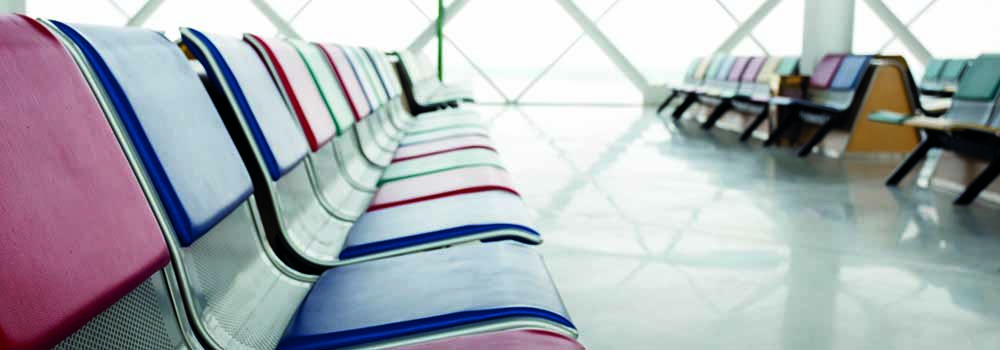
Thursday, 31 January 2019, 18:15 – 19:45
University of Neuchâtel, Avenue du 1er-Mars 26, Room B32
Call for Visiting Fellows
Spring Term 2019
The nccr – on the move wants to encourage the network members to link up with research teams abroad to enhance international exchange and scientific cooperation. For this purpose it awards grants to host PostDocs and Doctoral Students from abroad in Switzerland for a duration of two to three months. During the visit, the incoming fellows pursue a small joint research project in collaboration with the research team hosting them.
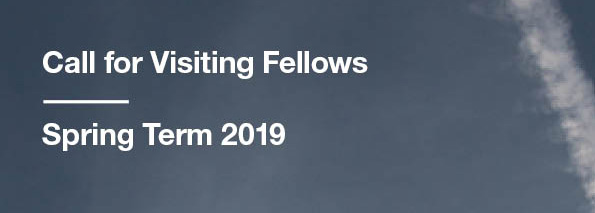
The grants will cover travel, room and board expenses during the stay in Switzerland.
More information and application procedure see: Call for Visiting Scientists Spring 2019 (PDF)
Deadline for applications: 25 January 2019
Entanglements: Passports, Migrant Workers, and the Question of Gender Public Lecture
Prof. Nicole Constable, Department of Anthropology, University of Pittsburgh
Discussant: Prof. Janine Dahinden, Laboratory for the Study of Social Processes, University of Neuchâtel

Thursday, 13 December 2018, 18:15 – 19:45
University of Neuchâtel, Rue Abram-Louis-Breguet 2, Room R.113
CAS in Migration and Diversity
12-17 November 2018 in Neuchâtel
21-26 January 2019 in Beirut
25-30 March 2019 in Lugano
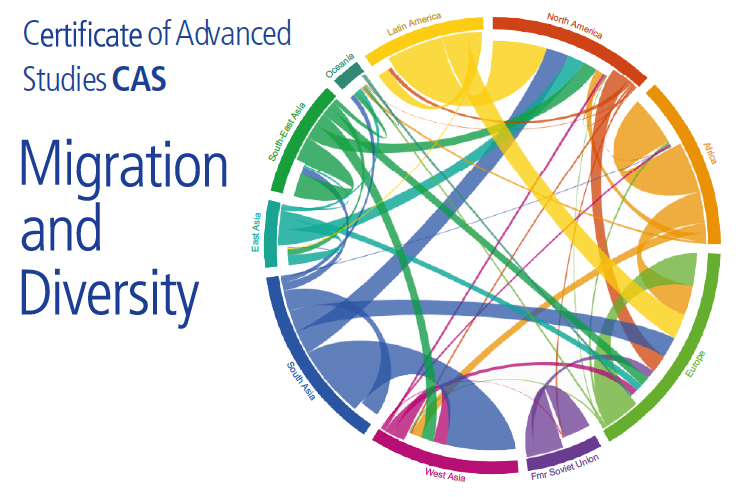
The Certificate of Advanced Studies CAS in Migration and Diversity is a joint collaboration between the Università della Svizzera italiana MIC, the nccr – on the move and the University of Neuchâtel.
We address professionals with cutting-edge methods and tools to manage migration and diversity challenges in their workspace.
Application Deadline: September 10, 2018
Table ronde d’expert·e·s : On l’appelle ‘la deuxième génération’ – Un épilogue
Le 20 septembre dernier, le « nccr – on the move » a organisé sa troisième table ronde d’expert·e·s, en partenariat avec la Fondation Mercator Suisse. Portant sur les trajectoires d’enfants de migrant·e·s, la journée a permis l’émergence de pistes concrètes, visant avant tout la sensibilisation des institutions aux discriminations et stigmatisations quotidiennes que rencontrent encore trop souvent ces jeunes citoyen·ne·s dont les parents ont un jour migré en Suisse.
On l’appelle la « deuxième génération »: trajectoires entre discrimination, succès et négociation des appartenances
3ème table ronde d’expert·e·s du
« nccr – on the move »
Jeudi 20 septembre 2018
Musée Gutenberg, Place Notre-Dame 16, Fribourg

La troisième table ronde d’expert·e·s du « nccr – on the move », organisée conjointement avec la Fondation Mercator Suisse, porte sur les trajectoires et la situation de personnes qui sont nées et ont grandi en Suisse, où leurs parents ont migré. Même lorsqu’ils et elles sont citoyen·ne·s suisses et ont connu des trajectoires d’ascension sociale, ces personnes n’en sont pas moins confrontées à des stéréotypes, souvent stigmatisants, voire à des discriminations.
L’évènement vise à ouvrir le dialogue entre chercheur·euses du « nccr – on the move » et représentant·e·s des autorités ou de la société civile. Les tables rondes seront suivies de la projection du film ‹ Succès ordinaires. S’enraciner par-delà les écueils ›.
Inscription
Veuillez vous inscrire jusqu’au 7 septembre 2018 par e-mail et nous indiquer si vous avez besoin de la traduction simultanée.
Man nennt sie die «zweite Generation»: zwischen Diskriminierung, Erfolg und Aushandeln der Zugehörigkeit
3. Dialog unter Expertinnen und Experten des «nccr – on the move»
Donnerstag, 20. September 2018
Gutenberg Museum, Liebfrauenplatz 16, Freiburg

Der dritte Dialog unter Expertinnen und Experten des «nccr – on the move», der gemeinsam mit der Stiftung Mercator Schweiz organisierte wird, beschäftigt sich mit der Laufbahn und der Situation von Menschen, die zwar in der Schweiz geboren und aufgewachsen sind, deren Eltern aber in die Schweiz migrierten. Auch wenn diese Menschen mittlerweile Schweizer Staatsbürger sind und einen sozialen Aufstieg erlebt haben, so werden sie dennoch oft mit stigmatisierenden Stereotypen oder gar mit Diskriminierung konfrontiert.
Der Anlass bietet die Gelegenheit für einen Meinungsaustausch zwischen Forscherinnen und Forschern des «nccr – on the move» sowie Vertreterinnen und Vertretern von Behörden bzw. der Zivilgesellschaft. Im Anschluss an die Gesprächsrunden wird der Film «Normale Erfolgsgeschichten? Fussfassen jenseits von Hindernissen» gezeigt.
Anmeldung
Wir bitten Sie, sich bis zum 7. September 2018 per E-Mail anzumelden und uns mitzuteilen, ob Sie eine Simultanübersetzung benötigen.
Looking Back at the 2018 Neuchâtel Graduate Conference of Migration and Mobility Studies
On the 13 and 14 of September the University of Neuchâtel hosted the second edition of the Neuchâtel Graduate Conference of Migration and Mobility Studies with 38 doctoral and postdoctoral researchers coming from 12 countries, whose presentations were organized in 13 thematic panels with different disciplinary perspectives.
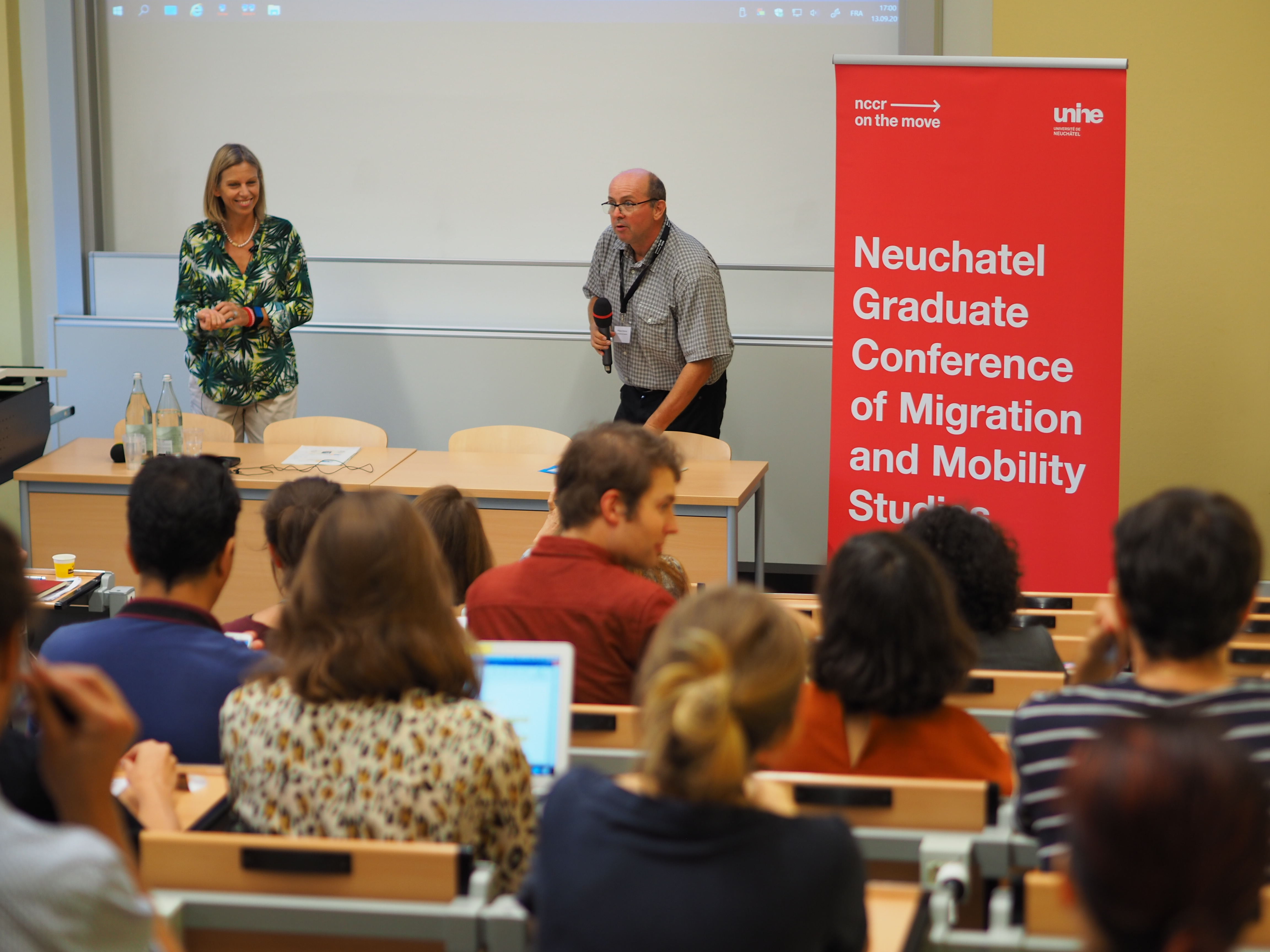 Prof. Philippe Wanner, Deputy Director of the nccr – on the move, introducing Prof. Anna Triandafyllidou, European University Institute
Prof. Philippe Wanner, Deputy Director of the nccr – on the move, introducing Prof. Anna Triandafyllidou, European University Institute
Neuchâtel Graduate Conference of Migration and Mobility Studies 2018
13-14 September 2018
University of Neuchâtel, Avenue du 1er-Mars 26, Neuchâtel

The Neuchâtel Graduate Conference on Migration and Mobility Studies targets young migration and mobility scholars who will present and discuss their work. It offers an opportunity for academic exchange amongst graduate students from different universities and research institutions from all disciplines interested in migration and mobility studies. It provides a stimulating environment in which they can share ideas, establish networks, attend targeted trainings, and initiate future collaborative research. The conference includes a keynote lecture on Migration, Nation, and Populism as well as a training workshop “Publishing in Migration and Mobility Journals”, which can be attended by participants only.
Online registration, until September 4, 2018
29 juin 2018 – Balade dans le paysage migratoire suisse
Où en est le « nccr – on the move » après quatre ans ?
Vendredi 29 juin 2018
Université de Neuchâtel, Aula des Jeunes Rives, Espace Louis-Agassiz 1, 2000 Neuchâtel

Au cours des quatre dernières années, les membres du « nccr – on the move » ont étudié le paysage migratoire suisse et se sont demandé si, comment et pourquoi les migrations et la mobilité ont évolué ces dernières décennies et comment les différents acteurs traitent les défis qui en résultent. Une soixantaine de chercheur·euse·s en sciences sociales, économiques et juridiques ont analysé statistiquement les données sur les parcours et les caractéristiques des mouvements migratoires d’aujourd’hui, interrogé les personnes concernées sur leurs expériences et ainsi obtenu un aperçu de leur quotidien, et fait état de la politique migratoire suisse ainsi que de divers aspects du droit de la migration. Nous souhaitons désormais partager ces connaissances avec vous et vous fournir des éléments de réponse à nos questions.
Inscription
Veuillez vous inscrire avant le 15 juin 2018 par e-mail et nous indiquer si vous avez besoin de la traduction simultanée et/ou souffrez d’une intolérance alimentaire.
29. Juni 2018 – Streifzug durch die Migrationslandschaft Schweiz
Wo steht der «nccr – on the move» nach vier Jahren?
Freitag, 29. Juni 2018
Universität Neuenburg, Aula des Jeunes Rives, Espace Louis-Agassiz 1, 2000 Neuchâtel

In den letzten vier Jahren haben Wissenschaftler*innen des «nccr – on the move» die Migrationslandschaft Schweiz erforscht und sich gefragt, ob, wie und warum sich Migration und Mobilität in den letzten Jahrzehnten verändert haben und wie verschiedene Akteure mit den daraus resultierenden Herausforderungen umgehen. Rund sechzig Forschende aus den Sozial-, Wirtschafts- und Rechtswissenschaften haben Daten zu den Verläufen und Merkmalen heutiger Migrationsbewegungen statistisch aufbereitet, betroffene Personen zu ihren Erfahrungen befragt, Einblicke in ihren Alltag erhalten und die schweizerische Migrationspolitik sowie verschiedene Aspekte des Migrationsrechts dokumentiert. Nun möchten wir diese Erkenntnisse mit Ihnen teilen und erste Antworten auf unsere Fragen liefern.
Anmeldung
Wir bitten Sie, sich bis zum 15. Juni 2018 per E-Mail anzumelden und uns mitzuteilen, ob Sie eine Simultanübersetzung benötigen und/oder ob Sie Nahrungsmittelunverträglichkeit haben.
Balade dans le paysage migratoire Suisse – Streifzug durch die Migrationslandschaft Schweiz
An Epilog

On Friday 29 June 2018, the nccr – on the move celebrated the conclusion of Phase I with a full-day event hosted by the University of Neuchâtel. About 80 people between academics, journalists, experts and policy-makers participated in the event, which was an opportunity to debate the main topics of research covered by the nccr – on the move since the beginning of the projects four years ago and officially kick-off the next phase of the nccr – on the move (2018-2022).
The Migratory Realities of Switzerland in 180 Seconds
On Friday 29 June 2018, the nccr – on the move celebrated the conclusion of Phase I with a full-day event hosted by the University of Neuchâtel. Since the promotion of young researchers is an essential pillar of the nccr – on the move, seven doctoral students and postdoctoral fellows introduced their research during the day. The presentations were based on an original format, as they could only include one image and had a time limit of 180 seconds. Watch the videos of these presentations, which offer an overview of the different migratory realities in Switzerland.
Imagine you had only three minutes to inform your audience about your research… Not an easy task! Seven of our doctoral students and postdoctoral fellows have accepted this challenge of science communication and have presented their research to our audience and to a jury composed of two journalists and one expert (Christoph Keller, Chantal Tauxe, Inés Mateos) and two members of the International Advisory Board (Pieter Bevelander and Jim Hollifield).The jury awarded the prize for best presentations to Katrin Sontag and Lorenzo Piccoli. From September 10 on, the nccr – on the move will publish one of these videos every day.
Rorick Tovar, University of Bern
Creating a Law Market? Choice of Law and Regulatory Competition in Marriage Law
The fact that each country has its own marriage law can be a major problem for couples that have lived in different countries. What if couples could determine the matrimonial law, they consider the most appropriate themselves?
Diplôme helvétique en poche, un étranger sur deux reste en Suisse
Neuchâtel, le 28 juin 2018. Près d’une personne sur deux venant de l’étranger, qui obtient un master d’une institution d’enseignement supérieur helvétique, est toujours présente en Suisse deux ans après avoir terminé ses études. C’est un des principaux constats d’une étude du « nccr – on the move », une parmi la vingtaine de projets de longue haleine qui constituent ce pôle de recherche national sur la mobilité et la migration piloté par l’Université de Neuchâtel. Le « nccr – on the move » célèbre vendredi ses quatre premières années d’activité pour lesquelles il avait reçu un soutien de 17,2 millions de francs du Fonds national suisse de la recherche scientifique. Il entame dès à présent sa deuxième phase d’activité de quatre ans.
Einmal ein schweizerisches Diplom in der Tasche, bleibt jeder zweite Ausländer in der Schweiz
Neuenburg, 28. Juni 2018. Fast 50% der ausländischen Studierendenabsolvente an Schweizer Hochschulen halten sich zwei Jahre nach Abschluss immer noch in der Schweiz auf. Dies ist eine der wichtigsten Erkenntnisse einer Studie des «nccr – on the move». Bei dieser Studie handelt es sich um eines von etwa zwanzig Langzeitprojekten des von der Universität Neuenburg geleiteten Nationalen Forschungsschwerpunkts, der Themen rund um Migration und Mobilität erforscht. Am Freitag feiert der «nccr – on the move» die ersten vier Jahre seiner Betriebsphase, für die er vom Schweizerischen Nationalfonds zur Förderung der wissenschaftlichen Forschung mit 17.2 Millionen Franken unterstützt wurde. Nun beginnt für diesen Forschungsschwerpunkt die zweite vierjährige Betriebsphase.
Interdisciplinary Workshop: Exploring the Imagination-(Im)Mobility Nexus: From Imaginaries to Imagining On the Move
18 – 19 May 2018
University of Neuchâtel, Faculté des lettres et sciences humaines, Espace Louis-Agassiz 1, room R.S.38, 2000 Neuchâtel, Switzerland
The imagination of alternative possible lives has acquired a new role in contemporary world, and has become part of the daily mental life of many people, also as a result of the mass media and mass migration. (Im)mobility, as the dialectic between movement and stasis at the geographic, temporal and semantic level, in turn, is inextricably linked to the ability of people to imagine other places, possibilities, and explore the past or the future.
This interdisciplinary workshop will explore possible future directions of research on the nexus of imagination-mobility and the relationship between imaginaries and imagining processes from an interdisciplinary perspective.
People interested in attending and participating in this working workshop are welcome. Please register by sending an email to Flavia Cangià until Friday, 11 May 2018.

International Workshop: Restricting Immigration: Practices, Experiences and Resistance
18 May 2018
University of Neuchâtel, Avenue du 1er Mars 26 (Main Building), Room C56, 2000 Neuchâtel, Switzerland
Enforcing migration control implies making choices about who is allowed to enter and/or stay in the national territory and who is not, thus producing categories and processes of inclusion and exclusion. Exclusion is defined as a status and process, by which a person or categories of persons are deprived of access to and participation in opportunities, resources and rights.
This international workshop gathers researchers studying different countries and investigating how the exclusion of migrants trying to enter or requested to leave a country is practiced, experienced, and contested by several actors involved. The papers focus on two fields of practices: border control and immigration detention.
Participation in the workshop is free, but please register until 16 May 2018 by sending an e-mail to Jonathan Miaz.

Les migrant·e·s sont satisfait·e·s de leur migration mais ne visent pas nécessairement la naturalisation : une plateforme interactive pour des données exclusives sur la migration
Neuchâtel, 10 avril 2018 – 83% des personnes migrantes interrogées par le « nccr – on the move » déclarent être satisfaites de leur décision de migrer. Mais seules 39% d’entre elles pensent demander la naturalisation. Ces résultats sont ceux de l’enquête exclusive menée en 2016 auprès de presque 6000 migrantes et migrants arrivé·e·s en Suisse au cours des dix dernières années. Aux côtés de données statistiques et législatives, les résultats de l’enquête font partie de la nouvelle plateforme interactive qui permet d’appréhender le paysage migratoire suisse sous différents angles et qui inclut à ce jour une trentaine d’indicateurs (indicators.nccr-onthemove.ch).
Die Migrant*innen sind mit ihrer Migration zufrieden, streben aber nicht unbedingt eine Einbürgerung an – eine interaktive Online-Plattform mit exklusiven Daten zum Thema Migration
Neuenburg, 10 April 2018 – 83 % der vom «nccr – on the move» befragten Migrant*innen geben an, mit ihrem Migrationsentscheid zufrieden zu sein. Doch lediglich 39 % von ihnen haben die Absicht, sich einbürgern zu lassen. Diese Zahlen stammen aus einer Umfrage, die 2016 unter fast 6000 Migrant*innen durchgeführt wurde, die in den letzten zehn Jahren in die Schweiz gekommen waren. Nebst statistischen Daten und einer Sammlung rechtlicher Grundlagen sind auch die Ergebnisse aus dieser Umfrage Teil der neuen interaktiven Online-Plattform, die eine Betrachtung der Schweizer Migrationslandschaft aus verschiedenen Blickwinkeln ermöglicht und derzeit rund dreissig Indikatoren beinhaltet (indicators.nccr-onthemove.ch).
Neuchatel Graduate Conference of Migration and Mobility Studies. Call for Papers and Panels.
University of Neuchatel
13 – 14 September 2018
The Neuchatel Graduate Conference is an international graduate conference of migration and mobility studies organized by the nccr – on the move. The conference will provide a stimulating environment in which PhD students from different universities and research institutions can exchange ideas, establish networks, attend targeted trainings, and initiate future collaborative research.

Call for Papers and Panels
We welcome papers and panels addressing any topic in migration and mobility studies from all related disciplines such as demography, economics, geography, law, political science, sociology, and other relevant fields. Both empirical and theoretical papers will be considered. We especially welcome papers on the following topics:
- Mapping and quantifying mobility
- Legal migration regimes
- Economics of migration
- Migration policy
- Citizenship and immigration
- Migrant inclusion
- Gender and migration
Deadline for submission is 31 March 2018.
There is no participation fee. In order to encourage participation from all universities, the nccr – on the move will provide funding opportunities up to CHF 400, specifically designed for international graduate students traveling from far or without mobility funding.
Please read the call for papers for more information (PDF).
Workshop: Attitudes to Foreigners and Discrimination in the Labor Market
Tuesday, 20 March 2018
University of Geneva
Bd. du Pont-d’Arve 40, 1205 Genève, Salle M3250
The workshop will bring together researchers of the SNIS project Individual-Level Attitudes towards Immigrants over Time and across Contexts, researchers of the nccr – on the move , other researchers, and invited experts working on attitudes to foreigners and discrimination in the labor market. It serves as the final conference of the SNIS project, and to showcase current work on these topics. We expect invited participants to present advanced work in progress – ready to be submitted following the discussions at the conference – and provide the participants with networking opportunities.
Attendance is free of charge, please register via e-mail to didier.ruedin@unine.ch until 13 March 2018.
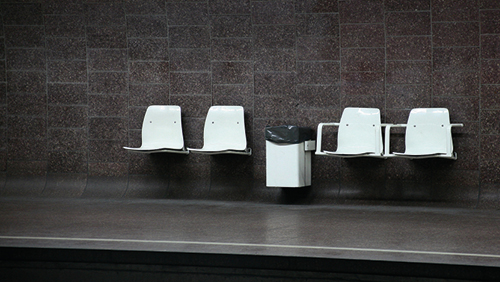
Public Lecture Series Spring 2018
Different location on 24 May 2018:
University of Bern, UniS, Schanzeneckstrasse 1, Room A 022
University of Neuchâtel
Rue Abram-Louis-Breguet 2, Room R.113
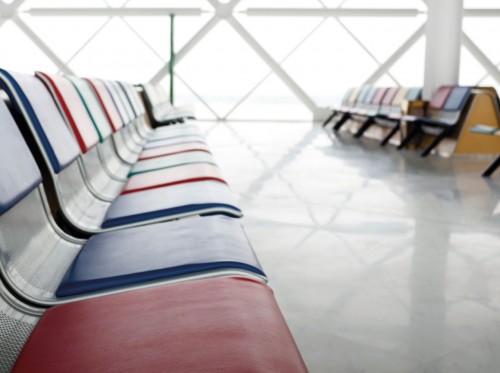
Thursday, 22 February 2018, 18:15 – 19:45
The Challenge of Mainstreaming Integration Governance in the Context of Superdiversity
Peter Scholten, Faculty of Social Sciences, Erasmus University Rotterdam
Discussant: Anita Manatschal, Swiss Forum for Migration and Population Studies, University of Neuchâtel
—
Thursday, 22 March 2018, 18:15 – 19:45
Do Photos Help or Hinder Field Experiments of Discrimination?
Judy Rich, Portsmouth Business School, University of Portsmouth
Discussant: Giuliano Bonoli, IDHEAP, University of Lausanne
—
Thursday, 12 April 2018, 18:15 – 19:45
Immigration and the Election of Donald Trump: Why the Sociology of Migration Left Us Unprepared … and Why We Shouldn’t Have Been Surprised
Roger Waldinger, UCLA Center for the Study of International Migration, University of California Los Angeles
Discussant: Janine Dahinden, Laboratory for the Study of Social Processes and Center for the Understanding of Social Processes, University of Neuchâtel
Jointly organized with the History Institute, University of Neuchâtel
—
Thursday, 26 April 2018, 18:15 – 19:45
Asylum Determination in Europe: Ethnographic Perspectives
Nick Gill, Geography Department, University of Exeter
Discussant: Christin Achermann, Centre for Migration Law and Center for the Understanding of Social Processes, University of Neuchâtel
—
Thursday, 24 May 2018, 18:15 – 19:45
Hospitality Denied: The European Court of Human Rights’ Take on Migrant Issues
Marie-Bénédicte Dembour, Brighton Business School, University of Brighton
Discussant: Alberto Achermann, Institute of Public Law, University of Bern
Different location: University of Bern, UniS, Schanzeneckstrasse 1, Room A 022
—
Download the program flyer (PDF)
Table ronde d’expert·e·s « La Suisse ‹ all inclusive › ? Migration, mobilité et inclusions différenciées ». Un épilogue.
Fort du succès de sa première table-ronde d’expert·e·s (sur le thème de l’intégration dans le domaine de l’asile), le « nccr – on the move » a poursuivi ses efforts d’instaurer un dialogue constructif entre recherche et pratique : cette fois, ce sont différentes facettes du caractère inclusif ou exclusif de la Suisse qui ont été au cœur des discussions.
L’événement a eu lieu le 30 octobre 2017 au Château de Lenzburg et au Stapferhaus, en lien avec l’exposition du Stapferhaus « HEIMAT. Sur le fil des frontières », en présence d’une cinquantaine de représentant·e·s des autorités, de la société civile, de la recherche. Les questions suivantes ont été abordées : A l’instar des agences de voyages, la Suisse est-elle capable – et a-t-elle la volonté – d’offrir des conditions d’accueil « all inclusive » ? Et si c’est le cas, dans un contexte de mobilité croissante et de migration de plus en plus qualifiée, quelles catégories de migrant·e·s sont concernées par des formules « tout compris » ? Quelles catégories en sont exclues ?
L’allocution d’ouverture de Walter Leimgruber (Université de Bâle et Commission fédérale des migrations), a donné matière à réflexion pour les divers ateliers qui allaient suivre. Dans un discours engagé, il a plaidé pour une réflexion politique qui va au-delà de la question migratoire : la question de l’inclusion et de l’exclusion est l’affaire de toutes et tous, elle touche aussi bien aux politiques sociales qu’à celles de l’éducation et de la formation. « En réalité, a expliqué Leimgruber, la politique migratoire n’est rien d’autre que la politique de la société et du futur ».
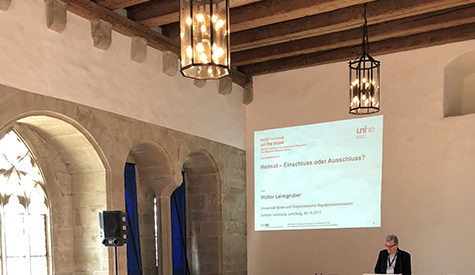
Trois ateliers ont suivi en parallèle, matin et après-midi.
Le premier a porté sur la volonté d’inclure (ou non) présente dans la législation, mais également au sein de la population suisse. Stefanie Kurt (HES-SO Valais) a présenté la nouvelle législation (Loi sur les étrangers et l’intégration et Loi sur la naturalisation) sous la forme d’un jeu des échelles, où des critères définis permettent d’obtenir un statut plus stable, mais également de « redescendre » vers un statut légal plus précaire. Les analyses présentées par Eva Green (Université de Lausanne), basées sur une large enquête auprès de la population suisse, démontrent quant à elles qu’une fierté nationale critique n’empêche en rien l’ouverture à l’égard des migrant·e·s et que les rencontres entre différents groupes de la population doivent être encouragées pour une Suisse plus inclusive. Ines Mateos (experte en formation et diversité) a insisté sur le besoin d’un discours politique et médiatique différent, qui reconnaît la réalité d’une société « post-migratoire », c’est-à-dire dont une part importante de la population, en particulier parmi les jeunes, a une histoire migratoire. L’étude menée récemment par le Service de lutte contre le racisme donne des indications sur les sentiments de menace que peuvent vivre les un·e·s et les autres: d’un côté, 16% de la population sondée se sent menacée par les étrangères et les étrangers, de l’autre 22% des répondant·e·s ont vécu une ou plusieurs expériences de discrimination, en majorité en raison de leur nationalité, leur langue ou leur accent, leur couleur de peau, leur religion ou leur origine ethnique. Les débats ont porté largement sur la difficulté à faire connaître la réalité migratoire, plus nuancée et moins effrayante qu’elle n’est généralement représentée dans l’opinion publique, les médias et les débats politiques. Une information ciblée des médias, des cours d’éducation civique mettant en lumière la réalité de cette société post-migratoire, ou encore le rôle des associations dans la participation des populations migrantes ont notamment été évoqués comme pistes.
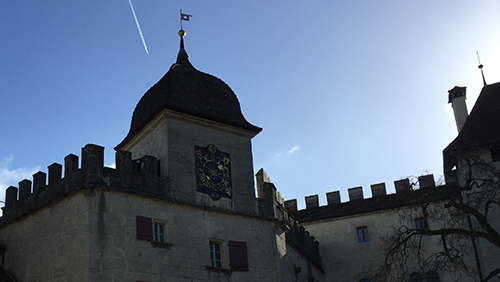
Le deuxième atelier portait sur la situation spécifique des migrant·e·s hautement qualifié·e·s. Sur la base d’une enquête et d’entretiens qualitatifs, Flavia Cangià et Tania Zittoun (Université de Neuchâtel) ont démontré que, contrairement aux idées reçues, seule une partie des familles mobiles reçoit une aide à la « relocalisation » et qu’une majorité des enfants de ces familles vont à l’école publique. Laure Sandoz (Université de Bâle) a notamment mis en évidence les difficultés rencontrées par les partenaires des « expats », alors que Katrin Sontag (Université de Bâle) a évoqué la situation compliquée des réfugié·e·s hautement qualifié·e·s dont les besoins (et la possible contribution) ne sont que rarement pris en considération. Andreas Földenyi (SIETAR) a quant à lui confirmé que les « global welcome packs » étaient une pratique du passé et que la Suisse n’était plus un pays très attractif pour les migrant·e·s hautement qualifié·e·s. Christof Meier (Promotion à l’intégration de la Ville de Zurich) observe dans sa pratique la précarité qui caractérise de plus en plus la situation de cette population spécifique. Les présentations et la discussion qui a suivi ont ainsi mis en lumière la diversité des situations d’un groupe, les « expats », souvent présenté comme homogène et ultra-privilégié. Le rôle de l’Etat à promouvoir l’intégration de ces migrant·e·s, mais également de leurs partenaires et encore plus de leurs enfants, a suscité des débats importants. Une partie va rester, une autre va s’en aller, la migration d’installation devient ainsi un modèle du passé : les autorités, locales avant tout, n’ont pas d’autre choix que de s’adapter à cette nouvelle donne.
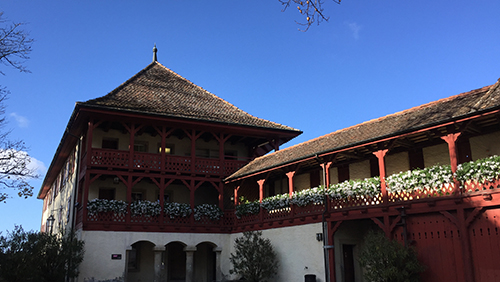
Au troisième atelier, il a été question de migrant·e·s que la Suisse ne cherche a priori pas à attirer mais qui font néanmoins partie de sa population : personnes « sans-papiers » et requérant·e·s d’asile débouté·e·s. Laura Rezzonico et Christin Achermann (Université de Neuchâtel) constatent une divergence entre les buts officiels de la législation permettant le renvoi de requérant·e·s d’asile débouté·e·s et leurs effets réels : alors que le dispositif se veut uniquement dissuasif, il est vécu comme une punition qui criminalise les personnes concernées. Didier Leyvraz (Université de Neuchâtel) a expliqué que les procédures de régularisation (cas de rigueur) mises en place par la Suisse s’inscrivent le plus souvent dans une tradition humanitaire. Toutefois, la récente Opération Papyrus menée par les autorités genevoises a plutôt des buts économiques. Alexander Ott (Police des étrangers de la Ville de Berne) a pris position sur les travaux de recherche présentés. D’une part, le dispositif de détention administrative des requérant·e·s d’asile débouté·e·s a les effets voulus puisqu’il promeut le départ autonome des personnes concernées, et limite le recours aux retours forcés. D’autre part, une opération telle que Papyrus ne serait selon lui pas nécessaire à Berne, car le mécanisme existant de régularisation et les bonnes relations de travail avec la « Sans Papiers Beratungsstelle » permettent de résoudre les situation au cas par cas. Enfin, Rémy Kammermann (Centre Social Protestant, Genève), qui a été l’un des instigateurs de l’Opération Papyrus, a expliqué comment celle-ci a été lancée en secret il y a six ans, et préparé en consultation avec tous les secteurs concernés (employeur·euse·s, ONG, autorités cantonales). Le projet-pilote, qui a permis de délivrer quelques 850 titres de séjour à ce jour, fait l’objet d’une évaluation. La discussion a porté essentiellement surtout sur la situation des sans-papiers. Des idées visant à faciliter la vie quotidienne des personnes en situation irrégulière ont été discutées (« citizenship cards » ou « sanctuary cities »). La mise en place d’une Opération Papyrus par d’autres cantons a été vivement débattue. Les autorités des villes en Suisse allemande ne semblent pas en percevoir la nécessité, pensant qu’il n’existe que très peu de personnes en situation irrégulière.
La journée s’est terminée, pour ceux et celles qui n’avaient pas encore eu l’opportunité de s’y rendre, par un tour de grande roue au soleil couchant et la visite guidée de l’exposition HEIMAT. L’occasion de continuer les discussions, de manière plus divertissante mais avec profondeur encore, sur les identités, les appartenances, l’exclusion et l’inclusion.
Joëlle Moret, Responsable du transfert de connaissances, « nccr – on the move »

Migration-Mobility Survey: Preliminary Results
Migrant’s Current Life Situation and Migratory Trajectories
Some first descriptive results of the Migration-Mobility Survey
The aim of the Migration-Mobility Survey was to gather information on the living conditions of residents of Switzerland who arrived within the last 10 years as well as on their immigration experience. Those data are essential for researchers and aim at better understanding the needs of this population as well as developing adequate integration policies.
Several researchers are currently analyzing the survey data and interpreting the results. Further, some of the teams carry out supplementary in-depth interviews with participants of the survey who agreed to be interviewed.
–
Aktuelle Lebenssituation und Migrationsverlauf der Migrantinnen und Migranten
Erste deskriptive Ergebnisse des Migration-Mobility Surveys
Ziel des Migration-Mobility Surveys war es, Informationen zu den Lebensbedingungen von in der Schweiz wohnhaften Personen, die innerhalb der letzten zehn Jahre eingewandert sind, und deren Migrationserfahrungen zu erhalten. Diese Daten sind für die Forschungsarbeit unerlässlich und sollen ein besseres Verständnis für die Bedürfnisse dieser Bevölkerungsgruppe sowie die Entwicklung einer geeigneten Integrationspolitik ermöglichen.
Mehrere Forscherinnen und Forscher sind derzeit mit der Auswertung der Umfragedaten und der Interpretation der Ergebnisse beschäftigt. Darüber hinaus führen einige der Teams zusätzlich persönliche Gespräche mit Teilnehmerinnen und Teilnehmern der Umfrage, die sich im Vorfeld dazu bereit erklärt haben. Wir werden Sie auf dem Laufenden halten.
–
La situation personnelle des migrant·e·s et leurs trajectoires migratoires
Quelques premiers résultats descriptifs issus du Migration-Mobility Survey
L’objectif du « Migration-Mobility Survey » était de récolter des informations sur les conditions de vie et sur l’expérience d’immigration des résident·e·s en Suisse arrivé·e·s au cours des dix dernières années. Ces données sont essentielles pour les chercheuses et les chercheurs. Elles visent une meilleure compréhension des besoins de cette population ainsi que le développement de politiques d’intégration adéquates.
Plusieurs chercheuses et chercheurs analysent actuellement les données de l’enquête et interprètent les résultats. En outre, certains membres de l’équipe mènent des interviews approfondies complémentaires avec les participant·e·s de l’enquête qui ont accepté l’entretien. Nous vous tiendrons informé·e·s des résultats.

La plupart des migrant·e·s ne restent que quelques années : des données originales et une « boîte à outils » innovante pour décoder le paysage migratoire suisse
Les mouvements migratoires en Suisse sont bien plus fluides que ce que l’on imagine : les migrant·e·s sont le plus souvent des personnes hautement qualifiées qui quittent le pays après quelques années de travail en Suisse. Les « Migration-Mobility Indicators », une plateforme interactive que vient de mettre en ligne le « nccr – on the move », basé à l’Université de Neuchâtel, permet d’explorer de nouvelles facettes de la réalité du paysage migratoire par le biais de visualisations attractives.
En croisant différentes bases de données statistiques de l’Office fédéral de la statistique (OFS) et du Secrétariat d’État aux migrations (SEM), l’équipe de recherche du « nccr – on the move » a pu reconstruire les trajectoires des migrantes et des migrants pour différentes périodes successives. Ces données longitudinales – inédites en Suisse comme à l’étranger – mettent en lumière un changement majeur du paysage migratoire suisse : le passage de migrations d’installation à des mobilités diversifiées, caractérisées par des mouvements multiples – souvent le fait de personnes hautement qualifiées – et par un nombre élevé de retours des migrant·e·s venu·e·s travailler en Suisse pendant quelques années.
Qui sont les migrant·e·s ? Les différents indicateurs à disposition montrent par exemple que la migration vers la Suisse est pour l’essentiel motivée par des raisons professionnelles puisque la moitié des permis sont délivrés à des personnes ayant obtenu un emploi en Suisse. En outre, plus de la moitié des personnes en âge d’exercer une activité arrivant en Suisse est titulaire d’un diplôme du niveau tertiaire. Même parmi les migrant·e·s de pays traditionnels d’immigration, comme l’Italie ou l’Espagne, la moitié des personnes arrivées après 2010 avaient un tel niveau de formation. Ce type de détails peut être facilement exploré grâce à l’interactivité de la plateforme. Celle-ci montre en outre que la moitié des migrant·e·s arrivé·e·s en Suisse entre 1991 et 2015 vient d’un pays européen, Allemagne, Portugal, Italie et France en tête. Quant aux requérant·e·s d’asile, qui font l’objet d’une attention grandissante dans les discours médiatiques et politiques, ils ne constituent que 2,3 % des quelque 2 millions de personnes qui forment la population étrangère en Suisse.
La plateforme en ligne permet enfin d’observer la diversité des parcours au fil du temps, une nouveauté par rapport aux statistiques existantes. L’analyse de la trajectoire d’une cohorte de personnes entrées en Suisse en 1998 montre ainsi qu’une moitié d’entre elles est repartie après 16 ans, attestant de ce changement vers une mobilité aux multiples mouvements.
D’où viennent les personnes nouvellement arrivées ? Dans quels cantons s’installent-elles le plus ? Repartent-elles ? Quelle est la part des personnes hautement qualifiées dans les flux migratoires ? Combien d’entre elles finissent par se naturaliser ? Moyennant un accès à Internet, toute personne intéressée peut visualiser des données statistiques originales en manipulant cette « boîte à outils » innovante, et ainsi trouver des réponses à ces questions.
Les douze indicateurs mis à disposition sur la plateforme du « nccr – on the move » sont destinés aussi bien aux journalistes qu’aux représentant·e·s de la société civile, des administrations et du monde politique, ou simplement au grand public souhaitant une représentation accessible et scientifique du paysage migratoire suisse. Ils seront mis à jour régulièrement et complétés de nouveaux indicateurs originaux.
Die meisten Migrantinnen und Migranten bleiben nur ein paar Jahre – statistische Originaldaten und eine innovative «Toolbox» liefern ein klares Bild der Migrationslandschaft in der Schweiz
Die Zuwanderung in die Schweiz verändert sich viel stärker als gemeinhin angenommen. So handelt es sich bei den meisten Migrantinnen und Migranten um hochqualifizierte Personen, die die Schweiz nach einigen Jahren beruflicher Tätigkeit wieder verlassen. Mittels der interaktiven Online-Plattform «Migration-Mobility Indicators», die vor Kurzem der an der Universität Neuenburg angesiedelte «nccr – on the move» aufgeschaltet hat, lassen sich dank einer benutzerfreundlichen Aufbereitung und Visualisierung der Daten neue Facetten der heutigen Migrationslandschaft entdecken.
Durch die Verknüpfung verschiedener statistischer Datenbanken des Bundesamts für Statistik (BFS) und des Staatssekretariats für Migration (SEM) ist es dem Forschungsteam des «nccr – on the move» gelungen, die Migrationsverläufe von Migrantinnen und Migranten für verschiedene aufeinanderfolgende Perioden aufzuzeigen. Diese bisher in der Schweiz sowie im Ausland einzigartigen Längsschnittdaten verdeutlichen den bedeutenden Wandel in der Schweizer Migrationslandschaft: Nachdem sich Migrantinnen und Migranten früher häufig langfristig in der Schweiz niederliessen, ist heute – oft unter hochqualifizierten Personen – eine erhöhte Mobilität zu beobachten, und immer mehr Migrantinnen und Migranten kehren nach einigen Jahren beruflicher Tätigkeit in der Schweiz in ihre Herkunftsländer zurück.
Wer sind diese Migrantinnen und Migranten? Die verschiedenen verfügbaren Indikatoren zeigen unter anderem, dass die Zuwanderung in die Schweiz hauptsächlich aus beruflichen Gründen erfolgt, zumal die Hälfte der Aufenthaltsgenehmigungen an Personen vergeben wird, die in der Schweiz einen Arbeitsplatz gefunden haben. Darüber hinaus verfügen mehr als 50 Prozent der Personen, die bei ihrer Ankunft in der Schweiz alt genug sind, um einer beruflichen Tätigkeit nachzugehen, über einen Abschluss auf Tertiärstufe. Selbst unter den Migrantinnen und Migranten aus den traditionellen Herkunftsländern wie Italien oder Spanien verfügte die Hälfte der nach 2010 eingewanderten Personen über eine Ausbildung auf dieser Stufe. Solche Detailinformationen lassen sich mit Hilfe dieser interaktiven Plattform leicht eruieren. Mit ihr lässt sich auch erkennen, dass die Hälfte der zwischen 1991 und 2015 in die Schweiz zugewanderten Migrantinnen und Migranten aus einem europäischen Land stammen, wobei Deutschland, Portugal, Italien und Frankreich an der Spitze liegen. Die Asylsuchenden, die in Medien und Politik auf eine stetig wachsende Aufmerksamkeit stossen, machen lediglich 2,3% der rund 2 Millionen in der Schweiz lebenden Ausländerinnen und Ausländer aus.
Schliesslich bietet die Online-Plattform auch einen Überblick über die unterschiedlichen Migrationswege im Zeitverlauf, was verglichen mit den bisherigen Statistiken neu ist. So zeigt die Analyse des Migrationsverlaufs einer Personenkohorte, die 1998 in die Schweiz eingewandert war, dass die Hälfte von ihnen das Land nach 16 Jahren wieder verlassen hat – was Beleg für eine erhöhte Mobilität von Migrantinnen und Migranten ist.
Woher kommen die neu zugewanderten Personen? In welchen Kantonen lassen sie sich nieder? Kehren sie wieder zurück? Wie hoch ist der Anteil an hochqualifizierten Personen unter den Migrantinnen und Migranten? Wie viele von Ihnen lassen sich schliesslich einbürgern? Alles was es braucht, ist ein Internetzugang – und schon können alle interessierten Personen mittels dieser innovativen «Toolbox» statistische Originaldaten visualisieren und Antworten auf diese Fragen finden.
Die zwölf Indikatoren, die der «nccr – on the move» auf seiner Plattform bereitstellt, richten sich sowohl an Journalistinnen und Journalisten wie auch an Vertreterinnen und Vertreter der Zivilgesellschaft, der Behörden, der Politik oder einfach an all jene, die einen gut verständlichen und wissenschaftlich fundierten Überblick über die Migrationslandschaft in der Schweiz gewinnen möchten. Sie werden regelmässig aktualisiert und durch neue Indikatoren ergänzt.
Labor Mobility and Skills Recognition: Insights from ASEAN and ECOWAS. An Epilog.
Side Event to the 6th Thematic Session to Inform the Development of the Global Compact on Migration
Geneva, Palais des Nations, 13 October 2017
The side event was part of the work program of the Global Migration Compact’s sixth thematic session dedicated to labor migration, irregular movement and skills:
Program of the Side Event (PDF)
The aim of the side event, held at the Palais des Nations on 13 October 2017, was to inform governments and stakeholders participating in the consultations towards a Global Migration Compact about skills recognition practices in three regions: ASEAN, ECOWAS, as well as Latin and Central America. Regional skills recognition practices were screened for improving the “fair, regular and orderly” migration (processes) that are the pillars of a future Global Migration Compact. Which skills recognition practices could be “uploaded” to the Global Compacts process? What is their relation to trade agreements, the liberalization of labor migration, and what is their impact on facilitating return migration and the circulation of skills?
Skills are an incremental element of personal identity and capacity – a loss of skills exposes migrants and refugees to vulnerabilities. The Global Compact process is committed to change and enabling migration “out of choice, not necessity”. Skills transfer and recognition are considered key elements in facilitating choice, strengthening capacity and minimizing vulnerability.
With 70% of migrants in the world of work today, their skills form an important resource, for employers and the labor market, however, their recognition is often associated with protectionism of professional associations. In result, skills are often recognized sector-specifically, where professional associations have created bi-national transfer practices. The role of state-led process such as the Global Migration Compact could be one of co-facilitating trans-regional self-regulation, such as it exists among architects, engineers, nurses.
Dr. Miryam Hazan, Inter-American Development Bank discussed the impact of the UNESCO conventions on skills in the Latin American Region, while Amanda Bisong, ECOWAS Secretariat highlighted the benefits of the African skills transfer card. Joji Aragon, Assistant Secretary, Legal, Legislative and International Affairs, Republic of the Philippines gave an introduction to the intricate system of mutual recognition in the ASEAN.
The ILO, represented by Dr. Nathalia Popova, and the WTO, represented by Pamela Lanyi, critically reflected on skills recognition from a labor standards and trade viewpoint.
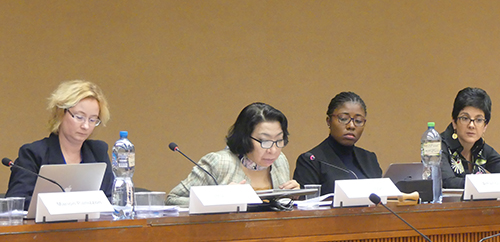
From left to right: Nathalia Popova, ILO, Joji Aragon, Philippines government, Amanda Bisong, ECOWAS, and Miryam Hazan, Iter-American Development Bank
The UN Global Compacts process is organized around informal thematic sessions which offers delegations and stakeholders to exchange on six themes on migration in advance of negotiations starting end of 2017. Side-events are one way for stakeholders, such as academia to be involved in bringing about change for migrants. It results from a cooperation between Prof. Elisa Fornalè, SNF Research Professor at the World Trade Institute, and the nccr – on the move project “From ‘Traditional’ to ‘New’ Migration: Challenges to the International Legal Migration Regime”.
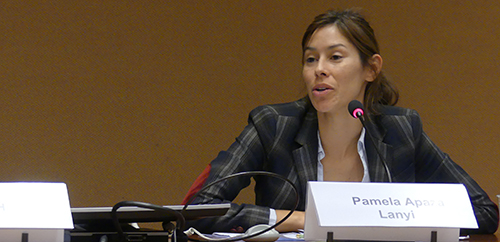
Pamela Apazi Lanyi, WTO
This side event concludes the involvement of the nccr – on the move and the World Trade Institute in several of the Global Compact Process’ thematic sessions, including a statement from the floor at the third thematic session “International cooperation and governance of migration in all its dimensions, including at borders, on transit, entry, return, readmission, integration and reintegration”, which took place on 19-20 June 2017.
Co-sponsored by the government of the Philippines, the side-event provided an opportunity for academia to showcase issues of harmonization and equivalence testing, of the benefits of self-regulation, sub-national delegation and sectoral regulation of skills recognition and its transfer to foreign nationals.
Marion Panizzon, nccr – on the move, Senior Researcher in the project From ‘Traditional’ to ‘New’ Migration: Challenges to the International Legal Migration Regime
Transnationalities in Migration and Mobility Research. Public Lecture Series of the nccr – on the move. Fall 2017.
The Fall 2017 Public Lecture Series investigates different manifestations of transnationality and their impact on regulation, labor markets and society. Three lectures will shed light on the dynamics of inclusion and exclusion resulting from growing transnational interrelations – focusing particularly on gendered migration regimes and policies, bordering practices, and persisting discriminations. Two lectures will deal with consequences, looking at the regulatory aspects of migration, or examining a transnational labor market in the making in the global NGO sector.
The 5th Public Lecture Series of the nccr – on the move will take place at the
University of Neuchâtel
Rue Abram-Louis-Breguet 2, Room R.113.
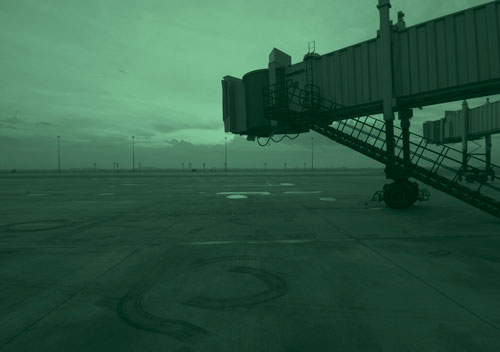
Thursday, 12 October 2017, 18:15 – 19:45
Arnfinn Midtbøen, Institute for Social Research Oslo
The Persistence of Ethnic and Racial Discrimination: Evidence from Europe and the US
Abstract (PDF)
Thursday, 19 October 2017, 18:15 – 20:00
jointly organized with the CUSO “Gender Studies” doctoral program
Anna Korteweg, Department of Sociology, University of Toronto Mississauga
Muslim Masculinities in Contemporary Migration Debates: Sexual Violence, Terror, and the Racialized Gendered Abjection of Immigrant Subjects
followed by
Camille Schmoll, Geography Department, University of Paris 7 Denis Diderot
Migrant Women in the Mediterranean. A Feminist Geography Approach.
Abstract (PDF)
Thursday, 9 November 2017, 18:15 – 19:45
Nira Yuval-Davis, Centre for Research on Migration, Refugees and Belonging, University of East London
Migration and the Rise of Everyday Bordering
Abstract (PDF)
Thursday, 23 November 2017, 18:15 – 19:45
Sigrid Quack, Institute of Sociology, University of Duisburg-Essen
Transnational Labor Markets in the Global NGO Sector
Abstract (PDF)
Thursday, 7 December 2017, 18:15 – 19:45
Giesela Rühl, Faculty of Law, Friedrich Schiller University Jena
Virtual Migration into Switzerland: Regulatory Competition and Regulatory Arbitrage
Abstract (PDF)
Download the program flyer (PDF)
People on the Move in an Evolving Europe. An Epilog.
nccr – on the move Summer School 2017, Fribourg
From 20 to 25 August 2017, the nccr – on the move Summer School was organized and hosted by the University of Fribourg. This year’s overarching topic was “People on the Move in an Evolving Europe”.
During the five days of interdisciplinary lectures, presentations and discussions, 14 doctoral students and PostDocs from all over the world (Poland, Lithuania, Austria, Scotland, the US, Turkey, Italy, Spain, Belgium, and Switzerland) were able to learn about and exchange views on the latest developments in the area of migration law and policy in Europe. In the mornings, distinguished international lecturers provided precious input that the participants discussed afterwards. In the afternoons, the fellows had the opportunity to present their research projects, which were commented on by the lecturers and the peers.
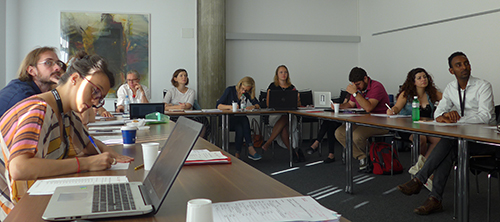
Faculty members were professors Hildegard Schneider (Maastricht University), René de Groot (Maastricht University), Dagmar Schiek (Queen’s University Belfast), Catherine Barnard (Cambridge University), Paul James Cardwell (Strathclyde University Glasgow), Kees Groenendijk (Radboud University Nijmegen), Yukari Ando (Osaka University) and Sarah Progin-Theuerkauf (Fribourg University), as well as Constantin Hruschka (Swiss Refugee Council, Bern). Their lecture topics ranged from EU citizenship, Asylum Law, Brexit, to mobility and non-discrimination as well as forced return and integration. It was particularly enriching from a comparative perspective to get some insights about Japan’s migration law, which was presented by Prof. Ando from Osaka.
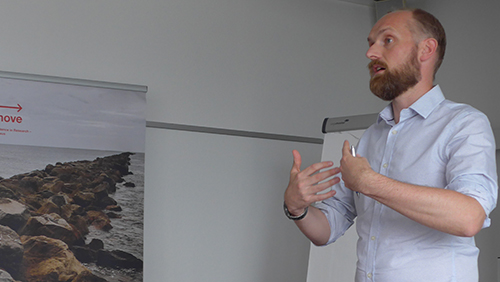 Prof. Paul James Cardwell, Strathclyde University Glasgow, discussed the EU’s relationships with partner countries
Prof. Paul James Cardwell, Strathclyde University Glasgow, discussed the EU’s relationships with partner countries
Finally yet importantly, the participants also had the possibility to discover some cultural aspects of their host town: On Thursday night, the group gathered around a delicious cheese fondue in Fribourg’s famous Café du Midi.
While saying good-bye on Friday, participant Katarzyna Templin-Ukleja from Warsaw expressed her full satisfaction:
“The Summer School was a great opportunity to deepen my understanding of the mechanisms in Europe seen from different angles and reflect on my interests in migration issues and the possibilities of their further development. I am very glad I had the possibility to come to Fribourg.”
Sarah Progin-Theuerkauf
nccr – on the move, Project Leader of the project “The Emergence of a European Law on Foreigners”
Call for Visiting Fellows. Spring Term 2018.
Outgoing and Incoming Short-Term Visiting Fellowships
The nccr – on the move wants to encourage the network members to link up with research teams abroad. For this purpose it is setting up short-term visiting fellowship schemes which can be used for both incoming and outgoing fellows.
The “outgoing” fellowship scheme is aimed at nccr – on the move PostDocs and doctoral students who wish to go abroad for a maximum of five months. The “incoming” fellowship scheme can be used to host senior (PostDoc) and junior (PreDoc) researchers from abroad who wish to collaborate with nccr – on the move researchers in Switzerland for a duration of two to three months.
Full call including eligibility and application procedure (PDF)
Deadline for application is 15 October 2017.
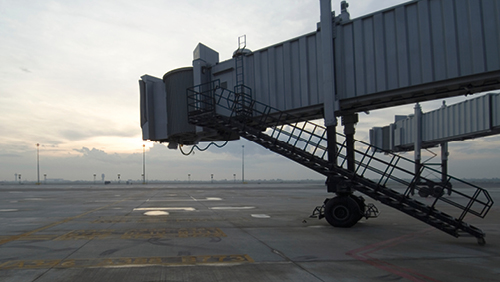
Postdoctoral Research Fellow @ the nccr – on the move
Within the network, different research projects are interested in creating a repository for legal sources and data on migration. In order to achieve this objective, the nccr – on the move is currently looking to fill the position of a
Postdoctoral Research Fellow (80%)
for a six-month appointment.
The successful applicant will be expected to a) collect legal data on migration-related issues in the Swiss federal context; b) assist with the production of migration-related databases, indicators and online visualization tools, c) author or co-author at least one academic article based on the data collected as part of the project.
Deadline for application is 15 May 2017.
Research and Publication Colloquium. Challenges in Post-Industrial Labor Markets
This interdisciplinary colloquium is jointly organized by IDHEAP (University of Lausanne), nccr – on the move (University of Neuchatel) and NCCR-LIVES (University of Lausanne). Its aim is to gather scholars interested in labor markets and their interrelation with society to discuss their research and provide a platform to get feedback on their work-in progress.
The colloquium will be held on Tuesdays from 12:15–13:15 h @ University of Lausanne, IDHEAP, Room 004.
Dates for the spring term 2017
24.01. / 07.02. / 21.02. / 21.03. / 11.04. / 02.05. / 23.05. / 20.06.
Full program (PDF).
Please register by sending an email to Flavia Fossati.
If you want to present your work-in progress next semester (fall 2017) please contact Flavia Fossati.
Call for Papers. Workshop on the Law and Economics of Migration and Mobility @ University of Bern.
15 – 16 June 2017
Workshop on the Law and Economics of Migration and Mobility
University of Bern, Hochschulstrasse 6, 3012 Bern, Switzerland
Migration and (international) mobility are crucial parts of a globalized economy. While economists often emphasize the efficiency gains of free movement of people, political and legal debates in the recent past have taken a more defensive stand, particularly on immigration and issues related to the refugee crisis. This workshop aims to discuss current research relating to the field of migration and mobility, in particular from an interdisciplinary law & economics perspective.
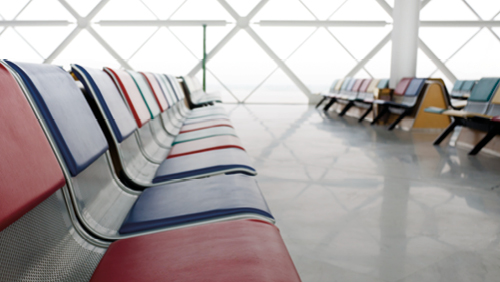 Organizers
Organizers
Dr. Philip Hanke
nccr – on the move and Department of Public Law, University of Bern
Dr. Stephan Michel
Institute of Law and Economics, Universität Hamburg
Deadline for submission is 15 March 2017.
Education and Careers Officer (50 – 60 %) @ the nccr – on the move
To complete the nccr – on the move Network Office we are searching for an
Education and Careers Officer (50 – 60 %)
The start date will be 1 October 2017 (or as agreed upon). Your main task is to further develop and implement the nccr – on the move’s Education and Training Strategy. In your function as Education Officer, you will draft the regulations of the doctoral program and manage its implementation, and in your function as a Careers Officer, you are the contact person at the Network Office for the NCCR doctoral students and PostDocs.
Full job description including the qualifications required and application details (PDF)
Deadline for application is 31 July 2017.
16 June 2017. Current UK Perspectives on Immigration Policy. Next Public Lecture by Alan Manning @ University of Basel.
Crossing Borders – and Then?
Public Lecture Series of the nccr – on the move. Spring 2017.
With this series of lectures, the nccr – on the move explores the refugee crisis, migration, and their political implications. How do people cross a border today in Europe? Which legal frameworks regulate migration and access to asylum? How effective is the current governance of migration policies? What are the political consequences of migration in host countries? Prominent scholars will address these questions and deepen the international debate on migration and mobility.
 Thursday, 23 February 2017
Thursday, 23 February 2017
18:15 – 19:45, University of Fribourg, Avenue de l’Europe 20, Main Building, MIS 4112 (Saal Jäggi)
Migration, Borders, and the Territoriality of EU Law
Jürgen Bast, Faculty of Law, Justus Liebig University of Giessen
Download the abstract (PDF)
Thursday, 9 March 2017
10:15 – 11:15, University of Lucerne, Frohburgstrasse 3, Room 4.B55
Borderline Decisions – Non-Refoulement at the Border
Guy S. Goodwin-Gill, All Souls College, University of Oxford
Download the abstract (PDF)
The public lecture is part of an international conference on borderline decisions.
Thursday, 23 March 2017
18:15 – 19:45, University of Neuchatel, Rue Abram-Louis-Breguet 1, Moyen Auditoire (Lecture Hall 301)
Measuring Immigration Policies and their Effects
Marc Helbling, Department of Political Science, University of Bamberg
Download the abstract (PDF)
Thursday, 6 April 2017
16:30 – 18:00, University of Lausanne, Rue de la Mouline 28, 1022 Chavannes-près-Renens, Bâtiment IDHEAP, Aula
Welfare Attitudes in Diverse Societies
Wim van Oorschot, Department of Sociology, Leuven University
Download the abstract (PDF)
Thursday, 27 April 2017
10:00 – 12:00, University of Neuchatel, Espace Louis-Agassiz 1, Room RS38
Semantic Contact: Migrants Encountering the Representations of Host Communities
Alex Gillespie, Department of Psychological and Behavioural Science, London School of Economics and Political Science
Download the abstract (PDF)
Friday, 2 June 2017
18:15 – 19:45, University of Bern, UniS, Schanzeneckstrasse 1, Room A 022
Death at Sea and Non-Access to Asylum: Distorting Governance Gaps through the Co-Option of Human Rights
Violeta Moreno-Lax, School of Law, Queen Mary University of London
Download the abstract (PDF)
Friday, 16 June 2017
17:00 – 18:30, University of Basel, Peter Merian-Weg 6, Auditorium
Current UK Perspectives on Immigration Policy
Alan Manning, London School of Economics
Download the abstract (PDF)
Download the program flyer (PDF)
29 – 30 May 2017. Causes and Consequences of Highly-Skilled Migrants in the Labor Market.
International Workshop
Causes and Consequences of Highly-Skilled Migrants in the Labor Market
nccr – on the move and NCCR LIVES
29 – 30 May 2017
University of Geneva, Uni Mail, Bd du Pont-d’Arve 40
This workshop is public and free. For organizational reasons, please send an email to Marco Pecoraro if you want to join.

Highly-skilled migration and the international mobility of talent is a major issue in a globalized world. Most studies in the literature focus on the economic evaluation of gains and losses due to the brain drain (human capital emigration) from developing to developed countries. One of them is the phenomenon of brain waste according to which migrant workers underutilize their education and skills in the host labor market. Another topic of interest refers to the host labor market effects of immigration. In parallel, a growing number of studies have stressed the role of skilled migration in generating benefits for destination countries. Finally, a new trend in the literature analyzes the effects of high-skilled immigration taking the perspective of firms.
This workshop on the highly-skilled migration aims at assembling the best and most recent contributions of empirical research active in the fields of economics, sociology and demography to discuss approaches across disciplinary boundaries and benefit from cross-fertilization.
The workshop is part of the IMISCOE research initiative on highly-skilled migrants and brain waste.
Filmreihe zu Migration «On the Mov(i)e»
Der «nccr – on the move» ist Sponsor der Filmreihe zu Migration «On the Mov(i)e», die vom Swiss Network of young Migration Scholars SNyMS organisiert wird.
Cinématte Bern
Montag, 3. April 2017, 19.30
lo sto con la sposa
Anschliessend Diskussion mit Constantin Hruschka, Schweizerische Flüchtlingshilfe, und Simon Sontowski, Universität Zürich.
(Rückblick auf Englisch)
Montag, 22. Mai 2017, 19.30
Drachenfutter
Anschliessend Diskussion mit Daniel Auer, nccr – on the move, und Harika Yilmaz, Autonome Schule Zürich
Donnerstag, 8. Juni 2017, 19.30
Der Wille zum Mitgestalten
Anschliessend Diskussion mit Stefanie Kurt, nccr – on the move, und Hasim Sancar, Grüne Kanton Bern
Io sto con la sposa: First screening of “on the mov(i)e”
Donnerstag, 21. September 2017, 19.30
Raving Iran – ein Film von Susanne Regina Meures
Anschliessend Diskussion mit DJ Biru, Musiker und Mitglied des Duos «Roundtable Knights», und Christin Achermann, Professorin für Migration, Recht und Gesellschaft, Universität Neuenburg sowie Projektleiterin am «nccr – on the move».
Montag, 30. Oktober 2017, 19.30
L’Escale – ein Film von Kaveh Bakhtiari
Anschliessend Diskussion mit Kaveh Bakhtiari, Regisseur, und Margarite Zoeteweij, PostDoc in europäischem Migrationsrecht am «nccr – on the move».
Io sto con la sposa: First screening of “on the mov(i)e”
The first screening of “on the mov(i)e – a film series on migration” took place at the CinéMatte on 3 April 2017. The Italian film “Io sto con la sposa” triggered a passionate discussion with Simon Sontowski and Constantin Hruschka.
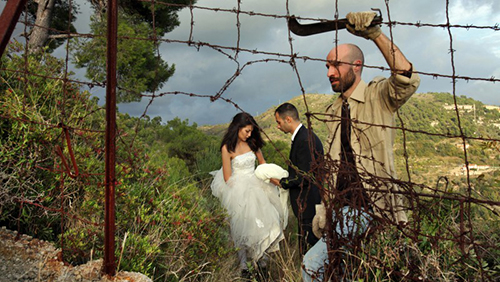 by Marco Garofalo © GINA Films
by Marco Garofalo © GINA Films
More than 40 people attended the film evening at the movie theater “CinéMatte” in Bern to see “Io sto con la sposa”, an Italian film, which addresses the topic of migration control in an original and critical way. The film was born out of an encounter of the filmmakers with five refugees in Italy. The filmmakers decided to help them complete their journey to Sweden – and hopefully avoid getting themselves arrested as traffickers – by faking a wedding. The film was well received by the audience who accompanied this highly emotionally charged journey through Europe. It also triggered very interesting discussions with the two experts who were invited: Simon Sontowski, doctoral candidate in human geography at the University of Zurich and volunteer at “Alarmphone Schweiz”, and Constantin Hruschka, Head of Protection at the Swiss Refugee Council. Their contributions were extremely valuable as they helped the audience understand the legal framework and the socio-political context in which the film plays. They further raised some critical points regarding the European border regime and asylum system.

© Tiphaine Robert, SNyMS
“On the mov(i)e” is a film series organized by the Swiss Network of young Migration Scholars (SNyMS) and financed by the nccr – on the move. By screening various films dealing with the topic of migration in varying ways, the network aims at informing and engaging a non-academic public in an active discussion on migration-related issues. The next screening will take place on Monday, 22 May 2017 at the CinéMatte Bern. We will see “Drachenfutter”, a 1987 West German film, which will enable us to discuss about the economic and social integration of asylum seekers together with our experts, Harika Yilmaz (Autonome Schule Zürich) and Daniel Auer (nccr – on the move, University of Lausanne). You are very welcome to join us!
Laura Rezzonico, doctoral student on the project Restricting immigration: practices, experiences and resistance
The nccr – on the move at the 2017 EUI’s State of the Union conference on “Building a People’s Europe”
The State of the Union conference is a reference point in the EU agenda for policy-makers, civil society representatives, business and opinion leaders, as well as academics. Over the years, Presidents, Prime Ministers, Foreign Ministers, the President of the European Commission, and the President of the European Parliament have taken part in the event.
European Citizenship – Facts & Figures
The nccr – on the move was not only one of the supporting partners of the event, the center has also collaborated with the Global Citizenship Observatory and GlobalStat Database at the EUI’s Robert Schuman Centre for Advanced Studies to create visualizations of facts and figures on citizenship, political participation and immigration within the EU.
Access to Citizenship and Political Participation
You can find more information on the State of the Union website or in the flyer (PDF).
8 mai 2017. Conférence-débat. L’accueil des jeunes réfugié·e·s en Suisse: état des lieux et réflexions pour le futur
Lundi 8 mai, 12h15 – 13h45
Université de Neuchâtel, avenue du 1er-Mars 26, Salle B32
Conférence-débat organisée par le Swiss Network for International Studies SNIS, le «nccr – on the move» et l’Université de Neuchâtel
Des dizaines de milliers de migrant·e·s fuyant des conflits ont trouvé refuge en Europe au cours des dernières années, dont un grand nombre de jeunes et des mineur·e·s non-accompagné·e·s. Quelles sont les politiques d’accueil et d’intégration menées en Europe, et en Suisse en particulier. Comment accueillir les jeunes dans une perspective d’avenir ? Quelles sont les actions au niveau local et les initiatives citoyennes qui contribuent au dialogue entre la population et les personnes nouvellement arrivées.
Intervenantes: Denise EFIONAYI-MÄDER, Vice-Directrice du Forum suisse pour l’étude des migrations et de la population (SFM), Université de Neuchâtel; Katrina LOURIE, Programme Officer, Intergovernmental Consultations on Migration, Asylum and Refugees (IGC), Genève; Céline MAYE, Déléguée à l’intégration et cheffe du Service de la cohésion multiculturelle (COSM) du Canton de Neuchâtel; et Melete SOLOMON-KUFLOM, Fondatrice et Membre du Comité, Association de Médiatrices Interculturelles (AMIC), Genève.
Modération: Prof. Gianni D’AMATO, directeur du «nccr – on the move», Université de Neuchâtel
accès libre – inscription par e-mail à: communication@snis.ch
Brown Bag Lunch Seminar: sandwiches à disposition des personnes inscrites
Call for Visiting Fellows. Fall Term 2017.
Outgoing and Incoming Short-Term Visiting Fellowships
The nccr – on the move wants to encourage the network members to link up with research teams abroad. For this purpose it is setting up short-term visiting fellowship schemes which can be used for both incoming and outgoing fellows.
The “outgoing” fellowship scheme is aimed at nccr – on the move PostDocs and doctoral students who wish to go abroad for a maximum of five months. The “incoming” fellowship scheme can be used to host senior (PostDoc) and junior (PreDoc) researchers from abroad who wish to collaborate with nccr – on the move researchers in Switzerland for a duration of two to three months.
Full call including eligibility and application procedure (PDF)
Deadline for application is 25 April 2017.

nccr – on the move Summer school 2017. Monday, 21 August to Friday, 25 August 2017. University of Fribourg.
Call for Applications.
People on the Move in an Evolving Europe. EU Law and Policy on Mobility, Migration and Asylum.
The freedom of movement and residence for persons is one of the cornerstones of the European Union. However, it is not an uncontested principle – as recent events have clearly shown. Added to this is a growing concern regarding migratory movements of Third Country Nationals to Member States of the European Union: either as labor migrants, in the form of family reunification, or as applicants for international protection. The EU and its Member States currently face the challenge of having to find a way forward within the legal and political frameworks existing in Europe. This year’s summer school aims at adressing this challenge from different perspectives.
Extended deadline for application is 26 April 2017.
More on the summer school by the nccr – on the move.
Stelle für eine(n) Wissenschaftliche(n) Assistentin oder Assistenten in Politischer Ökonomie an der Universität Basel
Professur Politische Ökonomie an der Wirtschaftswissenschaftlichen Fakultät der Universität Basel
Wir bieten Ihnen die Möglichkeit, in einem auf angewandte wissenschaftliche Forschung ausgerichteten internationalen Umfeld sowie im Netzwerk des nccr – on the move im Projekt The Economic Impact of New Migration and Integration Issues eine Dissertation im Bereich Politische Ökonomie und Migration zu verfassen.
Bewerbung bis 2. April 2017 per Email an Prof. Dr. Alois Stutzer.
23 – 24 March 2017. Conference on Discrimination in the Context of Migration and Mobility at the University of Neuchatel.
Conference
Interdisciplinary Perspectives on Discrimination in the Context of Migration and Mobility
University of Neuchatel, Main Building, Avenue du 1er-Mars 26, Rooms C43 and C56
This two-day conference aims to initiate an interdisciplinary exchange, which unpacks the implications of commonalities and ambiguities in understandings and uses of the notion of discrimination. The event brings together researchers from different academic disciplines to discuss the meaning and use of discrimination as a concept. It will also shed light on different methods employed to study discrimination “on the ground”.
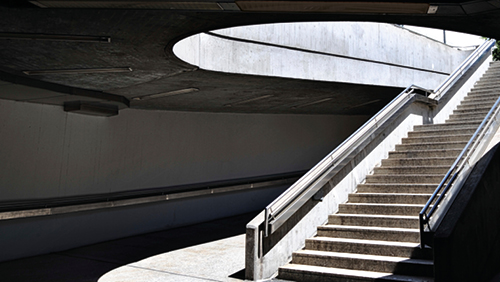
Various levels of analysis will be considered, including institutional discrimination, discrimination in interpersonal interaction and intergroup settings, and discrimination at the level of public representation. The aim is to create the basis for a more comprehensive understanding of discrimination across disciplines, including, but not limited to, Economics, Legal Studies, Social Sciences and Philosophy. The conference combines the discussion of different understandings and methodological approaches to discrimination with case studies of ethnic and racial, religious and gender discrimination.
The conference is organized in the framework of the nccr – on the move. We invite interested students and scholars to join the conference as non-presenting audience. Places are limited and will be allocated on a “first come, first served” basis. Registration fees are CHF 25 for students and PhD candidates and CHF 50 for PostDocs and senior scholars. Please e-mail Eva Zschirnt to register for the event.
New Cititzenship Databases Available
The nccr – on the move has developed two databases and made them available freely for non-commercial use by the general public.
The Repository on Citizenship Law in Switzerland offers the first comprehensive, open-access and user-friendly repository of past and current legal documents on citizenship in Switzerland, at the federal level and in the 26 cantons.
The Dataset on Migration Referendums and Initiatives compiles all 42 referendums and popular initiatives on migration related issues that took place at the federal level in Switzerland between 1848 and 2016, the list and details of which can be found on the website of the Federal administration.
Responsible for these databases were Stefanie Kurt and Jean-Thomas Arrighi and the project “Unity and Diversity in Cohesion: Immigration, Citizenship and Federalism” by Gianni D’Amato.

Borderline Decisions. International Conference @ University of Lucerne on 9 March 2017.
International Conference
Borderline Decisions
University of Lucerne
See the conference program (PDF)

The second public lecture of the nccr – on the move spring 2017 series “Crossing Borders – and Then?” is embedded in this international conference.
Thursday, 9 March 2017, 10:15 – 11:15 h
University of Lucerne, Frohburgstrasse 3, Room 4.B55
Borderline Decisions – Non-Refoulement at the Border
Guy S. Goodwin-Gill, All Souls College, University of Oxford
9 – 10 February 2017. Workshop on Cross-Border Marriages at the University of Neuchatel
Interdisciplinary Workshop
Cross-Border Marriages: Intersecting Boundaries in Transnational Social Spaces
9 – 10 February 2017, University of Neuchatel
Faculty of Arts and Social Sciences
Espace Louis-Agassiz 1, Room R.E.46
Marriage is one of those practices that increasingly occur in transnational spaces. For the past few years, there has been a growing interest among social scientists to analyze the motivations, practices and constraints inherent in this form of transnationalization. At the same time, cross-border marriage has become an important topic in immigration countries, particularly when it involves migrants from non-European countries. This workshop discusses cross-border marriages in the light of the social and symbolic boundaries that are built upon, contested, produced or maintained.
Please send an e-mail to Joelle Moret to register for the event.

Neuchatel Graduate Conference of Migration and Mobility Studies
University of Neuchatel, 22–23 June 2017
Call for Papers and Panels.
Deadline for Submission is 31 January 2017.
The nccr – on the move holds its annual conference 2017 in the format of an international graduate conference targeting young migration and mobility scholars who will present and discuss their work.
Keynote speaker is Wolfgang Streeck, Emeritus director of the Max Planck Institute for the Study of Societies (Cologne).

Call for Papers and Panels
We welcome papers and panels addressing any topic in migration and mobility studies from all related disciplines such as demography, economics, geography, law, political science, sociology, and other relevant fields. Both empirical and theoretical papers will be considered.
Call for Papers and Panels (PDF)
Best Paper Award
The Neuchatel Graduate Conference of Migration and Mobility Studies offers a prize of CHF 500 for the best paper to be submitted and presented at the conference.
Table ronde d’expert⋅e⋅s « D’un statut provisoire à un statut durable. L’intégration des personnes relevant du domaine de l’asile »
Une des responsabilités d’un Pôle national de recherche tel que le « nccr – on the move » est d’initier et de stimuler un dialogue entre recherche et pratique. La première table ronde d’expert⋅e⋅s organisée à Berne le 12 décembre 2016 s’inscrit dans cette volonté d’ouvrir le débat. Le thème choisi, celui de l’intégration des personnes relevant du domaine de l’asile, a suscité un grand intérêt, quelque 60 participant⋅e⋅s ayant répondu présent⋅e⋅s. La journée a ainsi permis la présentation d’analyses économiques, juridiques, démographiques, et de sciences politiques menées au sein du « nccr – on the move », ainsi que leur mise en perspective, parfois critique, toujours constructive, par nos invités représentants de la pratique. Les discussions ont été fournies et constituent la preuve du succès de cette table ronde.
« La politique d’intégration est en mutation ». Gianni D’Amato, directeur du « nccr – on the move », a ouvert la journée sur ces mots, mentionnant les différents chantiers législatifs en cours. La journée entière a démontré comment, dans le domaine de l’asile, la question de l’intégration est complexe, aux confluents de législations et d’intérêts divers, et de pratiques peu unifiées.
La matinée a été consacrée aux défis et opportunités liés aux procédures d’asile. La présentation de Dominik Hangartner a d’abord montré, à partir de données quantitatives, les effets positifs d’une procédure d’asile rapide sur l’intégration professionnelle des personnes au bénéfice d’une admission provisoire. La prise en compte des compétences linguistiques des individus dans leur attribution aux cantons constitue également un facteur positif : les personnes provenant de pays africains francophones voient pratiquement leur probabilité de trouver un emploi doubler dans les cantons romands. Teresia Gordzielik a ensuite proposé une analyse juridique des prestations sociales accordées aux demandeuses et demandeurs d’asile, mettant en lumière deux tendances liées. D’un côté le démantèlement des prestations accordées, censées garantir aux personnes des droits humains de base ; de l’autre la part croissante des éléments de contrôle dans ces mêmes prestations. La chercheuse suggère que la Confédération mette en place des conditions-cadres pour éviter les inégalités cantonales dans ce domaine et « apporter de la lumière dans une jungle caractérisée par l’arbitraire ». Les résultats de recherche présentés par Veronica Preotu Petrencu, enfin, établissent un lien de causalité entre l’exposition à la violence (guerre et génocides) pendant l’enfance et le risque de comportements criminels parmi les requérant⋅e⋅s d’asile en Suisse. La chercheuse met cependant en lumière les effets positifs à cet égard de certaines politiques, en particulier celles qui promeuvent l’intégration de ces personnes en facilitant leur accès au marché du travail ou en leur offrant des perspectives durables de rester.
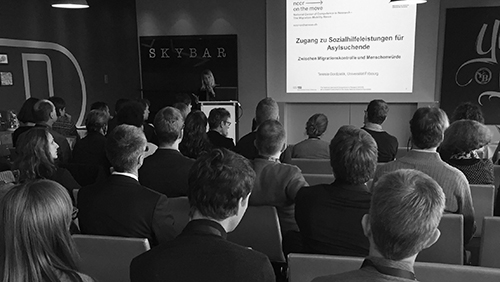
Les présentations et débats de l’après-midi ont quant à eux traité des trajectoires d’intégration des personnes relevant du domaine de l’asile. La présentation de Philippe Wanner a souligné les avantages d’une analyse longitudinale – une méthodologie novatrice – des données quantitatives pour mesurer l’intégration structurelle des personnes du domaine de l’asile. Une telle reconstruction des trajectoires permet de montrer qu’il existe, du moins dans certain cas, un lien entre procédures d’asile rapides et intégration sur le marché du travail. Le chercheur met cependant en garde contre une analyse mono-causale : il est nécessaire de prendre en considération d’autres facteurs explicatifs, qu’ils soient contextuels – notamment les phénomènes de discrimination – ou liées aux caractéristiques des individus, par exemple leur niveau de qualification, leurs réseaux personnels, ou encore leurs compétences linguistiques. Finalement, Stefanie Kurt et Valentin Zuber ont présenté un outil qui sera mis très prochainement à disposition de toute personne intéressée, du domaine de la pratique, du politique, de la recherche ou encore des médias, et qui permet de rendre compte des parcours vers la citoyenneté. Cette base de données exhaustive des bases législatives fédérales et cantonales concernant la naturalisation, les droits politiques, l’intégration et l’accès au permis d’établissement, doit servir, selon les intervenant⋅e⋅s, à « une meilleure compréhension de la manière dont les institutions suisses gèrent les questions migratoires ».
Les remarques des représentants de la pratique invités à commenter les différentes présentations, et les débats que ces commentaires ont lancés, ont été vifs et stimulants. Constantin Hruschka (Organisation suisse d’aide aux réfugiés), Attilio Cometta (Conférence des délégués cantonaux à l’intégration), Adrian Gerber (Secrétariat d’État aux migrations) et Joachim Stern (Haut Commissariat des Nations Unies pour les réfugiés), ont – heureusement pour nous – confirmé la pertinence des résultats présentés de leur point de vue. Ils se sont entre autres accordés sur l’importance de reconnaître les effets négatifs de longues périodes d’incertitude légale et d’un accès limité, voire inexistant, aux mesures d’intégration pour certaines personnes qui sont pourtant appelées à rester. Manquer cette « fenêtre d’intégration » – comme l’a appelée Dominik Hangartner – est néfaste pour les personnes concernées, mais également pour le pays qui les accueille. Joachim Stern a d’ailleurs rappelé que la Suisse était le seul pays à maintenir un statut aussi précaire que celui de l’admission provisoire.
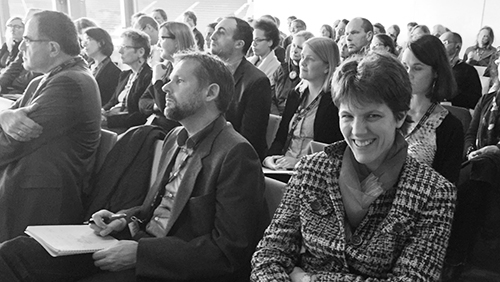
Les effets concrets des différences cantonales pour les personnes concernées, au plan législatif comme à celui de la pratique, ont également suscité de nombreuses réactions de la part des participant⋅e⋅s. Attilio Cometta a entre autres insisté sur l’importance du travail de la Confédération pour garantir une meilleure égalité de traitement. Le public a également mis en avant la nécessité d’échanger sur les bonnes pratiques cantonales dans ce contexte. La base de données créée par les chercheuses et chercheurs du « nccr – on the move » peut contribuer à ces échanges en fournissant une base de discussion solide et complète. D’ailleurs, très concrètement, la table ronde a permis de réaliser la pertinence d’intégrer les bases législatives sur les prestations sociales analysées par Teresia Gordzielik à cette base de données.
Certaines dimensions spécifiques de l’intégration ont encore fait l’objet de débats animés. Plusieurs personnes ont noté la nécessité de différencier les parcours d’intégration, notamment en fonction du genre, de l’origine, du niveau de formation, ou encore de la couleur de peau des individus concernés. Les conditions dans lesquelles ces parcours d’intégration ont lieu constituent également une dimension importante, en particulier en ce qui concerne la reconnaissance des qualifications ou des diplômes, ou encore – aspect largement discuté – les processus de discrimination auxquels sont confrontées les personnes du domaine de l’asile.
Finalement, si tout le monde s’accorde sur la nécessité de continuer la recherche dans ce domaine et de faire connaître les résultats, la manière de le faire reste une question complexe. Selon Constantin Hrushka, alors que la Suisse comme le reste du monde est entrée dans l’ « ère de la post-vérité », il est plus que jamais nécessaire de trouver les moyens pour faire entendre – et comprendre – nos résultats au monde politique. Autre mot-clé de l’année 2016, celui de « bulle de filtrage », utilisé par Adrian Gerber pour souligner l’importance d’initier spécifiquement un dialogue avec les personnes, à tous les niveaux politiques, qui ne sont pas déjà informées de nos résultats.
En guise de conclusion, Gianni D’Amato s’est dit conscient des immenses responsabilités du « nccr – on the move ». La recherche de pointe menée au sein de ce réseau d’excellence suisse doit être reconnue, ses résultats pris en compte au-delà du monde académique. La table ronde d’expert⋅e⋅s organisée à Berne constitue un outil parmi d’autres dans ce but. C’est ensuite aux représentant⋅e⋅s des communes, des cantons, et de la confédération, des organisations non-étatiques ou encore de la société civile de développer des discours, des actions, des pratiques, des politiques et des législations qui s’inspirent de ces résultats. De notre côté, les échanges initiés lors de cette journée nous ont convaincu de la nécessité de poursuivre dans cette voie du dialogue.
Joëlle Moret, Responsable du transfert de connaissances, « nccr – on the move »
The nccr – on the move is searching for a 70% PhD position at the University of Fribourg
To complete her research team, Prof. Sarah Progin-Theuerkauf at the University of Fribourg (Law Faculty, Chair for EU Law and Migration Law) is seeking a candidate for a position as
PhD student (70%)
The successful applicant is expected to collaborate within a project on EU migration law.
Deadline for application is 30 November 2016.
24 – 25 November 2016. Migration and Mobility and its Relation to Social Transformation. Lecture and Workshop at the University of Neuchatel.
Thursday, 24 November 2016, 18:15 h
Opening Public Lecture in French
Pour une sociologie “totale” des phénomènes migratoires
Michel Wieviorka, Fondation Maison des sciences de l’homme (FMSH) and Ecole des Hautes Etudes en Sciences Sociales EHESS, Paris

Friday, 25 November 2016, 09:30 h
Public Workshop
Migration and Mobility and its Relation to Social Transformation
The workshop investigates the Migration-Mobility Nexus to understand the deep transformations of Western Societies. Distinguished international scholars are invited to debate this question with the researchers of the nccr – on the move. On a theoretical level, speakers will question the concepts of migration and mobility, and their impact on the academic and public debate. Empirically, they will address the transformations of increasingly diverse societies, and their political, economic, legal, and societal consequences. The workshop takes a resolutely interdisciplinary perspective and is open to the wider public of the University of Neuchatel and beyond.
Please send an e-mail to Gina Fiore Walder to register for the public workshop. Deadline for registration is 21 November 2016.
Factorial Designs in Recruiter Surveys. Workshop at the University of Bern.
Wednesday, 9 November 2016
University of Bern, Unitobler (Room F-105) and von Roll area (Room B 305)
The workshop aims at an exchange on labor market vignette studies, especially on recruitment and hiring. The focus will be on discussing issues of analyzing experimental vignette study data, embedded in recruiter surveys. Several research groups who currently conduct vignette studies in Switzerland and abroad will use the opportunity to present and discuss their work in progress.
Keynotes
Andreas Damelang (University of Erlangen)
Valentina di Stasio (University of Oxford)
The workshop is organized by Christian Imdorf, NEGOTIATE@University of Basel and Institute of Sociology@University of Bern, together with Flavia Fossati, nccr – on the move, and Daniel Oesch, NCCR LIVES.
3 – 4 November 2016. Workshop on Borders and Boundaries at the University of Neuchatel.
Interdisciplinary Workshop
Revisiting Borders and Boundaries: Gendered Politics and Experiences of Migrant Inclusion and Exclusion
3 – 4 November 2016, University of Neuchatel
Avenue du 1er-Mars 26 (Main Building)
This workshop addresses questions of inclusion and exclusion by bringing together two theoretical approaches, which are in general employed in different fields. One focuses on boundaries and boundary work. The other places borders and bordering practices at its center stage. Additionally, a gender perspective is applied to illuminate the links between borders and boundaries.
Please send an e-mail to Carolin Fischer to register for the event.

Call for new projects for phase II of the nccr – on the move.
The nccr – on the move is seeking to recruit three Switzerland based research teams working on migration and mobility issues for its second four-year cycle (the so-called Phase II), which is scheduled to run from 1 June 2018 to 31 May 2022.
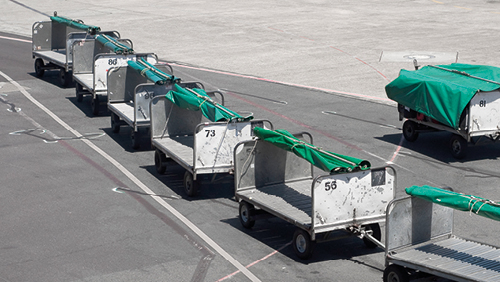
To be eligible for funding, project proposals should address research questions related to the migration-mobility nexus. The future research agenda of the nccr – on the move will be organized in one transversal research module (“Social Transformations”) and three thematic research modules. These are “Citizenship, Social Cohesion and Democracy”, “Shadows of Mobilities”, and “Transnational Mobilities and Complex Diversities”. We are launching a call for three projects.
Shadows of Mobilities
Call 1: A project investigating flows and skills: migration and inequality (international level)
Call 2: A project investigating the multifaceted crisis in immigration countries (domestic level)
Transnational Mobilities and Complex Diversities
Call 3: A project investigating regulation of mobilities
Full call including basic conditions as well as application and selection procedure (PDF)
Deadline for application is 31 October 2016.
The nccr – on the move is searching for a 50% PostDoc position at the University of Neuchatel
To complete research within the NCCR project Gender as Boundary Marker in Migration and Mobility the nccr – on the move is seeking to hire a
Post-Doc (50%)
for the duration of 18 months, starting 1 December 2016 (or by appointment).
The successful applicant will contribute to an ongoing research project titled “[En]countering everyday otherness: Gendered responses to boundaries among second-generation migrants”. Using qualitative methods and adopting a gender perspective, the study examines how experiences of otherness are interpreted, appropriated and modified by second-generation migrants in their everyday lives.
Deadline for application is 31 October 2016.
Mobilität – der Weg zum Erfolg? Ein Rückblick.
Dieser weit gefassten Frage – die der Komplexität und Vielfältigkeit des Themenfeldes von Mobilität und Migration Rechnung trägt – widmete sich eine Abendveranstaltung der Schweizerischen Gesellschaft für Volkskunde (SGV) am 27. September 2016. Gemeinsam mit ausgewählten ReferentInnen des Seminars für Kulturwissenschaft und Europäische Ethnologie der Universität Basel und eingeladenen ExpertInnen wurden die Themen Mobilität und Migration einem breiten Publikum vorgestellt.
In spannenden Kurzvorträgen erörterten die ReferentInnen die Frage mithilfe von Praxisbeispielen aus der kulturwissenschaftlichen Forschung und anhand von individuellen biographischen Erfahrungen aus dem Alltag von Betroffenen. Zugleich wurden die Erkenntnisse mit wissenschaftlichen Konzepten untermauert. Mehrere thematische Diskussionsblöcke mit eingeladenen Podiumsgästen aus der öffentlichen Verwaltung des Kantons Basel-Stadt, der Universität Basel und der Expat-Freiwilligenarbeit ergänzten die Vorträgen und gaben ihnen einen abwechslungsreichen Rahmen. Die Veranstaltung mündete in einem offenen und vielstimmigen Austausch mit den sehr interessierten ZuhörerInnen, der beim anschliessenden Apéro in einzelnen Grüppchen angeregt weitergeführt wurde.
Zweifelsohne ist der Alltag einer Vielzahl von Menschen, gerade auch von höher qualifizierten Personen, beinahe in selbstverständlicher Weise von Mobilität und Migration – im beruflichen und privaten Kontext – geprägt. Zentrale erfolgsbegünstigende Aspekte in diesem Zusammenhang sind Möglichkeiten nutzen, Chancen wahrnehmen und Flexibilität zeigen zu können. Auf der persönlichen Ebene ist dies zum Beispiel eng verbunden mit individuellen Wünschen und Entscheidungen. Zugleich nehmen aber auch die Anforderungen von Unternehmen und Universitäten, die eigene Familie sowie politische und wirtschaftlichen Rahmenbedingungen Einfluss. Es gilt, diese allesamt mit den persönlichen Bedürfnissen in einen alltagspraktikablen Einklang zu bringen.
Hélène Oberlé verdeutlichte anhand ihrer individuellen beruflichen und persönlichen Mobilitätsbiografie exemplarisch, wie lokales Leben und Sich-Wohlfühlen vor Ort bei gleichzeitigen globalen beruflichen und familiären Beziehungen von ihr gelebt und erlebt wird. In einem zweiten Vortrag stellte sie basierend auf den Erkenntnissen ihrer Forschung zu hochqualifizierten Angestellten, die aus Israel in die Schweiz migrieren, mögliche Beweggründe für die Mobilität dieses Personenkreises dar. Unter Einbezug des Konzepts der Motilität zeigte sie auf, welche Herausforderungen für die mobilen AkteurInnen damit einhergehen und welche, meist persönlichen Faktoren zu einer erfolgreichen Mobilität im Wesentlichen beitragen können.
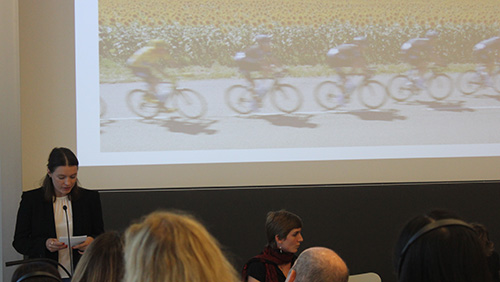
Hélène Oberlé (stehend) und Laure Sandoz (sitzend)
Anschliessend beschäftigte sich Laure Sandoz in ihrem Vortrag (aus der Makroperspektive) mit verschiedenen Gruppen von AkteurInnen, die ein besonderes Interesse an Mobilität haben. In Verbindung mit ausgewählten persönlichen Sichtweisen einzelner dieser AkteurInnen gelang es ihr, zugleich auf individueller Ebene zu verdeutlichen, welche beruflichen und privaten Motivationen zu Mobilität führen können und inwieweit diese, durch herrschende Mobilitätsregime auf der alltäglichen Handlungsebene direkt beeinflusst und geformt werden. Dr. des. Katrin Sontag brach in ihrer Präsentation die klassische und weit verbreitete dichotome Konzeption von Orten und Räumen auf und zeigte, dass diese vielmehr als transnationale soziale Räume aus der Perspektive der mobilen und migrierenden AkteurInnen individuell betrachtet werden müssen.
Im Rahmen der Podiumsdiskussion gab Dr. Patrick Koch, Projektleiter und wissenschaftlicher Mitarbeiter der Fachstelle Diversität und Integration der Kantons- und Stadtentwicklung Basel-Stadt, einen interessanten Einblick in die strategische Ausrichtung der Arbeit der kantonalen Verwaltung. Im Mittelpunkt der Strategie steht für die Fachstelle das Ziel, die Stadt hinsichtlich ihrer Lebensqualität – z.B. in Fragen der Sicherheit und einer ausgewogenen kulturellen Durchmischung der Wohnquartiere – und ihrer ökonomischen Attraktivität anziehend zu gestalten. Dies sowohl für etablierte und neu zuziehende EinwohnerInnen als auch für die vor Ort angesiedelten Unternehmen.
Die Leiterin des Welcome Center der Universität Basel, Dr. Tanja Popovic, berichtete als Podiumsgast einprägsam und mithilfe von anschaulichen Praxisbeispielen über ihre vielfältige Arbeit. Als Ansiedlungsmanagerin steht sie für Studierende, Forschende und Dozierende sowie deren Angehörige und Nachziehende in nahezu allen Fragen – gleichermassen administrativen, beruflichen wie auch privaten – mit Rat und Tat unterstützend zur Seite. Individuell auf die jeweiligen Bedürfnisse der Personen zugeschnittene Beratung erleichtert den NewcomerInnen den Start in Basel sowohl beruflich wie auch persönlich.
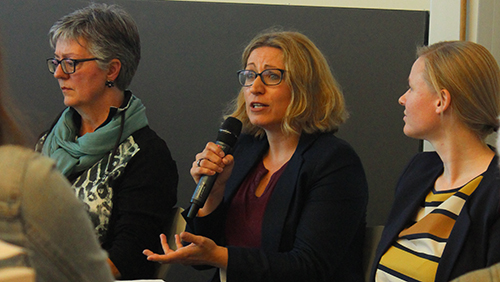
Von links: Lorraine Rytz-Thériault, Tanja Popovic und Katrin Sontag
Ebenso konnte Lorraine Rytz-Thériault durch ihre langjährige Erfahrung als Community Organizer spannende emphatische Einblicke in die Expat-Freiwilligenarbeit geben. Diese Einblicke liessen vor allem auch die emotionale Dimension von Mobilität und Migration aus Sicht der Betroffenen und deren grosse Bedeutung für ein erfolgreiches Gelingen augenscheinlich werden.
Am offiziellen Ende der Veranstaltung stand eine lebhafte Diskussion mit allen Beteiligten und dem gesamten Publikum. Dr. Sabine Eggmann, die Moderatorin des Abends, nutzte die Diskussion zugleich für eine Zusammenfassung des Abends, der schlussendlich bei einem gemütlichen Apéro ausklang: eine weitere Möglichkeit, sich in angenehmer Atmosphäre intensiv auszutauschen. Für den rundum gelungenen Abend möchten wir an dieser Stelle allen Anwesenden nochmals herzlichst danken!
Thomas Heid, Doktorand an der LMU München
Die gut besuchte Veranstaltung wurde gemeinsam mit dem Nationalen Forschungsschwerpunkt «nccr – on the move» und der Schweizerischen Akademie der Geistes- und Sozialwissenschaften (SAGW) organisiert. Dank deren Unterstützung konnte die zweisprachig abgehaltene Veranstaltung durchgängig simultan in Englisch und Deutsch übersetzt werden.
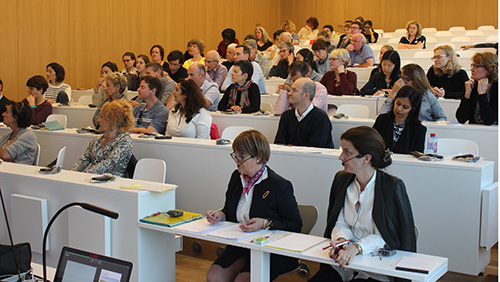
Die zwei Übersetzerinnen im Vordergrund
Call for Papers. Interdisciplinary Perspectives on Discrimination in the Context of Migration and Mobility.
Two-day conference to be held in Neuchatel, 23–24 March 2017
The notion of discrimination is widely discussed in the context of migration and mobility. However, definitions and understandings of discrimination vary as do methods used to identify or measure discrimination. While legal scholars draw on narrow definitions social scientists or economists tend to employ a broader understanding of discrimination. Varying meanings and applications of the term discrimination can lead to misunderstandings and parallel debates.
Keynote Speakers
Prof. Doris Weichselbaumer
Institut für Frauen- und Geschlechterforschung, Johannes Keppler Universität Linz
Prof. Marie Mercat-Bruns
Sciences Po Law School, Paris
The conference addresses researchers with a strong interest in interdisciplinary work. We invite submissions focusing on ethnic and racial, religious and gender discrimination in contexts of migration and mobility.
Deadline for submission of abstracts is 30 October 2016.

International Student Migration and Mobility: Policy Perspectives. An Epilog.
On 13–14 October 2016, an international workshop entitled “International Student Migration and Mobility: Policy Perspectives” took place at the University of Neuchatel (Switzerland). It was jointly organized by members of the nccr – on the move and members of the IMISCOE research cluster on international student mobility. The workshop had three aims. First, to advance our understanding of the relationship between international student mobility (ISM) and mobility policies, a topic so far neglected in the migration literature. Second, to prepare papers for a special issue publication on international students and policies of mobility. Third, to consolidate an emerging international network of researchers gathered by the IMISCOE research cluster on international student migration and mobility.
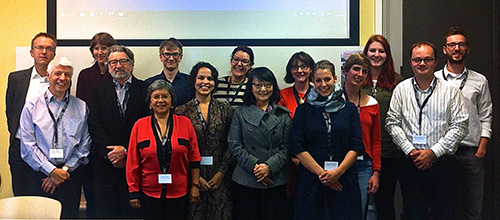
Participants came from European, Australian, and Chinese universities and included the following (from left to right in the above photo): Etienne Piguet, nccr – on the move, University of Neuchatel (Switzerland), Allan Findlay, University of St. Andrews (UK), Alexandra Stamm, FORS (Switzerland), Greg McCarthy, Peking University (China), Yvonne Riaño, nccr – on the move, University of Neuchatel (Switzerland), Christof van Mol, Netherlands Interdisciplinary Demographic Institute (NIDI) (Netherlands), Thais França, University of Minho (Portugal), Xianlin Song, University of Western Australia (Australia), Elisa Alves University of Lisbon (Portugal), Sylvie Lomer, Manchester University (UK), Annique Lombard, nccr – on the move, University of Neuchatel (Switzerland), Laure Sandoz, nccr – on the move, University of Basel (Switzerland), Sinéad O’Connor, University College Cork (Ireland), James Hampshire, University of Sussex (UK), and Daan Huberts, EP-Nuffic, The organization for internationalization in education (Netherlands).
The format of the workshop was designed to allow maximum scientific exchange. Each presenter was allocated 45′ time to speak as well as to receive feedback from a discussant and from the workshop participants. A first keynote by James Hampshire (Sussex University) introduced current theoretical approaches to examine immigration policies. A second keynote by Allan Findlay (University of St. Andrews) introduced current approaches to understanding international student mobility. Workshop participants presented papers, which examined immigration policies, government programs and university strategies in eight different countries including Australia, France, Great Britain, Ireland, the Netherlands, Portugal, Spain, and Switzerland.
The workshop format was very successful. Participants intensely exchanged their ideas over two days. In their opinion, they were able to expand their understanding between international student mobility (ISM) and policies of mobility, as well as to receive constructive comments for their papers. They will now improve their papers and – on the basis of a second round of constructive comments – the best contributions will be submitted in early 2017 for a special issue publication in a peer-reviewed journal.
The social event at the restaurant “Max et Meuron” in Neuchatel allowed participants to get to know each other in an informal context and to enjoy wonderful Swiss food and wine!
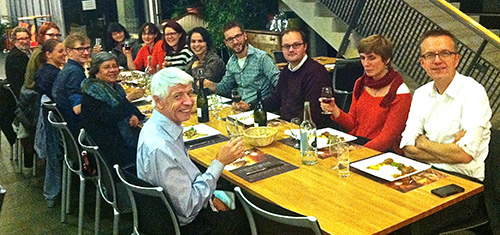
Local organizing committee
Yvonne Riaño, Etienne Piguet, and Annique Lombard
nccr – on the move
International organizing committee
Yvonne Riaño (Switzerland), Christof van Mol (Netherlands), and Parvati Raghuram (UK)
IMISCOE research cluster “International student migration and mobility”
Instrumental Citizenship: A Normative-cum-Empirical Inquiry. Public Lecture at the University of Neuchatel by Christian Joppke, University of Bern.
University of Neuchatel
Thursday, 13 October 2016
Prof. Christian Joppke
Director of the Institute of Sociology and Chair in General Sociology, University of Bern
14:15 – 15:45 h
University of Neuchatel, Faculty of Humanities, 2000 Neuchatel, Faubourg de l‘Hôpital 61–63, Institut de langue et civilisation françaises, Room B5
 Instrumentalism is the heart of an inevitable lightening of citizenship in liberal societies. In his lecture, Christian Joppke discusses and compares three cases of instrumentalism: the selling of citizenship, expanding provisions of external citizenship, and the evolving European Union citizenship as a citizenship without duties.
Instrumentalism is the heart of an inevitable lightening of citizenship in liberal societies. In his lecture, Christian Joppke discusses and compares three cases of instrumentalism: the selling of citizenship, expanding provisions of external citizenship, and the evolving European Union citizenship as a citizenship without duties.
See full abstract and CV (PDF)
International Workshop on International Student Migration and Mobility: Policy Perspectives, 13–14 October, 2016, University of Neuchatel
Mobilität – der Weg zum Erfolg? Mobility – the way to success?
27. September 2016
18.15 – 19.45 Uhr, mit anschliessendem Apéro
Seminar für Kulturwissenschaft und Europäische Ethnologie
Alte Univeristät, Rheinsprung 9, 4051 Basel
Mobilität und Migration gehören heute zum beruflichen und privaten Alltag vieler Menschen. Möglichkeiten nutzen, Chancen wahrnehmen und Flexibilität zeigen, sind wesentliche Aspekte, die mit Mobilität und Migration gerade auch von höher qualifizierten Menschen verknüpft werden. Es geht dabei allerdings nicht nur um individuelle Wünsche und Entscheidungen, sondern es gilt auch, Anforderungen von Unternehmen, Universitäten, der eigenen Familie, sowie politische und wirtschaftliche Rahmenbedingungen unter einen Hut zu bringen.
Die Podiumsdiskussion findet im Rahmen der Veranstaltungsreihe «La Suisse existe – La Suisse n’existe pas» der Schweizerischen Akademie der Geistes- und Sozialwissenschaften (SAGW) statt. Vorträge und Diskussionen auf Englisch und Deutsch (Simultanübersetzung).
(English text see below)
Weitere Informationen und Anmeldung

Mobility – the way to success?
Many people today are mobile and migrate for both their professional and private lives. Seizing opportunities, taking chances, and showing flexibility are characteristics associated with highly qualified workers who choose to relocate. Relevant considerations for those contemplating relocation include career and educational outlooks for both themselves and family, political and economic conditions, and idiosyncratic preferences.
The panel discussion is part of the lectures series «La Suisse existe – La Suisse n’existe pas», organized by the Swiss Academy of Humanities and Social Sciences (SHAS). Lectures and discussions in German and English (simultaneous translations).
More information and registration
Wednesday, 14 September 2016, University of Basel. Public lecture by Karen O’Reilly.
Postcolonial Traces in Elite Migration.
Prof. Karen O’Reilly
Loughborough University and University of Oxford
Discussant: Dr. Olivia Killias, University of Zurich
Wednesday, 14 September 2016. 18:15 – 19:45 h
Kollegienhaus of the University of Basel, 4051 Basel, Petersplatz 1, Lecture Hall 115
This lecture is co-organized by the Institute of Cultural Anthropology and European Ethnology at the University of Basel and the nccr – on the move.

In this lecture, Karen O‘Reilly will introduce her recent work on British (and other Western) lifestyle migration in Malaysia, which is part of a wider, comparative study of lifestyle migration in East Asia. The lecture will focus on postcolonial traces (or continuities) in this form of migration – as witnessed in capitals, resources, power, and other structural forms of advantage, as well as in everyday lives practices of migrants and other actors in the migrant setting. …
See full abstract and CV (PDF)
Student Workshop “Addressing Privilege in (Skilled) Migration”
In the afternoon, from 14:00 – 16:00 h, the Institute of Cultural Anthropology and European Ethnology will host a workshop with Karen O’Reilly. Interested Master and doctoral students and Postdoctoral researchers shall contact Metka Hercog by E-mail until 1 September 2016. Location: Alte Universität, Rheinsprung 9/11, 4051 Basel, Seminarraum 201.
nccr – on the move Summer school 2016. Monday, 22 August to Friday, 26 August 2016. University of Neuchatel.
Call for Applications.
Measuring Discrimination.
This year’s summer school aims at addressing methodological questions and challenges connected with measuring discrimination of minorities at large. Particular emphasis will be placed on methods such as correspondence testing, factorial survey experiments, implicit association tests and surveys.
Deadline for application is 15 March 2016.
More on the summer school by the nccr – on the move.
Call for Visiting Fellows. Spring Term 2017.
Outgoing and Incoming Short-Term Visiting Fellowships
The nccr – on the move wants to encourage the network members to link up with research teams abroad. For this purpose it is setting up short-term visiting fellowship schemes which can be used for both incoming and outgoing fellows.
The “outgoing” fellowship scheme is aimed at nccr – on the move PostDocs who wish to go abroad for a period of two or three months. The “incoming” fellowship scheme can be used to host senior (PostDoc) and junior (PreDoc) researchers from abroad who wish to collaborate with nccr – on the move researchers in Switzerland for a duration of two to three months.
Full call including eligibility and application procedure (PDF)
Deadline for application is postponed to 15 October 2016.

2nd Annual Conference of the nccr – on the move. An Epilog.
Changing Realities of Migration and Mobility. A Swiss Perspective.
University of Neuchatel, 23 – 24 June 2016
During two wonderful summer days at Lake Neuchatel, some 120 migration and mobility scholars got together to map the changing Swiss realities of migration and mobility within the wider European context – as well as the interdisciplinary research on it. To do so, 15 scholars convened in-depth workshops for which they invited fellow researchers and international discussants. The conference assembled research groups on topics as different as movement to and through Switzerland (Jana Häberlein/Simon Sontowski), immigration in federal States (Jean-Thomas Arrighi), discrimination in labor markets (Rosita Fibbi), attitudes towards immigrants (Didier Ruedin), procedural law as new governance of migration (Stefan Schlegel), obstacles to successful labor market integration (Flavia Fossati), ageing in the context of migration (Mihaela Nedelcu), labor market effects of immigration (Andrea Ariu/Tobias Müller), international students mobility (Etienne Piguet/Yvonne Riaño), postmigrant societies in Europe (Kijan Espahangizi), methodological challenges in research on highly skilled migration (Metka Herzog), and politics of asylum and mental health (Laure Kloetzer). All these workshosp discussed aspects of the changing Swiss realities of migration and mobility within the intersecting dynamics of securitization, marketization and human rights.
As a first contextualization of the Swiss case, political scientist and legal scholar Jo Shaw from the University of Edinburgh discussed the consequences of Brexit in the UK – the same day the vote took place. The insightful and passionate keynote made clear, how migration and mobility have become the most contentious issues in the multilevel negotiations between sovereignty of nation states and EU governance. More research is needed to better understand how this renaissance of anti-migration populism and national sovereignty is connected to the growing social inequality in Europe, fueled particularly by the economic crisis of 2008.
“European Migration and Mobility Regimes Reviewed in the Light of the UK Brexit Referendum” by Jo Shaw, Institute for Advanced Studies in the Humanities, University of Edinburgh
The anthropologist Greg Feldman from the Simon Fraser University presented an ethnographic account of the EU migration apparatus, which tries to keep control over the uncertainties of migration and mobility. The apparatus combines, he argued, satellite technology, bureaucratic procedures, and military warfare strategies in order to defend “Fortress Europe” against low-skilled third country nationals – while at the same time coming up with schemes to attract highly skilled professionals from all over the world. His vivid depiction showed the “banality of the evil” in the contemporary European border regime that turns humans into statistics, cartographic spots and biometric information. The keynote also gave insight into the ethical dilemmas that migration and security officers face within this apparatus.
“The Structure of Ethical Dilemmas among Policymakers and Security Officials in Contemporary European Migration Management” by Gregory Feldman, School for International Studies, Simon Fraser University
Both keynotes made it clear that changing realities of migration and mobility can only be understood when embedded in the global and particularly European dynamics of securitization, marketization and human rights order.
In a third plenary session, seven scholars presented a Pecha Kucha on broad variety of topics: data management in migration research (Andréas Perret), “feeling at home” in mobile families (Flavia Cangià, Deborah Levitan), reaction to exclusion among migrants from a gender perspective (Carolin Fischer), the win-win-win situation in the Migration-Development Nexus (Alice Hertzog), the maritime imaginaries and migrants rights in postcolonial Zurich (Rohit Jain), and the work of the “Watch the Med Alarm Phone” (Simon Sontowksi). All presenters managed to combine both explorative arguments and entertainment after a long day of scientific discussions. To be continued….
So, the 2nd annual conference of the nccr – on the move was a success: it assembled a good part of the Swiss field of migration and mobility studies together with international commentators, and it started to map the Swiss realities of migration and mobility against the wider European and global background. Connecting the Swiss scientific and political debates and networks to the international context will be continued in the activities and collaborations of the nccr – on the move and its partners. For certain, the memories of the great atmosphere at this year’s annual conference, including the sunny lunch breaks and the dinner at the Lake of Neuchatel, will help to do so. We are looking forward to the next annual conference, which will take place 22–23 June 2017.
Rohit Jain, Scientific Officer, nccr – on the move
Changing Realities of Migration and Mobility. A Swiss Perspective. 2nd Annual Conference of the nccr – on the move.
Neuchatel, 23 – 24 June 2016
The 2nd Annual Conference of the nccr – on the move offers a platform for discussing the contemporary “turbulence of migration and mobility” from different disciplinary, theoretical and methodological angles. In many ways, Switzerland offers a laboratory for understanding the changing regimes and realities of migration and mobility.
In fact, the Swiss “case” might act as a prism for disentangling these transformations, which are arising as a result of (1) the liberal demand for labor, (2) securitization and anti-immigrant sentiments as well as (3) multilevel governance and human rights discourses. All three have been particularly pronounced in Switzerland.
Call for Workshops and “Pecha Kucha”
Researchers from anthropology, demography, economics, geography, law, political science, sociology and other relevant fields will discuss the intersections and contradictions between the legal orders, societal dynamics and economic drivers underpinning the contemporary realities of migration and mobility.
Workshops
Workshop slots of 2 hours allow for deepening the ongoing discussion among experts of the field. Therefore, it is suggested that the workshops assemble three papers and one discussant to offer enough space for discussion.
Pecha Kucha
The conference will host a Pecha Kucha panel. Pecha Kucha has been proliferating as an entertaining way of discussing scientific projects. It is a PowerPoint performance with 20 slides, which are projected for a fixed duration of 20 seconds each. It is especially suited for presenting “out of the box” and explorative scientific reflections.
Changing Realities of Migration and Mobility. A Swiss Perspective. 2nd Annual Conference. University of Neuchatel, 23 – 24 June 2016.
The 2nd Annual Conference of the nccr – on the move offers a platform for discussing the contemporary “turbulence of migration and mobility” from different disciplinary, theoretical and methodological angles. In many ways, Switzerland offers a laboratory for understanding the changing regimes and realities of migration and mobility.
Program booklet and further information
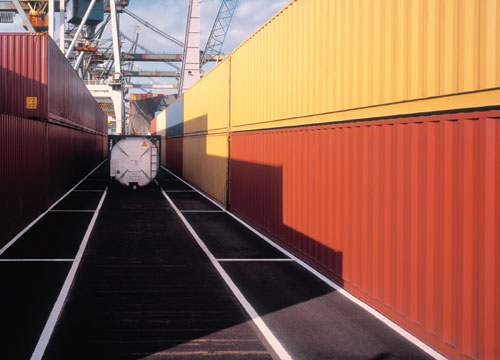
The nccr – on the move is searching for a PostDoc and a Scientific Officer
To complete the nccr – on the move Network Office at the University of Neuchatel we are searching for a
PostDoc (80 – 100%)
who will assist the NCCR Director in the refinement and further development of the nccr – on the move’s research agenda for phase I and II (Job offer as PDF),
and a
Scientific Officer (80%)
whose main task is to promote and facilitate the scientific integration within the nccr – on the move. In this function he or she will develop ideas for joint research activities and interdisciplinary platforms for knowledge exchange. (Job offer as PDF)
The start date for both positions will be 1 October 2016 (or as soon as possible thereafter).
Deadline for applications is 31 July 2016.
Tuesday, 24 May 2016, University of Neuchatel. Public lecture by Andreas Wimmer on immigrant trajectories.
Beyond the Ethnic Lens? Comparing Immigrant Trajectories by Country of Origin, Social Class, and Migration Path.
Prof. Andreas Wimmer
Lieber Professor of Sociology and Political Philosophy, Columbia University, New York
Tuesday, 24 May 2016. 10.00 – 12.00 h
University of Neuchatel, Faculty of Arts, 2000 Neuchatel, Place-Louis-Agassiz 1, Room RN.08
This Lecture is co-organized by the Maison d‘analyse des processus sociaux (MAPS) and the nccr – on the move.

This lecture critically explores one aspect of mainstream migration research: to aggregate individual level data into country-of-origin groups to interpret results. We show that other modes of aggregating individual data, by parents occupation (e.g. peasant versus banker) or by migration path (e.g. refugee versus family reunification), capture differences in integration trajectories of the second generation equally well…
See full abstract and CV (PDF)
Multilayered Governance: Gains for International Migration? An Epilog.
The nccr – on the move and the Institute of Public Law of the University of Bern convened a two-day conference, which took place from 27–28 April 2016 at the University of Bern, Switzerland. The aim was to bring together academics and policy-makers from a wide range of disciplines to evaluate the efficiency gains and legitimacy risks associated with the concept of multi-layered governance in particular when framing migration law & policy-making.
The conference asked under what conditions “layering” is desirable how it could be designed to minimize the risk of particularization and escapism and prevent governance gaps within nested structures. The research question, investigated by all contributors, was whether fragmentation is necessarily negative – or how governance, particularly if multi-layered – could lead to positive outcomes increasing regime competition, policy diffusion and compliance and so enhance access, development and rights protection in migration. Key interrogations were the role of different institutions (UN, regional, multilateral etc.) in migration governance, the optimal layer for regulating particular aspects of migration policy (visa, border control, labor standards) or the manner in which the dialogue between the different layers should be organized.
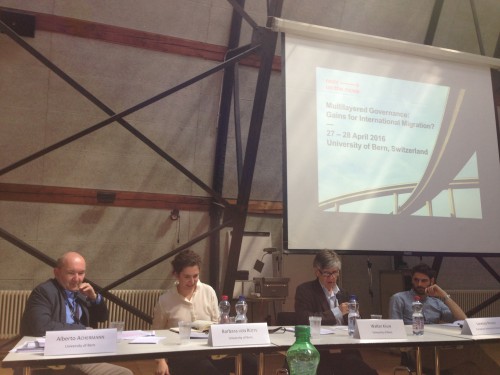
Alberto Achermann, Barbara von Rütte, Walter Kälin, and Lorenzo Piccoli (from left to right)
Talking across disciplines’ were legal, sociology, anthropology, economic, international relations scholars working on migration and governance from Asia, Africa, the US, Europe, notably Alex Betts, Oxford University, Andrew Geddes, Sheffield University, Tiziana Caponio, Turin University, Sandra Lavenex, University of Geneva, and representatives from think tanks, such as Sergio Carrera from CEPS (Brussels), public officials from immigration and foreign affairs offices most notably Eduard Gnesa (Switzerland), and international organizations – UN (Colleen Thouez), ICMPD (Martin Hofman), ILO (Marie-José Tayah).
Conference highlights
In his keynote speech on Wednesday morning, Alex Betts (Oxford University), framed governance in regime theory and challenged the intrinsic value of governance – is it a self-fulfilling instrument or one shaped by power and interests? On the basis of the EU-Turkey deal, he further advanced a centric type of governance for migration, in view to de-fragment the “piecemeal” approach to international legal and policy regime for migration, which accounts to governance gaps, increased vulnerability and migrant discrimination.
In the public lecture of the nccr – on the move, which took place on Thursday evening, Andrew Geddes (Sheffield University), most notably shifted the discussion away from the neo-functionalist frame to a behavioral approach. Drawing on extensive fieldwork in the scope of the MIGPROSP project with immigration ministries across four regions (N-America, S-America, Asia, Europe) he asked how the behavior, bias, beliefs of bureaucrats, elites and other epistemic communities about migration risks and uncertainty shape knowledge and data, but also migration law and policy and thus, migration governance.
With fifty participants, and more for the public lecture, including attendants from the Swiss Agency for Development, Foreign Affairs, but also locals from the neighborhood, students and researchers from several Swiss universities, including from nccr –on the move and NCCR-Trade, the conference provided an excellent forum for exchange on governance and migration and hopes to add to the theory of governance and practice of migration law-making.
Marion Panizzon, Senior Research Fellow, nccr – on the move, Institute of Public Law, University of Bern.
More information, such as the detailed program and abstracts can be found here.
Multilayered Governance: More Coherence for the International Migration Regime?
Call for Papers.
University of Bern (Switzerland)
Wednesday, 27 April and Thursday, 28 April 2016
This two-day workshop, to be held at University of Bern (Switzerland), examines how current migration challenges could be resolved through the concept of multilayered governance (MLG). As counterproject to constitutionalism and statehood, MLG transforms through constructivist “layering” and “blurring” hegemonies such as (host) state control. By adding layers (regional, supranational, multilateral) to the national ones, MLG re-engages with reciprocity, invites plural values and construes flexible structures. It is thus well-equipped to screen international migration law, which has been criticized for substance lacking architecture. It asks how to re-arrange State-society relations by empowering non-state actors and reduces ambivalences among regulatory goals of migration, which are liberalization, rights protection and risk management. The conference will transpose the research agenda of MLG to the field of international migration law and discuss why constructing coherence for a regime as highly divided and as deeply complex as migration remains challenging.
What are the advantages/deficits of contouring the international migration system in terms of MLG? Does MLG encourage bypassing security-biased norms in favor of development-friendly, market-oriented or rights-based approaches?
This call looks for papers combining a migration-specific analysis, which can be based on empirical research, with governance theory. We strongly encourage papers with an interdisciplinary approach linking any of the following disciplines: law, economics, international relations, sociology, geography, anthropology.
Paper Submission Procedure
Senior and junior scholars (including PhD students) are invited to participate in the call for papers. Papers will be selected on the basis of the submitted abstracts. The abstracts must not exceed 800 words and have to be submitted by email to marion.panizzon@oefre.unibe.ch and philip.hanke@oefre.unibe.ch.
Deadline for submission of abstracts has expired, but we are still accepting submissions on a rolling basis until 31 January 2016.
Multilayered Governance: Gains for International Migration? University of Bern 27 – 28 April 2016.
This interdisciplinary conference on the theme of how multilayered governance (MLG) matters for migration law and policy, regroups scholars and practitioners working at the intersection of governance and migration research.
The papers evaluate, on the basis of different disciplinary backgrounds, to what extent MLG could be a governance model for managing migration internationally. Like most governance theories, MLG amounts to a legal and political projection premised on enhancing efficiency and legitimacy. But its high flexibility and hybrid nature, combining vertical “layering” with horizontal “linkages” including systemic interpretation and specialization, distinguish MLG as particularly apt for promoting an interdisciplinary focus including international relations, law, economics and sociology.

Transnational Perspectives and Future Prospects of Migration and Mobility.
Public Lecture Series of the nccr – on the move. Spring 2016.
The third Public Lecture Series of the nccr – on the move will literally be “on the move”, touring Switzerland in order to stimulate and engage with discussions on migration and mobility at different Swiss universities.

Friday, 26 February 2016
10:00 – 11:45, University of Neuchatel, Espace Louis-Agassiz 1, Room RE.42
Contemporary History from a Transnational Perspective: The Case of Switzerland
Jakob Tanner, Department of History, University of Zurich
Download the abstract (PDF)
This lecture is organized in cooperation with the “Institut d’histoire” of the University of Neuchatel.
Wednesday, 2 March 2016
18:15 – 19:45, University of Neuchatel, Rue Abram-Louis Breguet 1, Moyen Auditoire (Lecture Hall 301)
The Well-Being of Migrant Families between Africa and Europe: Transnational Effects of National Policies
Valentina Mazzucato, Faculty of Social Sciences and Arts, Maastricht University
Discussant: Janine Dahinden, University of Neuchatel and nccr – on the move
Download the abstract (PDF)
Thursday, 7 April 2016
18:15 – 19:45, University of Neuchatel, Rue Abram-Louis Breguet 1, Moyen Auditoire (Lecture Hall 301)
The Politics of Measurement: Issue Definition, Framing and the UK Net Migration Target
Christina Boswell, School of Social and Political Science, University of Edinburgh
Discussant: Dr. Kijan Espahangizi, Center »History of Knowledge«, University of Zurich and ETH Zurich
Download the abstract (PDF)
Thursday, 28 April 2016
18:15 – 19:45, University of Bern, Main Building, Hochschulstrasse 4, Kuppelsaal
Prospects for International Migration Governance
Andrew Geddes, Department of Politics, University of Sheffield
Discussant: Dr. Tobias Eule, Law Faculty, University of Bern
Download the abstract (PDF)
Thursday, 12 May 2016
18:15 – 19:45, University of Fribourg, Main Buliding Miséricorde, Av. de l’Europe 20, MIS 3117
Labor and Legal Migration in the EU – State of Play and Prospects
Yves Pascouau, European Policy Centre, Brussels
Discussants:
Niklaus Nuspliger, Political Correspondant, Neue Zürcher Zeitung, Brussels
Dr. Markus Kern, LL.M. (Harvard), Lecturer, Institute for European Law, University of Fribourg
Download the abstract (PDF)
Thursday, 26 May 2016
18:15 – 19:45, University of Geneva, Unimail, Bd du Pont-d’Arve 40, Room M R060
Income, Population and Migration Flows in the 21st Century
Frédéric Docquier, Institute for Economic and Social Research, Université Catholique de Louvain
Discussant: Prof. Martina Viarengo, Department of Economics / Global Migration Center, Graduate Institute Geneva
Download the abstract (PDF)
Download the program flyer (PDF)
Offre d’emploi: Assistant-e étudiant-e pour la création d’une base de données juridique.
Le projet de recherche «Unité et diversité dans la cohésion : le concept de l’intégration dans un monde en évolution», au sein du Pôle de recherche national «nccr – on the move» et basé à l’Université de Neuchâtel, recherche pour une mise en place d’une base de données juridique un-e Assistant-e étudiant-e.
Entrée en fonction : 1er avril 2016 (ou à convenir).
Durée de l’engagement et charge : 160 heures de travail, correspondant à un engagement de 100% pendant un mois. La tâche peut être répartie sur deux mois si nécessaire.
Postulation : Merci d’envoyer un CV (en anglais ou en français), ainsi qu’une brève lettre de motivation, avant le 28 février 2016.
Le renvoi des étranger-ère-s criminel-le-s
Die Ausschaffung krimineller AusländerInnen
Le centre de droit des migrations a publié une liste d’articles sur «le renvoi des étranger-ère-s criminel-le-s». Plusieurs auteur-e-s sont membres du «nccr – on the move».
Das Zentrum für Migrationsrecht hat verschiedene Artikel zum Thema «Ausschaffung krimineller AusländerInnen» zusammengestellt. Unter den AutorInnen sind viele Mitglieder des «nccr – on the move».
NCCR Co-Funding for Existing Projects Addressing Research Questions Related to the Migration-Mobility Nexus. Deadline for Submission is 6 January 2016.
Call for Proposals
NCCR Co-Funding for Existing Projects
The project grants run for two years and cover a co-funding by the nccr – on the move amounting to a maximum of 50’000 Swiss Francs. To be eligible for funding, project proposals should address research questions related to the migration-mobility nexus, that is to the transformation of migration and mobility patterns, their economic drivers, legal regulation and the societal dynamics connected to them.
Deadline for submission is 6 January 2016.
Austausch mit Interessenvertreterinnen und Interessenvertretern. Ein Rückblick.
Gemeinsam.
Migrationsforschung im Dialog.
Am 9. Dezember 2015 hat der «nccr – on the move» zu einem Austausch mit Vertreterinnen und Vertretern der staatlichen Institutionen, der Zivilgesellschaft und der Wirtschaft eingeladen. Um die 70 Personen, externe Teilnehmende und Mitglieder des «nccr – on the move», haben sich zu diesem Dialog im Kursaal in Bern eingefunden. Der NCCR stellte sich, seine Forschung und seine Instrumente im Bereich des Wissenstransfers vor. Grosses Ziel des Anlasses war es indes, die Bedürfnisse, Vorstellungen und Erwartungen der Teilnehmenden abzuholen. Dazu diskutierten sie in vier verschiedenen Workshops zu Integration, Bürgerrechten (Citoyenneté), Menschenrechten und zum Arbeitsmarkt.
Einige photographische Eindrücke
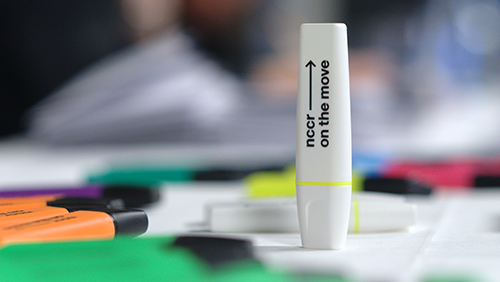
In seinem Einführungsreferat beschrieb der Direktor des «nccr – on the move», Gianni D’Amato, die Architektur eines Nationalen Forschungsschwerpunkts, der Forschende aus verschiedenen Universitäten und wissenschaftlichen Disziplinen vereint. Die in den Workshops geäusserten Wünsche und Erwartungen an den «nccr – on the move» unterstreichen, dass diese heterogene Zusammensetzung eine Herausforderung darstellt. Die Verknüpfung der verschiedenen Disziplinen und Themengebiete erfordert ein Ausbrechen aus dem «Silodenken», welches sowohl die Forschung als auch die Praxis stark prägt. Die vorgebrachten Lücken befinden sich vielfach an den Schnittstellen der Disziplinen, was in der Weiterentwicklung des «nccr – on the move» vermehrt Beachtung finden soll.
Der zweite Schwerpunkt der Veranstaltung lag auf der Diskussion der Wissenstransferstrategie. Diesem Aspekt kommt besonders vor dem Hintergrund der laufenden politischen Debatten um die Umsetzung der Masseneinwanderungsinitiative eine zentrale Rolle zu. Viele Teilnehmende erhoffen sich vom «nccr – on the move» Erkenntnisse und Resultate, die sie in die Debatte einbringen können. Über Blogeinträge, die Policy Briefs «kurz und bündig» sowie unsere Indikatoren hoffen wir einen Beitrag in diese Richtung liefern zu können.
Auf eine Weiterführung dieses anregenden Dialogs freuen wir uns!
Nicole Wichmann, Network Officer, «nccr – on the move»
We Citizens – Participation of Migrant Women in Switzerland. Discussion and Film Screening.
4 December 2015, 14:00 – 16:45 h
University of Neuchatel
Rue Abraham Louis Breguet 1, Lecture Hall 301
What is a citizen? What is a Swiss citizen? What is a migrant? Who makes decisions in a democracy? And how can migrants participate in Swiss democracy without being Swiss citizens?
The right to vote is one of the most important elements of participation in politics and society. Most migrants, however, use different ways to articulate their interests and to influence political decision-making in Switzerland. This session combines different perspectives to explore alternative forms of active political participation. Academic contributions from legal and social sciences will be complemented by first-hand accounts of a group of migrant women who share their experiences of participating in Switzerland’s democratic system. Based on these different perspectives on the subject, we will engage in a discussion on the importance and complexities of democratic participation.
Film screening “Wir Mitbürgerinnen” (We Citizens)
15:15 h, in German and French
Further information about the film and the Feminist Peace Organization.
Exclusion – Discrimination – Borders. Dynamics of Inequalities in Migration Regimes.
Public Lecture Series of the nccr – on the move. Fall 2015.
Thursdays from 18:15 to 19:45 h at the University of Neuchatel,
Rue Abraham Louis Breguet 1, Lecture Hall 301
8 October 2015
The Transnational Social Question:
Inequalities and Exclusions in Cross-Border Mobilities
Thomas Faist, Faculty of Sociology, University of Bielefeld
Discussant: Prof. Giuliano Bonoli, University of Lausanne and nccr – on the move
Download the abstract (PDF)
15 October 2015
Air Deportation: Statecraft, Aircraft, and the In/Visibility of Forced Mobility
William Walters, Department of Political Science, Carleton University, Ottawa
Discussant: Prof. Christin Achermann, University of Neuchatel and nccr – on the move
Download the abstract (PDF)
5 November 2015
Schengen Borders:
Discrimination between Freedom of Movement and Death
Elspeth Guild, School of Law, Queen Mary University of London
Discussant: Charles Heller, Center for Research Architecture, Goldsmiths College, London / Co-Initiator Watch the Med
Download the abstract (PDF)
The public lecture by Floya Anthias is cancelled!
19 November 2015
Transnational Mobilities and Translocational Belongings:
Reflecting on the Interconnections between Identities and Inequalities
Floya Anthias, School of Social Sciences, University of East London
3 December 2015
Integrating Immigrants – How Does Switzerland Compare?
Thomas Liebig, International Migration Division, OECD, Paris
Discussant: Prof. Etienne Piguet, University of Neuchatel and nccr – on the move
Download the abstract (PDF)
View the program flyer online
Download the program flyer (PDF) to print out
Student Mobility in Europe: Trends and Future Perspectives. This public lecture by Christof Van Mol will take place on 25 November 2015.

Public Lecture Series of the nccr – on the move project International Student Mobility between the South and the North.
Wednesdays from 10:00 to 12:00 h at the University of Neuchatel, Espace Louis-Agassiz 1, 2000 Neuchatel, Room R.E.46
21 October 2015
Theorising Student Migration
Parvati Raghuram, Director of OpenSpace Research Centre, The Open University, UK
Download the abstract (PDF)
25 November 2015
Student Mobility in Europe: Trends and Future Perspectives
Christof Van Mol, Netherlands Interdisciplinary Demographic Institute (NIDI) / KNAW /UG
Download the abstract (PDF)
The nccr – on the move is searching a researcher for a PostDoc position (80%) at the University of Fribourg.
To complete her research team, Prof. Sarah Progin-Theuerkauf at the University of Fribourg (Law Faculty), who is also Co-Director of the Swiss Center for Migration Law based in Neuchâtel, is seeking a candidate for a PostDoc position (80%) to bring forward a project on EU migration law.
Starting date is 1 January 2016 or as soon as possible thereafter.
Deadline for application is 13 November 2015.
Study Week “Schweizer Jugend Forscht/La Science Appelle les Jeunes”. An Epilog.
From 19–24 October 2015 members of the nccr – on the move offered a study week on the current refugee crisis in Europe for Swiss high school students.
The project offered by the nccr – on the move addressed the ongoing debate on the refugee crisis in Europe. It was convened in the framework of the study week in humanities and social sciences organized by “Schweizer Jugend Forscht/La Science Appelle les Jeunes”. The four participants from the cantons of Aargau, Luzern, Waadt and St. Gallen were able to get a first insight into researching migration issues. In a first step, basic knowledge about international refugee law, the institutional set-up of the Schengen/Dublin system as well as EU migration policy, Swiss asylum policy, children’s’ rights in migration law and an introduction to negotiation theories was presented by fellows of the NCCR. Based on this knowledge, the students were assigned a specific country (Germany, Switzerland, Poland and Greece) and were asked to carry out research on the migration policies of their respective country.
The students then simulated a negotiation at the European level, addressing specifically the questions of increasing border control to prevent irregular migration and the improvement of protection standards for asylum seekers using the example of unaccompanied minors seeking asylum in the Schengen/Dublin area. The negotiations showed just how difficult it is to reach a consensus on these highly controversial questions among governments that are characterized by strongly divergent interests and preoccupations – especially when the discussions move from a general commitment to shared principles, such as increasing security and human rights protection for a vulnerable population to concrete measures and financial contributions. Moreover, the tension between these two core principles that are situated at the core of European policy in this area became apparent in the debate. The results of these negotiations were then presented as a poster and with a presentation at the closing event of the study week on Saturday in Zurich.
The week was characterized by many lively debates, thoughtful questions and great discussions and provided an interesting environment to discuss a very current topic with a highly motivated young group of high school students. It provided an opportunity for the NCCR fellows to strengthen their teaching skills and to present their knowledge in a nutshell to the students.
The organisational team would like to thank Jyothi Kanics, Didier Leyvraz and Aronne Watkins for their great presentations.
Philip Hanke, PostDoc on the project The Law and Economics of Migration Policy
Stefanie Tamara Kurt, doctoral student on the project Unity and Diversity in Cohesion: The Concept of Integration in a Changing World
Eva Zschirnt, doctoral student on the project Discrimination as an Obstacle to Social Cohesion
Nicole Wichmann, Network Officer
Postdoc position in political economy of migration (100%), NCCR/SNIS at the University of Geneva.
At the Institute of Economics and Econometrics (University of Geneva) we are seeking applicants for a
Postdoc position in political economy of migration (100%).
The successful applicant is expected to carry out research on the political economy of migration and individual-level attitudes towards immigrants under the supervision of Professor Tobias Müller. This position is co-financed by the National Center of Competence (NCCR) “On the Move” and the SNIS project “Individual-Level Attitudes towards Immigrants”. The candidate is expected to contribute to both research projects.
Starting date: 1st November 2015 or upon mutual agreement.
Deadline for application is 17 October 2015.
Assistant Professor full time (100%) in Migration Policy Analysis at the University of Neuchatel.
The University of Neuchatel invites applications for the position of an
Assistant Professor in Migration Policy Analysis
starting 1 February 2016 or upon agreement.
The successful candidate’s research shall contribute to the nccr – on the move. Research orientation and research interests should be compatible with and complementary with regard to the SFM and the NCCR professors of the University of Neuchatel. Possible fields of specialization (indicative list): sociology of migration, politics of migration, political sociology, public policy analysis, public administration, citizenship studies, ethnic studies.
Deadline for application is 22 August 2015.
Find the long version of the job advertisement in English (PDF) and in French (PDF).
Rights, Democracy and Migration – Looking Back at the 12th IMISCOE and 1st nccr – on the move Annual Conference in Geneva.
At the end of June, the 12th IMISCOE Annual Conference was hosted in Geneva. This gathering of the leading European migration researchers was also the first Annual Conference of the nccr – on the move and an opportunity to celebrate the 20th Anniversary of the Swiss Forum for Migration and Population Studies (SFM) of the University of Neuchatel.
More than 400 national and international researchers and experts assembled to discuss the interrelation between rights, democracy and migration in contemporary Europe.
In the opening keynote address, Andreas Wimmer (University of Princeton) shed light on the particular ambivalence between (economic) openness towards migrants and their political exclusion in the context of Swiss direct democracy. In the different plenary sessions internationally renowned experts such as Giovanna Zincone (FERI, Turin), Rainer Bauböck (EUI, Florence), Patrick Weil (Yale Law School) and Dawn Chatty (University of Oxford) took up the issue and discussed the turbulence of migration in Europe in the light of changing migratory flows, growing anti-immigrant discourses and policies and a questioning of the human rights regime. Ryszard Cholewinski and Marie-José Tayah (ILO, Geneva) provided an insider perspective on the state of the art of the academic literature on international migration governance and presented ideas on how academia and international organizations could interact more fruitfully in this area. The statements made clear, that today migratory patterns, migration governance and mobile life-worlds are in a vast transformation, for which no ready-made answers exist.
In order to better understand this situation, the participants of the conference met in some 90 panels and workshops and discussed topics as diverse as naturalization ceremonies, solidarity movements between refugees and squatters, discrimination on labor markets, transnational networks of domestic care workers, highly skilled migrants, as well as modes of multiple citizenship – to name only a few.
For the nccr – on the move and its fellows the international exposure was an inspiring and motivating start in the endeavor of developing new perspectives on migration and mobility in Switzerland.
Rohit Jain, Scientific Officer, nccr – on the move
Panel on “Human Rights in Times of Politicized Migration and Fragmented Protection Management” / IMISCOE PhD Award Presentation
Panel on “Rights and Democracy: An Antagonistic Relationship in European Migration Policy?” / Rinnus Peninx Best Paper Award 2015
The Cabinet of Realities: A fruitful dialogue supported by the nccr – on the move.
The Cabinet of Realities at the Belluard Festival brought together a diverse group of people who exchanged about a currently very lively debated topic “Fortress Europe”: Inspired by science while – at the same time – going beyond science.
On Sunday afternoon, 28 June 2015, the Cabinet of Realities took place in the medieval fortress of the Belluard in Fribourg, Switzerland. The Cabinet was part of the 32nd Festival Belluard Bollwerk International. Eighteen specialists shared their knowledge on a specific aspect of the “Fortress Europe”, the festival’s thematic focus. In charge of the whole project, I carefully selected people who would represent various perspectives on this controversial thematic. Among them were three researchers from the nccr – on the move. Céline Bauloz talked about the externalization of asylum outside of the European borders. Teresia Gordzielik questioned the juridical reality of the so-called Fortress Europe. And, Laura Rezzonico explained the practice of administrative detention of migrants in Switzerland.
Photo: © Margaux Kolly
In the middle of this very hot summer, six saloons are set up inside the beautiful and fresh fortress Belluard. The atmosphere is smooth and concentrated. In each saloon, about ten people are sitting together. They are talking, exchanging, asking each other questions. The discussions are rich, passionate and focused. In the Cabinet of Realities, different worlds are connecting with each other: researchers share their knowledge to a wider public, practitioners discuss with activists, and artists question the societal importance of their work. In this special space, there seems to be no hierarchy and there is something magic in observing all these people talking together, thinking together.
Anne Kristol, nccr – on the move, doctoral student in the project Gender as Boundary Marker in Migration and Mobility: Case Studies from Switzerland
“Europäische Flüchtlingspolitik – Erosion der Menschenrechte?”
Wednesday, 1 July 2015
Swiss Radio SRF2 “Kontext”, the daily editorial reporting with background information on topical issues
Gianni D’Amato, Director of the nccr – on the move, elaborates on perspectives for a common European refugee policy
(14:55 – 28:55 in the podcast)
The interview was hold on the occasion of the IMISCOE and nccr – on the move Annual Conference
Podcast in German
Nicht nur die Politik, auch die Wissenschaft befasst sich mit Migrationsfragen. In Genf kamen Ende letzter Woche über 400 Migrationsexperten zu einer internationalen Tagung zusammen, um neue Perspektiven zu entwickeln.
Belluard Festival 2015, Fribourg, Switzerland. Cabinet of Realities.
The Belluard Festival, taking place from 25 June until 4 July 2015, gathers artists from all over the world, from different regions in Switzerland and from Fribourg. They come to share their ideas and visions on the Fortress Europe and speak about memory and identity, using all contemporary forms of artistic expression.
Sunday, 28 June 2015. 13:00 – 16:00.
Cabinet of Realities.
Simultaneous salons on Fortress Europe.
The galleries of the Belluard Fortress will be the venue for several salons, which will run simultaneously and be hosted by some 20 specialists. Artists, scientists and practitioners will share their insights and expertise on a particular facet of Fortress Europe.
Three times 45 minutes sessions in French, in German and in English.
Galeries du Belluard, Fribourg.
With the support of the nccr – on the move.
IMISCOE Conference and 1st Annual Conference of the nccr – on the move.
Geneva, 25–27 June 2015
The conference “Rights, Democracy and Migration – Challenges and Opportunities” is organized by the nccr – on the move, the Swiss Forum for Migration and Population Studies (University of Neuchatel) and the Institute for Demographic and Live Course Studies (University of Geneva) together with IMISCOE.
Download the 2nd version of the final program, updated 4 June (PDF, 2.2 MB).
For more information about the conference visit IMISCOE.
Paradigmatic Perspectives on Migration and Mobility.
Public Lecture Series of the nccr – on the move. Spring 2015.
Thursdays from 18:15 to 19:45 h at the University of Neuchatel,
Rue Abraham Louis Breguet 1, Lecture Hall 301
19 February 2015
Circulating Capital, Moving People, and Mobile Words
Prof. Dr. Hans-Rudolf Wicker, Institute of Social Anthropology, University of Bern
Download the abstract (PDF)
12 March 2015
Relative Deprivation and World Migration
Prof. Dr. Dr. h. c. Oded Stark, Universities of Bonn, Tübingen and Warsaw; Georgetown University
16 April 2015
Theorizing Friction in a Mobile World
Prof. Dr. Tim Cresswell, History Department, Northeastern University Boston
Discussant: Prof. Dr. Ola Söderström, Institute of Geography, University of Neuchatel
Download the abstract (PDF)
7 May 2015
Migration, Sovereignty and Human Rights
Prof. Dr. Jürgen Bast, Faculty of Law, Justus Liebig University of Giessen
Discussant: Prof. Dr. Christin Achermann, University of Neuchatel and nccr – on the move
Download the abstract (PDF)
28 May 2015
Re-Thinking Europe from Its Contested Borders
Prof. Dr. Regina Römhild, Institute for European Ethnology, Humboldt University of Berlin
Download the abstract (PDF)
View the program flyer online
Download the program flyer (PDF) to print out
Factorial Survey Designs in Labor Market Research. An Epilog.
The Workshop “Factorial survey designs in labor market research” took place on 21 May 2015 at the University of Lausanne.
Our four guests, Prof. Katrin Auspurg (Goethe University Frankfurt), Prof. Marc Gurgand (Paris School of Economics), Prof. Dominik Hangartner (London School of Economics) and Andreas Scheck (Goethe University Frankfurt), presented their recent work on survey experiments. Moreover, our three local research teams (Integration through Active Labor Market Policies and Discrimination as an Obstacle to Social Cohesion of the nccr – on the move as well as Education and Employment of the NCCR LIVES) had the possibility to present their planned experimental designs. Besides lively discussions on the different presentations, all research teams obtained valuable feedbacks on their specific projects from both speakers and the audience.
In particular, we discussed pivotal issues such as how to best address low response rates and social desirability biases, how to validate experimental data with behavioral benchmarks and – last but not least – whether conjoint analyses, choice experiments or vignette studies perform best.
The attendance of 25 national and international guests from three different disciplines (sociology, political science and economics) allowed us to network and establish new professional contacts. The discussion benefitted a lot from the researchers’ interdisciplinarity, which opened new perspectives on the various questions.
Flavia Fossati, nccr – on the move, PostDoc on the project Integration through Active Labor Market Policies
Workshop Factorial Surveys in Labor Market Research
In this workshop we aim to address methodological issues arising when applying factorial survey vignettes. We invite three experts to speak on this subject and to give feedback on three experimental surveys we intend to carry out in the framework of the nccr – on the move and in the NCCR LIVES.
The workshop presents a unique opportunity to exchange ideas on this methodological approach and it offers a networking platform for scholars with experts in the field. 30 places are available (members of the NCCRs will be prioritized). Please register by sending an email to Flavia Fossati.
Download the PDF of the program.
Organisation
- nccr – on the move, team “Integration through Active Labor Market Policy”: Giuliano Bonoli, Flavia Fossati and Daniel Auer
- nccr – on the move, team “Discrimination as an Obstacle to Social Cohesion”: Rosita Fibbi
- NCCR LIVES, team “Jobvul”: Giuliano Bonoli, Rafael Lalive, Daniel Oesch, Esther Mirjam Girsberger Seelaus and Fabienne Liechti
The nccr – on the move is searching a PostDoc (80 %)
To complete their research team Prof. G. D’Amato at the Swiss Forum for Migration and Population Studies, University of Neuchâtel and Prof. C. Amarelle at the Swiss Center for Migration Law, University of Neuchâtel, are seeking a researcher for a postdoc position (80 %) to help develop and conduct an interdisciplinary comparative research project (law/social sciences) on integration policies at the cantonal level in federal Switzerland.
Deadline for application is 28 February 2015.
Call for Panels and Papers.
12th IMISCOE Conference and 1st Annual Conference of the nccr – on the move
Geneva, 25–27 June 2015
The conference on “Rights, Democracy and Migration” will be organized by the nccr – on the move, the Swiss Forum for Migration and Population Studies (University of Neuchatel) and the Institute for Demographic and Live Course Studies (University of Geneva).
Keynote and panel contributions
Dawn Chatty, Giovanna Zincone, Rainer Bauböck, Michel Wieviorka and Andreas Wimmer
Call for Panels and Papers at IMISCOE
Download the Call for Papers as PDF
Call for Papers. Cross-border marriages.
Panel proposal for the
12th IMISCOE Conference and
1st Annual Conference of the nccr – on the move
Geneva, 25–27 June 2015
Cross-border marriages: between transnationalization and politicization
The panel should be an opportunity to gain answers to highly politicized questions – answers that go beyond simplistic explanations (of culture, ethnicity, religion or sexism within migrant communities) and that bring to light the complex processes of this form of transnationalisation as well as its constraining and conflictual dimensions.
Organizers: Prof. Janine Dahinden, Joëlle Moret and Shpresa Jashari, University of Neuchâtel, Switzerland
Deadline for abstract submission is 7 January 2015.
Download the Call for Papers as PDF
Call for Papers. Friction-less and Root-less Mobilities?
Panel proposal for the
12th IMISCOE Conference and
1st Annual Conference of the nccr – on the move
Geneva, 25–27 June 2015
Friction-less and Root-less Mobilities?
Opportunities, Barriers and Intimacies in Expatriate Migration
The migration of “mobile professionals”, commonly known as “expatriates”, represents a significant component of current migration flows with the popular image of the “expatriate” remaining mostly based on the idea of a friction-less and root-less form of migration. The panel puts into question the homogeneity of this population. It brings to the fore the different opportunities and possible constraints faced by these individuals, as well as the experiences of other people involved either by expatriating or staying behind.
Organizers: Dr. Flavia Cangià and Déborah Levitan, Msc, Institute of Psychology and Education, University of Neuchâtel
Deadline for abstract submission is 7 January 2015.
Download the Call for Papers as PDF
Call for Papers. Internationalising our Understanding of Student Mobilities.
Panel proposal for the
12th IMISCOE Conference and
1st Annual Conference of the nccr – on the move
Geneva, 25–27 June 2015
Internationalising our Understanding of Student Mobilities: Beyond the Anglo Model
Following the Anglosaxon model, it has been commonly assumed in studies of international student mobility that the neoliberalisation of the university sector has led to a growth in high fee‐paying international students. However, do these processes of advanced neoliberalism extend beyond the metropolitan core of English‐speaking countries, or how do they manifest in other parts of the world?
Organizers: Parvati Raghuram, Open University, United Kingdom and Yvonne Riaño, University of Neuchâtel, Switzerland
Deadline for abstract submission is 5 January 2015.
Download the Call for Papers as PDF
Call for Papers. Highly Skilled or Highly Wanted Migrants?
Panel proposal for the
12th IMISCOE Conference and
1st Annual Conference of the nccr – on the move
Geneva, 25–27 June 2015
Highly Skilled or Highly Wanted Migrants? Conceptualizations, Policy Designs and Implementations of High–skilled Migration Policies.
This panel offers an opportunity to delve into the construction of migrant categories through policy design and policy implementation. It also proposes to widen the focus beyond immigration authorities in order to include various actors that are in one or another way involved in the process of selecting, supporting or employing highly skilled workers.
Organizers: Dr. Metka Hercog and Laure Sandoz, MA Institute of Cultural Anthropology and European Ethnology, University of Basel
Deadline for abstract submission is 4 January 2015.
Download the Call for Papers as PDF
The nccr – on the move is searching for a Data Manager (50–60 %)
To complete the nccr – on the move Network Office we are searching for a Data Manager (50–60 %). The start date will be December 1, 2014 (or as soon as possible thereafter). You will be the contact person for data management within the network encouraging the network members to develop databases of their own, ensuring that all research teams have access to existing statistical and longitudinal data and settling questions of data use and storage with relevant stakeholders (Federal Statistical Office, FORS).
NCCR project team involved in the Swiss Researching Africa Days
On 17–18 October 2014, the Swiss Researching Africa Days will take place in Bern. They allow a lively exchange among the community of researchers working on Africa in Switzerland. One panel will specifically focus on “African Academics: Aspirations, Mobilities and Trajectories” – a topic which is strongly linked with the nccr – on the move research project on international student mobility between the South and the North.
Droits de l’homme et démocratie: un défi pour la Suisse
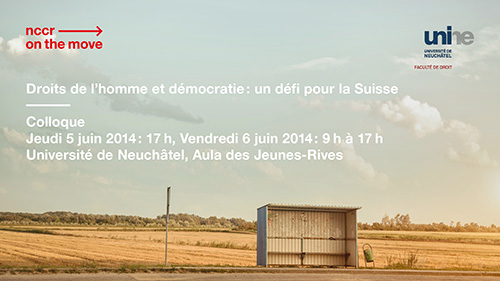
Call for Visiting Fellows – Spring 2023
Short-Term Incoming Fellowships

The nccr – on the move wants to facilitate the linking up of researchers abroad – especially researchers coming from and/or based in the “Global South” – with our network. For this purpose, it is setting up short-term visiting fellowships for incoming junior and senior fellows.
Further information on the eligibility and the application and selection procedure can be found here.
The deadline for application has ended.
For questions, please contact the Deputy Scientific Officer of the nccr – on the move lucas.oesch@nccr-onthemove.ch
Repository
Research Day # 2 Program (20 February 2020)
Research Day #3 Program (21 April 2020)
Community engagements for social and environmental justice
Workshop
Wednesday, 18 March 2020
UN Geneva, in the International Conference Centre
IFSW celebrates Social Work Day with the workshop on “Community engagements for social and environmental justice” at the UN Geneva. This event is organized together with the International Association Schools of Social Work, Haute école de travail social, HES-SO Genève, Haute école de travail social de Fribourg (HETS-FR), and with the United Nations of Research Institute for Social Development.
World Social Work Day aims to highlight the achievements of social work, to raise the visibility of social services for the future of societies, and to defend social justice and human rights.
Program (PDF)
The Future of Inclusion
SIETAR – Congress
CANCELED
3-5 April 2020
HEIG-VD, Yverdon-les-Bains
The different sessions of the congress will focus on living and working together, developing collaborative intelligence, global citizenship and getting ready to deal with the economic, climactic, intercultural and inter-religious dialogue and migration challenges facing our world in the future. Its aim is to link latest research with concrete actions, best practices and grassroots initiatives.
The congress is aimed at practitioners, organizations, NGOs, educational institutions and will host a keynote presentation of Prof. Gianni D’Amato.
Disrupted Mobilities, Disrupted Careers: The Impact of the COVID-19 Pandemic on Junior Researchers
Call for Proposals for an nccr – on the move Blog Series
The current COVID-19 pandemic and disruption of international mobility have created new inequalities and exacerbated existing ones. As a particularly vulnerable group in academia, early career researchers are often in precarious positions and compelled to international mobility, as a major precondition for their professional development.
An nccr – on the move blog series scheduled for early 2021 will be dedicated to the impact of the pandemic and the related mobility restrictions on the careers of junior researchers. We welcome proposals for contributions addressing this topic based on empirical research, theoretical analysis or a reflection of personal experiences. A specific interest of the series is to unpack the roles of gender, academic affiliation, funding sources, disciplinary approach and other factors in creating, perpetuating, or mitigating unequal conditions for the mobility of early career researchers in times of COVID-19.
If you are interested in writing a blog post for this series, please send your proposal to aldina.camenisch@nccr-onthemove.ch until 4 December 2020. Blog contributions can be written in English, French, German, or Italian and should not exceed 6000 characters with spaces in length. The submission date for full contributions will be between late December 2020 and February 2021.
Job Opportunity
Open Position at the University of Neuchâtel
Full Professor (100%) or Assistant Professor on tenure track (100%) in the analysis of migration policy.
Start on 1 August 2022 (or upon agreement). The application deadline is 17 December 2021.
The job description and application details can be found here (PDF).
New events coming soon!

Appointment in Geneva: Refugees’ Encounters with UNHCR
Migration History Talk
with Peter Gatrell, Emeritus Professor, University of Manchester

Thursday, 2 March 2023, 17:30 – 19:00 CET
This talk will be held in person at the University of Neuchâtel, Espace Tilo Frey (FLSH), room R.N.04, on WEBEX, as well as live-streamed on the nccr – on the move YouTube channel.
The Migration History Talks are co-organized by the History Department of the University of Neuchâtel and the nccr – on the move.
For any further information, please contact jean-thomas.arrighi@unine.ch.
Program (PDF)
Call for Blog Articles
Russian Invasion of Ukraine – One Year On
We would like to invite you to contribute to the nccr – on the move blog’s new series, which aims to explore the current state of Europe and the aftermath of the Russian invasion of Ukraine one year later. We encourage scientific contributions that offer insightful analyses, engage in social and political debates, and draw from your research findings or personal experiences. Your unique perspective will enrich the blog series, we are thus looking forward to reading your proposals on this critical topic. Please send us your draft proposals by 31.3.2023.
The blog posts can be written in English, French, or German and we will support you by providing feedback, editing, and proofreading. After the process of review, the blog posts will be published online on our website and provide an excellent opportunity for drawing the attention of the general public.
Geo-Political Rivalry and Anti-Immigrant Sentiment. A Conjoint Experiment in 22 Countries
Public Lecture Series
Andreas Wimmer, Columbia University
Discussant: Anita Manatschal, University of Neuchâtel, nccr – on the move

Thursday, 8 June 2023, 18:00 – 19:30 CET
This talk will be held in person at the University of Neuchâtel, 1er Mars 26, room C46, on WEBEX,
as well as live-streamed on the nccr – on the move YouTube channel.
Program (PDF)
Rethinking Forced Migration Relationally: Agency, Liminality, and Migration Regimes
International Workshop

12-13 September 2024 – University of Neuchâtel
This workshop is organized by the team of the nccr – on the move research project “Dealing with Crises and Liminal Situations: The Agency of Ukrainian and Syrian Forced Migrants in Three National Contexts”: Prof. Dr. Mihaela Nedelcu, University of Neuchâtel Dr. Ibrahim Soysüren, University of Neuchâtel Dr. Simon Noori, University of Neuchâtel Dr. Oleksandra Tarkhanova, University of Neuchâtel and University of St. Gallen.
This two-day workshop brings together researchers working on forced migration from a relational perspective and seeks to advance understandings of agency and liminality based on empirical research. The workshop aims to rethink forced migration through a relational lens and to broaden our understanding of how forced migrants cope with uncertainty, precariousness, and liminality by situating them in broader social relations, networks, and contexts. It also encourages debates on methodological and ethical issues and problems that arise in empirical research with relational, transnational, and bottom-up perspectives. War-induced forced migration due to the Russian invasion of Ukraine and the war in Syria are two empirical cases that we will be focusing on, but research on other displaced populations will also be presented.
The full program is available here.
The workshop is open to the public. If you wish to attend, please register by using this link.
Human Mobility as a Critical Driver of Change?
International Conference
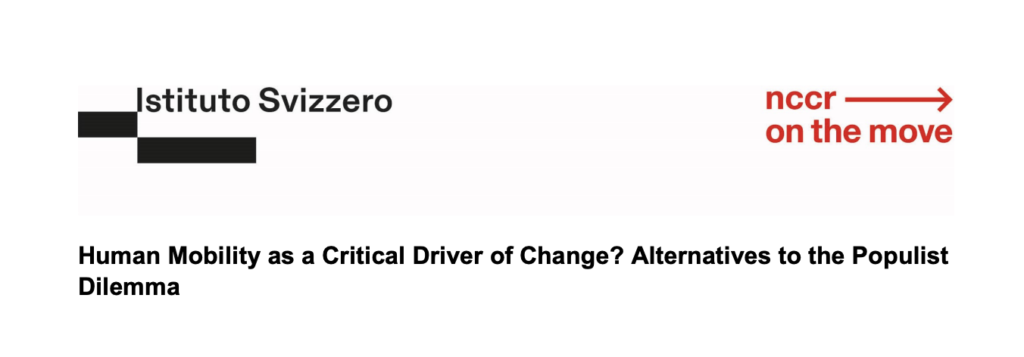
28 – 29 November 2024
Istituto Svizzero, Rome, Italy
Human mobility is a critical driver of societal change, shaping social, economic, political, and cultural transformations across Europe. In countries like Switzerland, Italy, Germany, the Netherlands, France, and the Nordic nations, immigration remains central to sociopolitical debates, often framed by populist narratives. This event seeks to reframe the discourse, focusing on the innovative contributions of migrants, both historical and contemporary, to areas such as technological progress, labor markets, gender equality, consumer behavior, and political participation. By examining demographic shifts and their impacts, particularly in Italy and beyond, the discussions aim to uncover fresh perspectives and connect with academic and cultural institutions in Rome to expand the conversation’s scope and relevance.
Detailed program and description can be found here (PDF).
Please register through the following links for Thursday 28.11.2024 here and and Friday 29.11.2024 here.






